Poems
Newsletter Poems - both originals and old favourites...
OUR MOVE
We are Kathryn and Mark and have recently moved into Cherry Tree Cottage and are thrilled to be part of the Berrynarbor community and touched by the warmth of greeting received in welcoming us to 'the Valley'. Mark is a would-be poet who is not a best-selling author either side of the Atlantic. Still, he perseveres, and offers this in part explanation for our move.
To look out, pour over
The wonder of the land about him
Early morn and the sun
Begins to stretch thru the valley
Cast light and magic leeside and vale
The people consider a stretch and yawn
But submit this side of dawn
And turn once more for blissful sleep
Nothing to disturb their slumber
But the bumble of a bee
Or partridge hacking cough
Sleep they do
Resist freckledom
But he, but he
Rose early
Call of the land
A need to glory
On Sterridge Valley
Combe bound stream
Bubbles and babbles beneath him
Rushing t'ward the sea, the sea
And birdsong
Enlivens the day
Green upon green upon green
Greet his eyes
The steep banked hills training his vision
On all yet to come,
Breath deep breath deep
This great beauty
The day, his anew
And life is upon him . . .
Mark Rogers

Illustrated by: Paul Swailes
43
IN ANCIENT WOODS
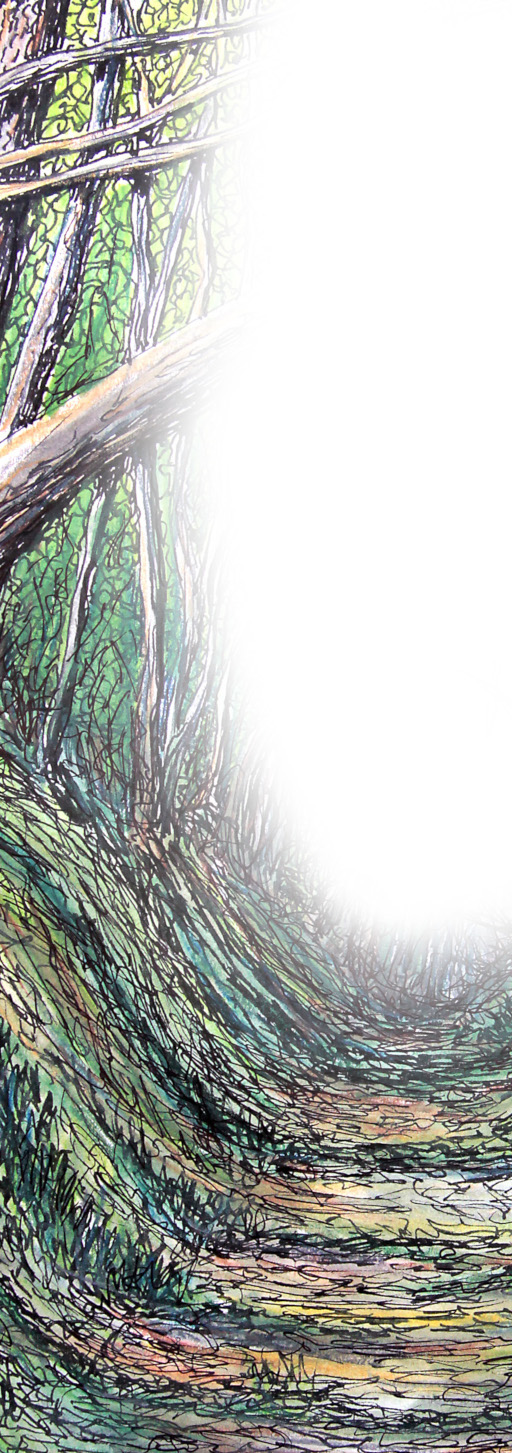
Walk in ancient woods
Feel the life beneath your feet
the complex web of roots and fungi
networking, supporting
Stop and look up
at the towering oak
the broad branched beech
the quivering ailing ash
Sheltering the understorey
providing homes and food
for birds and other animals
for insects lichen fungi . . .
Their fallen branches - and
ancestors and cousins - lie
decaying on the ground
dead . . . but full of life . . .
The woods are full of life
life that owes its being to the trees
What history have they witnessed
what dramas have they lived through . . .
And still strong they stand
Virginia Evans
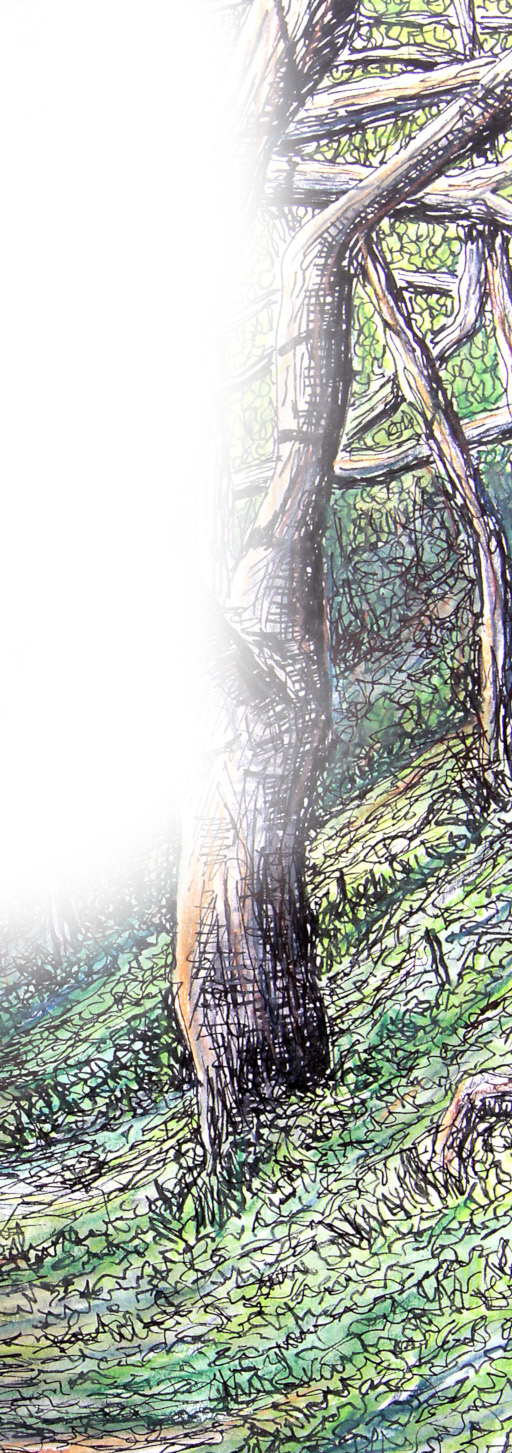
37
CHANGE

Causing pain and confusion
But thinking things can always be the same
is sadly, pure delusion.
As nature shows,
our world is ever-changing.
Each new day starts afresh.
Our environment ever-rearranging.
Whilst life goes on,
death can impact too,
throwing turmoil into daily life.
Emotions over-taking you.
We have to bend and adapt to life's changes,
acknowledging when they're gone.
Some things just have to be accepted
it's no good holding on.
Change can be simple;
a chance to modify.
Or it can be traumatic;
a fact I can't deny.
Embracing change can be tough
but therapeutic sometimes as well.
Allowing time to revaluate.
Appreciating things that compel.
We have to accept life's rich tapestry
with its ups and its downs.
Absorbing it's changing patterns.
Creating smiles as well as frowns.
But feeling you have to make changes
just for changes sake.
Be careful, my dear friend
for that could be a big mistake!
Pam Robinson


Illustrations by: Paul Swailes
31
OUR VILLAGE'S RESOURCES
We can't
afford to be complacent you know
Or our special places will surely go.
We already seem to have lost the pub;
A place that once was, a central hub.
The church, the school, both serve our community.
Supporting one's faith and education; bringing unity.
More of our facilities will be lost forever
unless we work hard and pull together.
Bills are rising it costs a lot
but we need to hold onto what we've got.
Coffee afternoons and quiz nights in the Manor Hall
Go some way but don't pay it all.
It's a large building to maintain and heat.
Rising costs we all need to beat.
And while we're at it don't forget the community shop.
I would hate to see that be given the chop.
We assume it'll be there forever and a day
but we can't assume that, whatever you say.
The shop needs our support our custom too.
There's something we could, easily try to do.
If each week, every villager spent, at least one pound
the difference it would make could be profound.
I would encourage you to give it a try.
There's so many goodies you could choose to buy.
Don't forget the post office that needs our business as well
[I'm on a roll here as you can surely tell! ]
I think you've got the picture; you know what you need to do.
Hopefully this poem is speaking to each one of you.
Let it be known that Berrynarbor is a community who pull together,
Supporting our facilities so they're not lost forever.
Pam Robinson

Illustrated by: Paul Swailes
17
THE PEOPLE UPSTAIRS
The people upstairs all practise ballet
Their living room is a bowling alley
Their bedroom is full of conducted tours.
Their radio is louder than yours,
They celebrate week-ends all the week.
When they take a shower, your ceilings leak.
They try to get their parties to mix
By supplying their guests with Pogo sticks,
And when their fun at last abates,
They go to the bathroom on roller skates.
I might love the people upstairs more
If only they lived on another floor.
Ogden Nash

Illustrated by: Debbie Rigler Cook
Ogen Nash
Frederic Ogden Nash was an American poet well-known for his light verse of which he wrote over 500 pieces. With his unconventional rhyming schemes, he was acclaimed by The New York Times the country's best-known producer of humorous verse.
Nash was born in Rye, New York on the 19th August 1902. Throughout his life he loved to rhyme: "I think in terms of rhyme and have done since I was six years old," he has said. Fond of crafting his own words wherever rhyming words didn't exist, he admitted that crafting rhymes was not always easy.
Among his most popular poems is a series of many animal verses.
The one-L lama, he's a priest.
The two-L llama, he's a beast.
And I will bet a silk pajama;
There isn't any three-L lllama!
Nash died in Baltimore on the 19th May 1971 10 days after suffering a stroke, and is buried in East Side Cemetery in North Hampton, New Hampshire.
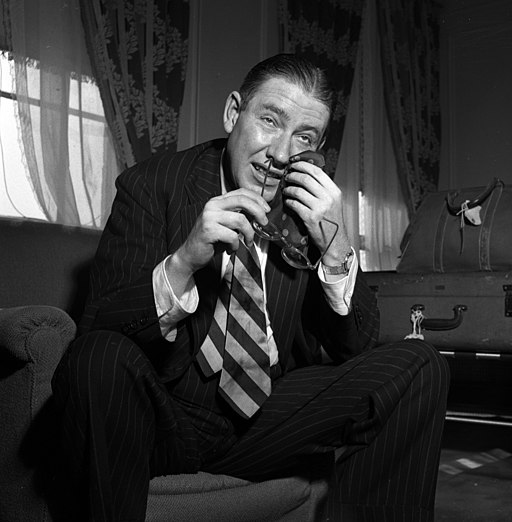
Ogden Nash at Biltmore Hotel
Los Angeles, California
Los Angeles Daily News, CC BY 4.0
via Wikimedia Commons
23
LUNDY SEALS
heads bobbing above the water
turning, looking around
inquisitive eyes
friendly faces
Larger black adults don't hang around
watch for a moment then
suddenly
quickly
pulling their huge dark shiny mass
carefully
lightly
out and over
- over and under
in one fast moment
Dive
Virginia Evans
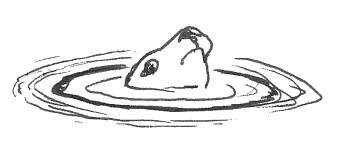
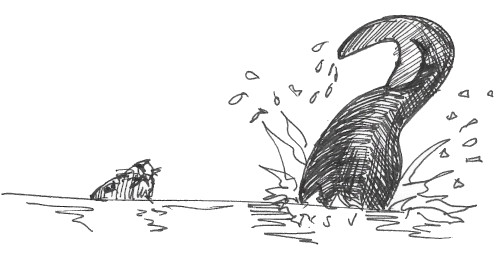
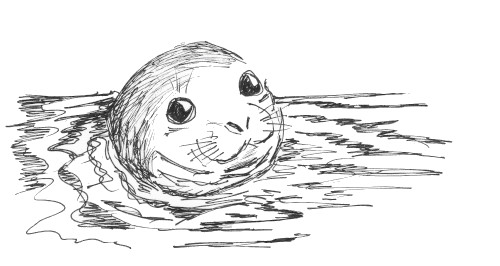
Illustrated by: Paul Swailes
12
HILLSIDE GARDENING
straggling along the hillside brambles and nettles and other creepers wild flowers peeping through lots of wildlife ticks abound
get everything together gloves bucket secateurs little fork anything forgotten means a
climb uphill again loppers are too heavy need another journey to get them
standing on the slopes is slippery sliding sometimes ending up sitting
finally here's a place to stand or crouch encourage slow growers discourage takeovers
clip the brambles reach to pull the nettles legs straining hips complaining time to change
position nettles prickle through these expensive gloves [I spent so long choosing] ...
the secateurs slide away down the slope into the rough undergrowth must follow now or
lose them forever scratched messed and bedraggled find them and wearily scrabble up again
With care it's an outdoor gym!
There are other gentler times when you can wander out to potter along the paths
tool-less list-less soaking up colours and scents and listening to birdsong
Virginia Evans

Illustrated by: Paul Swailes
12
KINDNESS
Acts of kindness can be so under-rated.
They are words or deeds that are never weighted
in a desire to be thanked or even praised.
They simply come from the heart and never cease to amaze.
They can be simple things you say
that can make another's special day.
Kind words uttered with genuine thought
to offer reassurance or kind support.
A greeting to a stranger when she's feeling low.
Encouragement after a fatal blow.
An odd word here and an odd word there,
generally, show how much you care.
Don't underestimate the impact of the things you say or do,
It says so much about what makes you, you.
Kindness comes from the heart
A quality we are blessed with right from the start.
A gift we can deliver whenever we choose
Go on try it you have nothing to lose.
Make kindness your mantra from this day on.
Each gift will be remembered after you're gone.
Reach out to someone, be kind today.
That kind word or gesture can never be taken away.
Pam Robinson

Illustration by: Paul Swailes
5
Pippa's Song
And day's at the morn;
Morning's at seven;
The hill-side dew-pearl'd;
The lark's on the wing;
The snail's on the thorn;
God's in His heaven -
All's right with the world!
Robert Browning
1
DOVES
Sometimes four or five
sometimes twentyfive
suddenly they take off together
fluttering round and up
then looping and gliding
in higher and wider circles
synchronised
swirling and now gently
swinging in smaller
and smaller circle
to and fro
across the valley
settling in a tree or
onto the hillside
some staying other
wheeling back to the barn
where they sit in a row on the hill
of the triangle rooftop
Graceful white symbols of peace
Virginia Evans
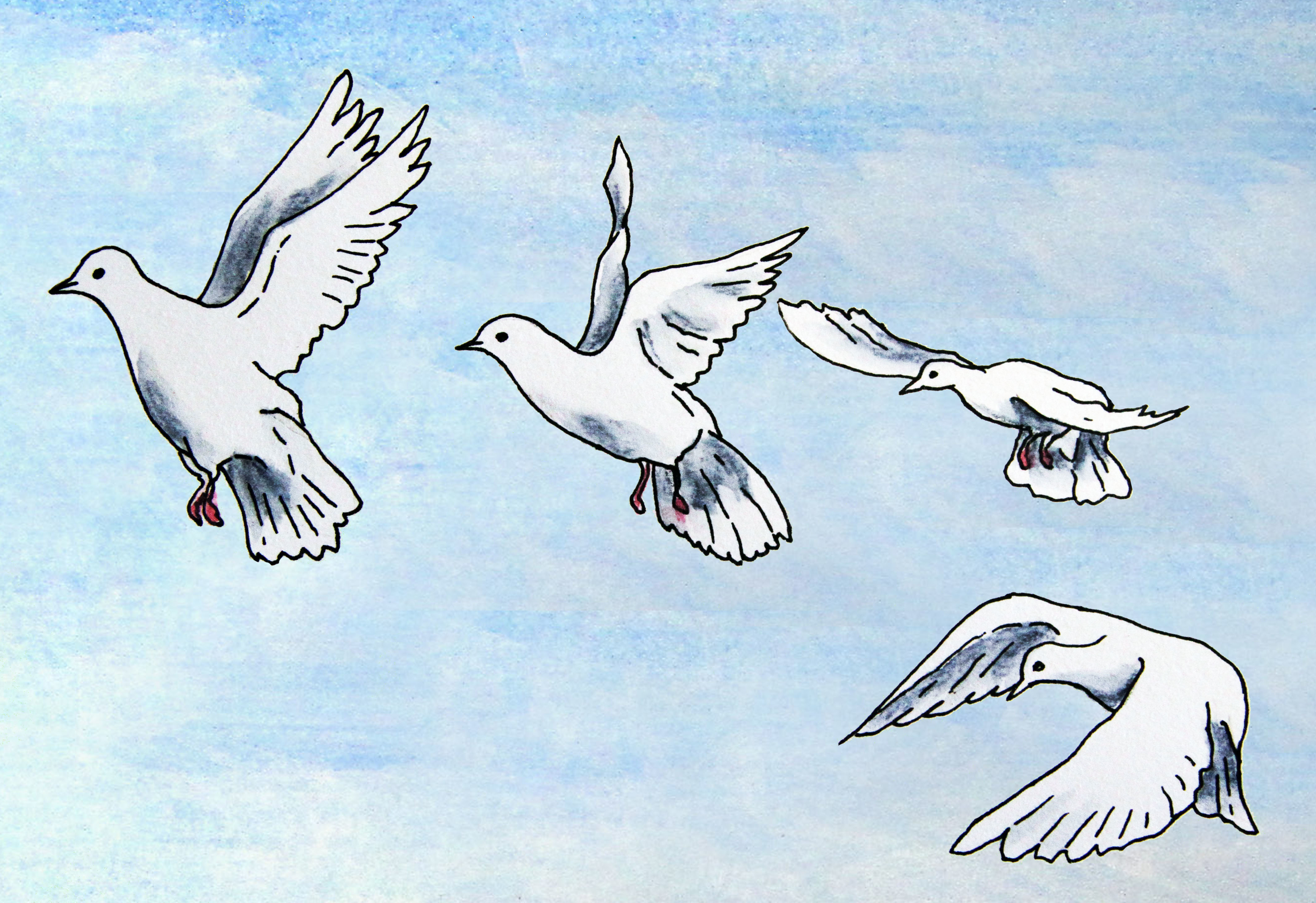
Illustrated by: Paul Swailes
11
THE GARDEN
Today is going to be a good day.
"Are you sure of that?" I hear you say
Well put it this way I will do my best
"I know you will, I expect nothing less."
It's not the same without you here
"I know it's different but you have nothing to fear
I am with you every day
Walking beside you every step of the way. "
I want to see you, hold your hand
"But you can on our stretch of land.
Look at the steps I struggled to make
The mossy grass I toiled to rake.
I uncovered the water trickling down the hill
I see our boy drinks from it still.
The outdoor kitchen I created especially for you.
And the roof over the hot tub I built that too.
Those rhododendrons we planted together
They will grow strong and go on forever.
The veggie plot I created with love.
I will watch you plant from up above.
Sow me sunflowers that will grow so high
Perhaps I will touch them here in the sky
It's your turn now to do what you can
Come on you're as good as any man! "
With you beside me I will do my best
"I wouldn't expect any less"
There's such a lot that I can do
And I'll do it knowing this time it's for you.
Pam Robinson
9
BERRY BLUE BOOBS
New Year's Day the start of the new year
What can we do that will raise a cheer?
Something wild to shock everyone.
Something different, something fun.
Let's swim in the sea and raise a penny or two
That's something different, we girls could do.
You never know it might be something we like
And money raised can go toward a South West Blood Bike.
We donned our fancy dress and drove to Hele Bay.
Crazy young ladies, I hear you all say.
The Berry Blue Boobs was the name of our team.
Five nervous ladies the likes you've never seen.
But we were determined to do this thing right
We were prepared, against our nerves we would fight.
Holding hands, we ran into the sea
Never realising just how cold it would be.
We raced into the sea with all of the crowd
Determined to make our families proud.
We battled the waves not making a fuss
Everyone was cheering, encouraging each one of us.
And when we had finished and were back on dry land
Warming our bodies, brushing off the sand.
We were thrilled with our achievement of what we had done.
What a way to start the year, what a way to have fun.
After the event we were delighted with all the support.
We got far more money than we would ever have thought.
£700 was the total amount that we raised.
When we told South West Blood Bikes, they were truly amazed.
So next New Year's Day you know what you can do
Dig out a swimsuit and you can come too.
Berry Blue Boobs will be out there once again.
With a bigger group of ladies, all a little insane!
Pam Robinson

Genuinely, huge thanks for your support from
Tee, Michelle, Pam, Jenny and Terri
33
THE MEN'S TRIP 1962
Edith
Clayton - Price 6d
Proceeds to Holme Village Hall
There's one day in the year that's important,
On this day there must not be a slip.
It's thought of, it's talked of, it's dreamed of for weeks
And this day is known as the Men's Trip.
First, there's a meeting for the members
To make sure that they all want to go.
Well, of course they're all ready to get a day off
So what's the meeting for, I don't know!
Well, they settle it first that they are going,
Then there's a meeting to get to know where.
The Lake District's always been popular
But last year it were Shrewsbury Fair.
But some didn't like it, the beer was two bob,
An they all felt that they had been done.
Harry Hinchliffe said "Damn it all, I'll pay 1/6 but I
Want tanner change for some fun!"
So, this year the Lake District were favoured,
It were settled without any fuss.
Then they all met once more by arrangement
To see who would see about bus.
Harold goes down to Baddeleys, then come up to Bob.
An then Bob goes belting to Roy,
Roy pops round to Ernest's and Ernest tells Rex,
And their hearts are all leaping with joy.
"But there's one fly in the ointment!" says Harold,
There be some empty seat, so they say.
I say I'll fill your bus up with women!"
Bob says, "We want no women that day!"
"Women are all right in their places,
If we are wanting some cakes for a stall,
Some parkin or toffee for the bonfire,
But when you've said that, you've said all!"
Roy says "Let's have do an give 'em hot dogs,
And if they don't like 'em they are funny ones.
Bob says, "Put my Edith down for some sausages."
Frank says, "Helen, I'm sure 'er'l do onions."
"Nay lad, that's my wife's privilege,
and I would not dare to vex.
Up to now Elsie's allus done the onions."
"And Elsie ull do 'em," says Rex.
I've digressed from my theme, was on about trip
They'ne provisionally ordered the bus.
Next on the Agenda is fixing the date,
So they met cos they had that to discuss.


Illustrated by: Paul Swailes
Bob says "I am not fussy on which day we go
As long as there's plenty to sup."
So they all study hard and thrash it well out
And they think that they'ne got it fixed up.
But Arthur Hadfield, consulting his diary
Says, "I'm sorry but I'll be away,
For I've booked for my lodgings near Buxton
And I hope to be fishing that day."
Now Arthur, grand chap, says "I don't want to spoil things
So just leave me out of coach."
But they all said "Nay, lad, we're depending on thee
To keep sober when we've had too much!"
Percy says "Can't we have it a bit later on?
There's been some grand days then I remember."
So at last it was settled and all was fixed up
For the 29th of September.
There's a meeting then for fixing the time
And a notice to put in the Co-op.
Then they all run round asking the other if they've seen it
In the window of the shop.
Then comes Friday night and they all have their bath,
On other Friday nights they're really quite clean.
But they fettle their feet and they cut their toenails
You'd think they were going to see the Queen.
And as soon as the alarm goes, Bob hops out of bed,
Gulps his tea, and fessons his shirt.
Then he brushes his trousers and looks at his shoes
To make sure they are quite free from dirt.
He's had all his ties out of the drawer day before
To see which goes with his suit best,
For if owt didn't match, well! It would be crime
The folk in Lakeland, you see, might be vexed.
An then the bus comes in . . . such excitement!
You ne'er saw such a fuss an palaver.
They all dash for bus wi ten minutes to spare,
An they all sit and wait for yar Arthur!
Then the bus goes out and we're left on our own,
But we are in no desperate plight.
We relax and do just what we like
And they all come back happy at night.
They'ne had their one day, its been perfect,
There hasn't been one single slip,
And we hope that they all have a good Do next year
When they go once again on Men's Trip!
Contributed by Bob Hobson
29

FEBRUARY
The time when skies are free from cloud,
Though still the robin whistles loud
In the bare garden croft.
The catkin, on the hazel tree,
Mistakes for summer flower the bee,
And round it hovers oft.
George Walter Thornbury
22
JACKDAW TIME
OF DAY
Virginia Evans
Four o'clock
on a winter afternoon
Is jackdaw time of day
They fly over the church and
Over the woods
In sociable groups
Djaaking
Not raucously rawking like
argumentative rooks
Or crossly cawing like
Complaining crows
jackdaws just amiably gossiply
Djaaking.

Illustrated by: Paul Swailes
18
THE LUCKY FEW
We are the lucky few are we
To live in such a place
Where rolling hills and gentle folk
Gives life an easy pace
There's nothing more that we could need
'Cos we have got it all
Our shop, our school, our pub
Our fluid Manor Hall
Folk are wont to gather there
They truly are sharp skilled
Wiff waffers, spinners, artists
Where wine glasses are filled
There's badders and upholstery
With knit and natter too
Choice is in abundance
There's so much that we can do
Community is at our heart
We thank those who take the lead
And their teams of volunteers
They are a special breed
There's Wendy with her bloomers(!)
To the challenge they will rise
Until their hard work triumphs
And wins that golden prize
To our shop we should be thankful
They're open every day
Through snow and flood and pestilence
Whatever comes their way
Their team is led by Karen
You're welcomed with a smile
With help from Sue and Jackie
They'll go the extra mile




Illustrations by: Peter Rothwell
And proudly stands our village church
With a faithful band of ringers
Its bells call out on Sunday morn
The choir and all its singers
The Globe has had its issues
Food's good, as is the wine
But when will it be open?
Your guess is as good as mine
There's Judie and her journal
Bringing news from all around
We thank her for the pages filled
And the stories she has found
The children like to go and play
There's football and the swings
Climbing frames, different games
They have so many things
The weather can be 'changeable'
Sometimes it can't get wetter
But when the sun shines down on us
There's nowhere, nowhere better
The visitors turn up in scores
In summer it's so busy
Their driving down our narrow lanes
Can kinda make you dizzy
But we smile and say you're welcome
And they envy us our life
As they go home and back to drudge
To face their daily strife
We are the lucky few are we
To live in such a place
Where rolling hills and gentle folk
Give life a gentle pace
Anon. 2021
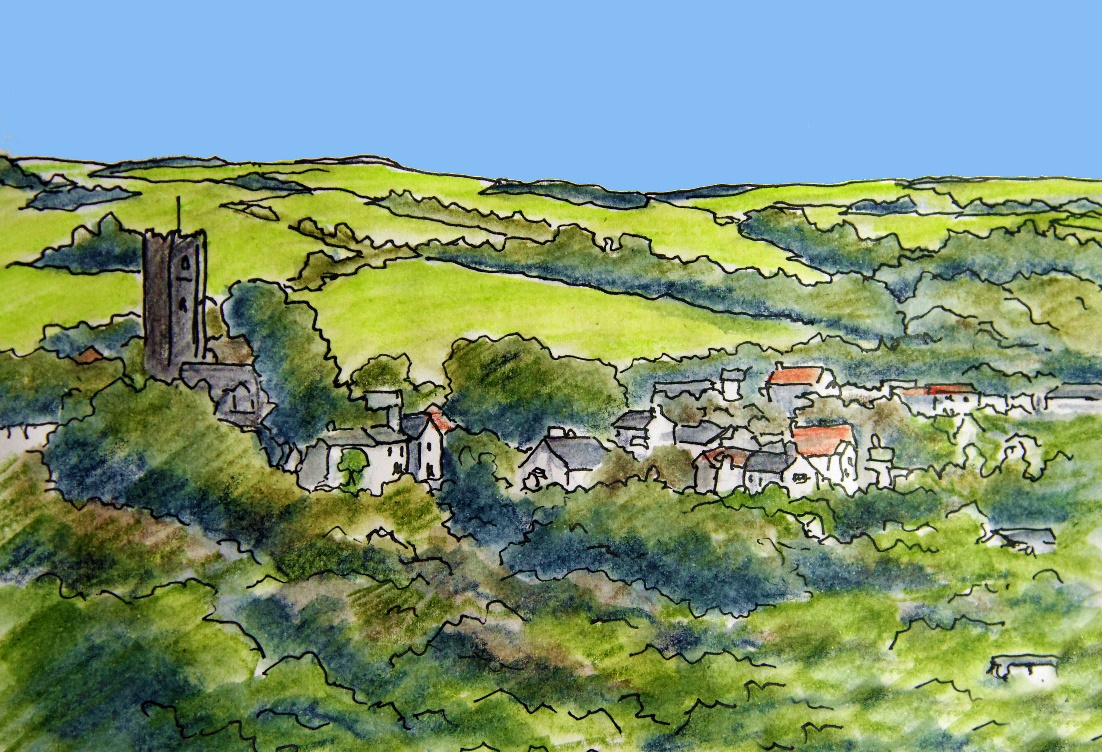
Illustration by: Paul Swailes
27
CHRISTMAS 2021
Enjoying old traditions, snubbing fancy new trends.
Christmas cards on the mantelpiece, no e-cards for me.
Nativity on the window-sill and carols around the tree.
Forget rubbish TV, films on repeat
Traditional games, time together with lots of special treats.
Christmas is a time, when we appreciate what's gone before.
Family traditions, who could want for more?
It's the simple things that make this time a truly special one.
Time altogether having good old family fun.
But if you're feeling low, or on your own for any particular reason.
Reach out and talk to someone during, what maybe, a particularly challenging season.
Don't sit alone at home, there may be others that feel the same.
Make your feelings known, together let's ease the pain.
Here's to a special Christmas for all,
enjoying whatever you like to do
A warm and happy celebration is what I wish for you.
Pam Robinson

Illustrated by: Paul Swailes
39
We reached the top of the Torrs
on a grey and windy day
the sea near black the sky clouded
dark over Ilfracombe
We looked west to Lundy
and the sky cracked open
a pale line of light
lightening the sea in patches
And as we watched
the line of light thickened
and brightened
And as we watched
second by second
the colour of the sea mutated
gradually
near black to thick dark blue to
clear green blue
We looked up
and the strip of light was wide and shiny
bright above a line of clouds and
the sun was warm and
the wind subsided
We turned
and saw Ilfracombe bathed
in golden sunlight
Virginia Evans - Lee Copse

Illustrated by: Paul Swailes
34
END OF
SUMMER
Mid-August and the summer flowers are fading
Replaced by seed heads hard and brown
Or floating fluffy shafts of down
Bees, butterflies and other insects
busy now after spring's late start
find other flowers
In the hedgerows dancing fuchsias dangle
and soft pink hemp agrimony
stands strong and tall
dreamy flaxen headed meadowsweet floats;
lacy hogweed and red campion linger...
In the meadows
knapweed and vetches still flourish
bunches of ragwort glow
and on the walls
stalwart Mexican daisies never stop
geraniums, some roses and the glorious
hanging baskets bloom on
high and mighty buddleia boasts its big
purple spears above banks of
fiery glowing montbretia
hydrangea's multi flowered heads have
suddenly dramatically opened
in beautiful bright
changing colours: from greenish white to
creamy yellow;
from shades of palest pink to lilac, purple,
deepest red and blue
Late August - summer's flowers are fading fast
early morning mists are creeping in
the scent of autumn's in the air
Virginia Evans- Lee
Copse

Illustration by: Paul Swailes
21
AUTUMN
As October nights draw in,
Reach for the firelighters; seek warmth from within.
Close the curtains; snuggle in for the night
As the owls hoot and the merlins take flight.
The trees undress each and every day.
Ever-changing colours, their limbs bow and sway.
Until a colourful carpet lies on the lawn.
Rich golden hues our gardens adorn.
The hedgehogs adore it, the squirrels too
Foraging around, so much to do.
There's food to be stored, time cannot wait
Now is the time to prepare to hibernate.
Stay warm and safe in each of your homes
Villagers of Berrynarbor, you are never alone.
Outside nature is slowly changing its face
Enhancing our enjoyment of this very special place.
Pam Robinson

Illustrated by: Paul Swailes
31
THE MANOR HALL
The Manor Hall in Berrynarbor is used by young and old
It stands proud in the heart of the village, a special sight to behold.
It's the place that hosts many activities, each and every day.
The place to learn new skills, socialise or simply come to play.
The children at Pre-school enjoy their regular sessions.
Learning through play is the key to all their lessons.
Teenagers and adults enjoy table tennis on a Friday night.
The Wine Club enjoy their tastings; wines, bold and heavy, others fruity and light.
Committees meet regularly in the Manor Hall
Planning events like 'Soup and Pud' and even a special ball.
The Upholstery Club, Spinners and Artists too,
Photographers and Berry in Bloom to name but a few.
Badminton Club use it, their fitness to maintain.
And Beaford Arts sometimes come to entertain.
The men's institute play snooker and enjoy meeting upstairs.
It's the place the village host fashion shows and Christmas fayres.
Here's hoping that things return to normal soon
And all the exciting activities will be able to fully resume.
The Manor Hall is special I am sure you will agree.
A place to support the whole community - that means you and me.
The 22nd August is the Manor Halls Summer Fete
Put it in your diary; mark it a special date.
We hope you will join us, come and see the stalls,
Buy raffle tickets, drink some Pimm's, there's something there for all.
Pam
Robinson

Illustrated by: Peter Rothwell
29
SINGING THRUSH
Here Here Here Here Here
Singit singit singit singit
Chup chup chup chup chup
Me an you me an you me an you
Furlough furlough furlough furlough
Do-y-doo do-y-doo do-y-doo
wheelie wheelie wheelie wheelie
Churrily churrily churrily churrily
see see see see see see
Piu piu piu piu piu
do it do it do it do it
Whee whee whee whee
Choo it Choo it Choo it choo it
Tu tu tu tu tu tu
Meeuu meeuu meeuu meeuu
Ooeeooo ooeeeoo ooeeoo ooeeoo
singit singit singit singit!
Interpreted by Virginia Evans

Illustrated by: Paul Swailes
9
OUR VILLAGE
What makes a village a special place?
Is it simply pretty houses that we call our base?
Is it the gardens that come to life each and every spring,
With the beautiful flowers and colours they bring?
Is it the church at the centre of it all?
The community shop, pub, or the manor hall?
Or is it the people, like you and me
Who ensure it's special for all to see?
A real mix of folk, young and old;
True Devonians and 'Blow-ins,' or so I am told.
Wherever we hail from Berrynarbor is now our home.
Around it's pretty roads we all like to roam.
We may be a mixture, who've come from lots of different places
Different backgrounds, different races.
But we all love this village, this very special place,
And are really very proud to call it our base.
Pam Robinson




Illustrations: Paul
Swailes
17
THE CAVEMAN'S LAMENT
me think about her when sun rises
me think about her when sun sets
me say to her how much me love her
she tell me love invent not yet
me make cave all warm and cosy
me lie bearskin on cave floor
me play song of love on bone flute
she choose cave of Tim next door
me no more go out hunt mammoth
me throw spear too short or long
me sit in cave me paint her picture
she say me got perspective wrong
me cook meal to show me love her -
diplodocus with fried beans -
she say food anachronistic
but me not know what this means
stone age mighty hard for lovers
yet rub two flints look what you get
small sparks lead to big inferno
but she say love invent not yet

Debbie Rigler Cook
Remembering Chris
This delightful poem, read at the Celebration of her Life on the 16th March, was a poem Chris cut out of the newspaper. She felt it summed up her beloved husband, Phil, which says much about her cheeky sense of humour!
Chris lived life to the full and encouraged others to do the same. She is much missed, not only by her family, but by her many friends here in the village.
It is said that the Caveman's Lament was written about 1.5 million years ago and is considered to be the world's oldest surviving poem about love.
16
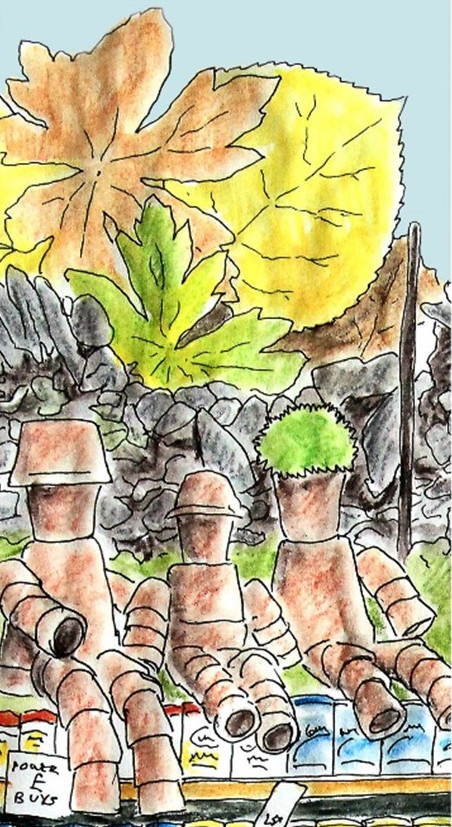
We arrived in September
Warm autumn days full of colour
Before October rain and wind set in
And November locked us in
There's lot to do here
In the house and garden
We find good people to help
With trees, a plumbing problem
building improvements
And a fallen wall
Most days I walk
Greeted by
Cheerful smiling faces
And friendly [mostly] dogs
. . . And Flowerpot people
We meet kindly neighbours
And are sustained by
the friendliness of the shop
So well stocked and organised
And everywhere around the village
Water is running and rushing
Gushing from pipes
Flowing from fields
December arrives
and little painted wooden Santa faces
appear outside houses on fences and walls
Christmas comes and goes
Without the usual social events
But with amazing light displays
Winter pansies and button daisies bravely bloom
Birds crowd around the bird feeder
And in January's harsh lockdown
everyday a new flower opens
Every day a new bird song is heard
Snowdrops come at last
And the first daffodils
February opens crocuses, primroses
miniature flags and grape hyacinth
And then freezes
With a fierce easterly wind
Warm weather follows
At last as the days lengthen
More flowers - and blossom now.
We are glad to be here and wait for spring
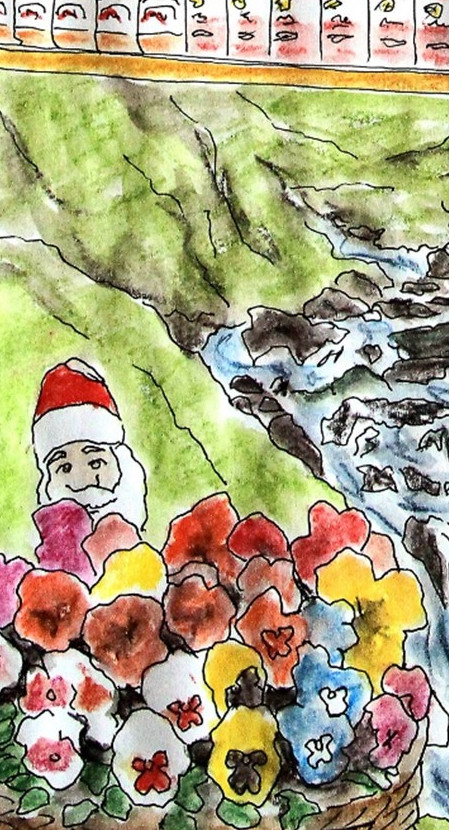
All illustrations by: Paul Swailes
Virginia Evans - Lee Copse

32
The end is in sight or so we've been told.
Soon friends and families, we can hug and hold.
As the vaccine is rolled out and we each take our turn
What are the things you look forward to, what do you yearn?
A drink in the pub without a substantial meal.
Getting together with friends- meeting for real.
Being allowed to have a party inside or out.
Holidaying again, getting out and about.
Browsing in shops; being able to wander.
Being able to touch goods, take time and ponder.
These are my thoughts what about yours?
For some it may simply be going outdoors.
For others it may take time to feel 'normal' again
Continued anxiety some may not feign.
Whatever your thoughts, as isolation comes to an end
Let's continue to support each other, neighbours and friends.
Oh, there's just one last point I should like to make
Keep supporting our Village Shop for goodness' sake.
Karen, Annie and Susan have been amazing throughout.
Our ability to get supplies, thanks to them, was never in doubt.
Thank you for staying open and being there, each and every day.
Ok. Now on the subject of Covid 19, I have nothing more to say!
Pam Robinson

Illustrations by: Paul Swailes
31
COVID
Stealing our freedom, causing quite a fright.
Sneaking into our home; an unwelcome guest.
A horrible virus, an evil pest.
Why had it chosen our house? Why us?
We're not the sort to make a big fuss.
But this thing was debilitating, it knocked us for six.
No medicine could cure it; nothing would fix.
We had to let it pass, take one day at a time.
Rest and pray that soon we'd feel fine.
Trust that our exhaustion would soon pass away
That our bodies would fight it and face a new day.
Supplies from dear friends, showing loving care
Homemade soup, bread and other great fayre.
FaceTime with family and friends from afar
No trips to the pubs or outings in the car.
Staying inside until the torment had ended.
Fighting exhaustion, until our bodies had mended.
Slowly, slowly we started to heal
Each day a little better we started to feel.
And now that the evil has truly past
We can go out again, enjoy walks at last.
Breathe deeply, take in fresh air
Enjoy the elements; the wind in our hair.
This virus is deadly, a frightening force
What can we do but let it take its course
Hopefully its impact will soon start to wane
and we can enjoy life together, once again.
Pam Robinson

Illustration by: Peter Rothwell
26
THE SUNFLOWER
Over the months it's further nurtured
A stalk appears and climbs up high
Tall and graceful reaching for the sky
Each day it continues to grow
Until one day its flower starts to show.
The biggest thing I have ever seen
With its golden head and stalk so green.
Standing proud, golden and glowing
For a while I wonder if it'll ever stop growing.
It makes me smile each time I sit down
Laughing in the wind with its golden crown.
Neighbours smile too as they go past
How long will it grace us, how long will it last?
From a tiny seed to a giant on the hill
Even now you have gone I remember you still.
Pam Robinson
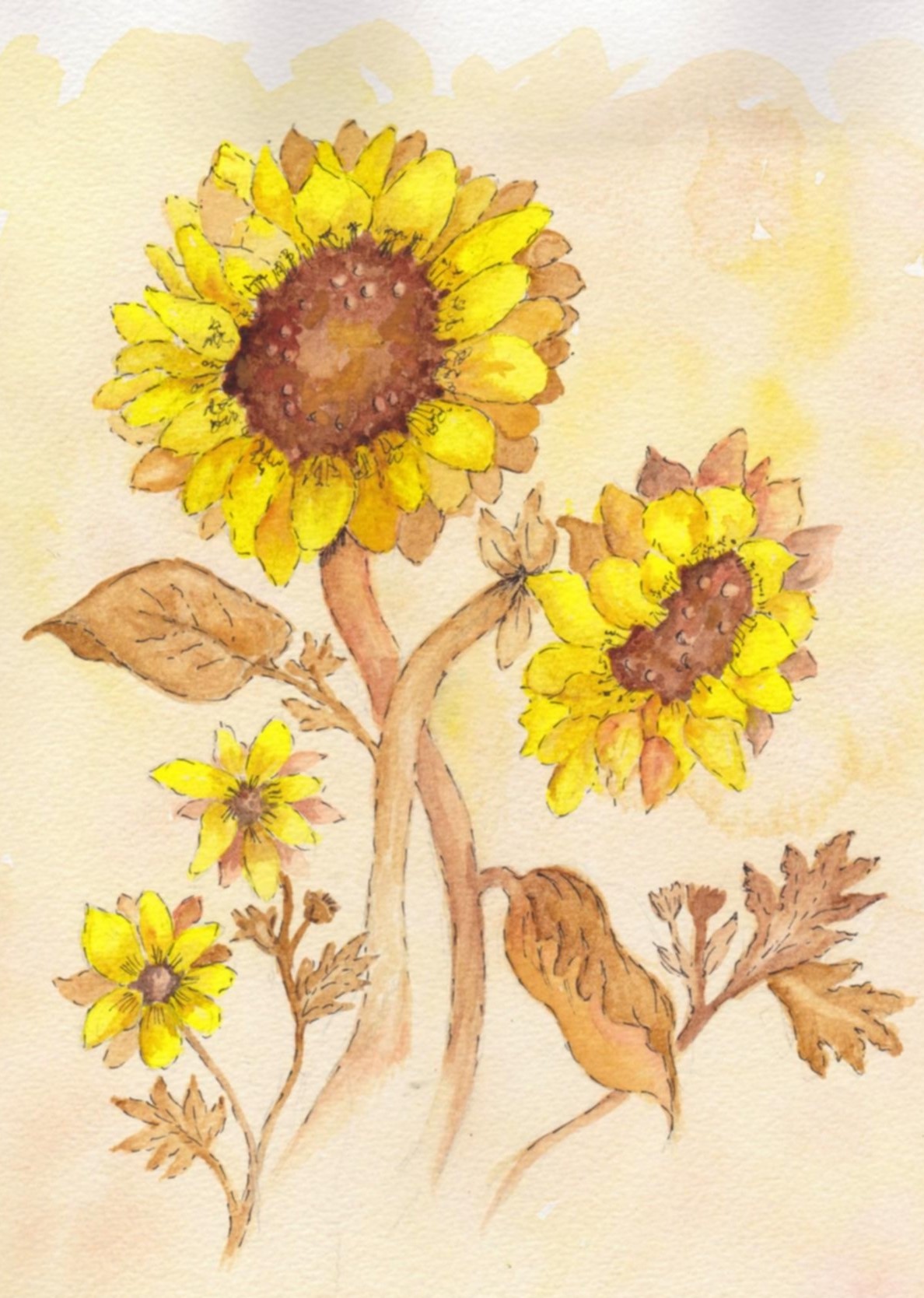
Illustrated by: Judie Weedon
17
THE GROCKLES
They arrived in a steady stream
Our sense of security now a dream
One or two at first
Then a steady convoy at its worst.
Fear and anxiety come with them
Spread of the virus we wish to stem.
And yet for some this is their second home
Weeks cooped up - why shouldn't they now roam?
Our businesses need the income
Boris says it's ok, so why should we stop them?
Whilst our safety and security we wish to maintain
Things really cannot stay the same.
Life goes on in a new kind of normal
But there are rules to uphold; keep things formal.
However we feel about the grockles' arrival
Let's respect each other and support our survival.
Whilst there are many more people in the village and around
Remember the rules, stay safe and sound.
We all have our different points of view
But let's be tolerant, and continue to support each other too.
Pam Robinson
5
BERRYNARBOR IN
LOCKDOWN
The
last few weeks have challenged, communities far and wide
Causing folk to come together, put differences aside.
Our own community has been no different from all of the rest.
This COVID-19 pandemic has put us to the test.
How has Berrynarbor managed throughout these troubled times?
Let me try and sum it up by reporting it in rhyme.
Once we'd overcome the need to query who was staying where?
Concentrated on love and kindness; showing that we care.
Neighbours helping neighbours; collecting prescriptions too.
Baking cakes, showing kindness, doing whatever we needed to do.
Our pub jumped into action, providing a new service straight away.
Meals on wheels delivered to our door; roasts on each Sunday.
Our local shop has been amazing, delivering groceries to our door.
A beacon in the community, standing at the core.
A team of special people have kept things going throughout.
Their hard work and resilience was never in any doubt.
Whilst Tesco's shelves were empty, our shop had all we need.
From loo paper and flour, to fresh veg and meat to feed.
On Thursday nights we'd come together, cheering, banging pans.
Celebrating front line workers; the NHS's biggest fans.
All across the village we'd stand and make a noise.
Families on the door step; husbands and wives, girls and boys.
People standing together shouting really loud.
Showing our appreciation and making the workers feel quite proud.
Our little village has certainly shown it has a great big heart.
A community coming together, with residents playing their part.
Hopefully we will come through this: our efforts not in vain.
Survivors moving forward, but will life ever be quite the same?
When this is all over let's not forget the joy of walking the extra mile
Or the friendly greetings we offer with each and every smile.
Let's continue to buy local; appreciate our shop and pub
Visit the church and community hall; enjoy the village hub.
Try not to become too busy, rushing about in labour.
Enjoy time together. Continue to love
your neighbour.
Let's have fun together again, meeting face-to face
and realise, Berrynarbor,
our village, is a truly special place.
Pam Robinson
20
THE PARTS OF SPEECH
POEM
Every name is called a NOUN
As field and fountain, street and town.
In place of noun the PRONOUN stands,
As he and she can clap their hands.
The ADJECTIVE describes a thing,
As magic wand or bridal ring.
The VERB means action, something done,
As read and write and jump and run.
How things are done the ADVERBS tell,
As quickly, slowly, badly, well.
The PREPOSITION shows relation,
As in the street or at the station.
CONJUNCTIONS join, in many ways,
Sentences, words, or phrase and phrase.
The INTERJECTION cries out, "HARK!
I need an exclamation mark!"

Illustated by: Nigel Mason
20
MEMORIES
Post-Christmas Positivity
When Christmas is over and the decorations cast aside
Hold onto the memories; the joy that cannot be denied.
The time spent with family sitting altogether
Partying with friends certainly brought much pleasure.
Wreath-making, the Sterridge lights, carol singing too,
Our first Christmas in Berrynarbor, a happy time with you.
There's lots to be thankful for as the festive season reaches its end.
For health and happiness and each and every friend.
Goodbye Christmas with chocolate gifts and flowers
I'm ready to welcome spring with more Devonshire showers.
Living here, in Berrynarbor, a truly wonderful place
Has certainly brought an enormous smile to my face.
I'm told that very soon, snowdrops and daffodils will appear.
Reminding us that winter will finish and spring will soon be here.
I am sure the next season, in our village, will be a very special one
A wonderful setting to continue having fun.
Our happy memories will never change or Disappear
We can just add to them from year to year.
Pam
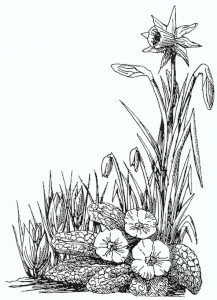
Illustration by: Paul Swailes
2

The Song of the Holly Fairy
O, I am green in Winter-time,
When other trees are brown;
Of all the trees [so saith the rhyme]
The holly bears the crown.
December days are drawing near
When I shall come to town,
And carol-hoys go singing clear
Of all the trees [O hush and hear!]
The holly bears the crown!
For who so well-beloved and merry
As the scarlet Holly Berry?
Cicely Mary Barker
Reproduced by permission of Frederick Warne & Co.
23

Great Torrington

High Bickington

Parracombe
THE NORTH DEVON PRAYER
Our landscape
Wrought here in North Devon
Hallowed be thy Ilfracombe
Thy King's Nympton come
Thy Lee and Woolacombe
This earth be it Instow, Stoke or Meddon
Give us Croyde Bay and Muddiford
And forgive us our Barnstaple
As we honour Brayford, Sheepwash and Great Torrington
Lead us through all Tarka request stations
But deliver us from Yeo Mill
for North Devon is High Bickington
The Parracombe, Week and Warleigh
for ever and ever
Barum
Beaford Arts
Contributed by: Nora and Alan

Instow

Brayford

Ilfracombe

Kings Nympton
Illustrations by: Paul Swailes
31
THE NEWCOMERS
So we have really done it, we have started our new adventure in North Devon.
The boxes are unpacked, the dream cottage is ours, we feel we own a little bit of heaven.
Berrynarbor is our new home.
A village so warm and welcoming, you need never feel alone.
Everybody has been so friendly, greeting us with great support
It's a kind and caring community, as we had initially thought.
From our very first visit, admiring the flowers in the tub
Meeting friendly locals, drinking in the pub.
We knew this was a special place, a village we'd like to be
Now we are living the dream, we have our very own key!
We feel quite at home only a few weeks in.
Indeed, it seems like a wonderful lottery win.
our cottage is a white one, along Sterridge Valley.
By the little bridge where walkers stop and dally.
It's quiet and calm with a stream outside our door.
I really don't think we could want for anything more.
I have realised happiness isn't just something that we feel.
I can see it, I can touch it: it's totally real.
I confess to feeling a little nervous starting life anew
I need not have worried, if I only knew
people would welcome us right from the start
Would help us feel so comfortable, would warm my heart.
What a wonderful impression you villagers have created.
Simple smiles and 'hellos' can never be overrated.
A community so friendly, honest and true
Special for all the little things you say and do.
So this poem is my way of saying thank you to each and every one
I am looking forward to getting to know your more, in the weeks and months to come.
Pam [and Nigel] Robinson

Illustrated by: Paul Swailes
25
The Fly
Little Fly
Thy summer's play,
My thoughtless hand
Has brush'd away.
Am not I
A fly like thee?
Or art not thou
A man like me?
For I dance
And drink and sing;
Till some blind hand
Shall brush my wing.
If thought is life
And strength and breath;
And the want
Of thought is death;
Then am I
A happy fly,
If I live,
Or if I die.
William Blake
[1757 - 1827]
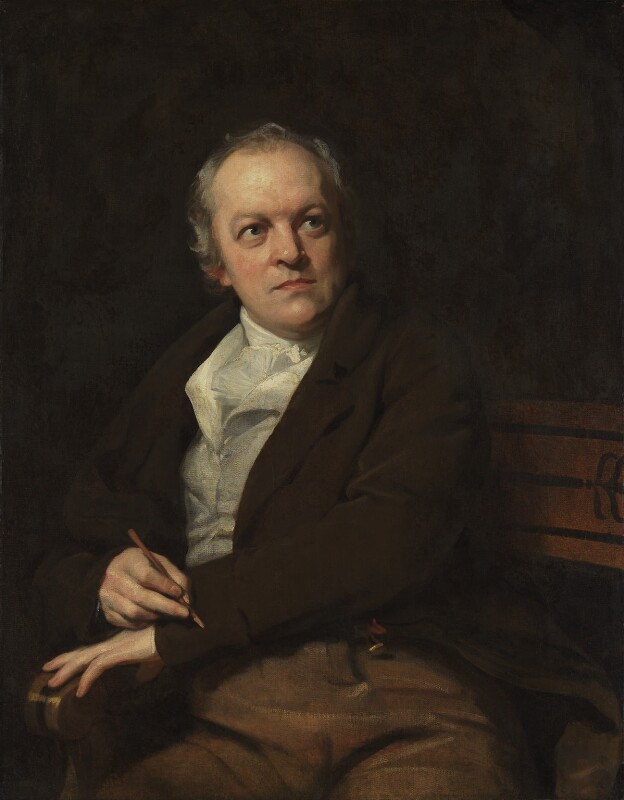
William Blake
by Thomas Phillips
oil on canvas, 1807
Purchased, 1866
NPG 212
© National Portrait Gallery, London
Licenced under CC BY-NC-ND 3.0
Receipt of Mike's piece about his reluctant fly and the William Blake poem coincided with the unveiling of the stone marking William Blake's grave on the 191st anniversary of the poet and painter's death in 1827. It also marked the conclusion of 14 years of detective work and campaigning for Carol and Louis Garrido, two of his admirers. Their fascination for the man who wrote The Tyger and Jerusalem, England's unofficial national anthem. as well as his art and engravings, led them to visit Bunhill Fields in London to find his grave. They discovered only a stone saying that the remains of Blake and his wife Catherine, lay nearby.
After two years of research, they pin-pointed the exact spot and after years of fundraising, the Blake Society has now been able to mark the spot with an official memorial.
Blake trained as an engraver, illustrating books and reproductions of art in churches around London, but went on to produce his own illuminated books and his prophetic works based on his own invented mythology. He was interested in the past, present and future, in ancient, pre-Christian culture and ancient history, as well as the working conditions of children and the state of Britain at that moment. He looked forward to the future and what it might look like.
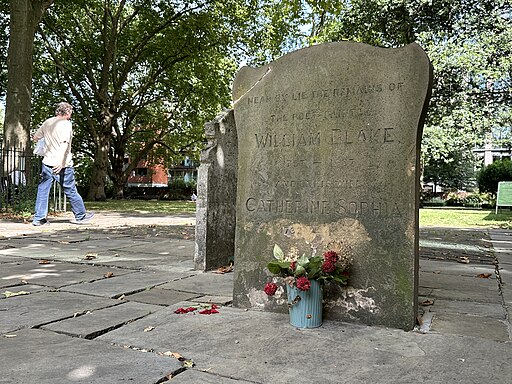
William Blake's original grave stone
Matt Brown, CC BY 2.0, via Wikimedia Commons
27

BREXIT
This poem [or is it a lament?] was sent in by Maureen [Scott-Nash]. By John Gordon, it was first published in the Daily Telegraph in February and is reproduced with John's kind permission.
They showed me two sealed boxes and invited me to choose,
It really was so simple, how could anyone refuse?
The one was labelled Brexit, the other one Remain,
Pick one I was told, your chance may never come again.
I understand the labels, but they don't help me decide.
Before I choose I'd like some clues - what is it that's inside?
It's clear as day said Mrs. May, an idiot could figure,
Labels are too small for you? Perhaps you'd like them bigger?
Oh I can read the labels I hurry to explain,
I need to know the contents or I'm tempted to abstain.
Take Brexit for example, what does that indicate?
Oh Brexit - that means Brexit - please try to concentrate!
OK then I try again, Remain - what's that about?
She says it's obvious to me, can there be any doubt?
Well yes there can, and rather than give meaningless replies
Give us the facts, we'd like brass tacks - evasion sounds like lies.
So in the end I gave my vote, a little box I ticked,
But as events unfolded, I wondered what I'd picked.
While politicians argue, and as confusion grows
We might begin to wonder if anybody knows.
John Gordon
33
Whose woods these are I think I know.
His house is in the village though;
He will not see me stopping here
To watch his woods fill up with snow.
My little horse must think it queer
To stop without a farmhouse near
Between the woods and frozen lake
The darkest evening of the year.
He gives his harness bells a shake
To ask if there is some mistake.
The only other sound's the sweep
Of easy wind and downy flake.
The woods are lovely, dark and deep,
But I have promises to keep,
And miles to go before I sleep,
And miles to go before I sleep.
Robert Frost
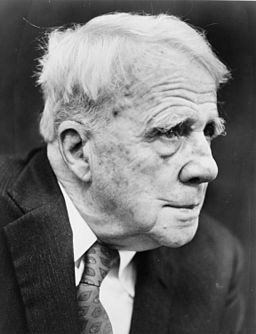
Robert Frost - 1959
Walter Albertin, World Telegram staff photographer
Public domain, via Wikimedia Commons
Robert Lee Frost was an American poet. His work was initially published in England before it was published in America. He was born on the 26th March 1874 in San Francisco and died in Boston on the 29th January 1963. He was at one time the United States Poet Laureate and was a recipient of the Pulitzer Prize for Poetry.

Illustrated by: Paul Swailes
28
A RED-INDIAN WEDDING PRAYER
Now you will feel no rain, for each of you will be shelter for the other
Now you will feel no cold, for each of you will be warmth to the other
Now there will be no loneliness, for each of you will be companion to the other
Now you are two persons, but there are three lives before you:
His life, her life and your life together
Go now to your dwelling place, to enter into the days of your life together
May beauty surround you both in the journey ahead and through all the years
May happiness be your companion to the place where the river meets the sun
And may your days together be good and long upon this earth
8
EYE HALVE A SPELLING CHECKER
I halve a spelling checker
It came with my pea sea.
It plainly marcs four my revue
Miss steaks eye kin knot sea.
Eye strike a key and type a word
And weight four it two say,
Weather eye am wrong oar write
It shows me strait a weigh.
It nose bee fore two long,
And eye can put the error rite
Its rare lea ever wrong.
Eye have run this poem threw it
I am shore your pleased to no,
Its letter perfect awl the weigh
My checker tolled me sew.
3
A TRIBUTE
I recently heard that David, the husband of my good friend Anthea - we met some 60 years ago on a residential secretarial course in Eastbourne - had died following years of poor health. I have admired the way that in spite of health problems, cheerfully they have never let them curtail their lifestyle, enjoying life to the full.
I was moved by the tribute Anthea paid to David on his 80th birthday and again later at his funeral, and felt I should like to share it with you. It is so good to hear praise for our wonderful National Health Service.
For David By Anthea
I won't be here next year,
I fear.
Three heart attacks -
Time left, nine months max.
How silly, they said,
Don't just sit on your arse,
What you need, like Stonehenge,
Is a by-pass.
I won't be here next year,
I fear.
My carotid has a block;
I'm just a poor old crock.
How silly, they said,
Don't sit there pining,
What you need, like your saucepan,
Is some Teflon lining.
I won't be here next year,
I fear.
I'm failing so fast
I can't possibly last.
How silly they said,
You're not being smart.
What you need, like a lettuce,
Is a good heart.
I won't be here next year,
I fear.
I keep falling, it's a pain,
There's water on my brain.
How silly, they said,
Don't get in a flap,
What you need, like your sink,
Is a tap.
I won't be here next year,
I fear.
Crusty lumps on my skin
Mean I'm rotting within.
How silly, they said,
If we have your approval
We'll need, like your bin-men
To arrange for removal.
I won't be here next year,
I fear.
I have problems to pee;
It's curtains for me.
How silly they said,
It wants no analysis,
What you need - three and a half
hours a day, three days a week
Is dialysis.
Forty years on from the very first blip,
That time when your health really started to dip,
We will fix you, they said;
It's not been a picnic, not without stress, but
What a brilliant job from the great NHS.
This problem's too serious
The outlook is bleak
We can't fix him, they said,
He's so fragile and weak, so
Hold his hand, shed a tear,
He won't be here, next year,
We fear.
To be downcast and sad would be totally wrong
Let's raise a loud cheer he was with us so long.
With my love to Anthea and all the family - Judie Weedon
5
GOLDEN GLORIES
Christina Rossetti [1830-1894]

The buttercup is like a golden cup,
The marigold is like a gold frill.
The daisy with a golden eye looks up,
And golden spready the flag beside the rill,
And gay and golden nods the daffodil,
The gorsey common swells a golden sea,
The cowslip hangs a head of golden tips,
And golden drops the honey which the bee
Sucks from sweet hearts of flowers,
and stores and sips.


31
SNOWDROP
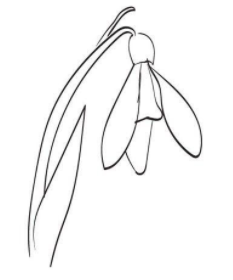
Fearless fragile, and wondrous winter flower,
Lonely lantern bearer, in the darkest hour,
Bold witness, to the bitter icy blast
Trembling in defiance, you remain steadfast,
Bravely breaching the frozen crystal crust,
The truth to tell, propels your thrust,
A pendulous pearl, on cold winters ear,
Whispering in prophecies, of change and cheer,
A pious sister, head bowed in prayer,
Renewing your vows, each start of year,
Slender, in habit green and wimple white,
Your mission, to bring forth hope and light,
In sorry orchards, now denuded and forlorn,
Amongst tilted tombstones, all weather worn,
From clustered cells, you spread the word,
To the winter weary, and those despaired,
The intemperate tyrant is in retreat,
Stretching days, will, long night defeat,
Your faith a spur, to the flagging heart,
As trust appears, dark doubts depart,
The sun scales higher, the leaden sky,
The smothered earth, once more does sigh,
Your three petalled bell, the changes ring,
Beyond the bleak horizon, comes jutting spring.
A special tribute to the Snowdrop written by Chelsea poet
John Armstrong for the Chelsea Physic Garden
4
HOME THOUGHTS FROM ABROAD
O, to be in England
Now that April 's there,
And whoever wakes in England
Sees, some morning, unaware,
That the lowest boughs and the brushwood sheaf
Round the elm-tree bole are in tiny leaf,
While the chaffinch sings on the orchard bough
In England-now!
And after April, when May follows,
And the whitethroat builds, and all the swallows!
Hark, where my blossom'd pear-tree in the hedge
Leans to the field and scatters on the clover
Blossoms and dewdrops-at the bent spray's edge-
That's the wise thrush; he sings each song twice over,
Lest you should think he never could recapture
The first fine careless rapture!
And though the fields look rough with hoary dew,
All will be gay when noontide wakes anew
The buttercups, the little children's
dower
Far brighter than this
gaudy melon-flower!
Robert Browning
[1812-1889]
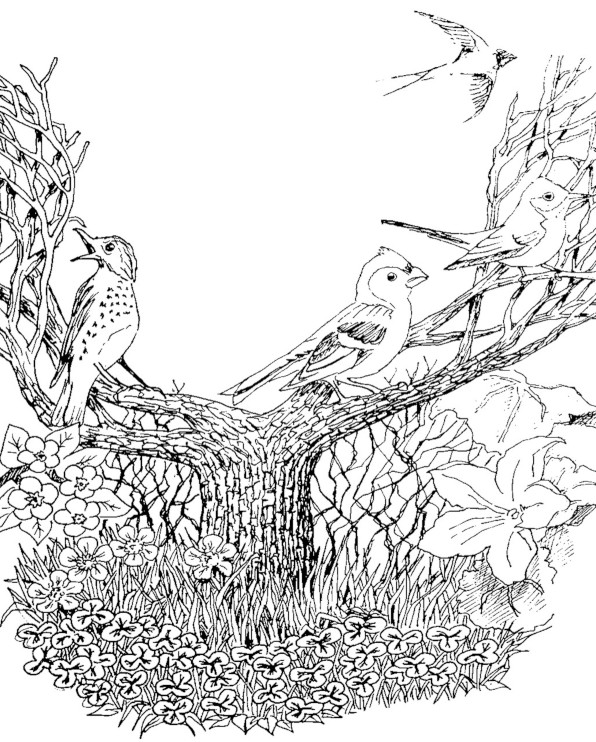
Illustrated by: Paul Swailes
6
WHAT A COINCIDENCE!
This year's National Poetry Day fell on the 8th October, just after the October issue of the Newsletter with its article on Thomas Hardy and Castle Boterel [Boscastle] was circulated. 'My Favourite Poem' by Andrew Marr who says, 'Shut the door, turn off the music and read a poem on National Poetry Day', was this poem by Thomas Hardy.
At Castle Boterel
As I drive to the junction of lane and highway,
And the drizzle bedrenches the waggonette,
I look behind at the fading byway,
And see on its slope, now glistening wet,
Distinctly yet
Myself and a girlish form benighted
In dry March weather. We climb the road
d
Beside a chaise. We had just alighted
To ease the sturdy pony's load
When he sighed and slowed.
What we did as we climbed, and what we talked of
Matters not much, nor to what it led, -
Something that life will not be balked of
Without rude reason till hope is dead,
And feeling fled.
It filled but a minute. But was there ever
A time of such quality, since or before,
In that hill's story ? To one mind never,
Though it has been climbed, foot-swift, foot-sore,
By thousands more.
Primaeval rocks form the road's steep border,
And much have they faced there, first and last,
Of the transitory in Earth's long order ;
But what they record in colour and cast
Is that we two passed.
And to me, though Time's unflinching rigour,
In mindless rote, has ruled from sight
The substance now, one phantom figure
Remains on the slope, as when that night
Saw us alight.
I look and see it there, shrinking, shrinking,
I look back at it amid the rain
For the very last time; for my sand is sinking,
And I shall traverse old love's domain
Never again.
Thomas Hardy
.jpg)
Boscastle, Cornwall
Andrew Bone from Weymouth, England, CC BY 2.0
via Wikimedia Commons.

Boscastle Harbour
Boscastle Harbour by Ian Capper, CC BY-SA 2.0
via Wikimedia Commons
5
Miss Me
When I come to the end of the
road and the sun has set for me,
I want no rites in a gloom-filled room,
Why cry for a soul set free!
Miss me a little, but not too long,
and not with your head bowed low.
Remember the love that we once
shared, miss me but let me go.
For this journey we all must take,
and each must go alone.
It's all part of the Master plan,
a step on the road to home.
When you are lonely
and sick of heart,
go to the friends we know
and bury your sorrows
in doing good deeds,
Miss me, but let me go.
Author Unknown

7
Handprints on the cupboard
and shoes in the hall.
Toilet seat's up and there's
mud on the wall.
The shelves in the kitchen
are continually bare,
There's toys on the couch
and jeans on the chair.
Wrestling and mud
and cars and noise,
I'm sure you guessed . . .
I'm the mother of boys!
Anon

Illustrated by:
Debbie Rigler Cook
24
I'VE BEEN WAITING FOR CHRISTMAS
And it's almost here.
I've been waiting for Christmas,
Santa's getting near.
Can't you hear the sleigh bells ringing?
Reindeer up so high.
Can't you hear the children singing,
As they watch the sky.
Anon

Artwork: Debbie Rigler Cook
35
IN A FIELD
And there I was in the middle of a field,
The furrows once called 'scores' still with their gloss,
The tractor with its hoisted plough just gone
Snarling at an unexpected speed
Out on the road. Last of the jobs,
The windings had been ploughed, furrows turned
Three ply or four round each of the four sides
Of the breathing land, to mark it off
And out. Within that boundary now
Step the fleshy earth and follow
The long healed footprints of one who arrived
From nowhere, unfamiliar and de-mobbed,
In buttoned khaki and buffed army boots,
Bruising the turned-up acres of our back field
To stumble from the windings' magic ring
And take me by a hand to lead me back
Through the same old gate into the yard
Where everyone has suddenly appeared,
All standing waiting.
SEAMUS HEANEY
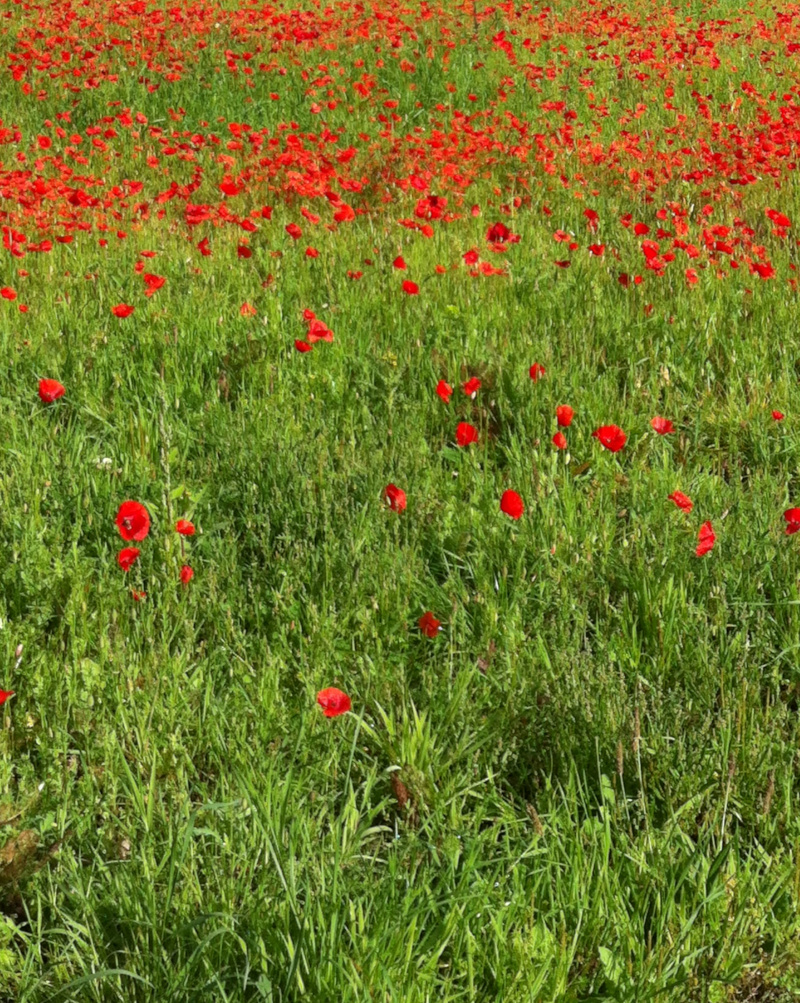
38
LOST INTREPID GRANDMA
The computer swallowed Grandma
Yes, honestly, it's true!
She pressed Control and Enter
And disappeared from view.
It devoured her completely,
The thought just makes me squirm -
She must have caught a virus
Or been eaten by a worm!
I've searched through the Recycle Bin
And files of every kind;
I've even used the Internet,
But nothing did I find.
In desperation, I asked Jeeves
My searches to refine,
But, his reply was negative,
Not a thing was found online.
So, if inside your Inbox
My Grandma you should see,
Please scan & copy/paste her
In an e-mail back to me.
29
SLOW
DANCE
Have
you ever watched kids on a merry-go-round?
Or listened to the rain slapping on the ground?
Ever followed a butterfly's erratic flight?
Or
gazed at the sun into the fading night?
You'd better slow down. Don't dance so
fast.
Time is short. The music won't last.
Do you
run through each day on the fly?
When you ask, "How are you?"
Do you hear the reply?
When the day is done, do you lie in your bed,
With
the next hundred chores running through your head?
You'd better slow down Don't dance so fast.
Time is short The
music won't last.
Ever told your child, we'll do it tomorrow?
And in your haste, not seen his sorrow?
Ever lost touch, let a good friendship die
Cause you never had time to call and say 'Hi'.
You'd better slow down. Don't dance so
fast.
Time is short. The music won't last..
When you run so fast to get somewhere,
You miss half the fun of getting there.
When you worry and hurry through your day,
It is like an unopened gift . . . thrown away.
Life is not a race. Do take it slower
Hear the music before the song is over.
This
poem was written by a terminally ill young girl whose only wish was to tell
everyone to live their life to the fullest, since she never will.
4
YULETIDE
Season of mirth and plenty;
Food enough for twenty.
Wine and liquid freely flowing;
Happy little faces glowing.
Present spread around the tree,
Cards galore for you and me,
Twinkling fairy lights around
Will keep you smiling, I'll be bound.
A whopping pile of heavy logs,
Juicy bones for little dogs.
Turkey, apple sauce and sprouts,
Happy little kiddies' shouts
Pudding, mince pies and brandy butter,
Stuff yourself until you splutter.
Remember, too, old friends and true,
So here's a toast I give to you ...
'Happy Days!'
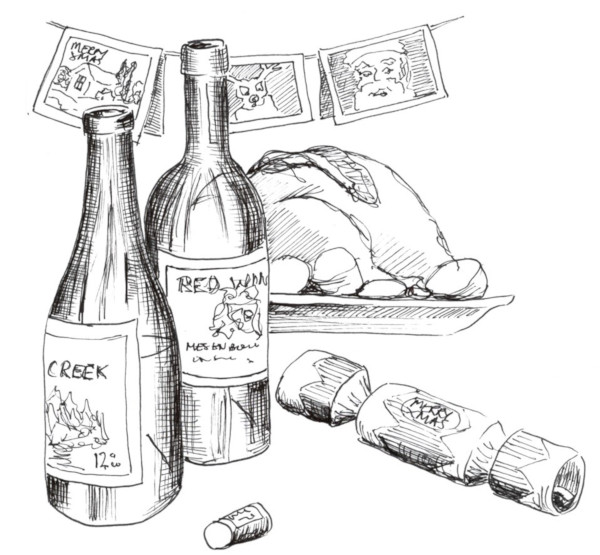
Illustration by: Paul Swailes
Trev
34
NOVEMBER
Red o'er the forest peers the setting sun;
The line of yellow light dies fast away
That crown'd the eastern copse; and chill and dun
Falls on the moor the brief November day.
Now the tired hunter winds a parting note,
And Echo bids good-night from every glade;
Yet wait awhile and see the calm leaves float
Each to his rest beneath their parent shade.
How like decaying life they seem to glide
And yet no second spring have they in store;
And where they fall, forgotten to abide
Is all their portion, and they ask no more.
Soon o'er their heads blithe April airs shall sing,
A thousand wild-flowers round them shall unfold,
The green buds glisten in the dews of Spring,
And all be vernal rapture as of old.
Unconscious they in waste oblivion lie,
In all the world of busy life around
No thought of them-in all the bounteous sky
No drop, for them, of kindly influence found.
Man's portion is to die and rise again:
Yet he complains, while these unmurmuring part
With their sweet lives, as pure from sin and stain
As his when Eden held his virgin heart.
John Keble [1792-1866]

Illustration by: Paul Swailes
44
AUTUMN

Illustration by: Paul Swailes
Season of mists and mellow fruitfulness,
Close bosom-friend of the maturing sun;
Conspiring with him how to load and bless
With fruit the vines that round the thatch-eves run;
To bend with apples the moss'd cottage-trees,
And fill all fruit with ripeness to the core;
To swell the gourd, and plump the hazel shells
With a sweet kernel; to set budding more,
And still more, later flowers for the bees,
Until they think warm days will never cease,
For Summer has o'er-brimm'd their clammy cells.
Who hath not seen thee oft amid thy store?
Sometimes whoever seeks abroad may find
Thee sitting careless on a granary floor,
Thy hair soft-lifted by the winnowing wind;
Or on a half-reap'd furrow sound asleep,
Drows'd with the fume of poppies, while thy hook
Spares the next swath and all its twined flowers:
And sometimes like a gleaner thou dost keep
Steady thy laden head across a brook;
Or by a cyder-press, with patient look,
Thou watchest the last oozings hours by hours.
Where are the songs of Spring? Ay, where are they?
Think not of them, thou hast thy music too,-
While barred clouds bloom the soft-dying day,
And touch the stubble plains with rosy hue;
Then in a wailful choir the small gnats mourn
Among the river sallows, borne aloft
Or sinking as the light wind lives or dies;
And full-grown lambs loud bleat from hilly bourne;
Hedge-crickets sing; and now with treble soft
The red-breast whistles from a garden-croft;
And gathering swallows twitter in the skies.
John Keats
[1795-1821]
1


Harry Weedon - Aged 9
28
ODE TO THE CUCKOO
Thou messenger of Spring!
Now Heaven repairs thy rural seat,
And woods thy welcome ring.
What time the daisy decks the green,
Thy certain voice we hear:
Hast thou a star to guide thy path,
Or mark the rolling year?
Delightful visitant! with thee
I hail the time of flowers,
And hear the sound of music sweet
From birds among the bowers.
The school-boy, wandering through the wood
To pull the primrose gay,
Starts, the new voice of Spring to hear,
And imitates thy lay.
Thou flit's thy vocal vale,
An annual guest in other lands,
Another Spring to hail.
Sweet bird! thy bower is ever green,
Thy sky is ever clear;
Thou hast no sorrow in thy song,
No Winter in thy year!
O could I fly, I'd fly with thee!
We'd make, with joyful wing,
Our annual visit o'er the globe,
Companions of the Spring.
Michael Bruce
[1740-1787]
.jpg)
Andy Morffew from Itchen Abbas, Hampshire, UK
CC BY 2.0, via Wikimedia Commons
Trevor Whiteley
1
TO MUMMY
60 Glorious Years!

This card shows how it all began -
A family-tree for you to keep,
With details of your three black sheep!
You may feel it's a sad event
[Tho' surely one you can't prevent!
When sixty birthdays you recall -
And days and years that made them all.
But we beg you, wipe away that tear,
For we recall, oh, Mummy dear,
How through those years, Mama was there
To wipe our noses, comb our hair,
To wash our clothes and cook our food
And cope with every childish mood;
To help with 'prep' and lend an ear
To every whine or moan or fear
That adolescence always brings -
And you were good at finding things
That we had lost or sent astray.
A hundred crises every day
You sorted out with cool aplomb -
Where did you get your patience from?
On holidays down by the sea
You built jolly cottages for me;
Fifteen years later, up in Town,
When 'boyfriend troubles' got me down
Home at week-ends I'd often come
For sympathy from poor old Mum!
We must have driven you nearly mad;
There must have been, too, times galore
When in the midst of dreary chore
You had to raise a sunny smile
But wondered, 'Is it all worthwhile?'
And through it all, you'd always show
The way 'twas right for us to go.
With Daddy you were hand in glove
To give us discipline and love.
And so for love, and treat [and spanks]
We render you our grateful thanks,
And now the birds have left the nest
They wish for you a well-earned rest,
With 'peace and quiet', much joy, few tears -
May these be your 'reviving' years!

This delightful tribute to a much loved
mother was written for Joyce Clay, now of Lee Lodge and at 101 last November,
one of our oldest residents, by her daughter Vanessa for Joyce's 60th birthday. Some thirty years later, for Joyce's 90th birthday, another
tribute by Vanessa, the final lines of which are:
Congratulate yourself upon a life well spent. We venerate
Your wisdom, your tolerance - and your damn staying power
Through all the turbulent years.
You have seen, experienced, taken on board,
Learned, lived through, dealt with, kept your cool,
Your sense of humour - and your dress sense!
Long may you find clothes that suit
And look so good on you: they are [I've said]
The outward appearance of an indomitable spirit -
The spirit I've learned from during all
The sixty years I've known and loved you.

5
HOME THOUGHTS FROM ABROAD
Oh, to be in England
Now that April's there,
And whoever wakes in England
Sees, some morning, unaware,
That the lowest boughs and the brushwood sheaf
Round the elm-tree bole are in tiny leaf,
While the chaffinch sings on the orchard bough
In England now!
And after April, when May follows,
And the whitethroat builds, and all the swallows!
Hark, where my blossomed pear-tree in the hedge
Leans to the field and scatters on the clover
Blossoms and dewdrops - at the bent spray's edge -
That's the wise thrush; he sings each song twice over,
Lest you should think he never could recapture
The first fine careless rapture!
And though the fields look rough with hoary dew,
All will be gay when noontide wakes anew
The buttercups, the little children's dower
Far brighter than this gaudy melon-flower!
Robert Browning [1812-1889]

Illustrated by: Paul Swailes
2
MURRAY LACHLAN YOUNG AT THE MANOR HALL
Friday night and naught to do,
We'd hoped for a sell-out, but were only a few.
Beaford you say! Must be 'culture today',
With its' Poet and his Poems, old and new.
He read us some rhymes which covered the times
Of men's beards - old, middle and new,
Beat drums of all sorts, with Samurai swords
And first read his Cliff Richard too.
He sang us some songs of Cornish men's wrongs,
First heard on the real BBC; On Saturday morn
You'll hear more of his corn,
But in Berry we really did see
The lights in his face and a lap top in place,
For his failings of memory - dear me!
'T'was a terrific good night,
And we'll remember the sight
Of the food as provided for free:-
Quiches and chocks,
Some just out of a box, all
For only £8 at the Hall.
Watch out in your Newsletter and posters for the 2013 Season of Beaford Culture coming to you here in Berrynarbor. If you don't come along, you'll never catch up on what you've missed.
Alan
4
FROM BRATTON TO PORLOCK BAY
Trev's Twitters in the December issue reminded me that Drake's Drum was the most famous of Sir Henry Newbolt's works but a lesser known poem was a song of Exmoor which was set to music and adopted by the Devon and Somerset Staghounds who renamed it From Bratton to Porlock Bay.
I know that hunting is not PC in some people's books but it is never-the-less a large part of rural North Devon's past.
The lyrics below tell a story of a long point [distance] from Bratton to Porlock Bay and there are some words, like tufters, that are lost on most folk now. Whether for or against hunting, the terms still exist and I think should be remembered.
Songbird
The
Forest above and the Combe below,
On a bright September morn!
He's the soul of a clod who thanks not God
That ever his body was born!
So hurry along, the stag's afoot,
The Master's up and away!
Halloo! Halloo! we'll follow it through
From Bratton to Porlock Bay!
So hurry along, the stag's afoot,
The Master's up and away!
Halloo! Halloo! we'll follow it through
From Bratton to Porlock Bay!
Hark to the tufters' challenge true,
'Tis a note that the red-deer knows!
His courage awakes, his covert he breaks,
And up for the moor he goes!
He's all his rights and seven on top,
His eye's the eye of a king,
And he'll beggar the pride of some that ride
Before he leaves the ling!
Here comes Antony bringing the pack,
Steady! he's laying them on!
By the sound of their chime you may tell that it's time
To harden your heart and be gone.
Nightacott, Narracott, Hunnacott's passed,
Right for the North they race:
He's leading them straight for Blackmoor Gate,
And he's setting a pounding pace!
We're
running him now on a breast-high scent,
But he leaves us standing still;
When we swing round by Westland Pound
He's far up Challacombe Hill.
The pack are a string of struggling ants,
The quarry's a dancing midge,
They're trying their reins on the edge of the Chains
While he's on Cheriton Ridge.
He's gone by Kittuck and Lucott Moor,
He's gone by Woodcock's Ley;
By the little white town he's turned him down,
And he's soiling in open sea.
So hurry along, we'll both be in,
The crowd are a parish away!
We're a field of two, and we've followed it through
From Bratton to Porlock Bay!
So hurry along, we'll both be in,
The crowd are a parish away!
We're a field of two, and we've followed it through
From Bratton to Porlock Bay!

Illustrated by: Nigel Mason
16
A Trip to North Devon
Mike Hancock - August 2012
We came from south and west and so we came in different cars.
We stayed with Mike and Wendy, the Amos-Yeo two,
In Berrynarbor Devonshire, paradise to me and you.
Now some of us done swimming, and some of us done chat,
And others simply hung about and talked of this and that.
And sometimes we played snooker, and sometimes we played pool
But all the time the most of us had drink and played the fool!
We visited the village, took snaps and walked about,
And ate our lunch in an empty pub - now what's that all about?
We saw the village shop you know - such an enterprising thing,
For when the owners shut it down, the village opened it again.
So now when I think of Devon as somewhere nice to go,
I think of Mike and Wendy's place and then I really know -
The welcome there is legend, full of heart and love and soul -
That's not just Mike and Wendy's place - but Berrynarbor as a whole!
8
OLD COB WALL
C. Fox Smith
On a recent visit to Rosemoor, this poem by Cicely Fox Smith
and illustrated for us by Debbie, hanging on the wall of the summerhouse made
me smile - I hope it makes you too!
Us knowed he might a good while past.
Great-grandad he built thicky wall
With maiden earth and oaten straw.
He built en in the good old way,
And there he've stood until to-day.
But wind and rain and frost and snow
Have all combined to lay en low.
Us propped en up with stones and 'ood,
Us done our best but t'weren't no good.
He give a bit and then a lot,
And at the finish down he squat.
And now, since barns has got to be,
Us'll build another 'stead of he.
But not the same he was afore,
'Cos no one builds cob walls no more.
Cicely Fox Smith, an English poet and writer with over 600
poems to her name, was born in Lymm, Cheshire in 1882. The daughter of a barrister and
granddaughter of a clergyman she was educated at Manchester Grammar School for
Girls. For a short while she lived in
Canada before returning to the UK shortly before the advent of World War I, settling in Hampshire
where she lived until she died in the spring of 1954.


Illustrated by: Debbie Rigler Cook
31
MILITARY WIVES - THEN AND NOW
In our village there are a surprising number of ex-military
wives whose husbands were in the Army, Navy or RAF, and most of us were
involved in this life during the years between 1960 and 1990.
It was, therefore, interesting to read and see aspects of
the lives of the Chivenor and Plymouth wives in Gareth Malone's Choir and
compare them with our experience. The
main differences are two-fold.
First, their husbands were in Afghanistan, as we are all
aware, a major and dangerous war zone, with the constant worry it brings. Our experiences were when the forces were in
a time of a Cold War defensive role, but included the dangers presented in
Northern Ireland, Belize and the Falklands.
Then, as now, families were often left in married quarters
in their last posting station. Many Army wives stayed in Germany whilst
husbands were in Northern Ireland.
There were sometimes 'years unaccompanied' when letters were the only
means of keeping in touch.
That brings the second difference - means of
communication. We saw the Chivenor
wives skyping and e-mailing their husbands in Afghanistan. What a difference!
Bad news could still bring the C.O. and Padre to the door
when an aircraft crashed or a soldier was killed, but at least we did not have
to bear the 'news blackouts' that occur now when a fatality occurs so that the
family can be informed before the news media gets the story - this must be
truly horrific.
So, talking together we felt there were 'fors and against'
the present situation of instant communication. Wives and families on a station now are more
restricted due to the necessary security surrounding every station. This makes it more difficult for the
families to interact with the local population in their area. But also, because of the ease of community,
they seem less inclined to support each other and become a closer
community. I'm sure 'The Choir' has
changed that.
Whatever the situation, I'm sure we all wish a speedy end to
the situation in Afghanistan and a return of the soldiers to Chivenor and
Plymouth on a more permanent basis.
Yvonne Davey
Wherever you are my love will keep you
safe,
My heart will build a bridge of light across both time and space.
Wherever you are, our hearts still beat as one
I hold you in my dreams each night until your task is done
Light up the darkness, my wondrous star
Our hopes and dreams, my heart and yours, forever shining far
Light up the darkness, my prince of peace.
May the stars shine all around you may your courage never cease
The Chivenor Military Wives' Choir
20
THE SEASONS
But bad weather yet to come.
Wrap up warm, have hot drinks
And huddle in your home.
Soon the snow will paint things white,
The children all enjoy;
Igloos, snowmen, sleigh, that's right,
Joy for girl and boy!
When that's over, the wind will blow,
The gales strong and cold!
You may not feel it now,
But wait until you're old!
It's what we've waited for.
The buds will show, bye, bye to snow,
It's simple, just God's law.
Now summer's here, we love this time -
Long days, with lots of fun.
Holidays spent by the sea
Enjoying the lovely sun!
With autumn here, trees start to change
To colours, with their glory.
Four seasons gone, and I'm off home,
That finishes my story.
Tony
Beauclerk - Stowmarket
26
THE HUNTING OF ARSCOTT AT TETCOTT
In the month of November, in the year fifty-two,
Three jolly Fox-hunters, all sons of the Blue,
Came o'er from Pencarrow, not fearing a wet coat,
To take their diversion with Arscott of Tetcott.
The daylight was dawning, right radiant the morn
When Arscott of Tetcott he winded his horn;
He blew such a flourish, so loud in the hall,
The rafters resounded, and danced to the call.
In the kitchen the servants, in kennel the hounds,
In the stable the horses were roused by the sounds,
On Black-Bird in saddle sat Arscott, "To-day
I will show you good sport; lads, hark, follow, away!"
They tried in the coppice, from Becket to Thorn,
There were Ringwood and Rally, and Princess and Scorn;
Then out bounded Reynard, away they all went,
With the wind in their tails, on a beautiful scent.
"Hark, Vulcan!" said Arscott, "The best of good hounds!
Heigh Venus!" he shouted, "How nimbly she bounds!
And nothing re-echoes so sweet in the valley,
As the music of Rattler, of Fill-pot, and Rally."
They hunted o'er fallow, o'er field and on moor,
And never a hound, man or horse would give o'er.
Sly Reynard kept distance for many a mile
And no one dismounted for gate or for stile.
"How far do you make it?" said Simon the son.
"The day that's declining will shortly be done."
"We'll follow till Doomsday," quoth Arscott,-before
They hear the Atlantic with menacing roar.
Through Whitstone, and Poundstock, St. Genny's they run,
Like a fire-ball, red, in the sea set the sun.
Then out on Penkenner-a leap, and they go,
Full five hundred feet to the ocean below.
When the full moon is shining as clear as the day,
John Arscott still hunteth the country, they say;
You may see him on Black-Bird, and hear in full cry,
The pack from Pencarrow to Dazard go by.
When the tempest is howling, his horn you may hear,
And the bay of his hounds in their headlong career;
For Arscott of Tetcott loves hunting so well,
That he breaks for the pastime from Heaven or Hell.
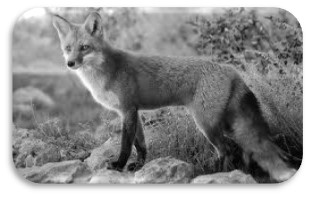
Unearthed by: Kathy Arscott!
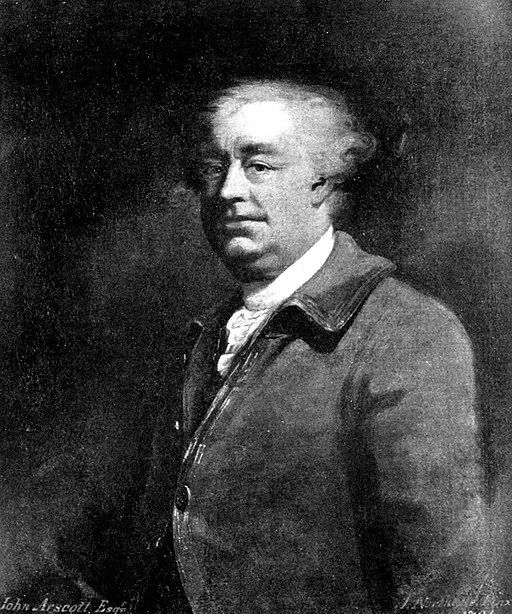
John Arscott
From the picture by y. Northcote. R.A.
Public domain, via Wikimedia Commons
The family of Arscott of Dunsland is one of the most ancient in the county. Its certified pedigree goes back to 1300, when they were Arscotts of Arscott, in the parish of Holsworthy.
The elder branch remained at Dunsland, one of the finest houses in North Devon, or rather cluster of houses, for it consists of the early mansion of the reign, at latest, of Henry VII, probably much earlier, of another portion erected in the reign of James I, and of a stately more modern mansion erected in the seventeenth century. Dunsland came into the possession of the Arscotts through John Arscott marriage with the heiress of Battyn in 1522.
In 1634 the heiress of Arscott married William Bickford and it remained in the Bickford family till 1790, when the heiress conveyed it to her husband, William Holland Coham. In 1827 the heiress of Coham conveyed Arscott and Dunsland to her husband, Captain Harvey Dickenson of the Madras Army. whose son, Arscott Harvey Dickinson sold Dunsland in 1945. It was later purchased by the National Trust who had hoped to open it to the public in 1968.
Unfortunately, in November 1967 it was ravaged by fire - nothing was saved or salvaged. Today you can wander through the old parkland and the remaining buildings of the house. The Granary near the Carriage Collection and Stables at Arlington Court, is the granary from Dunsland House.

The Dunsland Granary at Arlington Court
37


SPRING
Contributed by Trev
Spring, the sweet spring
Is the year's pleasant king.
Thomas Nashe
[1567-1601]
It was a lover and his lass,
With a hey, and a ho, and a hey nonino,
That o'er the green cornfield did pass,
In springtime, the only pretty ring time,
When birds do sing, hey ding a ding, ding;
Sweet lovers love the spring.
Between the acres of the rye,
With a hey, and a ho, and a hey nonino,
Those pretty country folks would lie,
In springtime, the only pretty ring time,
When birds do sing, hey ding a ding, ding;
Sweet lovers love the spring.
This carol they began that hour,
With a hey, and a ho, and a hey nonino,
How that a life was but a flower
In springtime, the only pretty ring time,
When birds do sing, hey ding a ding, ding;
Sweet lovers love the spring.
And therefore take the present time,
With a hey, and a ho, and a hey nonino;
For love is crowned with the prime
In springtime, the only pretty ring time,
When birds do sing, hey ding a ding, ding;
Sweet lovers love the spring.
William Shakespeare
[1564-1616]
Illustrations by the late Helen Armstead

2
FIDO'S LAVATORIAL LAMENT
And you don't want the neighbourhood talking
Just pick up a stick
And with one little flick
It's away from the footpath - how corking!
When in the hedge bottom they're laid
They soon start to biodegrade
But it seems a bit drastic
To wrap them in plastic
And put them on poo-bag parade!
People fling them in hedges and trees
Where they flutter about in the breeze
They just hang where you toss 'em
Among the spring blossom
Shrink-wrapped, and a cause of unease!
So please, simply flick poos aside
Or bag them and BIN them with pride
For we doggies feel harassed
Ashamed and embarrassed
With our 'doings' displayed far and wide!
Debbie Cook
of Crawford Cottage

36
TALL NETTLES
Tall nettles cover up, as they have done
These many springs, the rusty harrow, the plough
Long worn out, and the roller made of stone;
Only the elm butt tops the nettles now.
This corner of the farmyard I like most:
As well as any bloom upon a flower
I like the dust on the nettles, never lost
Except to prove the sweetness of a shower.
Edward Thomas

Judy Jones
18
AN ORDINARY DAY
It was grey.
For some of the time
It was bright with
Momentarily encouraging
Flashes of latent sunlight.
In the bare laid hedge
Birds sang
Until the breeze,
For want of better to do,
Blew their breath away.
Trees swayed,
Complaining rooks,
High in their tenement,
Came and went, desultorily
With the wind.
On the stubble-field
A crowd flocked
Rook-shy crows, mute gulls,
Looking in the east
Black and white wind-vanes.
The wood,
A cap on the hill's brow,
Gathers gloom
Deepening its mystery
As the light steals away.
In a tinted sky
A half-high cloud,
Veils the sliding sun,
A fitting end
To an ordinary day.
Peter Rothwell - Treetops
[13.1.2003]
1
ODE
TO MOLES
[We've
got 'em, have you?]

And what did I find but a dear little mole.
It was ever so sweet, rather like a fat mouse
But nurse wouldn't let it come into the house.
I hunted and called for it all the next day,
But it must have decided to go far away.
Phyl W - Cherry Tree
30
THE
OWL
Edward
Lear
Choice
of Trev

The owl and the pussycat went to sea
In a beautiful pea-green boat.
They took some honey
And plenty of money
Wrapped up in a five-pound note.
The owl looked up to the stars above
And sang to a small guitar,
"O lovely Pussy, O Pussy my
love,
What a beautiful Pussy you are, you
are
What a beautiful Pussy you
are!"
Pussy said to the Owl, "You
elegant fowl,
How charmingly sweet you sing!
Oh let us be married;
Too long we have tarried;
But what shall we do for a
ring?"
They sailed away, for a year and a
day
To the land where the bong-tree
grows,
And there in a wood, a Piggy-wig
stood
With a ring at the end of his nose,
his nose,
With a ring at the end of his nose.
"Dear Pig, are you willing, to
sell for one shilling,
Said the Piggy, "I will."
So they took it away and were married
next day
By the
They dined on mince and slices of
quince
Which they ate with a runcible spoon;
And hand in hand, on the edge of the
sand
They danced by the light of the
moon, the moon,
They danced by the light of the moon.
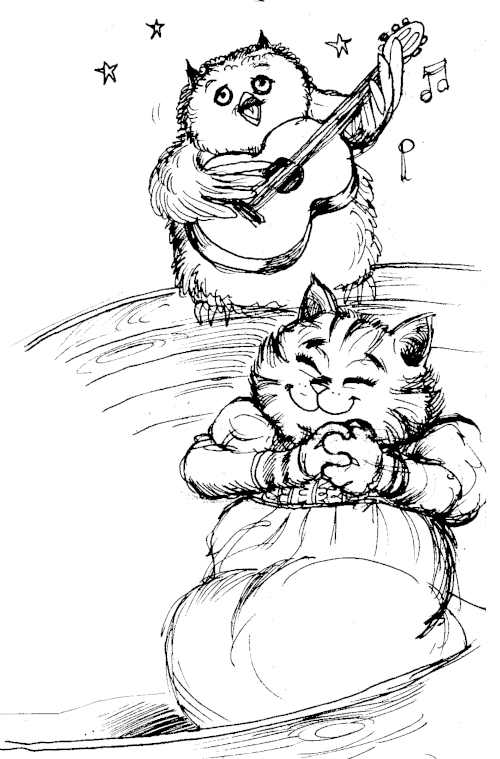

The
20th child of Jeremiah Lear, a London Stockbroker, and his wife Ann, Lear grew
up to be a prolific writer as well as a talented artist of landscapes and birds
and gave drawing lessons to Queen
Just
prior to his death and left incomplete, he began to pen the sequel to The Owl
and the Pussy Cat - The Children of the Owl and the Pussycat:

Our
mother was the pussycat,
Our father
was the owl,
And so
we're partly little beasts
And
partly little fowl.
The
brothers of our family, have
Feathers
and they hoot,
While
all the sisters dress in fur
And have
long tails to boot.
Illustrations
by Debbie Cook
25
BED IN SUMMER
from a
Child's
Robert
Louis Stevenson [1850-1894]
And dress by yellow candle-light.
In summer, quite the other way,
I have to go to bed by day.
I have to go to bed and see
The birds still hopping on the tree,
Or hear the grown-up people's feet
Still going past me in the street.
And does it not seem hard to you,
When all the sky is clear and blue,
And I should like so much to play,
To have to go to bed by day?
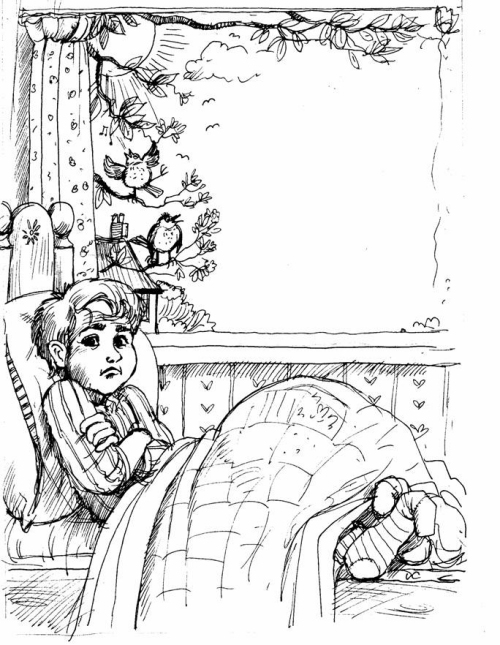
Illustrated
by: Debbie Cook
47
THE GREAT SPOTTED WOODPECKER
The
Blackbird sings enviously
As you hang
Oh, so casually
From the little basket
Of green plastic
That holds
A few delectable kernels.
This upside-down
Tit-like
agility is,
Sadly,
Beyond
the wit
Or skill
Of a
mere Blackbird
All it
can do
Is
whistle in admiration.
Peter Rothwell - Treetops
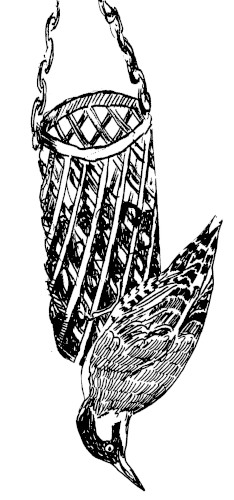
Illustrated by: Paul Swailes
28
PENSIONER'S TALE
Winter 2008
I am
writing this note to remind you
That
inflation has taken away
The things
that I hold most essential -
My
heating, my lighting, my pay.
So,
forget Christmas cards and roast turkey,
Red
peppers and peaches and cream,
The
things that I once took for granted
Are
now an impossible dream.
But
you'll know that I wish you sincerely,
The best
for the season ahead,
As I
pull on my old woollen bonnet
And
retire, in the cold, to my bed.
Edith Stewart
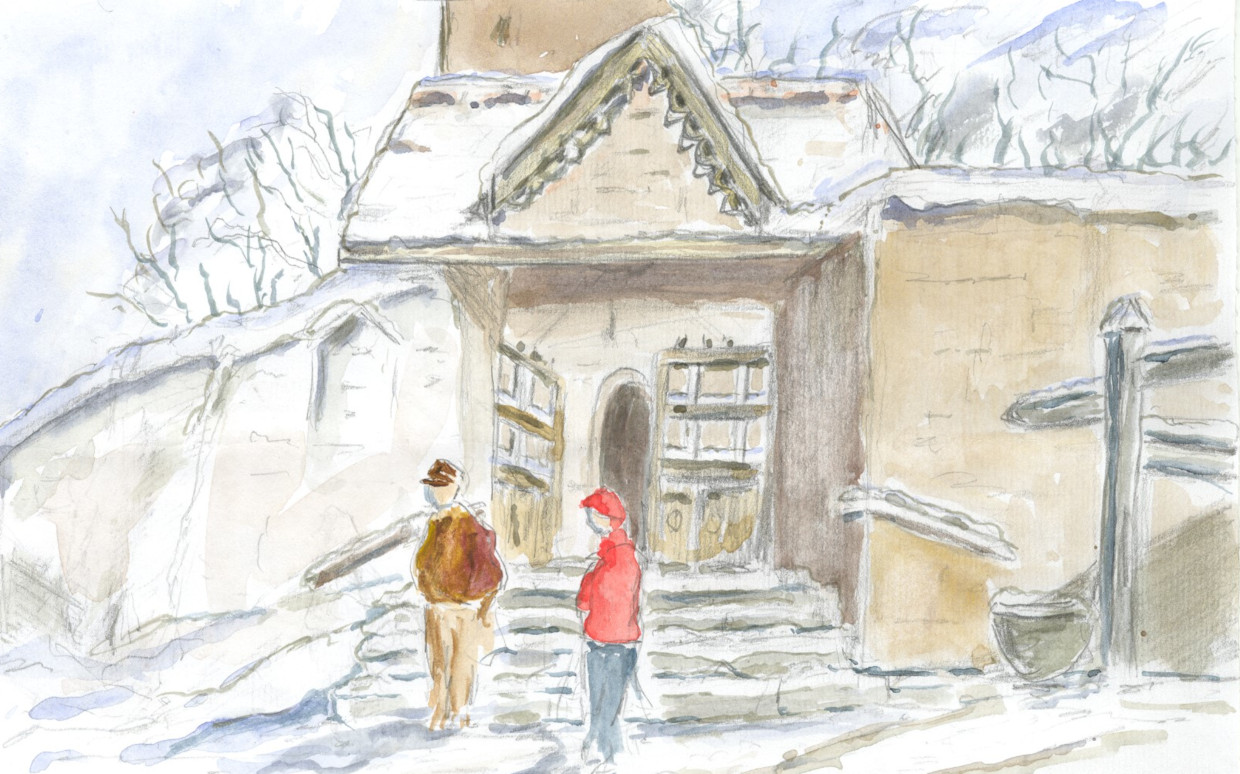
Lisa Shelley
45
CHEERS!
[A guide to festive drinking]

Here's
to good old ale,
Drink it
down, drink it down.
Here's
to good old ale,
Drink it
down.
Here's
to good old ale,
It will
never fail,
Drink it
down, drink it down,
Drink it
down.
Here's
to good old beer,
It fills
you with good cheer.
Here's
to good old brandy,
It keeps
you fine and dandy.
Here's
to good old cider,
It warms
you up inside yer.
Here's
to good old gin,
Not to
drink it is a sin.
Here's
to good old mead,
It's
very good indeed.
Here's
to good old perry
It keeps
you feeling merry.
Here's
to good old rum,
It stops
you feeling glum.
Here to
good old sherry
[see perry] It keeps you feeling
merry.
Here's
to good old whiskey,
It makes
you feel quite frisky.
Here's
to good old wine,
It makes
you feel just fine.

[With
acknowledgements to the original]
Anyone
brave have a good rhyme for vodka?
Trev
40
A wonderful place is
The gem of the
So I'll raise my glass of sherry
To the subject of my toast.
A beautiful green valley.
A church that's high and old.
A place where people are pally
A place with stories untold.
Sixty-two years on from my stay there,
Six and half years of my youth,
I'll always find my way there,
It's wonderful, that's the truth.

Illustrated by: Paul Swailes
Tony Beauclerk -
17
POEMS
Tick tock goes the Clock
Tick tock goes the clock
that sits beside my bed.
Tick tock goes the clock
that echoes in my head.
Tick tock goes the clock
which puts my head in a lock.
Tick tock goes the clock
which makes my body want to rock.
On and on goes the clock
'til I give it a knock with my sock!
"zzz"
snore "zzz"
Now it starts to chime and it's nearly
Tick tock goes the clock ...

Illustrated by: Paul
Swailes
Thank-you Sun
Dear Sun,
Just a line to say 'thanks'
for this and every day.
Your dawns and sunsets
are just great,
bang on time,
never late!
Thank you Sun.
Sarah Prentice [9] Glenbridge
33
SENIOR MOMENTS!
Don't like shopping - it's a bore
Rushed to my car to open the door
Now what's happened, the key is stuck
Today I'm really out of luck
Turn it, twist it - all but kick it
My temper's rising by the minute
Through the window what do I see
Things inside don't belong to me
And now I do begin to whine
Because of course this car's not mine
Humble, furtive, I retreat
My own red I must seek
Suspicious looks do come my way
Oh what a truly awful day.
NEXT WEEK
Parked in Lane C by trolley shed
L registration, colour red
So out I trot with smile so smug
To enter car with elegant shrug
I don't believe it - what's with my head
A reg L Micra and its red!
It should be mine - it's by the shed
It's where I put it - like I said
Now what I see makes my face red
Lane D has a Micra, L, and red
It's mine - it's been there all along
The one I'm breaking up is wrong
One senior moment is enough
But two of them is rather tough
Suspicion spreads and people speak
My case, I think, comes up next week!

Lisa Shelley
6
POETRY AND PRAYER
It
wasn't hard to find, amongst Peter Rothwell's work,
an aptly suitable illustration for the evocative words of the quotation given
for the Local Walk in the last issue.
The quotation came from a poem by the Rev. R.S. Thomas entitled
The Other
That I can hear the small owl calling
far off and the fox barking
miles away. It is then that I lie
in the lean hours awake and listening
to the swell born somewhere in the Atlantic
rising and falling, rising and falling
wave on wave on the long shore
by the village, that is without light
and companionless. And the thought comes
of that other being who is awake, too,
letting our prayers break on him,
not like this for a few hours,
but for days, years, for eternity.
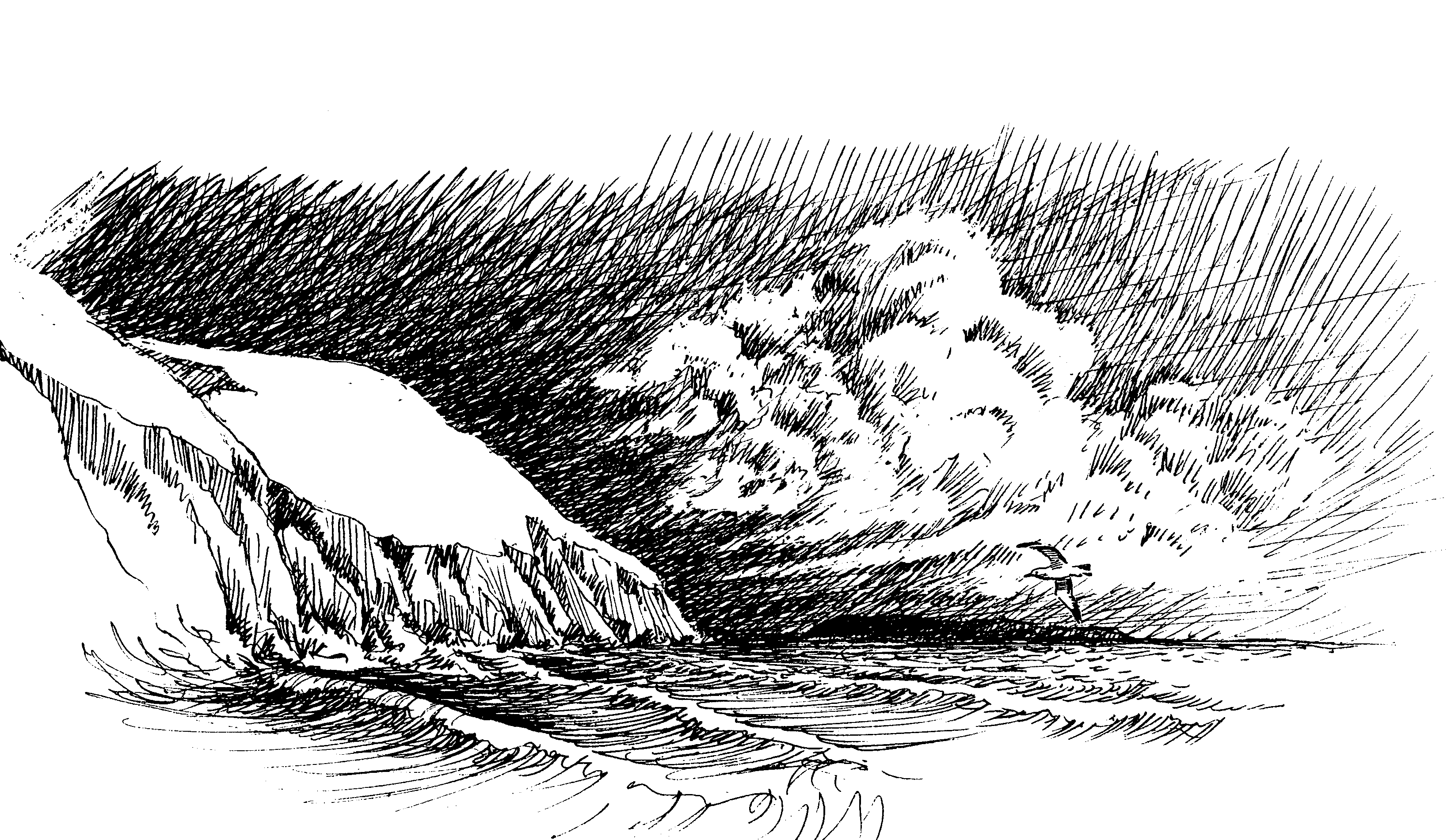
A
staunch Welshman and advocator of the Welsh language - although he wrote his
poems in English - Ronald Stuart Thomas was born in 1913. He was ordained as a clergyman in the
Writing
some of the finest religious poetry of his generation and writing over 1500
poems, Thomas was awarded the Queen's Gold Medal for Poetry in 1964 and in 1996
nominated for the Nobel Prize for Literature.
He died in 2000 at the age of 87 and is buried close to the door of
In
the year Thomas died, this prayer was written by 13 year old Anna Crompton and selected as The Celebration 2000 Millennium
Prayer
Prayer for the
Third Millennium
At the dawn of a new millennium,
in a world of darkness, give us your light;
in lands of war and prejudice, grant us peace;
in a world of despair, give us hope;
in a world of sadness and tears, show us your joy;
in a world of hatred, show us your love;
in a world of disbelief, give us faith.
Give us courage to face challenges of feeding the hungry,
clothing the naked,
housing the homeless and healing the sick.
Give us the power to make a difference in your world, and to protect your creation.
Through Jesus Christ, Our Lord, Amen
25
THE THOUGHT-FOX
Ted Hughes - 1930-1998
I imagine this midnight moment's forest
Something else is alive
Beside the clock's loneliness
And this blank page where my fingers move.
Through the window I see no star:
Something more near
Though deeper with darkness
Is entering the loneliness
Cold, delicately as the dark snow
A fox's nose touches twig, leaf;
Two eyes serve a movement, that now
And again now, and now, and now
Sets neat prints into the snow
Between trees, and warily a lame
Shadow lags by stump and in hollow
Of a body that is bold to come
Across clearings, an eye,
A widening deepening greenness,
Brilliantly, concentratedly,
Coming about its own business
Till with a sudden sharp hot stink of fox
It enters the dark hole of the head.
The window is starless still; the clock ticks,
The page is printed.
13
THE SNOWDROP
Hartley Coleridge
[1796-1849]
Yes, punctual to the time, thou'rt here again,
As still thou art: though frost or rain may vary
And icicles blockade the rockbirds' aery,
Or sluggish snow lie heavy on the plain,
Yet thou, sweet child of hoary January,
Art here to harbinger the laggard train
Of vernal flowers, a duteous missionary,
Nor cold can blight, nor fog thy pureness stain.
Beneath the dripping eaves, or on the slope
Of cottage garden, whether mark'd or no,
Thy meek head bends in undistinguishe'd row.
Blessings upon thee, gentle bud of hope!
And Nature bless the spot where thou dost grow -
Young life emerging from thy kindred snow!

Illustration by: Paul Swailes
46
THE
GREAT AMERICAN RAILWAY
[A
Campfire Song]
The American Railway was begun.
The American Railway was begun.
The great American Railway.
Patsy ooh-reeah-reeay
Patsy ooh-reeah-reeay
Patsy ooh-reeah-reeay
The great American Railway.
In Eighteen Hundred and Sixty-two
I found myself with nowt to do.
I found myself with nowt to do.
Beside the American Railway.
Patsy, etc.
In Eighteen Hundred and Sixty-three
The overseer accepted me.
The overseer accepted me.
To work upon the Railway.
Patsy, etc.
My hands were tired and my feet were sore.
My hands were tired and my feet were sore.
Through working on the railway.
Patsy, etc.
In Eighteen Hundred and Sixty-five
I found myself more dead than alive.
I found myself more dead than alive.
Through working on the railway.
Patsy, etc.
In Eighteen Hundred and Sixty-six
I went and trod on some dynamite sticks.
I went and trod on some dynamite sticks.
While working on the railway.
Patsy, etc.
In Eighteen Hundred and Sixty-seven
I found myself on t'way to Heaven.
I found myself on t'way to Heaven.
Through working on the railway.
Patsy, etc
I found myself at the Golden Gate.
I found myself at the Golden Gate.
Through working on the railway.
Patsy, etc.
In Eighteen Hundred and Sixty-nine
An angel's harp and wings were mine.
An angel's harp and wings were mine.
Through working on the railway.
Patsy, etc.
In Eighteen Hundred and Sixty-ten
If you want any more you can sing it yoursen.
If you want any more you can sing it yoursen.
About the American Railway.
Patsy ooh-reeah-reeay
Patsy ooh-reeah-reeay
Patsy ooh-reeah-reeay
The great American Railway.
The
last chorus should be sung with increasing tempo and volume to give a rousing
finale.

Illustrated by: Paul Swailes
Trev
14
GATHERING STORM
The gathering of the sudden storm
Signals change in seasonal expectation
Gone the dreams of summer days.
Bring on the harvest celebration
Blood red berries cluster where May blossom blew
Boughs laden with bright precious jewels
Thorn leaves tilt their skirts to the westerly wind
And North Wood sighs with the kiss of autumn
The storm-seed, sown to the west
Spun from the momentum of colliding forces
Spawn of distant cyclonic systems
And herald of the equinox
Morning light, bright, for a time
Compressed, the more intense
Beneath leaden grey cumulus towers
Gilds the binding cliffs and the dark moor's edge
Gale driven seas in inexorable procession March eastward the channel length To test their oceanic power Against the shores of the Severn Sea.

Written & Illustrated by: Peter Rothwell
16
ELEGY ON THE DEATH
OF A MAD DOG
A
favourite Poem - Trev

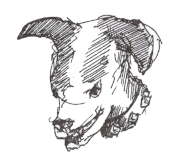
Good
people all, of every sort,
Give ear
unto my song;
And if
you find it wondrous short,
It
cannot hold you long.
In
Islington there lived a man,
Of whom
the world might say,
That
still a godly race he ran,
Whene'er he went
to pray.
A kind
and gentle heart he had,
To
comfort friends and foes;
The naked every day he clad,
When
he put on his clothes.
And in
that town a dog was found,
As many
dogs there be,
Both
mongrel,
puppy, whelp and hound
And
curs of low degree.
This dog
and man at first were friends;
But when
a pique began,
The dog, to
gain some private ends,
Went mad
and bit the man.
Around from all the neighbouring streets
The
wondering neighbours ran,
And
swore the dog had lost his wits
To
bite so good a man.
The
wound it seemed both sore and sad
To every
Christian eye;
And
while they swore the dog was mad,
They
swore the man would die.
But soon
a wonder came to light,
That
showed the rogues they lied:
The man
recovered of the bite,
The dog
it was that died.
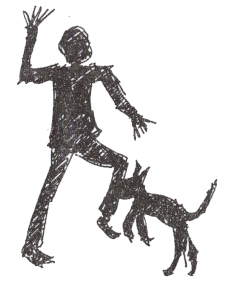

Oliver Goldsmith
OLIVER
GOLDSMITH
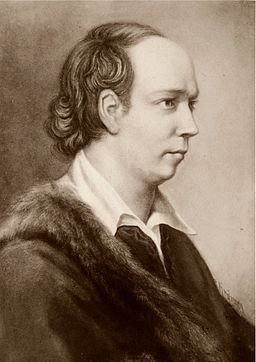
nach einem Gemölde von P. Krömer herausgegeben von Friedrich Bruckmann Verlag München.
public domain, via Wikimedia Commons
Oliver Goldsmith was born in
After his failed departure for
He became a literary hack in
26
ON
KICKING THE HABIT!
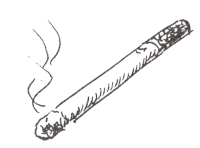
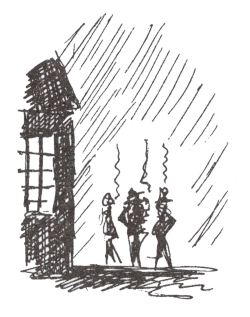
Illustrations by: Paul Swailes
I'm
giving up smoking, again!
And I'm
sure I'll suffer the pain.
You
can't smoke inside,
So
outside you hide,
Though
it may be pouring with rain.
I'm
giving up smoking, again!
But I'm
sure it won't be a joke.
This
craving is bad,
For I've
smoked since a lad
I'll go
mad if I can't have a smoke.
This
time I'll do it, I've said this before,
And I'll
say it again and again.
When
others have tried,
I'd just
deride
And then
I would laugh like a drain!
Six
months later - I've succeeded at last!
The
habit is done now, I know.
When I
go for beer,
The air
is so clear
And my
pocket is more full of dough.
So
come on you people, try to give up!
Give it,
please give it a chance.
They say
it is dangerous, dirty and death.
I've run
out of rhyme, so I'll finish this time
With
good health, wealth and good breath!
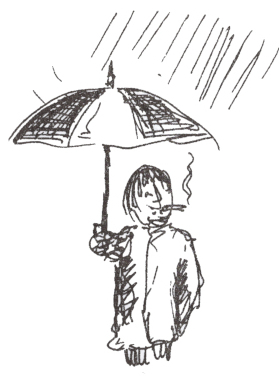
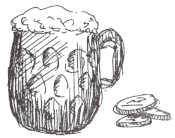
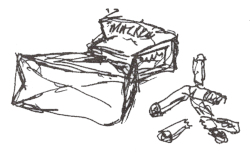
NB:
Our way, which was over forty years ago, was only to light up after
the time of the previous day. For example,
Monday: first
Eventually, we 'forgot' to smoke. Once you give up, don't be tempted again
for if you have just one or two, you will have all the
old difficulties to overcome again.
Tony Beauclerk
12
THE NEWSLETTER
Write your tales, young or old.
Get it down on paper,
Come on, just be bold!
Some with glory, some that are bad.
So set it down now, 'cause folks want to hear
Perhaps from The Globe over a beer.
I'm telling you now, it's not just a hint.
Your
So tell us all, we're waiting to cheer!
Tony Beauclerk -
23
THE NEWSLETTER
Write your tales, young or old.
Get it down on paper,
Come on, just be bold!
Some with glory, some that are bad.
So set it down now, 'cause folks want to hear
Perhaps from The Globe over a beer.
I'm telling you now, it's not just a hint.
Your
So tell us all, we're waiting to cheer!
Tony Beauclerk -
23
THE BABYSITTER
It was clear
From the moment
They walked out of the door
That Tracey
Had never done
This job before.
Until they came home
She patiently sat
On me
my little brother
and the cat.

Illustrated by: Debbie Cook
6
AUSTRIAN FOLK SONG
Heard on the radio many years ago, this
poignantly beautiful tribute lay buried in some deep recess of memory to surface recently, without prompting, complete with its
simple, plaintive melody. I can't
reproduce the latter but here the words, attributed to that great poet Anon and
translated by another of the same name [not myself].
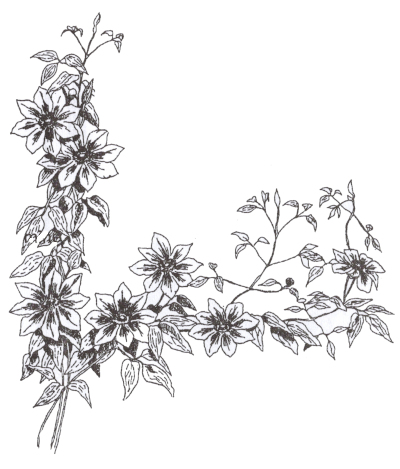
Illustration by: Paul Swailes
How can I leave thee?
How can I bear to part?
That thou hast all my heart,
Dearest believe.
Thou hast this soul of mine,
So wholly is it
That I can love no-one
But thee alone.
Were I a bird love,
Soon would I fly to thee.
Falcon nor hawk tone
Would terror bring.
If slain by huntsman's hand
I at thy feet lay dead,
If thou one tear didst shed
Gladly I'd die.
Blue is the flow'ret
Called the forget-me-not.
Oh lay it on the heart
And think of me.
Should fate be too unkind,
Hope gone faith out of mind,
Love shall remain with us,
Dearest, believe.
Trev
22
CHOCS
Carol Ann Duffy
Into the half-pound box of Moonlight
my small hand crept,
There was an electrifying rustle.
There was a dark and glamorous scent.
Into my open, religious mouth
the first Marzipan Moment went.
Down in the crinkly second layer
five finger-piglets snuffled
among the Hazelnut Whirl,
the Caramel Swirl,
the Black Cherry and Almond Truffle.
Bliss.
I chomped, I gorged,
I stuffed my face,
till only the Coffee Cream
was left for the owner of the box -
tough luck, ....
oh, and half an Orange Supreme.
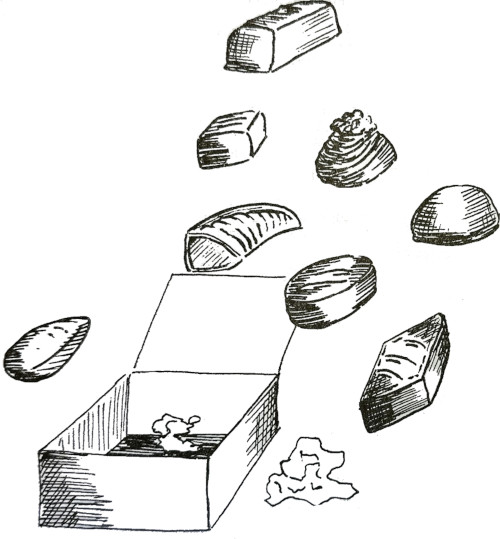
Illustrated by: Paul Swailes
31
FIRST SIGHT
Philip Larkin
Lambs that learn to walk in snow
When their bleating clouds the air
Meet a vast unwelcome, know
Nothing but a sunless glare.
Newly stumbling to and fro
All they find, outside the fold,
Is a wretched width of cold.
As they wait beside the ewe,
Her fleeces wetly caked, there lies
Hidden round them, waiting too,
Earth's immeasurable surprise.
They could not grasp it if they knew,
What so soon will wake and grow
Utterly unlike the snow.

Artwork by: Nigel Mason
Philip Larkin
[1922-1985]
Born in Coventry in 1922, Philip Larkin was the only son and younger child of Sydney and Eva Larkin. He attended King Henry VIII School in Coventry where he contributed regularly to the school magazine, becoming Joint Editor.
Failing his army eyesight test, he was able to complete his degree at St. John's College Oxford uninterrupted by the war, gaining a First Class Honours degree in English in 1943.
Failing also to enter the Civil Service, he took a post as Librarian atw Wellington in Shropshire. From there he became Assistant Librarian at the University College of Leicester, Sub-Librarian at Queen's University Belfast and finally Librarian to the University of Hull.
Whilst writing his many poems and novels, Larkin's work was acknowledged in many ways:
In 1945 he received the Queen's Gold Medal for Poetry and in 1975 he was made a CBE. He received the German Shakespeare-Preis, became Chairman of the Booker Prize Panel and was made both Companion of Literature and an Honorary Fellow of The Library Association. He served on the Literature Panel of the Arts Council, was made a Professor by the University of Hull and elected to the Board of the British Library.
In 1984 he declined succeeding Sir John Betjeman as Poet Laureate, being unwilling to accept the attention associated with the post, and received an honorary doctorate from Oxford University. In 1985 he was awarded the Order of Companion of Honour but was unable to receive it personally due to ill health.
He died in the December of that year at the age of 63.
Larkin's 'Selected Letters', published in October 1992, proved to be the literary event of the year.
25
SILVER
Slowly, silently now the moon
Walks the night in her silver shoon;
This way, and that, she peers and sees
Silver fruit upon silver trees;
One by one the casements catch
Her beams beneath the silvery thatch;
Couched in his kennel, like a log,
With paws of silver sleeps the dog;
From their shadowy cote the white breasts peep
Of doves in a silver-feathered sleep;
A harvest mouse goes scampering by,
With silver claws, and silver eye;
And moveless fish in the water gleam,
By silver reeds in a silver stream.
Walter de la Mare

Walter de la Mare was born on 25th April 1873 in Charlton, Kent. He died on 22nd June 1956 in Twickenham, Middlesex, and is buried at St. Paul's Cathedral.
As a boy he attended St. Paul's Cathedral Choir School before working as a statistics clerk for the Anglo-American Oil Company until 1908, when he was granted a Civil List pension. He was, however, a lifelong writer and began to contribute poems and stories to magazines when he was in his mid-twenties as well as writing novels. His mother was related to the poet Robert Browning and he was a modest and gentle man. At first he wrote under the assumed name Walter Ramal - part of his real name spelt backwards!
Imaginative, whimsical and sometimes grotesque, his writing often draws on the dream world. Among his best known works are The Listener [1912], Peacock Pie [1913] and The Traveller [1946].
His poem 'Silver', illustrated by Paul Swailes, is especially for Doreen Siviter.
14
WHEN I SAY ... "I AM A
CHRISTIAN"
When I say . . . "I'm a Christian", I'm not shouting 'I'm clean-livin''.
I'm whisp'ring "I was lost, now I'm found and forgiven."
When I say . . . "I'm a Christian", I don't speak of this with pride.
I'm confessing that I stumble and need Christ to be my guide.
When I say . . . "I'm a Christian", I'm not trying to be strong,
I'm professing that I'm weak and need His strength to carry on.
When I say . . . "I'm a Christian", I'm not bragging of success.
I'm admitting that I've failed and need God to clean my mess.
When I say . . . "I'm a Christian", I'm not claiming to be perfect.
My flaws are far too visible, but God believes I'm worth it.
When I say . . . "I'm a Christian", I still feel the sting of pain.
I have my share of heartaches, so I call upon His name.
When I say . . . "I'm a Christian", I'm not holier than thou.
I'm just a simple sinner who received God's grace somehow.
Author Anon
Submitted by - Laurie Harvey
6
A DAY IN AUTUMN
R.S. Thomas
It will not always be like this,
The air windless, a few last
Leaves adding their decoration
To the trees' shoulders, braiding the cuffs
Of the boughs with gold; a bird preening
In the lawn's mirror, Having looked up
From the day's chores, pause a minute.
Let the mind take its photograph
Of the bright scene, something to wear
Against the heart in the long cold.

Illustrated by : Paul Swailes
R.S. THOMAS
Ronald Stuart
Thomas was born in
Admired
by fellow poet Ted Hughes and widely regarded as the best religious poet of his
time - although his work covered a wide range of themes - Thomas died in 2000
at the age of 87.
30
MISTAKEN IDENTITY
Across the fields beneath the trees
I saw something which made me freeze
There stood a figure all in black
I stared at him and he stared back!
Oh dear, oh dear, now what to do
Put glasses on for better view
If I could only see his face
But that did nothing for my case
He was in shadow and obscure
Perhaps a Hoody - I wasn't sure


I rang my neighbour - he must see
This phantom who was watching me
With back-up one feels not alone
The truth would surely soon be known
My neighbour snorted "What a farce
You're looking at a black cow's arse!
And as my face was glowing red
The cow she chose to turn her head!
Lisa Shelley
Yes, to my shame it really happened!
Illustrations by: Lisa
14
LOTUS LAND
Jamaican Beach from 'Spring Laughter'
by Christina Rainsford
Far out upon the reefs the breakers pound,
tossing their white spume in the sun,
guarding the tranquil bay whose waters lie
in shifting shades of turquoise and of blue.
In its clear depths small silver fishes dart,
safe from the threatening jaws of open sea.
This is the lotus land where time is not.
The-turmoil of the world breaks on the reefs and is forgotten here.
Peace is a presence and care transmuted by the alchemy of sea and sky.

Illustrated by: Paul Swailes
44

THE WORRIES


All
night time as I lie in bed
the worries swirl around my head
What if
I melted in my bed
What if
a giant roasts me dead
What if
the monster bit my head
What if
a building fell on my shed
What if
the sky rained pencils and pens
What if
the school overflows with hens
What if
people watch me drool
What if
I drown in the pool
What if
I'm in the house when the door locks
What if
my dad wears forty pairs of socks
What if
my Mum loses her tickets
What if
my fish gets attacked by crickets
What if
people use rules as rakes
What if
my fingers turn into snakes
All
night long as I lie in bed
the worries swirl around my head

David Jones

[David,
who is 7, is a pupil at
13
WHAT IS PINK?
Christina Rossetti
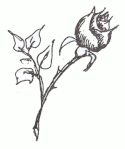
What is pink? A rose is pink
By the fountain's brink.
What is red? A poppy's red
In its barley bed.

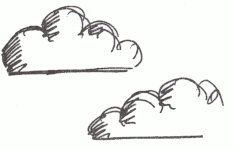
What is blue? The sky is blue
Where the clouds float through.
What is white? A swan is white
Sailing in the light.
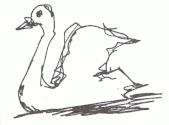
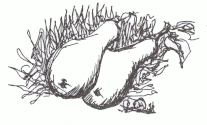
What is yellow? Pears are yellow,
Rich and ripe and mellow.
What is green? The grass is green,
With small flowers between.
What is violet? Clouds are violet
In the summer twilight.
What is orange? Why, an orange,
Just an orange!
25
ON A VISIT TO A RECONSTRUCTED AIR RAID
SHELTER
AT FLAMBARDS
Old
memories, on demand, are painted fables,
Not
history at all, but pictures in the mind
Of
happenings not weeks but years apart.
For then
is never now and time disables sequence.
Days
silted over by long sleepless
Fearful
nights are colourless as dull defiant winter
And as
by winter streams are washed away
To
merge with watchful endless summer.
In
memory it seemed that
Had
always sheltered in a fortress walled
By wire
cats cradles hanging from a studded
Sky, and
this must be, like other sieges, overcome.
A vision
too of nights when swords of light
Swaying,
swinging, dancing, flooding the low
Fat
clouds with lakes of swirling pearly
Beauty trapped
high sparkling gnats in bright display.
Caught,
and passed on for mile on thundering flaring
Mile
while distant bombs cried long in their descent
Cascading
screams each shorter than the one before
Until,
at last, unwarned the old familiar walls reduced to quaking silhouette.
But
catch a breath of unlit gas or hear the frantic clink
Of
bricks and now becomes as then and, with
Eyes
closed and watering we hear the hymn our dying neighbour
Sang
beneath the rubble of her home and smell the burning city.
Peter Hinchliffe
At
the age of 12, I was sent to stay in
Peter's
poem won a First Prize in an International Poetry Competition at The Plough in
21

THE WORRIES


All
night time as I lie in bed
the worries swirl around my head
What if
I melted in my bed
What if
a giant roasts me dead
What if
the monster bit my head
What if
a building fell on my shed
What if
the sky rained pencils and pens
What if
the school overflows with hens
What if
people watch me drool
What if
I drown in the pool
What if
I'm in the house when the door locks
What if
my dad wears forty pairs of socks
What if
my Mum loses her tickets
What if
my fish gets attacked by crickets
What if
people use rules as rakes
What if
my fingers turn into snakes
All
night long as I lie in bed
the worries swirl around my head

David Jones

[David,
who is 7, is a pupil at
13

MY FAVOURITE VERSE
Ethel Tidbury
Life is a book, of volume three,
The past, the present and the is to be.
The first is done with, and laid away.
The second we are reading, day by day.
The third and last of volume three,
Is kept from sight,
God keeps the key.
30
THE CRUSTACEAN AWAKES
[Ode to the Channel Tunnel]
For a million years I've rested, long since past my best
By a thousand pounds of pressure, naturally compressed.
Biding my time while turning to lime I've not had much thinking to do,
Now all this is changing - through man's rearranging, upon me is something new.
It started with a quiver or two, a rattle then a constant shake,
Out to the west a monster approached with progress in its wake.
Chewing and spewing it dug close below me, my ancestors digested away,
Then it was past and going quite fast, headed for the Pas de Calais.
I thought that was the end of it, a transient - nothing more,
How wrong I was for in its tracks came humans by the score.
Through collection and seizure of the monster's excreta they emptied the dank vacant space,
Into this wound came concrete cocoons, holding the vastness in place.
Now their labours are over and I dread each troubled hour,
Four times they come with rumble and roar, each a terrible power.
I am only a shellfish but I don't think I'm selfish for the yearning my mind has in store,
For fifty years hence, when erosive events, let me rest in peace once more.
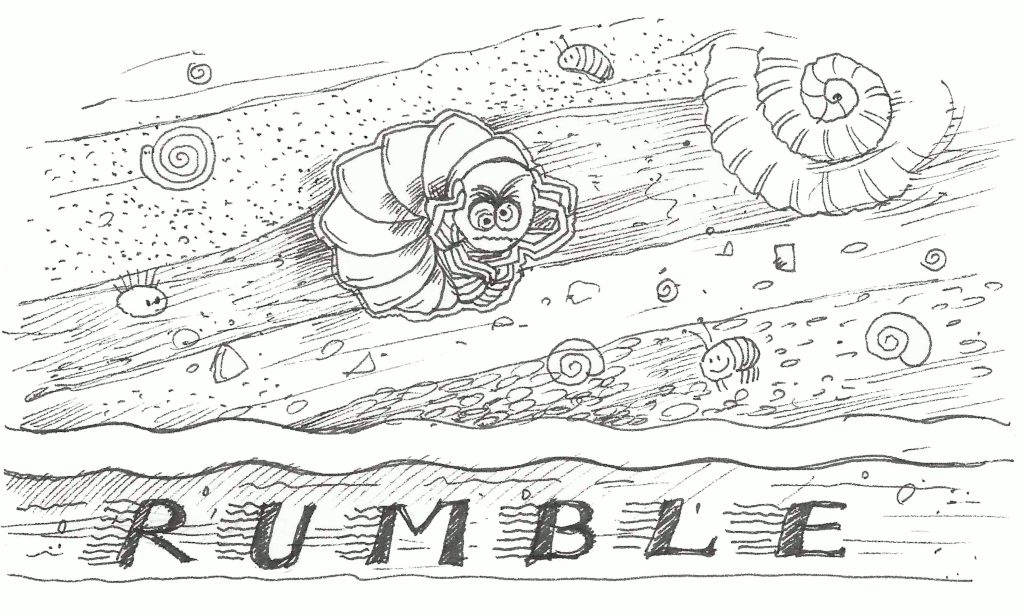
Illustrated by: Debbie Rigler Cook
Nigel Waters - Ragstone Cottage
23
MEETING AT NIGHT
Robert Browning
The grey sea and the long black land;
And the yellow half-moon large and low;
And the startled little waves that leap
In fiery ringlets from their sleep,
As I gain the cove with pushing prow,
And quench its speed i' the slushy sand.
Then a mile of warm sea-scented beach;
Three fields to cross till a farm appears;
A tap at the pane, the quick sharp scratch
And blue spurt of a lighted match,
And a voice less loud, thro' its joys and fears,
Than the two hearts beating each to each!

Illustration by: Paul Swailes
30
"NINETEEN 'O' FIVE"
Our story begins, as we have been told
By Mrs. Price, a hundred and one years old,
That one hundred years before us now,
Berrynarbor, a farming village, and how
The children would walk to school, forth and back
All their belongings brought home in a sack.
The Headmaster, of course, was Mister Toms,
Who'd cross the slipper across their bums!
Unless they were good, respectful, polite
Just like these lovelies before you tonight!
To teach, back then, there were sixty to seventy.
Huxtables, Bowdens and Richards were three
Of the names that are still in our pretty place
Representing the village and its present face.
No cars back then, a charabanc would be
The only way of visiting to see
Barnstaple market, especially at Christmas
The annual highlight for a local lass.
Upon the hill in the castle beyond
Were the family of Bassetts, who were very fond
Of the locals and villagers and Rector Churchill,
Whose job, of course, was this church to fill.
The family would enter and he would meet,
Walk with them and guide them to their seat.
For the Christmas Service, always important
To celebrate the birth of Jesus, the infant
See Mary and Joseph here now alive
Just as the Nativity in nineteen o five.
Rachel
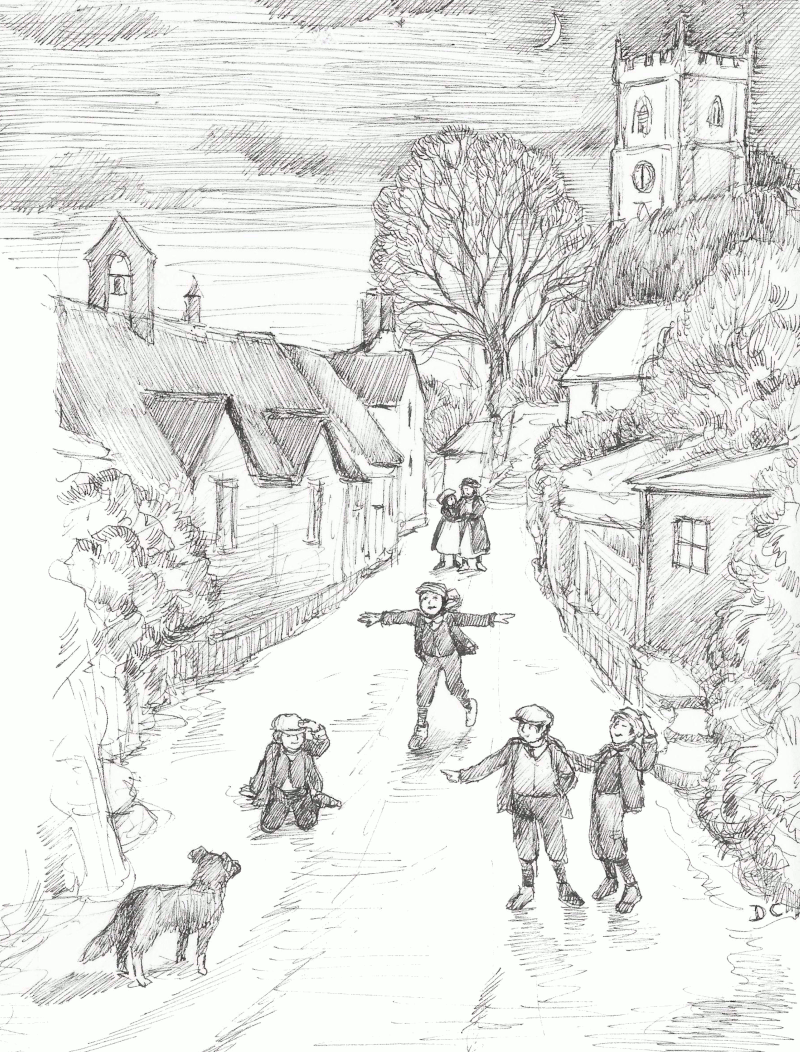
Illustrated by: Debbie Rigler Cook
I was rather sad not to get up to our church to hear this magnificent poem read and see the children, but I am still involved and Val keeps me in touch. Over Christmas I either saw or heard from many Sunday School children, past and present, which was lovely.
Love and best wishes to you all for 2006.
Sally
9
SILVER HOURS
W.H. Davies
Come, lovely Morning, rich in frost
On iron, wood and glass;
Show all your pains to silver-gild
Each little blade of grass.
Come, rich and lovely Winter's Eve,
That seldom handles gold;
And spread your silver sunsets out,
In glittering fold on fold.
Come, after sunset; come, oh come -
You clear and frosty Night:
Dig up your fields of diamonds, till
The heavens all dance in light!
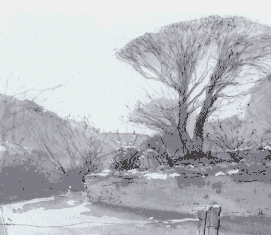
Illustrated by: Nigel Mason
41
BEECH LEAVES
James Reeves
In autumn down the beechwood path
The leaves lie thick upon the ground.
It's there I love to kick my way
And hear their crisp and crashing sound.
I am a giant, and my steps
Echo and thunder to the sky.
How the small creatures of the woods
Must quake and cower as I pass by!
This brave and merry noise I make
In summer also when I stride
Down to the shining, pebbly sea
And kick the frothing waves aside.

Illustrated by: Paul Swailes
16
The Star
The second poem, particularly for the young and young-at-heart, is attributed to both Ann Taylor [1782-1866] and her sister Jane [1783-1824]. While most of us are familiar with the first verse from the poem as a nursery rhyme, it was in fact written as a poem by the two sisters and published in 1806. Ann and Jane, who lived in Stockwell Street, Colchester towards the end of the 18th Century, were well known poem and hymn writers.
There is some debate about which sister actually wrote the poem, and therefore it is generally listed as both of them. However, a one line dedication in the original book does indicate that it was Jane who had the original idea.
Up above the world so high,
Like a diamond in the sky.
When the blazing sun is gone,
When he nothing shines upon,
Then you show your little light,
Twinkle, twinkle, all the night.
Then the traveller in the dark,
Thanks you for your tiny spark,
He could not see which way to go,
If you did not twinkle so.

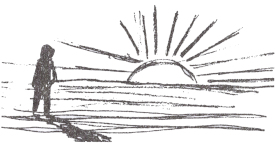
And often through my curtains peep,
For you never shut your eye,
Till the sun is in the sky.
As your bright and tiny spark,
Lights the traveller in the dark
Though I know not what you are,
Twinkle, twinkle, little star.
27
THE BROWN THRUSH
Lucy Larcom
[1824-1893]
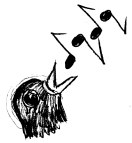
'He's singing to me! he's singing to me!'
And what does he say, little girl, little boy?
'Oh, the world's running over with joy!
Don't you hear? Don't you see?
Hush! Look! in my tree!
I'm as happy as happy can be!'

And the brown thrush keeps singing, 'A nest do you see,
And five eggs hid by me in the juniper-tree?
Don't meddle! don't touch! little girl, little boy,
Or the world will lose some of its joy!
Now I'm glad! now I'm free!
And I always shall be,
If you never bring sorrow to me.'
So the merry brown thrush sings away in the tree,
To you and to me, to you and to me;
And he sings all the day, little girl, little boy,
'Oh, the world's running over with joy!
But long it won't be,
Don't you know? don't you see?
Unless we are as good as can be!'

Illustrated by: Paul Swailes
Lucy Larcom was born in Beverly, Massachusetts, in 1824, the ninth of ten children. Her father, a sea captain, died when he was very young and her mother supported her large family by working as superintendent of a female dormitory in the local textile mill. Lucy herself worked at the mill for ten years and her friendship with Quaker poet, John Greenleaf Whittier, began her lifelong association with the world of poetry and writing.
Lucy, who never married, devoted her life to writing and editing but also spent time teaching. She attained moderate success with her poems, declaring at one time that she would only write hymns. She died, at the age of 69, in Boston in 1893.
11
A SMUGGLERS SONG
Rudyard Kipling
If you wake at Midnight, and hear a horse's feet,
Don't go drawing back the blind, or looking in the street,
Them that asks no questions isn't told a lie.
Watch the wall, my darling, while the Gentlemen go by!
Five and twenty ponies trotting through the dark
Brandy for the Parson, 'Baccy for the Clerk;
Laces for a lady, letters for a spy,
And watch the wall, my darling, while the Gentlemen go by!
Running round the woodlump, if you chance to find
Little barrels, roped and tarred, all fully of brandy-wine,
Don't you shout to come and look, nor use 'em for your play.
Put the brushwood back again - and they'll be gone next day!
If you see the stable door setting open wide;
If you see a tired horse lying down inside;
If your mother mends a coat cut about and tore;
If the lining's wet and warm - dont you ask no more!
If you meet King George's men, dressed in blue and red,
You be careful what you say, and mindful what is said.
if they call you 'pretty maid' and chuck you 'neath the chin,
Don't you tell where no one is, nor yet where no one's been!
If you do as you've been told, 'likely there's a chance,
You'll be given a dainty doll, all the way from France,
With a cap of pretty lace, and a velvet hood
A present from the Gentlemen, along o' being good!
Five and twenty ponies trotting through the dark -
Brandy for the Parson, 'baccy for the Clerk;
Laces for a lady, letters for a spy,
And watch the wall, my darling, while the Gentlemen go by!
Them that asks no questions isn't told a lie -
Watch the wall, my darling, while the Gentlemen go by!
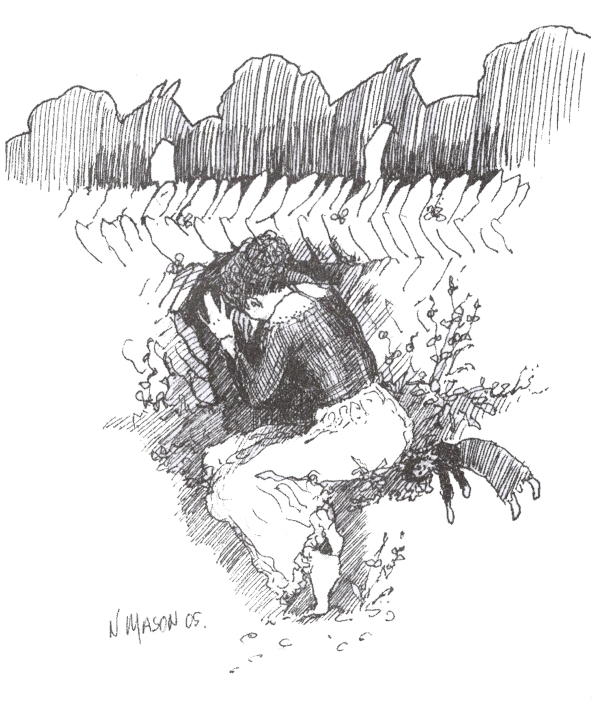
Illustrated by: Nigel Mason
Kipling knew the stories of smugglers well, having lived for a time in the South East of England. The warning to 'watch the wall' was sound advice for when the smugglers were out, any idea of benefiting from the contraband was best forgotten unless you were prepared to take the often drastic consequences.
In the days of smuggling, 'middle class' people were in the minority as you either 'had it' or 'didn't have it'! The majority fell in the 'didn't have it' group and their living conditions were extremely poor. The poem makes reference, however, to others who did benefit from this illicit trade.
At that time travel was extremely difficult and many roads were impassable for wheeled transport, but the smugglers - all local people knew the lanes, footpaths and tracks where they couid avoid the law, so they used packhorses rather than carts to move their ill gotten gains.
The violence associated with many of the gangs came from this background. The penalties were severe and cut-throats and desperate people often made up the early settlers in many of our colonies at that time. Their violent habits were often come by in what today are the tranquil highways and byways of the south of England.
22
SPRING MAGIC
The World is very old; but year by year
It groweth new again when buds appear.
The World is very old, and sometimes sad;
But when the daisies come the World is glad,
The world is very old; but every Spring
It groweth young again, and fairies sing.
Cicely Mary Barker
35
WE ARE SEVEN
William Wordsworth 1770-1850
..... A simple child,
That lightly draws its breath,
And feels its life in every limb,
What should it know of death?
I met a little cottage girl:
She was eight years old, she said;
Her hair was thick with many a curl
That clustered round her head.
She had a rustic, woodland air,
And she was wildly clad:
Her eyes were fair, and very fair;
Her beauty made me glad.
"Sisters and brothers, little maid,
How many may you be?"
"How many? Seven in all," she said,
And wondering looked at me.
"And where are they? I pray you tell."
She answered, "Seven are we;
And two of us at Conway dwell,
And two are gone to sea.
"Two of us in the churchyard lie,
My sister and my brother;
And, in the churchyard cottage, I
Dwell near them with my mother."
"You say that two at Conway dwell,
And two are gone to sea,
Yet ye are seven! I pray you tell,
Sweet maid, how this may be."
Then did the little maid reply,
"Seven boys and girls are we;
Two of us in the churchyard lie,
Beneath the churchyard tree."
"You run about, my little maid,
Your limbs they are alive;
If two are in the churchyard laid,
Then ye are only five."
"Their graves are green, they may be seen,"
The little maid replied,
"Twelve steps or more from my mother's door,
And they are side by side.
"My stockings there I often knit,
My kerchief there I hem;
And there upon the ground I sit,
And sing a song to them.
"And often after sunset, sir,
When it is light and fair,
I take my little porringer,
And eat my supper there.
"The first that died was sister Jane;
In bed she moaning lay,
Till God released her of her pain;
And then she went away.
"So in the churchyard she was laid;
And, when the grass was dry,
Together round her grave we played,
My brother John and I.
"And when the ground was white with snow
And I could run and slide,
My brother John was forced to go,
And he lies by her side."
"How many are you, then," said I,
"If they two are in heaven?"
Quick was the little maid's reply,
"O master! we are seven."
"But they are dead; those two are dead!
Their spirits are in heaven!"
'Twas throwing words away; for still
The little maid would have her will,
"Nay, Master, we are seven!"

The Grave, immortalised by Wordsworth's Poem, and Old Sundial, Conway Churchyard
From the Tom Bartlett Postcard Collection
32
LOOK TO THE SPRING
Though red leaves are falling;
I am storing for Springtime
My secrets in earth,
I am dreaming of Spring
Of its song and its story,
And the wind's blowing cold.
For I know beyond doubting,
The glow and the glory
Will come back to cheer us,
With blue days and gold!
24
THE QUIET PLACE
This is a quiet place. The people here
Would not be happy, living in a town.
Above the trees the sky shines, wide and clear,
Our boundary is that grassy sweep of down.
We know each other well, and folks are kind
When illness comes, or sorrow, or distress,
"How can I help?" comes first to every mind.
All do their best to bring back happiness.
We have our faults, but life is calm and sweet;
Small pleasures star our days, like hedgerow flowers.
Just humble homes, no busy town or street,
But peace dwells in this quiet place of ours.
Anon.

Illustrated by: Nigel Mason
16
A POULTRY TALE
or
THE TWELVE DAYS OF A CHRISTMAS TURKEY
On the first day of Christmas, my true love said to me,
I've bought a big fresh turkey, and a proper Christmas tree.
On the second day of Christmas, much laughter could be heard,
As we tucked into our turkey, a most delicious bird.
On the third day of Christmas, came the people from next door,
The turkey tasted just as nice as it had the day before.
On the fourth day of Christmas, came relations, young and old,
We finished up the Christmas pud, and had the turkey - cold.
On the fifth day of Christmas, outside the snowflakes scurried.
But we were nice and warm inside, and had the turkey - curried.
On the sixth day of Christmas, our Christmas spirit died.
The kids all fought and bickered, and we had the turkey - fried.
On the seventh day of Christmas, the family they did wince,
As they sat down at the table, and were offered turkey - mince.
On the eighth day of Christmas, the dog had run for shelter,
He'd seen the turkey pancakes, and the glass of Alka Seltzer.
On the ninth day of Christmas, by lunchtime dad was blotto,
He knew that bird was back again, this time - as a risotto.
On the tenth day of Christmas, we were drinking home made brew,
As if that wasn't bad enough, we were eating turkey - stew.
On the eleventh day of Christmas, our tree was sadly moulting,
But, with chilli, soy and oyster sauce, the turkey was - revolting.
On the twelfth day of Christmas, we had smiles upon our lips,
The guests had gone, that turkey too, and we dined on -
Fish and Chips!

Illustrated by: Debbie Rigler Cook
5
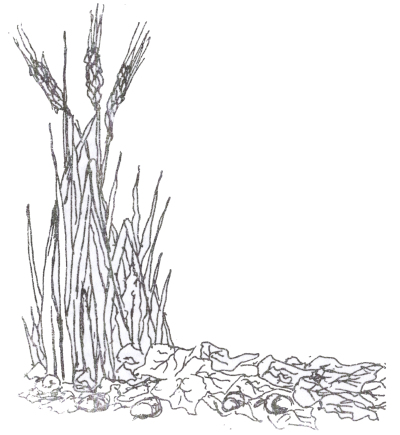
THE FALLING OF THE LEAVES W.B. Yeats [1865-1939]
Autumn is over the long leaves that love us
And over the mice and barley sheaves;
Yellow the leaves of the rowan above us,
And yellow the wet wild-strawberry leaves.
The hour of the waning of love has beset us,
And weary and worn are our sad souls now;
Let us part, ere the season of passion forget us,
With a kiss and a tear on thy drooping brow.
Illustrations by: Paul Swailes

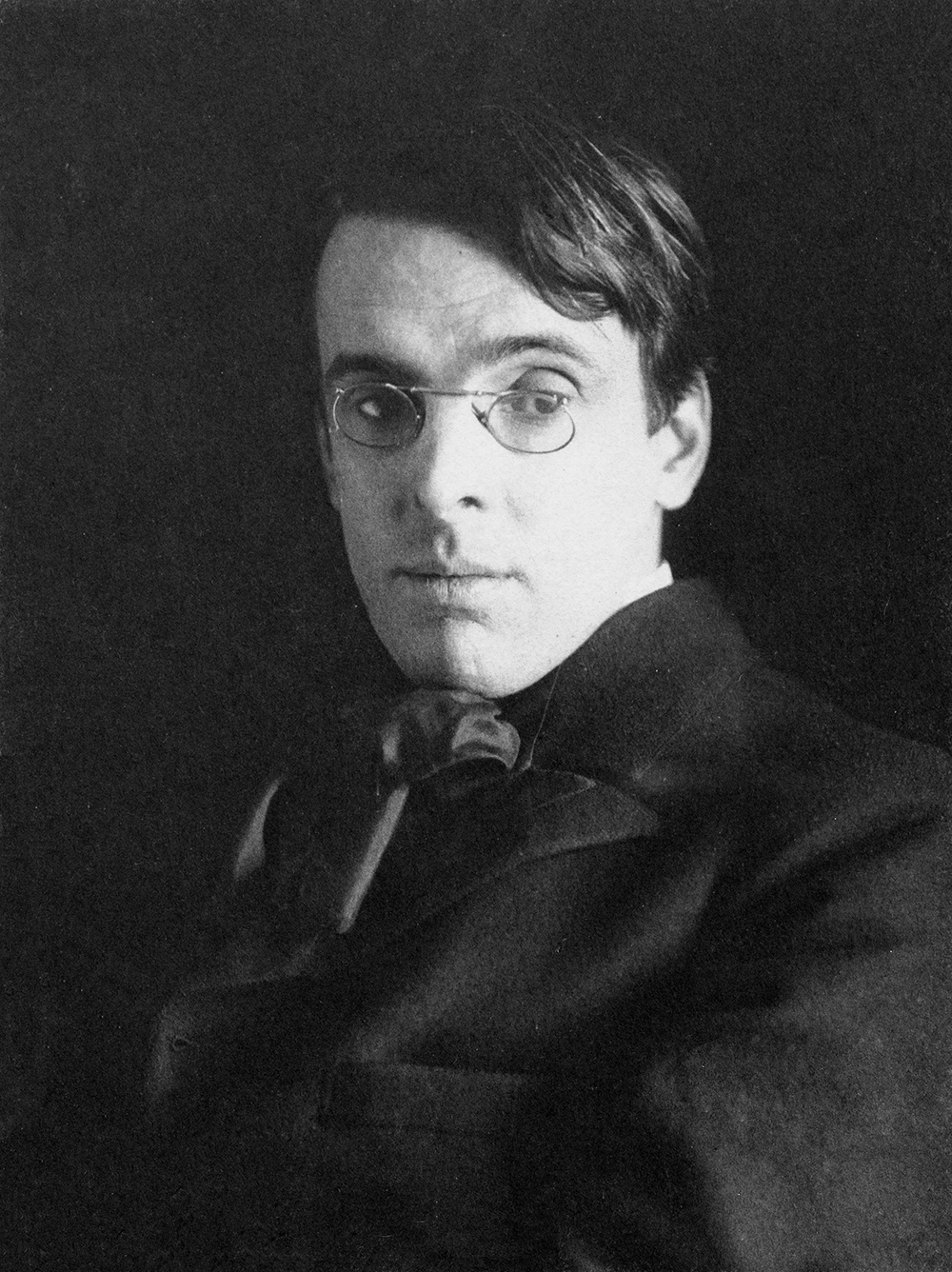
By Alice Boughton - Whyte's, Public Domain
W.B. Yeats
The Irish poet; William Butler Yeats, was born in Dublin. His early poetry is romantically lyrical and drew on Irish legend for his poetic plays.
His personal life was unhappy in that the beautiful Maude Gonne - to whom his works are addressed - refused to marry him. Subsequently, in 1917, he married Georgie Hyde-Lees, whose work as a medium reinforced his leanings towards mysticism.
He was a founder of the Abbey Theatre in Dublin, a Senator of the Irish Free State from 1922 to 1928 and was awarded the Nobel Prize for Literature in 1923.
6
SINGING IN THE STREETS
Leonard Clark [1905-1981]
I had almost forgotten the singing in the streets,
Snow piled up by the houses, drifting
Underneath the door into the warm room,
Firelight, lamplight, the little lame cat
Dreaming in soft sleep on the hearth, mother dozing,
Waiting for Christmas to come, the boys and me
Trudging over blanket fields waving lanterns to the sky.
I had almost forgotten the smell, the feel of it all,
The coming back home, with girls laughing like stars,
Their cheeks, holly berries, me missing one,
Silent-tongued, soberly, by the long church wall;
Then back to the kitchen table, supper on the white cloth,
Cheese, bread, the home-made wine,
Symbols of the night's joys, a holy feast.
And I wonder now, years gone, mother gone,
The boys and girls scattered, drifted away with the snowflakes,
Lamplight done, firelight over,
If the sounds of our singing in the streets are still there,
Those old tunes, stii! praising:
And now, a lifetime of Decembers away from it all,
A branch of remembering holly stabs my cheeks,
And I think it may be so;
Yes, I believe it may be so.

Illustrated by: Nigel Mason
33
'TWAS THE NIGHT BEFORE CHRISTMAS
'Twas the first night of Christmas a long time ago
The hillside was peaceful, the moon was aglow.
The world couldn't know from what happened before
That men would remember this night evermore.
The sheep on the hillside - their days journey over
Were dreaming sweet dreams of a field full of clover.
The shepherds were watchful while guarding their flock
The earth was their pillow, the stars were their clock.
Then all of a sudden, they jumped at the sight
Of the sky all ablaze with a heavenly light.
They huddled in fear, then they started to rise
As the lightening-like flash tore open the skies.
The heavens were split by the silvery ray.
The dark disappeared and the night became day.
And low, at the end of the rainbow a light
Appeared then an angel to banish their fright.
The angel brought news of a birth in a manger
And bade them to hasten to welcome the stranger.
For Mary had just given birth to a boy
Whose coming would bring so much comfort and joy.
A choir of angels looked down from the sky
And heavenly voices were heard from on high:
Peace be on earth and good will to all men.
The Saviour has come on this night, Amen.
The heavenly angels then faded from sight.
The sky once again turned from day to night
The shepherds all quietly rose from the ground
And hurried to go where the child would be found.
As they reached Bethlehem and the inn was in sight
It led like a path to a soft little bed
And shone very tenderly on a child's head.
The child in the manger was sleeping so sound
His eyes were still closed, as the shepherds stood round.
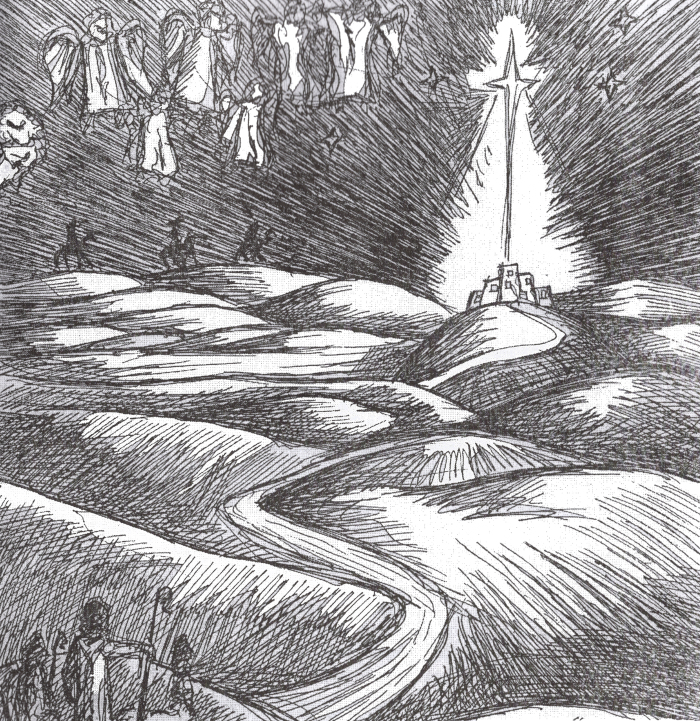
Illustration by: Paul Swailes
Thousands of years would be warmed by the glow.Guided by light from a bright shining star
Came a pilgrimage led of three kings from afar.
They were dressed in the finest of satins and lace,
Their complexions were that of an Orient race.
The three wealthy kings were wise men and proud
But they went to the Christ child and solemnly bowed.
They came bearing treasures of incense and gold
To that sweet little child, still not very old.
The star in the sky twinkled down from above
The world was awakened to kindness and love.
The past was forgotten, the future was bright
And the spirit of Christmas was born on that night.
Author Unknown
39
ON THE SHORES OF NORMANDY
David Prowse - May 1994
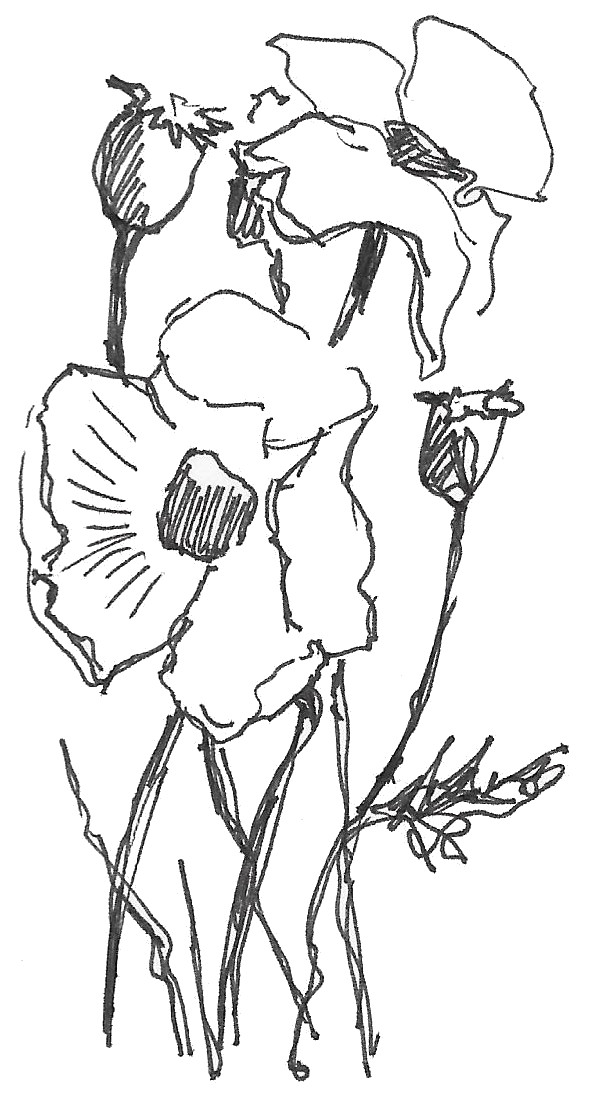
Illustration by: Paul Swailes
Can it be that, as I played on clover-cushioned Cornish hay,
Another generation's youth were fighting, just a Channel's width away?
Can it be that, as I dreamed, without a care, at Mother's knee,
Life and death were random partners on the shores of Normandy?
Father, mother, sisters, brother, self-appointed guardians all,
Shielding me from fear's intrusion even if the sky should fall,
In their smiles and whispered secrets, love would find conspiracy,
Love, the patron saint of soldiers on the shores of Normandy.
Putting up the blackout curtain, tip-toed on the window-seat,
Knowing not the why's and worries, insulated by deceit,
Tilley lamps and saucered candles cloistered my security
Championed by willing strangers on the shores of Normandy.
Only later, older, wiser, only then was I aware,
Pock-marked uncles told their stories, softly, like an angel's prayer,
Pictures incomplete and hazy, drawn, with tears, on our settee
Brought me face to face with horror on the shores of Normandy.
But time would pass and, with its passing, scars and soldiers' tales would fade,
Growing up would mean forgetting sacrifices starkly made,
For heroes, too, succumb to age which masks and cloaks their pedigree
While the ocean curls, regard!ess, on the shores of Normandy.
Now it's 50 years thereafter but, for those who battled there,
The sights and sounds and stench and smoke still taint the morning air,
One part of them forever lost to sands across the rolling sea
And to those who fell beside them on the shores of Normandy.
Reproduced by kind permission of David Prowse
31
TO AUTUMN
John Keats [1795-1821]
Close bosom-friend of the maturing sun;
Conspiring with him how to load and bless
With fruit the vines that round the thatch-eves run;
To bend with apples the mossed cottage-trees,
And fill all fruit with ripeness to the core;
To swell the gourd and plump the hazel shells
With a sweet kernel; to set budding more,
And still more, later flowers for the bees,
Until they think warm days will never cease,
For summer has o'er-brimmed their clammy cells.

Illustration by: Paul Swailes
14
OLD BERRYNARBOR
Berrynarbor - View No. 90

This view of our village was taken by William Garratt around 1906-8 and shows the backs of the cottages on Pitt Hill, as well as the roof of Fuchsia Cottage and part of The Lodge. It also shows Hagginton Hill, from North Lee Farm with its linhey and all the cottages stretching up to Grattons at the top.
The terrace of cottages shown in the foreground are, from right to left: Swan Cottage - then No. 38, Forge Cottage - then No. 37, and finally the two former cottages, one of which served as the local post office until 1921 when it was transferred to the present premises. These two cottages were, in the late '30's, completely changed to form Langleigh House and Lee View House.
At the time this photographic postcard was taken, The Lodge had only been built a few years before, in 1904. It is interesting to note how on Hagginton Hill there were at that time some large gaps between properties, which over the ensuing years were filled in by the building of further cottages.
Around the time this photograph was taken, Harry Camp lived in No. 38, which is now Forge Cottage and Swan Cottage was his forge and blacksmith's shop. Harry Camp was Vera Greenaway's grandfather and had, I believe, previously lived in Challacombe. The outbuildings shown would have probably housed chickens and a pig or two.
Tom Bartlett
Tower Cottage, July 2004
37
And it fills my heart with joy,
As the day break dawns and the sun awakes
And the sea-gulls soar above.
Yachts sail by without a sound
And fishing boats make their way,
On a sea of turquoise blue
Bejewelled by another glorious day!
There's a picture at the bottom of my garden
And it takes my breath away,
As the twilight fades with a sinking sun
At the end of a perfect day.
A sea of midnight blue
Reflects the orange sun so bright
As it slips through the lilac hue
And dips into the night.
Janet G

Illustration by: Peter Rothwell
26
SUMMER

Spring is yea and nay,
Autumn is a weather-cock
Blown every way:
Summer days for me,
When every leaf is on its tree.
When Robin's not a beggar,
And Jenny Wren's a bride,
And larks hang singing, singing, singing,
Over the wheat fields wide.
And anchored lilies ride,
And the pendulum spider
Swings from side to side.
And blue-black beetles transact business,
And gnats fly in a host,
And furry caterpillars hasten
That no time be lost,
And moths grow fat and thrive,
And ladybirds arrive.
Before green apples blush,
Before green nuts embrown,
Why, one day in the country
Is worth a month in town:
Is worth a day and a year
Of the dusty, musty, lag-last fashion
That days drone elsewhere.
Christina Rossetti [1830-1894]
13
IF
[Part 2 - again with apologies to Rudyard Kipling]
And not apportion blame nor blow your top
If you can put your trust in those who're working
To motivate us all to keep our village shop
Who willingly give time to rattle cages
Check grants, make plans and survey sites to choose
Then instigate a meeting for us sages [dubious, but it rhymes!]
To bring us up to date - then air our views
If our postmaster's into golf and surfing
And tired of daily chores - no blame for that
Remember Nora's care for sick and aged
And Alan's help when we have lost the cat
They've passed on news, sold tickets, survived flooding
And opened shop next day we saw no tears
Can we not make allowance for their closing
Then wish them health and many happy years?
Or think up ways to make our own shop pay
if you will shun the supermarket's trash
And wine shops where the booze is cheap, you may
Then buy your stamps, cooked meat and luscious veggies
And other needs, like pensions, cards and pop
Come have a chat, fund raise, provide the goodies
Then what is more - we'll keep our village shop!
Although the deadline has passed, IF you've not yet filled in the survey, please, please do so without delay. To parody the words of John Kennedy: "Ask not what your village shop can do for you, but what you can do for your village shop"!
PP of DC
10
A SHIP SAILS UP TO BIDEFORD
Upon a western breeze,
Mast by mast, sail over sail,
She rises from the seas,
And sights the hills of Devon
And the misty English trees.
She comes from Easter islands;
The sun is in her hold;
She bears the fruit of Jaffa,
Dates, oranges, and gold;
She brings the silk of China,
And bales of Persian dyes,
And birds with sparkling feathers,
And snakes with diamond eyes.
As white as an gull;
The East is gliding with her
The shadow of her hull.
A ship sails up to Bideford
Upon a western breeze,
With fruits of eastern summers
She rises from the seas,
And sights the hills of Devon
And the misty English trees.
Herbert Asquith

Illustrated by: Peter Rothwell
30
Doreen Damsell, who has nine grandchildren and has just welcomed her fifth great granddaughter, Lily, has sent in this poem, dedicated to all the new grandmothers - not forgetting the grandfathers!
To My Grandchildren
The joy that every sunrise brings.
View the world through different eyes,
The starry studded winter skies.
No diamond ever could replace
The smile upon a baby's face.
Try to see that every tree
Is fashioned for eternity.
The hum of bees,
The butterfly,
The rainbow after April rain,
The earth has been refreshed again.
The sweetest song you'll ever hear
Is when a bird sings loud and clear.
If ever you have been denied,
Some peace of mind,
Then look outside,
And you will see,
That all these things are yours
For free...
Doreen Damsell - Oaklands
17
A PRAYER ON GETTING OLDER!
I pray the Lord my shape to keep.
Please no wrinkles, please no bags,
And lift my butt before it sags.
And as for my belly, please take it away.
Please keep me healthy, please keep me young,
And thank you dear Lord, for all that you've done.
28
DAFFODILSWilliam Wordsworth

That floats on high o'er vales and hills,
When all at once I saw a crowd,
A host, of golden daffodils;
Beside the lake, beneath the trees,
Fluttering and dancing in the breeze.
Continuous as the stars that shine
And twinkle on the Milky Way,
They stretched in never-ending line
Along the margin of a bay:
Ten thousand saw I at a glance,
Tossing their heads in sprightly dance.
The waves beside them danced, but they
Out-did the sparkling waves in glee:
A poet could not but be gay,
In such a jocund company:
I gazed - and gazed but little thought
What wealth the show to me had brought:
For oft, when on my couch I lie
In vacant or in pensive mood,
They flash upon that inward eye
Which is the bliss of solitude;
And then my heart with pleasure fills,
And dances with the daffodils.
William Wordsworth 1770-1850
William Wordsworth was one of the most accomplished and influential of the English Romantic poets.
He was born in Cockermouth, Cumbria, on 7th April 1770 and educated at St. John's College, Cambridge. As a youth he developed a strong love of nature and in his school holidays frequently visited places noted for their scenic beauty. After receiving his degree in 1791, he went to France and became a convert to the ideals of the French Revolution. His French lover bore him a daughter in 1792, but due to the outbreak of hostilities between England and France, he did not see her until she was nine years old.
None of Wordsworth's poems were published until 1793 and his income from them did not amount to much. A bequest of £900 from a friend in 1795 allowed him, and his sister Dorothy, to move to Racedown in Dorset. He and Dorothy had a warm relationship and he relied on her a great deal for encouragement and support. Later they moved to Alfoxden in Somerset, near to his close friend Samuel Taylor Coleridge. 'l Wandered Lonely As A Cloud' [Daffodils], was written in 1807.
In 1799, Wordsworth and Dorothy moved to Dove Cottage in Grasmere, Westmorland. Also living nearby were Coleridge and Robert Southey, and the three became known as the 'Lake Poets'.
In 1802, Wordsworth married Mary Hutchinson, a childhood friend. Some years later, he and his family, including Dorothy, moved nearby to Rydal Mount, where, except for travels, he spent the rest of his life.
Wordsworth lived to see his work universally acclaimed and in 1843 he succeeded Southey as Poet Laureate. He died at Rydal Mount on the 23rd April 1850, and was buried in Grasmere churchyard.
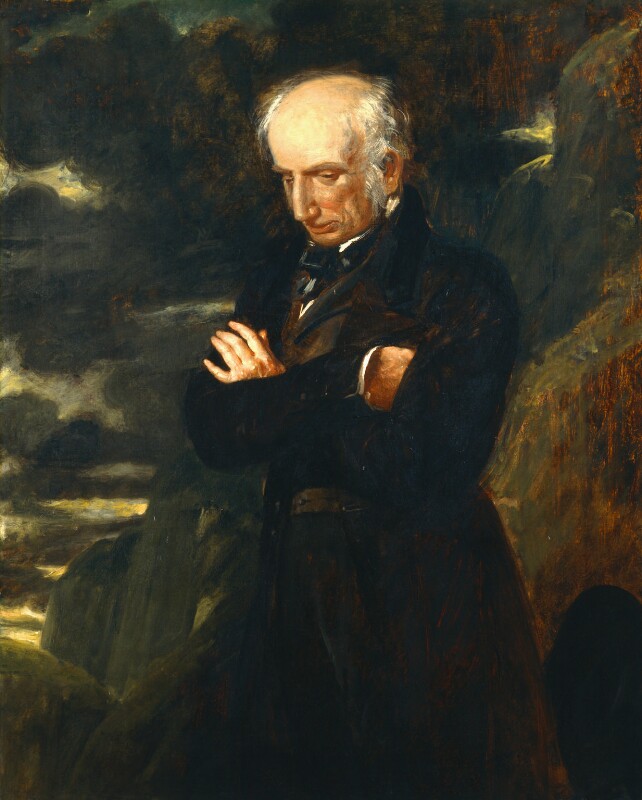
William Wordsworth
by Benjamin Robert Haydon
oil on canvas, 1842
Bequeathed by John Fisher Wordsworth, 1920
NPG 1857
© National Portrait Gallery, London
Licenced under CC BY-NC-ND 3.0
25
THE MIRACLE
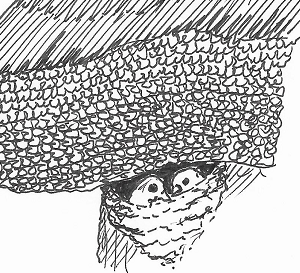
Albeit Winter still is in the air
And the Earth troubled, and the branches bare,
Yet down the fields today I saw her pass -
The Spring - her feet went shining through the grass,
She touched the ragged hedgerows - I have seen
Her fingerprints, most delicately green;
And she has whispered to the crocus leaves,
And to the garrulous sparrows in the eaves.
Swiftly she passed and shyly, and her fair
Young face was hidden in her cloudy hair.
She would not stay, her season is not yet
But she has reawakened, and has set
The sap of all the world astir, and rent
Once more the shadows of our discontent.
Triumphant news - a miracle I sing -
The everlasting miracle of Spring.
John Drinkwater
[1882-1937]
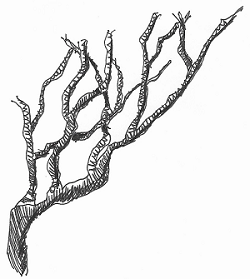
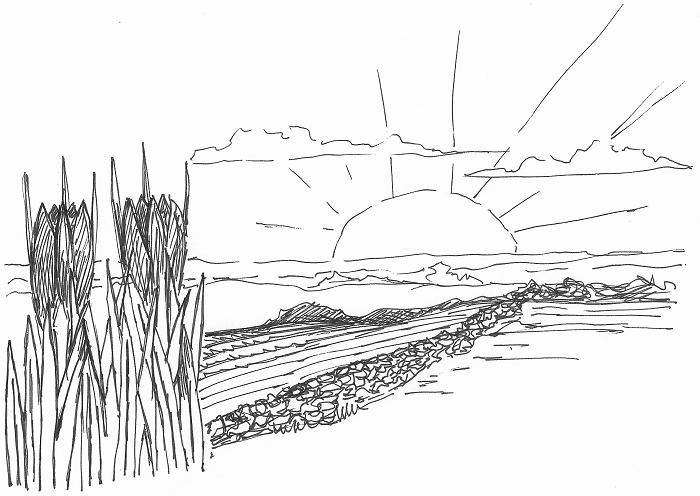
Illustrations by: Paul Swailes
30
HARBINGERS OF SPRING
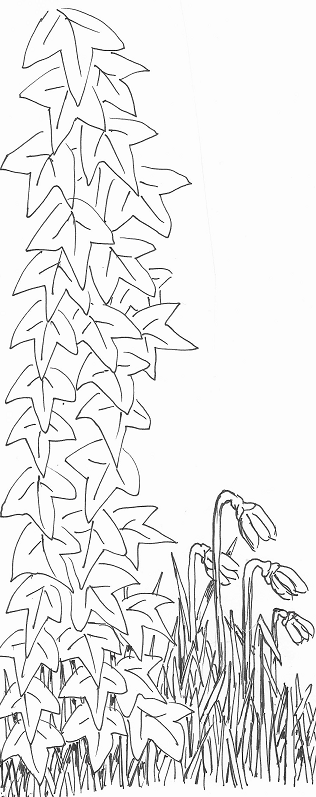
Harbingers of Spring
For Snowdrops are the harbingers of Spring,A sort of link between dumb life and light,
Freshness preserved amid all withering,
Bloom in the midst of grey and frosty blight,
Pale Stars that gladden Nature's dreary night!
Caroline Elizabeth Norton [1808-1877]
Snowdrop
Could you understandOne who was wild as if he found a mine
Of golden guineas, when he noticed first
The soft green streaks in a Snowdrop's inner leaves?
Robert Buchanan [1811-1901]
The Snowdrop
Yes, punctual to the time, thou'rt here again,As still thou art: though frost or rain may vary,
And icicles blockade the rockbirds' aery,
Or sluggish snow lie heavy on the plain,
Yet thou, sweet child of hoary January,
Art here to harbinger the laggard train
Of vernal flowers, a duteous missionary.
Nor cold can blight, nor fog they pureness stain.
Beneath the dripping eaves, or on the slope
Of cottage, garden, whether mark'd or no,
Thy meek head bends in undistinguish'd row.
Blessings upon thee, gentle bud of hope!
And Nature bless the spot where thou dost grow -
Young life emerging from the kindred snow!
Hartley Coleridge
[1796-1849]
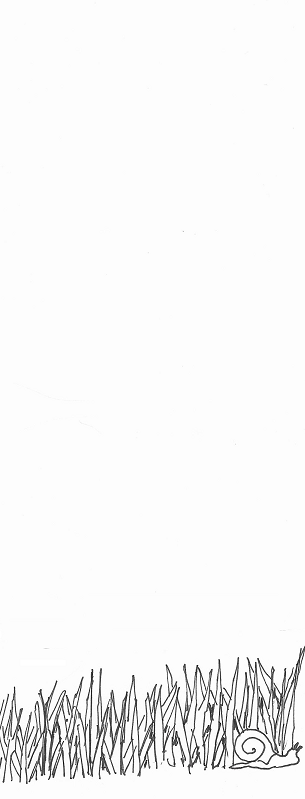
13
THE FOURTH WISE MAN
[A Poem by Dermot Dorgan)
Their names, we're told, were Melchior, Caspar and Balthazar.
One brought a gift of frankincense, the others myrrh and gold,
They came to greet the newborn king, the Gospel story told.
They gave their gifts to Jesus in the manger where he lay,
His mother offered coffee but they said they couldn't stay.
They got back on their camels - near the stable they'd been tied
And as they headed off back east, Mary softly sighed:
'I really don't need perfume - though myrrh of course is tops,
And gold is always useful, but we're nowhere near the shops.
And frankincense is lovely, but a stable's not the place .
I hope they're not the wisest men in all the human race.
'It was very good of them to come from such a far off land,
After all that time on camels, it's a wonder they could stand.
But bringing Jesus gifts of myrrh and frankincense and gold.
It's not very practical - he's only ten days old.'
Next afternoon a man appeared outside the stable gate,
He said he was the fourth wise man - and sorry he was late.
"I've brought some things thought I you'd need - it's just a little gift."
A quick inspection of his bag gave Mary's heart a lift.
A frozen casserole was there and a stuffed and fluffy toy,
Some baby clothes in pastel blue - he'd guessed it was a boy!
"The thought of washing nappies", Mary cried, "need not unnerve us
For here's a six-month voucher for a nappy washing service!"
She turned to thank the stranger but the stranger wasn't there.
He'd slipped away and vanished in the chilly winter air.
But on the gate he'd left a note, quite simple but profound
'Don't write this in the Gospel, please - I'd never live it down!'
So don't forget the Fourth Wise Man - the wisest of the lot,
He brought the really useful gifts the other three forgot.

Illustrated by: Debbie Cook
7
A PROUD BEARING
Many distant years ago,
A time of reminiscences
Of lifetimes spent below.
And in that special corner
Set aside for creature-kind,
A cow and sheep were chatting
Of the roles they'd been assigned.
'Oh, I was master's favourite,'
The cow proclaimed its worth,
'My yield of milk was next to none
Throughout my time on Earth.'
'My master, too, was grateful,'
The sheep declared its case,
'My fleecy wool was valued more
Than fine Damascus lace.'
They turned towards a donkey,
Stood, slowly munching hay,
'And what of you? the sheep enquired,
'You've nothing much to say.'
'He's just a beast of burden:
The cow exuded scorn,
'His life has been a dull routine
Of drudge since he was born!'
Each sharing in the joke
Until, at last, the laughter died
And then the donkey spoke.
He said, 'You've pride in your achievements
And this I understand
But why, I wonder, must you mock
My talents, out of hand?'
'We have our different uses,
No two are quite the same
Yet parts of God's good purpose
Akin in all but name.'
'l, too, have tasted glory
Among the world of men,
It was I who carried Mary
On her way to Bethlehem.
You had the trust of masters
For tasks and duties done
But mine, the King of Heaven and Earth
Entrusted me his son.'
David Prowse
45
A SHAGGY HARE STORY
Who kissed a princess for a dare.
He knew he really didn't ought,
So it served him right when he was caught.
They brought him up before the King,
Who was as mad as anything.
He sent off for the court magician,
And when he'd told him the position,
He said, "Tomorrow afternoon,
Turn this hare into a goon!"
Before the hare was led away,
The King asked, "What have you to say?"
The hare replied, in tones of sorrow,
"Hare today and goon tomorrow!"
Jack Doughty [1957]
Sent in by Inga R.
Illustrated by: Paul Swailes
20
EDEN ROCK
Charles Causley

Illustrated by: Nigel Mason
They are waiting for me somewhere beyond Eden Rock;
My father, twenty-five, in the same suit
Of Genuine Irish Tweed, his terrier Jack
Still two years old and trembling at his feet.
My mother, twenty-three, in a sprigged dress
Drawn at the waist, ribbon in her straw hat,
Has spread the stiff white cloth over the grass.
Her hair, the colour of wheat, takes on the light.
She pours tea from a Thermos, the milk straight
From an old H.P. sauce bottle, a screw
Of paper for a cork; slowly sets out
The same three plates, the tin cups painted blue.
The sky whitens as if lit by three suns.
My mother shades her eyes and looks my way
Over the drifted stream. My father spins
A stone along the water. Leisurely,
They beckon to me from the other bank.
I hear them call, "See where the stream-path is!
Crossing is not as hard as you might think."
I had not thought that it would be like this.
A typical, old-fashioned Cornishman, Charles Causley was born on the 24th August 1917 at Launceston, where he was brought up in the shadow of a Norman Castle overlooking the Tamar. An only child, his father -a groom and gardener - died in 1924, when Charles was only just seven.
He was educated at Launceston College. During the Second World War he served in the Royal Navy and on his release from the service, trained as a teacher at Peterborough Training College, returning to Launceston to teach children, something he did for most of his life. His retirement, too, was spent in the town of his birth.
Charles Causley began writing in the 1930's, first plays and later poetry, becoming one of the most important British poets of his generation.
He was made a Fellow of the Royal Society of Literature in 1958 and a CBE in 1986. He had honorary degrees from Oxford and Exeter, where he was also Honorary Fellow in Poetry.
"As an only child, he was the sole witness left to his parents' lives and to their traditional goodness. He never married, and his private life remained private. He refused to write an autobiography, since he said the truth about his life was available in his poems. "
Charles Causley, some of whose works have appeared in the Newsletter, died on the 4th November 2003, at the age of 86.
16
THE STORY OF DONKEY FRED
Charlie Disbrey
Old Fred he stands with downcast eye,
He shakes his head and wonders why,
'This empty meadow for my home,
And I stand sadly here, alone'.
He calls to mind a summer day,
And folk who walked the bridleway,
Who stayed awhile and had a chat,
And gave old Fred a friendly pat.
He wonders if it's true that when,
A donkey went to Bethlehem,
That Mary on his back did ride,
With Joseph walking at her side.
And now the stars are shining bright,
And darkness falls, once more 'tis night.
Now all is quiet and donkey Fred,
Walks slowly to his humble shed.
And underneath the starlit beams,
Old Fred the donkey sleeps and dreams,
With shepherds poor and the Wise Men,
He walks the road to Bethlehem.
And one bright star looked down and led,
Old donkey Fred to Jesu's bed.
He lowly kneels and with a bray,
Greets Jesus Christ on Christmas Day.
And Mary said, 'We thank you, Fred,
For coming to our manger bed.
Tell folk who walk the bridleway,
You came to us on Christmas Day.'
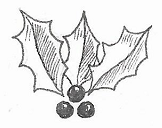
Illustration by: Debbie Rigler Cook
1
. . . AND IN THE MORNING
David Prowse
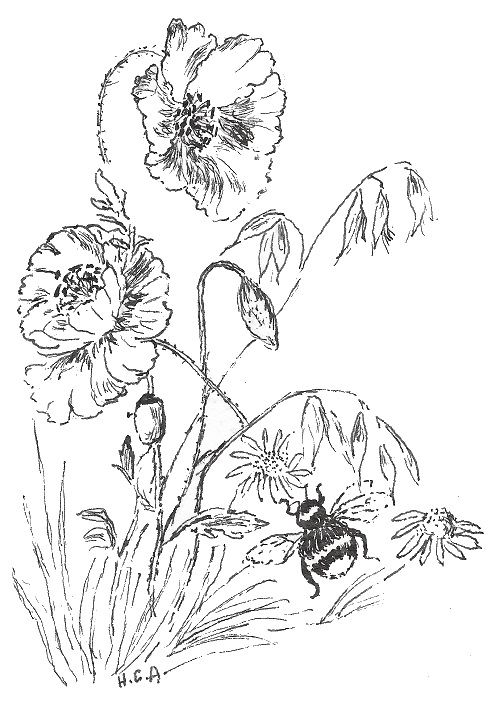
Illustrated by: Helen Armstead
His hair close-trimmed and pasted back,
He stooped and shuffled, pale of face
And strived to match the martial pace
Of others, holding banners high
Against the grey November sky.
But, medals gleaming on his chest,
He laid his wreath with all the rest
And, iron-willed, so briefly then
Was ramrod-straight and young again,
His eyelids closed, his pain concealed.
Another day. Another field.
His duty done, he turned his head.
'Your poppy, sir,' a young man said,
Retrieving from the ground beneath
The crumpled token stem and leaf,
So, as the clock proclaimed the hour,
Their hands entwined upon the flower.
The one forever robbed of youth,
The other reaching out for truth,
Two halves of duty's willing heart
By generations placed apart,
The veteran and the young cadet
And each our own . . . lest we forget.
"David Prowse is a master poet with that rare talent of reaching right to the heart of a subject, never wasting words, yet retaining the beauty of language for which English, in the right hands is renowned."
Graham Danton
* Reproduced by kind permission of David Prowse.
38
FIREWORKS
James Reeve

That burst upon the night,
Then fall to earth in burning showers
Of crimson, blue, and white.
Like buds too wonderful to name,
Each miracle unfolds,
Like whirling marigolds.
Rockets and Roman candles make
An orchard of the-sky,
Whence magic trees their petals shake
Upon each gazing eye.


Illustrated by: Paul Swailes
32
THE NEIGHBOURS' CAT
If anyone is busy, you'll be the one.
You sit in the sun, your coat like silk,
Are you the one who gulped down the milk?
Bostie, sweetie, you're only a cat
So why do you walk about like you're an actor from Sister Act?
You are the boss,
Even when you're drowned in moss.
Oh Bostie Boston you cute thing,
Are you the one who coughed up that wing?
It might be a spider or maybe a mouse,
But go home now, or mummy'll be cross,
After all, we all know really she is the boss!

Sophie Mummery [Age 12], Holmleigh
24
WINDY NIGHT
Patricia Beer
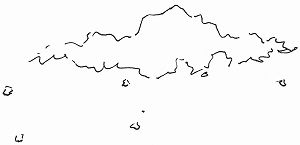
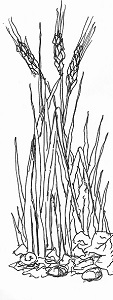
Twilight is brown and the ghost wind makes itself a body out of dead leaves, flaps the seamy side of winter at us, takes our breath away.
Over the hedge, straight across our path comes a broomstick fast as wickedness. The witch and the cat have been blow off. It cannot harm us, only fellow humans throw accurately.
The leaves were slow yesterday and incomprehensible, now like a chess game speeded up they make sense.
The wind's passion is more conniving than the law of where it should prevail.
Six months ago beginners, the leaves are old hands now. They deceive. Is it a leaf or a field mouse that scampers out of the grass and dodges back?
The stars look brilliant and useful. That Plough would work.
No one in these lanes sweeps up leaves but they will go in time, and perhaps bequeath the radiance of a Roman floor where once a mosaic sparkled.
Perhaps the sky will be smooth at dawn and two or three white tough clouds Armada across it.

Illustrations by: Paul Swailes
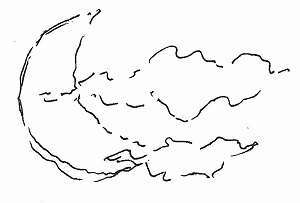
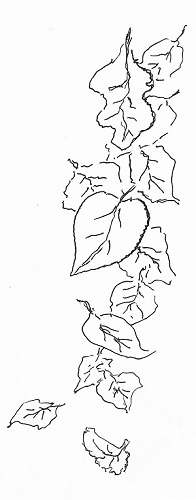
7
CHOOSING THEIR NAMES
Thomas Hood 1799-1845
What do you think their names should be?
One is tabby with emerald eyes,
And a tail that's long and slender,
And into a temper she quickly flies
If you ever by chance offend her.
I think we shall call her this -
I think we shall call her that -
Now, don't you think that Pepperpot
Is a nice name for a cat?
One is black with a frill of white,
And her feet are all white fur,
If you stroke her she carries her tail upright
And quickly begins to purr.
I think we shall call her this -
I think we shall call her that -
Now, don't you think that Sootikin
Is a nice name for a cat?
One is a tortoiseshell yellow and black,
With plenty of white about him;
If you tease him, at once he sets up his back,
He's a quarrelsome one, ne'er doubt him.
I think we shall call him this -
I think we shall call him that -
Now, don't you think that Scratchaway
Is a nice name for a cat?
Our old cat has kittens three
And I fancy these their names will be:
Pepperpot, Sootikin, Scratchaway - there!
Were ever kittens with these to compare?
And we call the old mother
Now, what do you think? -
Tabitha Longclaws Tiddley Wink.

Illustrated by: Debbie Rigler Cook
37
PRIDE BEFORE A FALL
The Peacock was sure that his beautiful tail
Would captivate every drab little female
He spread and preened it
Admired and cleaned it
He dreamed of soon having his very own harem
What fun it could be to pick them and choose them
Just look at my tail
My own holy grail
Those poor little Peahens so brown and so boring
Are surely all longing to do some adoring
To gaze at my tail
My beautiful tail
Arrayed in his glory he strutted his stuff
No thought in his head of any rebuff
With feathers like this
I'm guaranteed bliss
Now here she is coming my first little wifelet
Perhaps I'll be kind, give her nought to regret
I'll show her my plumes
She'll come to my rooms
He checked on his tail, his wonderful tail
Then gazed at the sky to let her grow pale
To fall at his feet
As was only meet
But oh what a turn off these show offs can be
Too pretty by half for you or for me
Oh dear what an ego
I just have to say...
Jenny, Middle Lee Farm

"What do you mean, no?"
Illustrated by: Debbie Rigler Cook
21

THE COMMON CORMORANT
Christopher Isherwood 1904-1986
Lays eggs inside a paper bag
The reason you will see no doubt
It is to keep the lightning out.
But what these unobservant birds
Have never noticed is that herds
Of wandering bears may come with buns
And steal the bags to hold the crumbs.


Illustrations by: Paul Swailes
20
SEA-FEVER
John Masefield 1878-1967


I must go down to the sea again, to the lonely sea and the sky,
And all I ask is a tall ship and a star to steer her by,
And the wheel's kick and the wind's song and the white sail's shaking,
And a grey mist on the sea's face and a grey dawn breaking.
I must go down to the seas again, for the call of the running tide
Is a wild call and a clear call that may not be denied;
And all I ask is a windy day with the white clouds flying,
And the flung spray and the blown spume, and the sea-gulls crying.
I must go down to the seas again, to the vagrant gypsy life,
To the gull's way and the whale's way where the wind's like a whetted knife;
And all I ask is a merry yarn from a laughing fellow-rover,
And quiet sleep and a sweet dream when the long day's over.
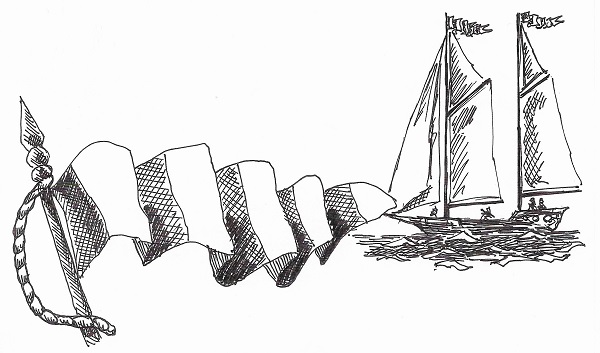
Illustrations by: Paul Swailes
9
I SAW A JOLLY HUNTER
Charles Causley
I saw a jolly hunter
With a jolly gun
Walking in the country
in the jolly sun.


In the jolly meadow
Sat a jolly hare.
Saw the jolly hunter.
Took jolly care.
Hunter jolly eager-
Sight of jolly prey.
Forgot gun pointing
Wrong jolly way.


Jolly hunter jolly head
Over heels gone.
Jolly old safety catch
Not jolly on.
Bang went the jolly gun.
Hunter jolly dead.
Jolly hare got clean away.
Jolly good, I said.

30
DUCKS' DITTY
Kenneth Graham 1858-1932
From The Wind in the Willows
All along the backwater,
Through the rushes tall,
Ducks are a-dabbling,
Up tails all!
Ducks' tails, drakes' tails,
Yellow feet a-quiver,
Yellow bills all out of sight
Busy in the river!
Slushy green undergrowth
Where the roach swim -
Here we keep our larder,
Cool and full and dim.
Every one for what he likes!
We like to be
Heads down, tails up,
Dabbling free!
High in the blue above
Swifts whirl and call -
We are down a-dabbling
Up tails all!

Illustrated by: Paul Swailes
20
ODE TO A PILL
I wonder how you understand
Just what to do or where to go
To stop the ache that hurts me so.
Within your content lies relief,
You work alone in disbelief.
You sink in regions there below
As down my throat you quickly go!
But what I wonder, little pill,
Is how you know where I am ill
And just how do you really know
Exactly where you have to go?
I have a headache, that is true,
My broken ribs need attention too!
So how can anything so small
End my aches in no time at all!
To do the good things that you do?
I'm counting on you mighty strong
To get to there, where you belong.
Don't let me down, please do not shirk
To do your undercover work.
So down my throat, be on your way
And end my aches for another day.
Don't take a wrong turn is my plea ..
I can't take another till after three.
This poem has come via a circuitous route from Australia to one of a 'caring' reader's 'Ladies' in lfracombe!
30
from
IN MEMORIAM
[vi]
Alfred, Lord Tennyson
Now burgeons every maze of quick
About the flowering squares, and thick
By ashen roots the violets blow.
Now rings the woodland loud and long,
The distance takes a lovelier hue,
And drowned in yonder living blue
The lark becomes a sightless song.
Now dance the lights on lawn and lea,
The flocks are whiter down the vale,
And milkier every milky sail
On winding stream or distant sea;
In yonder greening gleam, and fly
The happy birds, that change their sky
To build and brood; that live their lives
From land to land; and in my breast
Spring wakens too; and my regret
Becomes an April violet,
And buds and blossoms like the rest.

Illustrated by: Paul Swailes
Alfred Tennyson was born in August 1809 in Somersby, Lincolnshire. His early education was carried out by his father, a clergyman, Dr. George Clayton Tennyson. Alfred showed an interest and talent in poetic composition and by the time he was 15 had produced several blank-verse plays and an epic poem.
In 1830, with his friend Arthur Hallam, he joined a Spanish revolutionary army but participated in no military action.
Following the death of his father in 1831, Tennyson left Cambridge before completing his degree. His second volume of poems, including the Lady of Shalott, received bad criticism and after the sudden death of Hallam in 1833 and on the discovery that three of his brothers suffered mental illness, Tennyson became profoundly depressed and vowed to issue no verse for ten years. Druing this time he devoted himself to reading and meditation. At the end of this period, in 1842, he won wide acclaim with a Collection, amongst which were 'Morte d'Arthur' and 'Locksley Hall'.
In 1850 he married Emily Sarah Sellwood, whom he had been waiting to marry since 1836! He and Sarah settled first in Twickenham but later moved to Freshwater on the Isle of Wight.
In 1836 he succeeded William Wordsworth as Poet Laureate and as one of his duties of laureateship, he wrote 'The Charge of the Light Brigade' in 1854 to celebrate action in the Crimean War.
Tennyson was made a peer in 1884 and took his seat in the House of Lords as Baron Tennyson of Freshwater and Aldworth.
He died at Aldworth House, Haslemere in Surrey in October 1892.
20
from A MOTHER to a DAUGHTER
I was there in case you fell
When you said your first words
There was no-one left to tell
Photos of my baby
Have never left my side
Showing other people
Always made me glow inside
You weren't born with a handbook
I haven't always got it right
The teen years were a struggle
Almost one long fight
We persevered, and later
You came to me one night
You told me you were sorry
And had realised I was right
I'm so proud of who you've become
Your confidence and beauty
Make me glad to be your mum
I know I can't hold onto you
You have to spread your wings
But there's so much I have to share with you
And teach so many things
So when I try to show you
The error of your ways
Don't dismiss this as interference
By sending me away
I will always try to help you
I can't always make amends
But I consider this my job
As your MOTHER and your FRIEND
From an Anonymous Reader
16
I THINK MY TEACHER IS A COWBOY
That she rides to school on a horse
And carries a Colt 45 in her bag.
It's not just
the way she walks;
hands hanging over her hips.
It's not just
the way she dresses;
Stetson hat and spurs on her boots.
calling the playground the corral,
the Head's office the Sheriff's office,
the school canteen the chuck wagon,
the school bus the stagecoach,
the bike sheds the livery stable.
What gives her away
Is when the hometime bells go.
She slaps her thigh
And cries, "Yee ha!"
John Coldwell
36
HOUSEWIFE'S LAMENT
Like the learned professor, he just has to know.
"Come sit in the sun and look at this book."
My answer is always, "There are meals I must cook."
My shopping's becoming a hassle these days,
I'll push the trolley - his eyes start to g!aze,
Hands flying out and grabbing with glee
All sorts of goodies which I never see.
Immediately hisses, "Tell me, who's there?"
I'm under surveillance from morning to night,
Feeling quite desperate and looking a fright.
"Come watch the telly, you've got to see this."
A few hours of silence would be perfect bliss!
My routine has gone, I'm constantly tired,
No, I don't have a toddler - my husband's retired!
35
First Verse of
FROST AT MIDNIGHTSamuel Taylor Coleridge
[1772-1834]
Unhelped by any wind. The owlet's cry
Came loud - and hark, again! loud as before.
The inmates of my cottage, all at rest,
Have left me to that solitude, which suits
Abstruser musings: save that at my side
My cradled infant slumbers peacefully.
'Tis calm indeed! so calm, that it disturbs
And vexes mediation with its strange
And extreme silentness. Sea, hill, and wood,
This populous village! Sea, and hill, and wood,
With all the numberless goings-on of life,
Inaudible as dreams! the thin blue flame
Lies on my low-burnt fire, and quivers not;
Only that film, which fluttered on the grate,
Still flutters there, the sole unquiet thing.
Methinks, its rotation in this hush of nature
Gives it dim sympathies with me who live,
Making it a companionable form,
Whose puny flaps and freaks the idling Spirit
By its own moods interprets, everywhere
Echo or mirror seeking of itself,
And makes a toy of Thought.

Illustrated by: Nigel Mason
25
Three Verses from
FEBRUARYJohn Clare 1793-1864
The thatch moss grows in brighter green;
And caves in quick succession drop,
Where grinning icicles have been,
Pit-patting with a pleasant noise
In tubs set by the cottage-door;
While ducks and geese, with happy joys,
Plunge in the yard-pond brimming o'er.
Which children mark with laughing eye,
And in the wet street steal again
To tell each other spring is nigh:
Then, as young hope the past recalls,
In playing groups they often draw,
To build beside the sunny walls
Their spring-time huts of stick or straw.
Round homesteads by the village side,
Scratching the hedgerow mosses by,
Where painted pooty shells abide,
Mistaking oft the ivy spray
For leaves that come with budding spring,
And wondering, in their search for play,
Why birds delay to build and sing.
John Clare
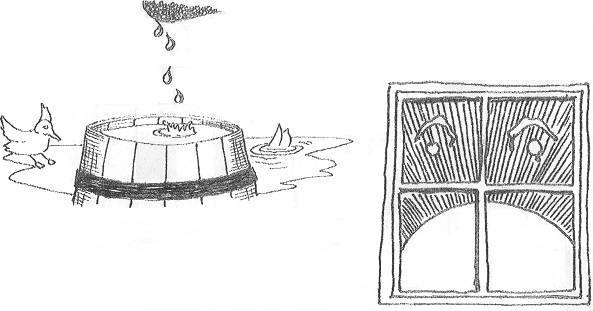
Artwork by: Paul Swailes
Known as a 'nature' poet, John Clare was deeply attached to the place of his birth, Helpstone in Northamptonshire, where he worked as an agricultural labourer. Writing his poetry mainly between 1821 and 1835, he suffered from fits of melancholy and was pronounced insane in 1837, spending most of the rest of his life in an asylum.
Today John Clare is recognised as a poet of truth and power and is appreciated for his highly personal evocations of landscape and place. His work, characterised by the use of dialect and idiosyncratic grammar laments lost love and talent, vanished innocence and the death of an earlier rural England.
14
THE TWELVE DAYS AFTER CHRISTMAS
My true love and I had a fight.
And so I chopped the pear tree down
And burnt it, just for spite.


I shot that blasted partridge
My true love gave to me.
I pulled on the old rubber gloves,
And very gently wrung the necks
Of both the turtle doves.


My mother got the croup,
I had to use the three French hens
To make some chicken soup.
For their language was obscene.
The five golden rings were completely fake
And turned my fingers green.

The six laying geese wouldn't lay,
So I sent the whole darn gaggle to the R.S.P.C.A.

What a mess I found,
The seven swans-a-swimming,
All had drowned!
Before they could suspect,
I bundled up the
Eight maids-a-milking,
Nine ladies dancing,
Ten lords-a-leaping,
Eleven pipers piping,
Twelve drummers drumming
[Well, actually I kept one of the drummers]
And sent them back 'collect'.


"We are through, love!"
And I said in so many words
Your Christmas gifts were for the ... birds!
With thanks to Steve and Cindy
Illustrated by: Paul Swailes
4
JANUARY

The sun a spark
Hung thin between
The dark and dark.
Fat snowy footsteps
Track the floor.
Milk bottles burst
Outside the door.
The river is
A frozen space
Held still beneath
The tree of lace.
The sky is low,
The wind is gray.
The radiator
Purrs all day.
John Updike

34
THE YEAR'S ROUND
By
Coventry Patmore

Unfolds its saffron sheen;
At April's touch the crudest bark
Discovers gems of green.
Then sleep the seasons, full of might;
While slowly swells the pod
And rounds the peach, and in the night
The mushroom bursts the sod.
The winter falls; the frozen rut
Is bound with silver bars;
The snowdrift heaps against the hut,
And night is pierced with stars.


Illustrations by: Paul Swailes
20
BEACHCOMBER
George Mackay Brown

Rust and salt leather.
I gave it back to the sea, to dance in.
Tuesday a spar of timber worth thirty bob.
Next winter
It will be a chair, a coffin, a bed.
Wednesday a half can of Swedish spirits.
I tilted my head.
The shore was cold with mermaids and angels.
Thursday I got nothing, seaweed,
A whale bone,
Wet feet and a loud cough.
Friday I held a seaman's skull,
Sand spilling from it
The way time is told on kirkyard stones.
Saturday a barrel of sodden oranges.
A Spanish ship
Was wrecked last month at The Kame.
Sunday, for fear of the elders,
I sit on my bum.
What's heaven? A sea chest with a thousand gold coins.
Illustrated by: Paul Swailes
13
If I Knew
That I'd see you fall asleep,
I would tuck you in more tightly
and pray the Iord, your soul to keep.
If I knew it would be the last time
that I see you walk out the door,
I would give you a hug and kiss
and call you back for one more.
If I knew it would be the last time
I'd hear your voice lifted up in praise,
I would video tape each action and word,
so I could play them back day after day.
If I knew it would be the last time
I could spare an extra minute
to stop and say, "l love you",
instead of assuming you would KNOW I do.
If I knew it would be the last time
I would be there to share your day,
Well I'm sure you'll have so many more,
so I can let just this one slip away.
For surely there's always tomorrow
to make up for an oversight,
and we always get a second chance
to make everything just right.
to say "l love you",
And certainly there's another chance
to say our "Anything I can do?"
But just in case I might be wrong
and today is all I get,
I'd like to say how much I love you
and I hope we never forget
Tomorrow is not promised to anyone,
young or old alike,
And today may be the last chance
you get to hold your loved one tight.
So, if you're waiting for tomorrow,
Why not do it today?
For if tomorrow never comes,
you'll surely regret the day,
That you didn't take that extra time
for a smile, a hug, or a kiss,
you were too busy to grant someone
what in fact was their one last wish.
So hold your loved ones close today,
and whisper in their ear,
Tell them how much you love them
and that you'll always hold them dear.
Take time to say, "I'm sorry",
"Please forgive me", "thank you" or "It's okay".
And if tomorrow never comes,
you'll have no regrets about today.
4
THE DEPARTURE OF
SUMMER
Thomas Hood
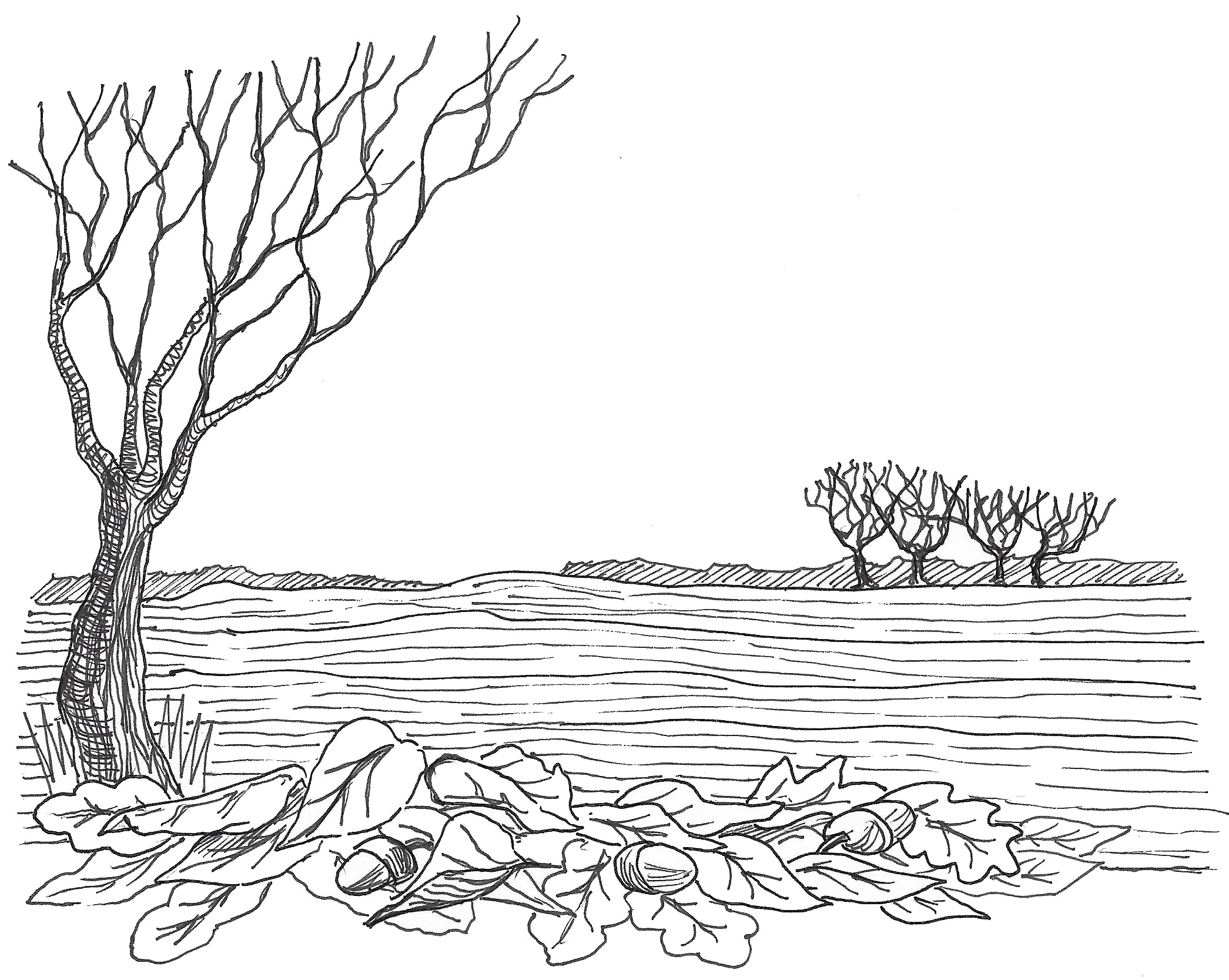
And Earth has buried all her flowers:
No more the lark, the linnet sings,
But Silence sits in faded bowers.
There is a shadow on the plain
Of Winter ere he comes again, -
There is in woods a solemn sound
Of hollow warnings whispered round,
As Echo in her deep recess
For once had turned a prophetess.
Shuddering Autumn stops to list,
And breathes his fear in sudden sighs,
With clouded face, and hazel eyes
That quench themselves, and hide in mist.
Thomas Hood [1799-1845] was born in London, the son of a bookseller. From 1821 to 1823 he was Assistant Editor of the London Magazine, and he also edited various periodicals. Hood wrote a lot of humorous and satirical verse, making use of his talent with puns, although his satire lacked bite.
Amongst his serious poems are the very successful 'Song of the Shirt' and the 'Plea of the Mid-summer Fairies', which includes the lines:
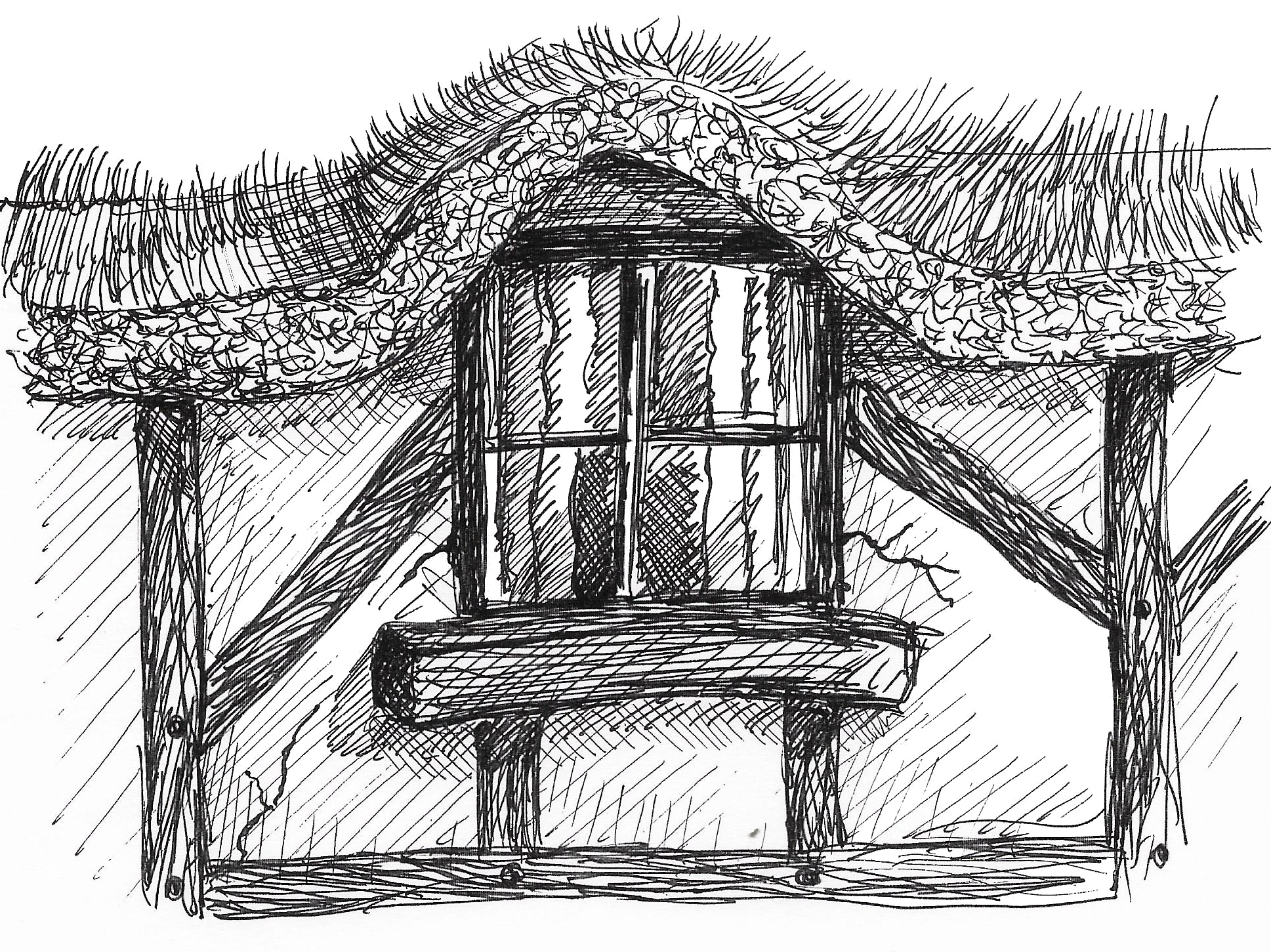
The house where I was born,
The little window where the sun
Came peeping in at morn;
He never came a wink too soon,
Nor brought too long a day,
But now, I often wish the night
Had borne my breath away.
Illustrations by: Paul Swailes
31
BLACKBERRY-PICKING
For Philip Hobsbaum

Illustrated by: Paul Swailes
For a full week, the blackberries would ripen.
At first, just one, a glossy purple clot
Among others, red, green, hard as a knot.
You ate that first one and its flesh was sweet
Like thickened wine: summer's blood was in it
Leaving stains upon the tongue and lust for
Picking. Then red ones inked up and that hunger
Sent us out with milk-cans, pea-tins, jam-pots
Where briars scratched and wet grass bleached our boots.
Round hayfields, cornfield and potato drills
We trekked and picked until the cans were full,
Until the tinkling bottom had been covered
With green ones, and on top big dark blobs burned
Like a plate of eyes. Our hands were peppered
With thorn pricks, our palms sticky as Bluebeard's.
We hoarded the fresh berries in the byre.
But when the bath was filled we found a fur,
A rat-grey fungus, glutting on our cache.
The juice was stinking too. Once off the bush
The fruit fermented, the sweet flesh would turn sour.
I always felt like crying. It wasn't fair
That all the lovely canfuls smelt of rot.
Each year I hoped they'd keep, knew they would not.
Seamus Heaney
12
Loves Beginnings
OH TELL ME THE TRUTH ABOUT LOVE


And some say it's a bird,
Some say it makes the world go round,
And some say that's absurd,
And when I asked the man next door,
Who looked as if he knew,
His wife got very cross indeed,
And said it wouldn't do.
Does it look like a pair of pyjamas,
Or the ham in a temperance hotel?
Does its odour remind one of llamas,
Or has it a comforting smell?
Is it prickly to touch as a hedge is,
Or soft as eiderdown fluff?
Is it sharp or quite smooth at the edges?
O tell me the truth about love.
Our history books refer to it
In cryptic little notes,
It's quite a common topic on
The Transatlantic boats;
I've found the subject mentioned in
Accounts of suicides,
And even seen it scribbled on
The backs of railway guides.
Does it howl like a hungry Alsatian,
Or boom like a military band?
Could one give a first-rate imitation
On a saw or a Steinway Grand?
Is its singing at parties a riot?
Does it only like Classical stuff?
Will it stop when one wants to be quiet?
O tell me the truth about love.
It wasn't ever there;
I tried the Thames at Maidenhead,
And Brighton's bracing air,
I don't know what the blackbird sang,
Or what the tulip said;
But it wasn't in the chicken-run,
Or underneath the bed.
Can it pull extraordinary faces?
Is it usually sick on a swing?
Does it spend all its time at the races,
Or fiddling with pieces of string?
Has it views of its own about money?
Does it think Patriotism enough?
Are its stories vulgar but funny?
O tell me the truth about love.
When it comes, will it come without warning,
Just as I'm picking my nose?
Will it knock on my door in the morning,
Or tread in the bus on my toes?
Will it come like a change in the weather?
Will its greeting be courteous or rough?
Will it alter my life altogether?
O tell me the truth about love.
Illustrated by: Debbie Riger Cook

January 1938
W.H. Auden 1907-1973
33
LAVENDER BEDS
William Brighty Rands
The sunflowers and hollyhocks stood up like towers.
There were dark turncap lillies and jessimine rare,
And sweet thyme and marjoram scented the air.
The moon made the sundial tell the time wrong,
'Twas too late in the year for the nightingale's song.
The box trees were clipped and the alleys were straight
Till you came to the shrubbery hard by the gate.
The fairies stepped out of the lavender beds,
With mob-caps or wigs on their quaint little heads.
My lord had a sword, and my lady a fan,
The music struck up and the dancing began.
I watched them go through with a gay minuet,
Wherever they footed the dew was not wet.
They bowed and they curtsied - the brave and the fair,
And laughter - like chirping of crickets was there.
Then all of a sudden a church clock struck loud,
A flutter, a shiver was seen in the crowd.
The cock crew, the wind awoke, the trees tossed their heads
And the fairy folk hid in the lavender beds.
William Brighty Rands - 1823-1882
William Brighty Rands, who sometimes wrote under the pseudonyms Henry Holbeach and Matthew Browne, was known as the 'laureate of the nursery'. His best known work, written in 1864, was Lilliput Levee, a book of verse for children with illustrations by Millais and Pinwell. This was followed by Lilliput Lectures [1871] and Lilliput Legends [1872]. All three were published anonymously.
Rands also wrote a lot of miscellaneous journalism and he was a reporter in the House of Commons.
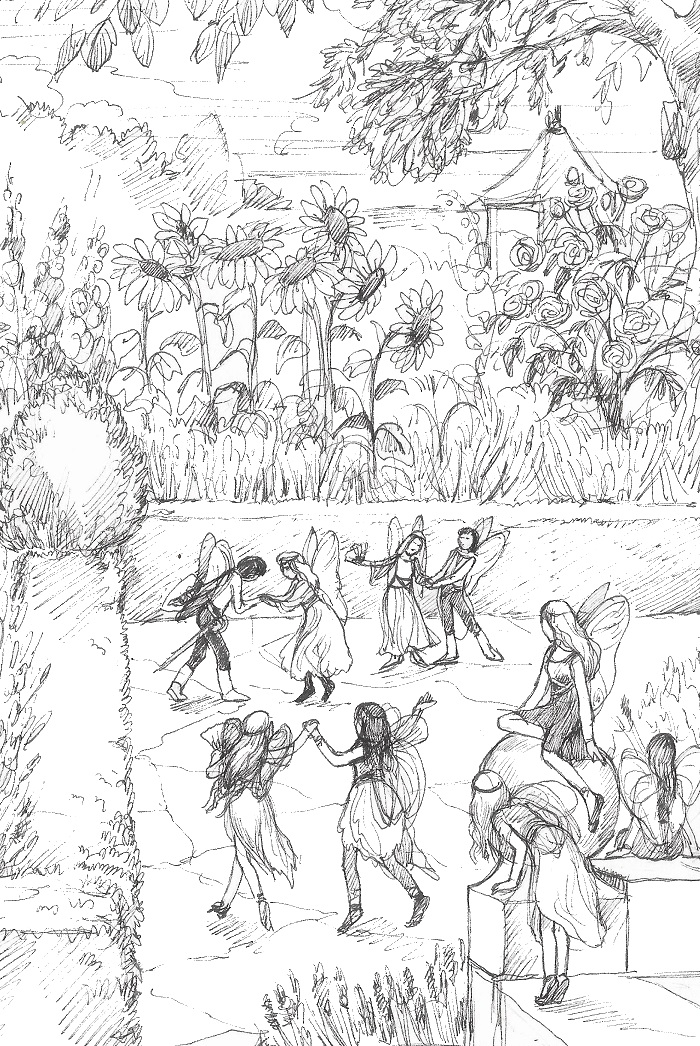
Illustrated by: Debbie Rigler Cook
18
SMILE

When someone smiled at me today, I started smiling too.
I passed around the corner and someone saw my grin,
When he smiled, I realised I'd pass it on to him.
I thought about that smile, then realised its worth,
A single smile just like mine, could travel 'round the earth.
So if you feel a smile begin, don't leave it undetected
Let's start an epidemic quick and get the world infected!

31
SO THEY SAID
Dorothy Yellowlees
That I would find no peace of Mind
In the country of my birth;
They said ...
That there would be no comfort here for me,
Nothing of any worth.
They said ...
That times had changed -
That now no longer would I see
The things that in the past were dear to me.
So they said.
And so, in fear lest they be right,
I came again to England,
And breathed the sweetness of her summer night.
And heard the song of birds at dawn again
All summer long.
I walked in fields where the white clover lies,
And trod the moors where the lone curlew cries,
I touched the mossy stones of centuries,
And knew
That they were wrong.
25
IRIS
Dame [Jean] Iris Murdoch was born in Dublin in 1919, and educated at the University of Oxford, where in 1948 she was appointed a Fellow and Tutor in Philosophy.
Her first non-fiction work was published in 1953 and then followed a successful career as a writer of both fiction and nonfiction. Her style of writing is complex, combining naturalism and the macabre, the familiar and the magical. Certainly not a writer to suit everyone's taste!
Iris Murdoch died in 1999, after suffering, in her latter years,from Alzheimers.
Her struggle with the disease, supported caringly and devotedly by her husband, John Bayley, has recently been portrayed in the film 'Iris'.
I had doubts about going to see this film but was glad I did. It was a moving experience, not as harrowing as I had perhaps expected, and acted and filmed with great sympathy and sensitivity.
Loss - A Journey Through Alzheimers

Illustration: Peter Rothwell
I lost a companion.
He lost the ability to manage simple daily tasks -
I lost a helpmate.
He thought I was his deceased sister -
I lost a husband.
He could not understand my anguish -
I lost a lover and comforter.
He lost time: days and nights became muddled -
I lost my diurnal rhythm
He wanted to be elsewhere; at work, with a long lost parent -
I lost an anchor.
He does not know his own home; our past, our present -
I lost the continuity of our marriage.
He stares at me blankly as I hold his hand.
I cannot understand his mumbling.
I am lost.
24
A LITTLE POEM
Written by an Aboriginal in his English for us Whites
Dear white fellow, couple things you should know:
When I born, I black.
When I grow up, I black.
When I go in the sun, I black.
When I cold, I black.
When I sick, I black.
And when I die, I still black.
You white fellow, when you born, you pink.
When you grow up, you white.
When you go in sun, you red.
When you cold, you blue.
When you scared, you yellow.
When you sick, you green.
And when you die, you grey,
And you have the cheek to call me coloured.
23
Alex's reference to 'coincidence' in the February issue brought the following to light:
THE LINCOLN-KENNEDY COINCIDENCE
Kennedy was elected in 1960
Lincoln's Secretary was called Kennedy,
Kennedy's Secretary was called Lincoln
Both Secretaries advised their superiors against going to the places where they were assassinated
Both Presidents were shot in the presence of their wives
Their successors were both named Johnson -
Andrew Johnson born 1808, Lyndon Johnson born 1908
As for the two assassins,
Booth was born in 1839,
Oswald was born in 1939
Both were slain before they could be brought to trial
Both Presidents were deeply concerned with the Civil Rights issue
22
THE WAY THROUGH THE WOODS
Rudyard Kipling
[1865
- 1936]
Seventy years ago.
Weather and rain have undone it again,
And now you would never know
There was once a road through the woods
Before they planted the trees.
It is underneath the coppice and heath,
And the thin anemones.
Only the keeper sees
That, where the ring-dove broods,
And the badgers roll at ease,
There was once a road through the woods.
Yet, if you enter the woods
Of a summer evening late,
When the night-air cools on the trout-ringed pools
Where the otter whistles his mate,
(They fear not men in the woods,
Because they see so few.)
You will hear the beat of a horse's feet,
And the swish of a skirt in the dew,
Steadily cantering through
The misty solitudes,
As though they perfectly knew
The old lost road through the woods.
But there is no road through the woods.
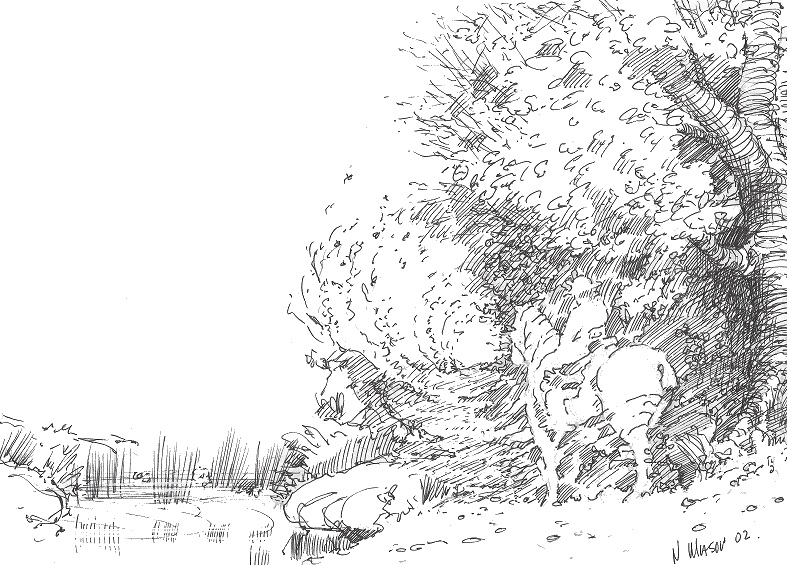
Illustrated by: Nigel Mason
20
TO DAFFODILS
You haste away so soon:
As yet the early-rising sun
Has not attained his noon.
Stay, stay,
Until the hasting day
Has run
But to the evensong;
And, having prayed together, we
Will go with you along.
We have as short a spring;
As quick to growth to meet decay,
As you, or anything.
We die,
As your hours do, and dry
Away,
Like to the summer's rain;
Or as the pearls of morning's dew
Ne'er to be found again.

Illustration: Paul Swailes
Robert Herrick
43
VACHEL LINDSAY - 1879-1931
The Moon's the North Wind's Cooky
[what the little girl said]

He bites it, day by day,
Until there's but a rim of scraps
That crumble all away.
The South Wind is a baker.
He kneads clouds in his den,
And bakes a crisp new moon that ... greedy
North ... Wind ... eats ... again!
Illustrated by: Paul Swailes


The Little Turtle
[A recitation for Martha Wakefield, three years old]
He lived in a box.
He swam in a puddle.
He climbed on the rocks.
He snapped at a mosquito.
He snapped at a flea.
He snapped at a minnow.
And he snapped at me.
He caught the mosquito.
He caught the flea.
He caught the minnow.
But he didn't catch me.

Illustrations by: Paul Swailes
32
INFANT SONG
by Charles Causley

Illustration: Debbie Rigler Cook
Lying in his little pram,
Polished all with water clean,
The finest baby ever seen?
Daughter, daughter, if I could
I'd love your baby as I should,
But why the suit of signal red,
The horns that grow out of his head,
Why does he burn with brimstone heat,
Have cloven hooves instead of feet,
Fishing hooks upon each hand,
The keenest tail that's in the land,
Pointed ears and teeth so stark
And eyes that flicker in the dark?
Don't you love my baby, mam?
Dearest, I do not think I can.
I do not, do not think I can.
25
HAPPINESS
A.A. Milne [1882-1956]
Great Big
Waterproof
Boots on;
John had a
Great Big
Waterproof
Hat;
John had a
Great Big
Waterproof
Mackintosh -
And that
(Said John)
Is
That.

Illustration: Debbie Rigler Cook
15
FARMER UGGETT
Further Verse in
Devonshire Dialect
by Lynda Waller
THE WIFE'S JACKDAW
The missus ed a jackdaw, tame?
Ur found this zoaked bedreggled chick-
I should'a ringed iz ruddy neck.
Ur dried un off an saut un up
An ed'n drinkin out a cup.
The dug wuz ordered out the ouze
An I wuz told t'shut me face.
Ur though the worlds of thic there burd
Sich silly talk y' never yered.
"An oo's iz Mummy's darlin Jack."
Yuk - twere anough t'make ee sick!
With thic there ruddy burd out loose
I couldn't sup a jar in peace.
Ee'd keep on swearin, gitt'n louder
An so l'd ev t 'share me cider.
All up and down the table top.
Ee'd cock iz aid one side an wait
Fer aff a chance t' rob me plate.
Ur made a master fool of ee
Like what ur never makes o'me
An if I ast fer jackdaw roast
Ur'd say ur's married to a beast!
Th'ol thing, ee used to squawk like ell-
Jus like a fire engine bell.
One time I sellotaped iz beak
So's I could yer me own sulf spaik.
Ee used t' perch right on me shoulder
An then ee'd drop a gurt big bolder.
An when I jus cleaned up me jacket
Ee'd cetch me wiv another packet!
T' shop fer vittles in the town.
Ur id the sellotape out back
An lef me babysitt'n Jack.
No sooner ed ur left the ouze
When Jack starts kickin up a fuss.
There's me all set t'watch the match,
An ee all set t 'make a spaich!
"You evil little burd!" I sez,
"A nasty piece o' wurk you is."
I upped and fetched a jar o' juice
Cuz shout 'n weren't no ruddy use!
Twuz like I'd turned the wireless off -
Ole Jack went quiet sure anough.
Ee sidles up an climbs me jar
An ulps izulf t'cider there.
I feels mesulf all gitt'n soft.
An so I let 'n bide - why not.
An fills mesulf another pot.
The match wuz good - our lads wuz game
An then I yers the missus ome ...
Next thing ur starts t' rant an rave,
An screams fer me t' pack an leave!
Twuz then me 'eart felt proper bad ...
Cuz there wuz Jack stood on iz aid
Wiv tail stuck up frum out the jar
Ee'd leaned in just that bit too far!
Now, cuz I want to keep me wife
I gives th'ol thing the kiss o' life.
First time y' seed a farmer yet
What takes daid birds t' see the vet.
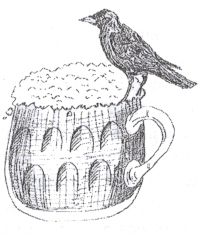
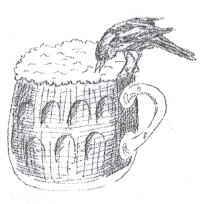
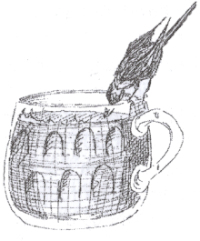
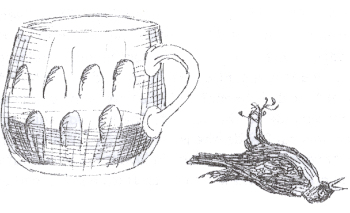
Illustrations by: Paul Swailes
Lynda Waller - Lynda Waller is just completing and publishing her third Farmer Uggett Book of Verse in Devonshire Dialect - the first was Farmer Uggett, the second Farmer Uggett and Plumber Sloath. These booklets, beautifully illustrated by the author, are available at £3.00 each from Kelly Publications, 6 Redlands, Tiverton, EX16 4DH, or telephone Lynda on 01884 259526.
31
SECRET CHARM
But there's a little more beyond this ancient ditty
"For folks who put him in a passion
Pied Piper piped in another fashion".
Now one young rat survived that hike
And Pied Piper taught him to play the pipe
My great-grandpa was a gay young frisker
And taught me all in the twitch of a whisker.
This secret charm is what I've got
To draw behind me men of pot
A lovely village lies in Devon
By ill repute a flower pot heaven.
Painters and builders you've done your job
Now join in Ratty's frivolous mob
Of course, like me, there's one exception
The Fuchsia Miss evades attention.
I know it may not suit this ditty
You must agree though she's so pretty.
But then, you know, one year is old
If they stay here they'll crack and break
So comes the promise I can make
Of happiness as in a dream
They'll all go on the Ground Force Team.

Lisa Shelley
16
AN ORDINARY SUNDAY EVENING AT YE OLDE GLOBE
Quiz Night for local brains, a chance to shine [or not]. This week.
The pens picked up, the chatter stilled, the teams chalked up. This week.
The pictures might not all look like the Adams Family. This week.
Perhaps we'll recognise a song, a group or two or three. This week.
A favourite hobby, novel, film could be the difference. This week.
Last hope [no hope], Lynne's adding up could fail! This week.
Look out, Phil winked! Who is 'The Weakest Link'? This week.
JD
44
SNOW
Feather soft and
quiet the snow;
It covers the road
and the walk
and the rooftops
and whispers to the
world:
Shhh!
Margaret R. Moore
34
ONE, TWO, THREE
And the way that they played together was beautiful to see.
She couldn't go running and jumping, and the boy, no more could he,
For he was a thin little fellow with a thin little twisted knee.
They sat in the yellow sunlight, out under the maple tree;
And the game that they played I'll tell you just as it was told to me.
It was like hide and seek they were playing, though you'd never have thought it to be,
With an old, old, old, old lady and a boy with a twisted knee.
The boy would bend his face down on his one little sound right knee,
And he'd guest where she was hiding in guesses one, two, three.
"You're in the china close," he would cry and laugh with glee.
It was not the china closet, but still he had two and three.
"You're up in Papa's big bedroom in the chest with queer old key."
And she said "you are warm and warmer but you're not quite right" said she.
"It can't be the little cupboard where mama's things used to be,
So it must be the clothes press, grandma," and he found her with his three.
Then she covered her face with her fingers that were wrinkled and white and wee,
And she guessed where the boy was hiding with a one, and a two and a three.
And they never had stirred from their place right under the maple tree,
The old, old, old, old lady and the boy with the lame little knee.
The dear, dear, dear old lady and the boy who was half past three.
Author Unknown

28
The Night Before Christmas
Not a creature was stirring, not even a mouse;
The stockings were hung by the chimney with care,
In hopes that St. Nicholas soon would be there;
The children were nestled all snug in their beds,
While visions of sugar plums danced in their heads;
And mamma in her 'kerchief, and I in my cap,
Had just settled our brains for a long winter's nap,
When out on the lawn there arose such a clatter,
I sprang from the bed to see what was the matter.
Away to the window I flew like a flash,
Tore open the shutters and threw up the sash.
The moon on the breast of the new-fallen snow
Gave the lustre of midday to objects below,
When, what to my wondering eyes should appear,
But a miniature sleigh, and eight tiny reindeer,
With a little old driver, so lively and quick,
I knew in a moment it must be St. Nick.
More rapid than eagles his coursers they came,
And he whistled and shouted, and called them by name:
'Now, Dasher! now, Dancer!, now, Prancer and Vixen!
On, Comet! on, Cupid!, on Donder and Blitzen!
To the top of the porch! to the top of the wall!
Now dash away! dash away! dash away all!'
As dry leaves that before the wild hurricane fly,
When they meet with an obstacle, mount to the sky,
So up o the house-top the coursers they flew,
With the sleigh full of toys, and St. Nicholas too.
And then, in a twinkling, I hear on the roof
The prancing and pawing of each little hoof.
As I drew in my head, and was turning around,
Down the chimney St. Nicholas came with a bound.
He was dressed all in fur, from his head to his foot,
And his clothes were all tarnished with ashes and soot;
A bundle of toys he had flung on his back,
And he looked like a peddler just opening his pack.
His eyes - how they twinkled, his dimples how merry!
His cheeks were like roses, his nose like a cherry!
His droll little mouth was drawn up like a bow,
And the beard of his chin was as white as the snow;
The stump of a pipe he held tight in his teeth,
And the smoke it encircled his head like a wreath;
He had a broad face and a little round belly,
That shook, when he laughed, like a bowlful of jelly.
He was chubby and plump, a right jolly old elf,
And I laughed when I saw him in spite of myself;
A wink of his eyes and a twist of his head,
Soon gave me to know I had nothing to dread;
He spoke not a word, but went straight to his work,
And filled all the stockings, then turned with a jerk,
And laying his finger aside of his nose,
And giving a nod, up the chimney he rose;
He sprang to his sleigh, to his team gave a whistle,
And away they all flew like the down of a thistle.
But I heard him exclaim, ere he drove out of sight,
'Happy Christmas to all, and to all a good night.'
Clement Clarke Moore
1779-1863 [b. USA]
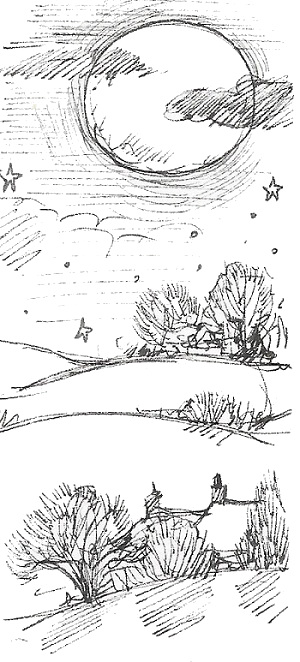
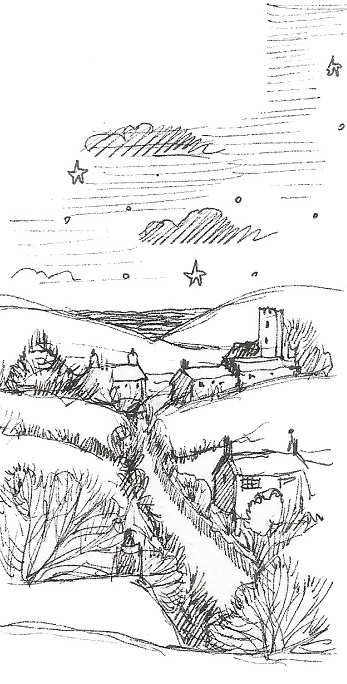
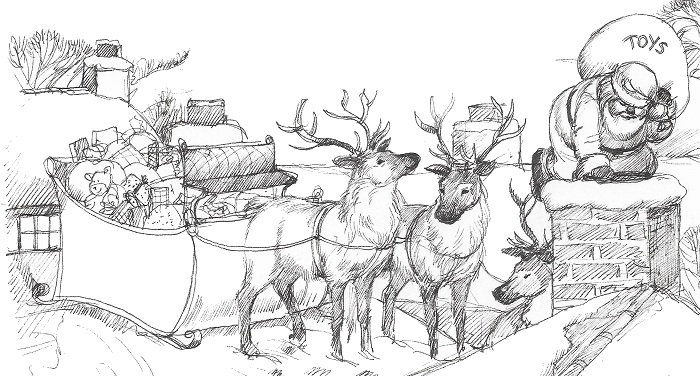
Illustrations by: Debbie Rigler Cook
27
A PRAYER
Give me a good digestion Lord,
And also something to digest.
Give me a healthy body Lord,
With sense to keep it at its best.
Give me a healthy mind good Lord,
To keep the good and pure in sight.
That seeing sin is not appalled,
But finds a way to put it right.
Give me a mind that is not bored,
That does not whimper, whine or sigh.
Don't let me worry overmuch
About the fussy thing called 'I'.
Give me a sense of humour Lord,
Give me the grace to see a joke.
To get some happiness from life,
and pass it on to other folk.
21
MUSIC
No symphony, no opera,
No easy access to the Albert Hall
But rhythms change
Fast running water always here
Voices slowed but loud
Birds more raucous than I ever knew
Jackdaws invade my space,
My roof, my life
Won't go away
But do I want them to?
The only lark I ever heard was in a concert hall
Vaughan Williams bird
Its song man's genius not its own
But now I've heard a real life Devon bird
Ascending over Exmoor wild and free
Notes falling earthwards
Like a day of rain, now soft and sweet
Then wild and windswept and exuberant
Another sound - not music to the ear
Sheep shout
I never knew they could!


Illustrations by: Paul Swailes [bird]
and Peter Rothwell [landscape]
J.D.
18
Night night, Mum, See You Later
My mum tucks me up in bed
And I'm nice and snug in my 'jamas,
Beside me my lovely old ted.
I always nod off very quickly
Before mum has turned off the light.
But when it's her bedtime much later,
Well then I wake up for the night.
For there's no time of day I like better
Than the hours between midnight and three
For mum hasn't got any housework
And can give her attention to me.
And when I start yelling and shouting,
Mum knows she has to be quick -
For the night that she leaves me to grizzle
Is the night I decide to be sick.
At still being my playmate at two -
She normally spends this time sleeping,
For she's nothing much better to do.
Some nights she mixes a cocktail
From the bottles she keeps on the shelf,
Which sometimes she gives me to swallow
And sometimes she gulps down herself!
And if in the morning I'm sleepy
And feel in need of a perk,
I can have forty winks in my buggie
While mum gets on with her work.
But nothing's as nice as the night time,
And nothing can equal the joy
Of finding it's four in the morning
And being a wide awake boy.
Contributed by an Ilfracombe Reader
[Acknowledgements to a Leeds Toddler Group]
14
EGOCENTRICITY
That there are people like me
Who wander aimlessly.
Or is it with purpose,
About the earth.
What makes the difference?
Is it the thought process
That goals are achieved.
Do they effect change
Or is change affected by them,
And does the end justify the means
Or is this yet another excuse to do as we please?
Peter Knight - Mill Park House
11
Where Do All the Teachers Go?
When it's four o'clock?
Do they live in houses
And do they wash their socks?
Do they wear pyjamas
And do they watch TV?
And do they pick their noses
The same as you and me?
Do they live with other people
Have they mums and dads?
And were they ever children
And were they ever bad?
Did they ever make mistakes?
Were they punished in the corner
If they pinched the chocolate flakes?
Did they ever lose their hymn books
Did they ever leave their greens?
Did they scribble on the desk tops
Did they wear old dirty jeans?
I'Il follow one back home today
I'll find out what they do
Then I'll put it in a poem
That they can read to you.
Peter Dixon
30
The Painting Lesson
It's mummy,' I replied.
But mums aren't green and orange!
You really haven't TRIED.
You don't just paint in SPLODGES
- You're old enough to know
You need to THINK before you work
Now - have another go.'
A face with sickly smile,
A rounded body, dark brown hair,
A hat - and, in a while,
She stood back [with her face bright pink]:
'That's SO much better - don't you think?'
But she turned white
At ten to three
When an orange-green blob
Collected me.
'Hi, Mum!'
Trevor Harvey
29
The New Computerised Timetable
Art in the History.
History in Maths.
And Maths in the swimming pool.
The lunch hour is from one o'clock to half-past,
Afternoon break has been moved to the morning.
Friday's timetable will operate
On alternate Thursdays.
Wednesday afternoon will be on Tuesday
Straight after Thursday's assembly.
From now on
We sit on desks
Write on chairs
And only wear hymn books when it's raining.
Next
The new fire drill.

John Coldwell
28
EVENING: PONTE Al, MARE, PISA
Percy Bysshe Shelley
The bats are flitting fast in the gray air;
The slow soft toads out of damp corners creep,
And evening's breath, wandering here and there
Over the quivering surface of the stream,
Wakes not one ripple from its summer dream.
There is no dew on the dry grass to-night,
Nor damp within the shadow of the trees;
The wind is intermitting, dry, and light;
And in the inconstant motion of the breeze
The dust and straws are driven up and down,
And whirled about the pavement of the town.
The wrinkled image of the city lay,
Immovably unquiet, and forever
It trembles, but it never fades away.


Illustrations by: Paul Swailes
Shelley was born at Field Place, near Horsham, Sussex, on the 4th August 1792. He was educated at Eton and then at Oxford, but was excluded after writing and circulating a leaflet on atheism, of which the university authorities disapproved.
Shortly after, at the age of 19, he married Harriet Westbrook and moved to the Lake District to study and write, publishing his first serious work, 'Queen Mab', two years later in 1813.
His friendship with the philosopher, William Godwin, led to his friendship with Godwin's daughter, Mary, and after separating from Harriet, he and Mary toured Europe in 1814.
Shelley returned to England and continued writing. On a further trip to Europe, in the summer of 1816, he and Mary met and became friendly with Lord Byron. In December of that year, just three weeks after the body of his wife, Harriet, was recovered from a London park lake, an apparent suicide, he and Mary were married.
In 1881, Shelley and Mary left England, travelling and living in various Italian cities, a time during which he wrote all his major works. Shortly before his 30th birthday, attempting to sail from Leghorn to La Spezia, he drowned when his yacht, Ariel, foundered in a storm. His body, washed ashore ten days later, was cremated in the presence of Byron and Leigh Hunt.
Many critics regard Shelley as one of the greatest of all English poets, but others object to the 'prettiness and sentimentality' of much of his work, maintaining that he was not as influential as the other British romantic poets, Byron, Keats or Wordsworth.
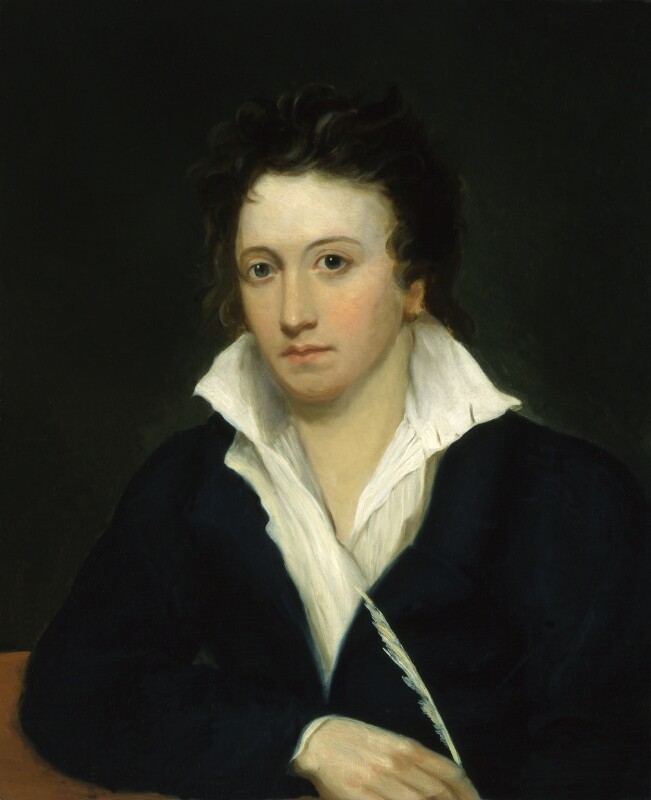
Percy Bysshe Shelley
by Alfred Clint, after Amelia Curran, and Edward Ellerker Williams
oil on canvas, circa 1829,
based on a work of 1819
NPG 1271
© National Portrait Gallery, London
Licenced under CC BY-NC-ND 3.0
20
FOR MY DEAR FRIEND OSCAR
Anon
For thc mealy buttercup days in the ancient meadow,
For the days of my teens, the sluice of hearing and seeing,
The days of topspin drives and physical well-being.
Thank you, my friend, shorter by a head, more placid
Than me your protege whose ways are not so lucid,
My animal angel sure of touch and humour
With face still tanned from some primeval summer.
Thank you for your sensual poise, your gay assurance,
Who skating on the lovely wafers of appearance
Have held my hand, put vetoes upon my reason,
Sent me to look for berries in the proper season.
I shall sense your presence when eyes and nostrils open,
Less often find your burgling fingers ready
To pick the locks when mine are too unsteady.
Thank you for the times of contact, for the glamour
Of pleasure sold by the clock and under the hammer,
Thank you for bidding for me, for breaking the cordon
Of spies and sentries round the unravished garden.
And thank you for the abandon of your giving,
For seeing in the dark, for making this life worth living.
15
FARMER UGGETT
Further Verse in Devonshire Dialect
I loves me wife
An tells ur ow
I loves ur more'n
Me fav'rit cow.
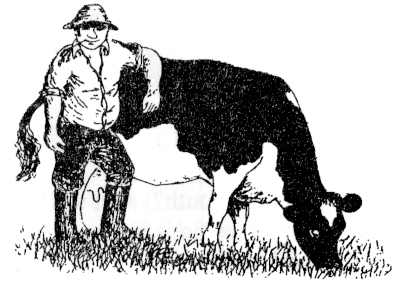
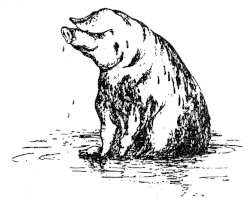
It mus be said
Tis an art ee've mastered -
To wallow in mud
An come out plastered.
I ates them arvest rats
I ates em grievously
An most of all I ates their guts
Cuz they eats me corn fer free.
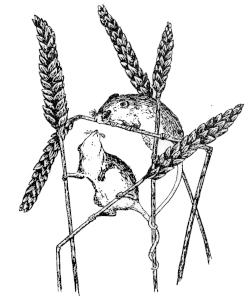
Written and Illustrated by: Lynda Waller
13
CROSSWORD SOLUTION

There Was an Old Man with a Beard
There was an old man
with a beard,
Who said, 'It is just as I feared!
Two Owls and a Hen,
Four Larks and a
Wren,
Have all built their
nests in my beard!'
Edward Lear, 1812-1888
36
AUGUST ENDS
Leonard Clark

Playing hide and seek with summer;
Winter takes a first grip on plant, insect, bird.
Last blackberry flowers fade,
And fruit, moving from green to red,
Dangles foot long purple clusters
Over downy hedgerows, wasps go numb,
Fall drowsy on dropped plums, honey and smoky wax
Perfume the spidered loft, barley shines.
Swifts on curved wings wheel overhead
Printing broad arrows on the leaden sky;
And now I catch the echo of the far north wind
And over the shorn and stubbled land
The dreaded hawk hovers, and a cloud of peewits cry.
Illustrated by: Paul Swailes
29
FARMER UGGETT
Verse in Devonshire
Dialect
Written and
Illustrated by Lynda Waller
Spreading Dung
As real old farmyard-type manure.
Mc fav'rit job is spreadin it -
Wiv cider too, to ulp the wit.
Im gwain around me field an back
And then I sees me neighbour, Zac.
I offers ee a drop o' booze . . .
Us drinks the lot an az a snooze -
Lied out like babies cross the track.
An then us wakes up, me an Zac,
An tells the same ole yarns, an us
Is laughin tull us nurly busts!
Us ed a lovely time - twuz rich
But then I yers the Missus scritch!
I jumps up quick an grabs me at -
Ops in me tractor like a cat
An off l goes - mus check the cows
An feed the sheep an . . . milk the sows!
Me poor ole aid be spinnin round.
I sort o' valls . . . agin the door . . .
Next thing, I'm lied out on the vloor
The missus lookin down at me.
I sez, "I've comed infer me tay!"
Ur looks right nasty at me then
An sez ur'll slowly count t' ten.
Tiz when ur get t' number dree
I tries t' git up on me knee.
Betime ur scritches number vour
I'm sprawlin all about the vloor.
Ur counts on up t' eight I s'pose
T' tull the truth I ardly knows,
But when ur gets t' number nine
I minds ur callin me a swine.
But arter that I knows n' more . . .
Until I wakes up later . . . corrr!
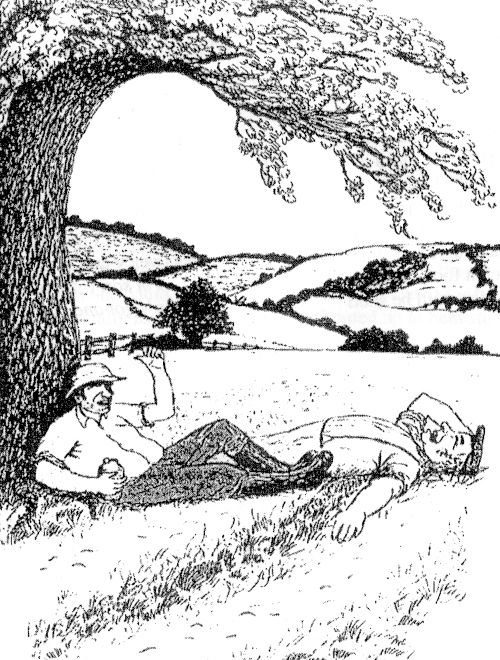
The Ten foot Gate
jus drivin down the road
C'lectin cars fer miles be'hind
and feelin really good.
I stops beside me field
unties me gate an chucks it back
An then I climbs back in me seat
and gives mesulf the sack.
Y'see, me combine arvester
as got a twulve foot cut -
An so a ten foot, op'n gate
might jus as wull be shut!
[I s'pose twull take'um aff the day]
I thinks I'll use the wider gate
out round by t'other way.
I settles down t' wait -
and pours mesulf some nice cold tay.
And then I sees this fancy woman
starin up at me.
Ur asts me if I noticed
ow there's twenty cars queued up.
I sez, "I'm sorry Missus,
but I on y l got one cup!"
About the Author/lllustrator
Lynda Waller was born on a farm in Devon in 1954. She spent the main part of her childhood on there as the middle one of three children. She attended Tiverton Grammar School and later moved with the family to Tiverton. She has been writing since her teens, mostly in the form of short stories, older children's pony fiction and humorous rural verse. For some years she was a member of Tiverton and then Crediton Writers' Circles, and has published poems and illustrations in local magazines. In August 1994, she and her sister, Joss, jointly exhibited their paintings at the Tiverton Museum. 'Farmer Uggett' is her first book of verse.
18
MY NEW SPELL CHECKER

It came with my pea sea.
It plainly marques four my revue
Miss steaks eye kin knot sea.
Eye strike a quay and type a word
And weight four it two say
Weather eye am wrong oar write,
It shows me strait a weigh
As soon as a mist ache is maid,
It nose bee fore two long,
And eye can put the error rite
It's rare lea ever wrong.
Eye have run this poem threw it,
I am shore yaw pleased two no,
Its letter perfect awl the weigh
My chequer tolled me sew.
Alex Parke
[but
Sauce unknown]
12
FISH
John Cunliffe

fat
cat
swish
fish


purr
fur
wish
fish


paw
below
dip
flip


mouth
wide
fish
slip
inside


lips
lick
cat
nap

Illustrations by: Debbie Rigler Cook
37
RESIDENTS REFUS..AL
What can spring up after dark?
They're used to mobile homes and tractor,
But this one is a puzzling factor.
A small wooden hut or is it a shed?
It looks quite cute, let it be said!
But it has no windows, only a door,
So now the question - what's it for?
The residents find out at last,
'Recycling' - dreams come thick and fast.
Imagine walking through the door,
Recycled and out at twenty-four!
But such dreams seldom do come true.
To emerge so young - not old and feeble,
But all have changed to flower pot people!
Now the village is overrun
With potty people having fun,
They have not left their childhood yet
So treat them all, please, with respect.
Joiner, chimney sweep, gardener, potter,
Their talents shine in terracotta,
With suitcase from the window climbing ...
Well this is someone with good timing!
And with this last line in my brain,
No one will speak to me again!

Artwork by: Lisa Shelley
Lisa Shelley
23
Extracts from NIGHT MAIL
by W.H. Auden, 1907-1973

Illustrated by: Nigel Mason
Bringing the cheque and the postal order,
Letters for the rich, letters for the poor,
The shop at the corner, the girl next door.
Pulling up Beattock, a steady climb:
The gradient's against her, but she's on time.
Past cotton-grass and moorland boulder,
Shovelling white steam over her shoulder,
Snorting noisily, she passes
Silent miles of wind-bent grasses.
Birds turn their heads as she approaches,
Stare from bushes at her blank-faced coaches.
Sheep-dogs cannot turn her course;
They slumber on with paws across.
In the farm she passes no one wakes,
But a jug in a bedroom gently shakes.
Letters of thanks, letters from banks,
Letters of joy from girl and boy,
Receipted bills and invitations
To inspect new stock or to visit relations,
And applications for situations,
And timid lovers' declarations,
And gossip, gossip from all the nations,
News circumstantial, news financial
Letters with holiday snaps to enlarge in,
Letters with faces scrawled on the margin,
Letters from uncles, cousins and aunts,
Letters to Scotland from the South of France,
Letters of condolence to Highlands and Lowlands,
Written on paper of every hue,
The pink, the violet, the white and the blue,
The chatty, the catty, the boring, the adoring,
The cold and official and the heart's outpouring,
Clever, stupid, short and long,
The typed and the printed and the spelt all wrong.
... And none will hear the postman's knock
Without a quickening of the heart.
For who can bear to feel himself forgotten?
7
SPRING FLOWERS
James Thomson [1700-1748]

And in yon mingled wilderness of flowers,
Fair-handed Spring unbosoms every grace:
Throws out the snow-drop and the crocus first;
The daisy, primrose, violet darkly blue,
And polyanthus of unnumbered dyes;
The yellow wall-flower, stained with iron brown,
And lavish stock that scents the garden round:
From the soft wing of vernal breezes shed,
Anemones; auriculas, enriched
With shining meal o'er all their velvet leaves;
And full ranunculas, of glowing red.
Then comes the tulip-race, where Beauty plays
Her idle freaks: from family diffused
To family, as flies the father-dust,
The varied colours run; and while they break
On the charmed eye, the exulting florist marks,
With secret pride, the wonders of his hand.
No gradual bloom is wanting; from the bud,
First-born of Spring, to Summer's musky tribes:
Nor hyacinths, deep-purpled; nor jonquils,
Of potent fragrance; nor narcissus fair,
As o'er the fabled fountain hanging still;
Nor broad carnations, nor gay-spotted pinks;
Nor, showered from every bush, the damask-rose:
Infinite numbers, delicacies, smells,
With hues on hues expression cannot paint,
The breath of Nature, and her endless bloom.
Illustrated by: Paul Swailes
34
SPRING MORNING
A.A. Milne
Down to the stream where the king-cups grow
Up on the hill where the pine-trees blow -
Anywhere, anywhere. I don't know.
Where am I going? The clouds sail by,
Little ones, baby ones, over the sky.
Where am I going? The shadows pass,
Little ones, baby ones, over the grass.
If you were a cloud, and sailed up there,
You'd sail on water as blue as air,
And you'd see me here in the fields and say:
"Doesn't the sky look green today?"
"It's awful fun to be born at all. "
Where am I going? The ring-doves coo:
"We do have beautiful things to do."
If you were a bird, and lived on high:
You'd lean on the wind when the wind came by.
You'd say to the wind when it took you away:
"That's where I wanted to go today!"
Where am I going? I don't quite know.
What does it matter where people go?
Down to the wood where the bluebells grow
Anywhere, anywhere. I don't know.

Illustrated by: Nigel Mason
24
POOR but BLESSED IN those OLD DAYS
We worked long hours when wages were low.
No TV, no wireless, no bath - times were hard,
Just a cold water tap and a walk in the yard.
No holidays abroad, no carpets on floors,
But we had coal on the fires and we didn't lock doors.
Our children arrived, no pill in those days,
And we brought them up without any state aid.
They were safe going out to play in the park
And old folks could go for a walk in the dark.
No valium, no drugs and no LSD,
We cured most of our ills with a good cup of tea!
No vandals, no muggings, there was nothing to rob,
We felt we were rich with a couple of bob.
Kinder and caring in so many ways.
Milkman and paperboy would whistle and sing,
A night at the pictures was our main fling.
We all got our share of trouble and strife,
We just had to face it, 'twas the pattern of life.
Now I am alone I look back through the years,
I don't think of the bad times, the troubles and tears,
I remember the blessings of our life, our love
That we shared them together - I thank God above.
Contributed by Vi
Kingdon
and sent to her by
an old shipmate and good friend of 59 years.
14
from LITTLE GIDDING

Sempiternal though sodden towards sundown,
Suspended in time, between pole and tropic.
When the short day is brightest, with frost and fire,
The brief sun flames the ice, on pond and ditches,
In windless cold that is the heart's heat,
Reflecting in a watery mirror
A glare that is blindness in the early afternoon.
And glow more intense than blaze of branch, or brazier,
Stirs the dumb spirit: no wind, but pentecostal fire
In the dark time of the year. Between melting and freezing
The soul's sap quivers. There is no earth smell
Or smell of living thing. This is the spring time
But not in time's covenant. Now the hedgerow
Is blanched for an hour with transitory blossom
Of snow, a bloom more sudden
Than that of summer, neither budding nor fading,
Not in the scheme of the generation.
Where is the summer, the unimaginable
Zero summer?
T.S. Eliot [1885-1965]
Illustration by: Paul Swailes
34
DADDY FELL INTO THE POND

Everyone grumbled. The sky was grey.
We had nothing to do and nothing to say.
We were nearing the end of a dismal day.
And there seemed to be nothing beyond,
Then
Daddy fell into the pond!
And Timothy danced for sheer delight.
'Give me the camera, quick, oh quick!
He's crawling out of the duckweed!' Click!
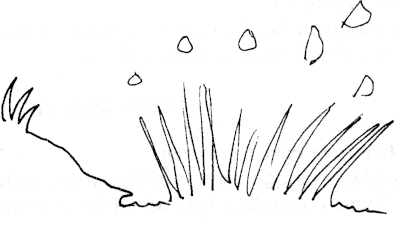
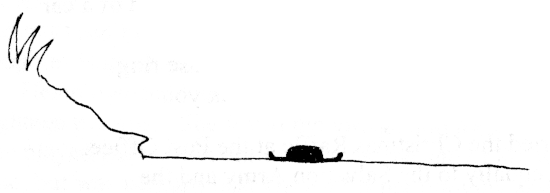
And doubled up, shaking silently,
And the ducks all quacked as if they were daft,
And it sounded as if the old drake laughed.
Oh, there wasn't a thing that didn't respond
When
Daddy fell into the pond!
Alfred Noyes, 1880-1958
Illustrated by: Paul Swailes
18
The Millennium
We lit our candles and began to pray,
That wars, famines and illness cease,
With our fellowman to live in peace,
Let us fill our hearts with love for humanity,
To reverse man's present insanity,
By smothering the flames of wickedness and wrong doing,
With a blanket of kindness and love, and a viewing
Of these, our present ways,
For only by giving love, can we expect love in return,
When once lit, it will fiercely burn,
Consuming Satan's dastardly plans,
Thus enriching those of God, and man's,
So let this be the beginning of our plan bespoke,
May we see it grow, like an Acorn into an Oak.
Contributed by Esme Ferris and written by her friend, Terry Waite, but no, not the Terry Waite!
6
A Poem for You
all written in a book.
And each year at Christmas time,
I go and take a look.
And that is when I realise
that these names are a part
Not of the book they're written in,
but taken from my heart.
For each name stands for someone
who has crossed my path sometime
And in that meeting they've become
the RYTHM of the RHYME.
And while you may not be aware
of any special link,
Just meeting you has shaped my life,
more than you think.
For once you've met somebody,
the years cannot erase
The memory of a pleasant word
or a friendly face

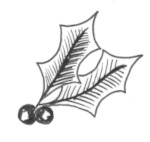
So never think my Christmas card
is just a mere routine
Of names upon a list,
forgotten in between.
For when I send a Christmas card
that is addressed to you
It's because you're on the list of folks
that I'm indebted to.
For you're part of the total
of the many folks I've met
And you happen to be one of those
I prefer not to forget.
Whether I have known you,
for many years or a few,
In some way you have had a part
In shaping the things I do.
Every year when Christmas comes.
I realise anew
The biggest gift that life can give
is knowing folks LIKE YOU!!
And so, of course, the warmest thoughts
go with this wish for you,
For the merriest of Christmases
and a Happy New Year, too.
With love.
2
JUST DOING MY JOB
We don't have much to say,
We just charge through the audience
In a Henchman sort of way.
We all wear woolly helmets
To hide our hair and ears,
And Wellingtons sprayed silver
To match our tinfoil spears.
Our swords are made of cardboard
blood will not be spilled
If we trip and stab a parent
When the hall's completely filled.
We don't look very scary,
We're mostly small and shy,
And some of us wear glasses,
But we give the thing a try.
We whisper Henchman noises
While Herod hunts for strangers,
And then we all charge out again
Like nervous Power Rangers.
Yet when the play is over
And Miss is out of breath
We'll charge like Henchmen through the hall
And scare our mums to death.
Clare Bevan
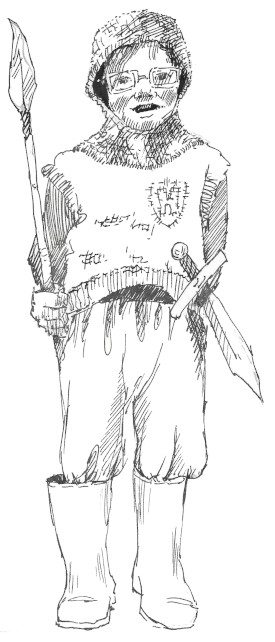
Illustration by: Nigel Mason
43
ODE TO MY FRIEND THE ROBIN
Blending in with Mother Earth,
Always somewhere near my homestead,
Robin Redbreast gaily chirps.
With me in the garden,
As the plants I tend,
Other birds may come and go
But there he always stays, a real true friend.
At yuletide he is busy
Spreading Christmas cheer,
And as Old Father Time clocks out,
He heralds in a bright New Year.
So, thank you robin Redbreast,
For all the joy you bring,
And may there never dawn the day,
When you will cease to sing.

Illustrated by: Debbie Rigler Cook
Vi Kingdon
27
CHILDHOOD MEMORIES
The Fear, the gloom, the empty pockets,
Winston Churchill's fat cigar,
No petrol for the motor car,
Blackout curtains, ration books,
Worry, stress, on tenterhooks,
The warning siren - helter skelter
Down the nearest air-raid shelter,
Barrage balloons, plump silvery grey
Guarding us each night and day,
Dads and hubbies gone off to fight,
Protecting us with all their might,
Some returned - but some were lost,
Most homes had to count the cost.
Black-edged photos of dear, brave men
Never to be seen again.
Bombed out houses, piles of rubble,
Those were desperate times of trouble.
The White Cliffs of Dover - We'll meet again
And still more men going off on the train.
Evacuation, the wrench and the tears -
More new partings - same old fears.
'Dig for Victory', 'Walls have ears'
Common phrases during those years.
'Careless talk costs lives', was one -
I didn't know any secrets - none!
The Desert Rats, El Alamein,
The Spitfire and the Hurricane,
Wrens and sailors, the Royal Fleet,
Air Raid Wardens up our street,
All these things and so much more
In my childhood memories store.

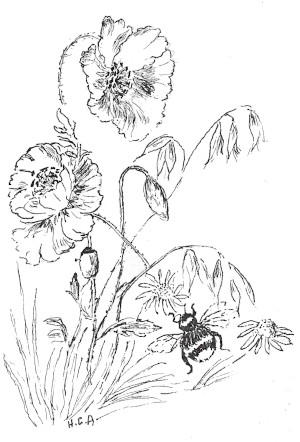
Illustration by: Helen Armstead
Wendy Barber
47
THE FATE OF RED SALLY
[may be sung to the tune of 'Oranges and Lemons']
'I am stuck in the Valley'.
'How did she get stuck?'
Asked a Combe Martin Bay duck.
'By growing too big',
Said an Ilfracombe pig.
'What was her fill?'
Asked the Hagginton Hill.
'All of my cream teas',
Said a cottage in The Lees.
'What will be her doom?'
Asked the waves of Woolacombe.
'Let's starve her 'til Sunday',
Said the Island of Lundy.
'She might get too thin',
Said the old Hunters Inn.
We have a good plan',
Said Little and Big Hangman.
'What might that be?'
Asked the fuchsias of Lee.
Said a Watermouth fish.
'Free me from the Valley
Is my wish', cried Red Sally.
'But a promise you must say',
Said the trees of Woody Bay.
'To look after these lands',
Said the bright Saunton Sands.
'From the streams to the harbour',
Said the hills of Berrynarbor.
'I'll care for you all',
Red Sally cried out her call.
Now you'll live for ever',
Said the Exmoor root heather.
'How do you know?'
Asked the church at Mortehoe.
'Look at us!' the fields said
'We have all turned deep red.'
For Red Sally had a rebirth
And is now Mother Earth!
Stephen McCarthy
42
THE OWL AND THE ASTRONAUT
Sailed through space
In their intergalactic ship
They kept hunger at bay
With three pills a day
And drank through a protein drip.
The owl dreamed of mince
And slices of quince
And remarked how life had gone flat;
'It may be all right
To fly faster than light
But I preferred the boat and the cat.'
Gareth Owen
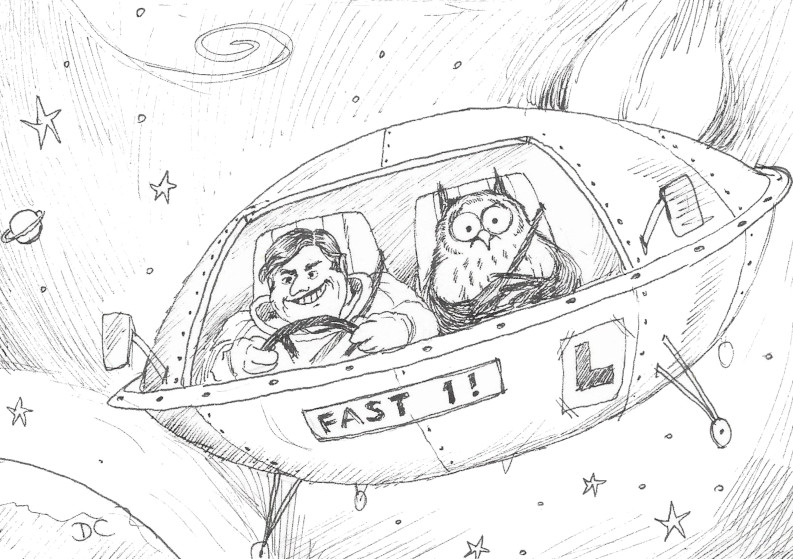
Illustrated by: Debbie Rigler Cook
30
ASPECTS OF THE SEASONS
Peter H
The ring of seasons tolled
By comfortable pagan feasts.
It stills and sets earth's dancing round,
Chills and frets the frost flowered ground
While waiting seeds and grubs, closebound
Beneath the sullen soil compound
Young life, survival's strife postponed.
A toppling turn, a quarter tilt towards the sun
And rainbow drenched dew jewelled
Meadows spring with unsheathed shades of green
While flowers, forced by warmth and light
To blaze, perfume the air and seize the flight
Of early bees to propagate in bright
Excess while preening birds pipe in delight
And mount the west wind's light caress.
In constant summer, humming with the mumbling,
Of a million biting mites on tranquil days
Oppresses overnight and, by turn may drench
Or scorch and touch extremes where records lie
Live long enough and different markers vie
For place. The years without a cuckoo's cry
Or when, before late hosts a solitary butterfly
Sipped scented nectar from a rose remain in memory.
Then streaming sunsets gild the furze
And sear the incandescent foxgloves
On russet warm brown bracken covered hills
Straw pack the fragrant codling and prepare
For autumn's sporting strife. The ripped and shrieking hare
The breathless sobbing fox, despairing deer
Exhausted, turned, dragged down in fear,
Despatched, preserve the country way of life...
Illustrated by: Paul Swailes
19
HEAVEN VALLEY
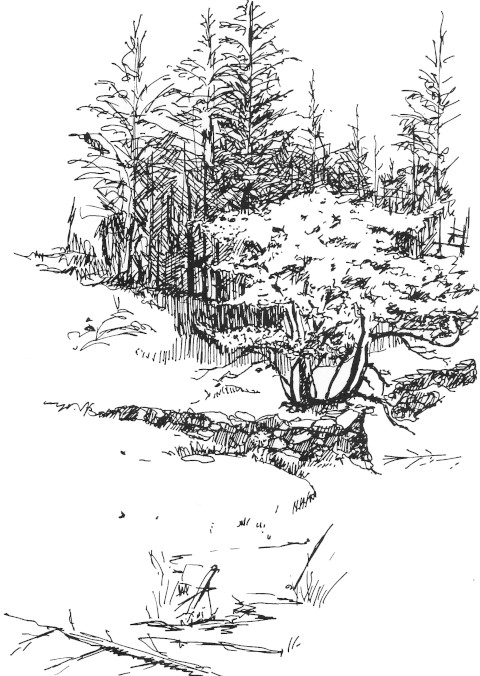
When we first came down this way,
To a bright and cheerful guest house
Nestled in Combe Martin Bay.
Soon we had a motor caravan,
And then set ourselves a goal
To find the perfect site to stay on -
That's how we met 'Mr. Mole'!
Through the seasons we'd keep coming
For a total hard to tally,
But each time just fell more in love
With the village tucked in Sterridge Valley.
Work colleagues thought we were quite odd
Whenever we took holiday.
"What a surprise, they've gone off again
To that village in Devon," they'd say.
Yet who can resist such scenery,
With its air of tranquillity?
For us, it's our own little sanctuary
Hidden from all the stress of the city.
Its people are so warm and friendly
Whenever through the village we'd roam,
So we soon bought a neat static van,
And Berrynarbor became our second home.
But the stresses and strains of the city
Made our holidays become even worse:
Each arrival here was such a blessing,
Each return home became a real curse.
But now we've made our dreams come true,
As we begin our new life here in Devon,
At first in our van on the Park,
Up the Valley that we call our heaven!
Stephen McCarthy
Berrynarbor Park
This poem is self explanatory. Stephen and Dean Hawker, after nine years holidaying here, have now moved down from Brighton and are buying a home in Ilfracombe. They are both involved in 'Care' work. Welcome and good luck!
29
THE GLORY OF THE GARDEN
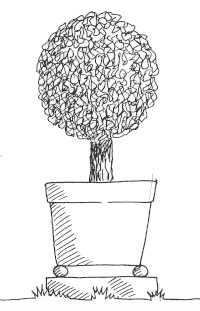

Of borders, beds and shrubberies and lawns and avenues,
With statues on the terraces and peacocks strutting by;
But the glory of the garden lies in more than meets the eye.
For where the old thick laurels grow along the thin red wall
You find the tool and potting-sheds which are the heart of all
The cold-frames and the hot-houses, the dung pits and the tanks
The rollers, cans and drain-pipes, with the barrows and the planks.
And there you'll see the gardeners, the men and 'prentice boys
Told off to do as they are bid, and do it without noise;
For, except when seeds are planted and we shout to scare the birds,
The glory of the garden it abideth not in words.
And some can pot begonias and some can bud a rose,
And some are hardly fit to trust with anything that grows,
And they can roll and trim the lawns and sift the sand and loam,
For the glory of the garden occupies all who come.
Our England is a garden, and such gardens are not made
By singing: "Oh, how beautiful" and sitting in the shade
While better men than we go out and start their working lives
At grubbing weeds from gravel paths with broken dinner knives.
There's not a pair of legs so thin, there's not a head so thick,
There's not a hand so weak and white, nor yet a heart so sick,
But it can find some needful job that's crying to be done,
For the glory of the garden glorifieth everyone.


If it's only netting strawberries or killing slugs in borders;
And when your back stops aching and your hands begin to harden,
You will find yourself a partner in the glory of the garden.
Oh, Adam was a gardener and God who made him sees
That half a proper gardener's work is done upon his knees,
And when your work is finished you can wash your hands and pray,
For the Glory of the Garden, that it may not pass away!
And the Glory of the Garden it shall never pass away!

Rudyard Kipling
Illustrated by: Paul Swailes
24
Otter
High and dry
Over the pebbles
See me hobble.
My water-bag wobbles
Until I spill
At the river sill
And flow away thin
As an empty skin
That dribbles bubbles
Then I jut up my mutt,
All spikey with wet.
My moustaches bristle
As I mutter, or whistle:
"Now what's the matter?"
[For this is my song.
Not very long.
There might be a better
Some wetter, wittier
Otter could utter.]
39
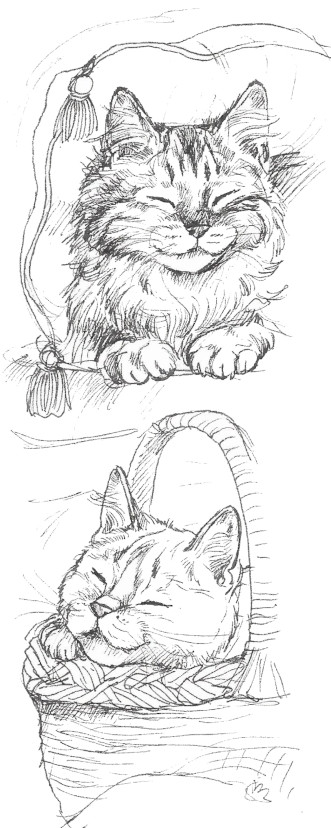
CATS
Cats sleep Anywhere,
Any table,
Any chair,
Top of piano,
Window-ledge,
In the middle,
On the edge,
Open drawer,
Empty shoe,
Anybody's Lap will do,
Fitted in a Cardboard box,
In the cupboard -
With your frocks
Anywhere!
They don't care!
Cats sleep Anywhere.
Eleanor Farjeon
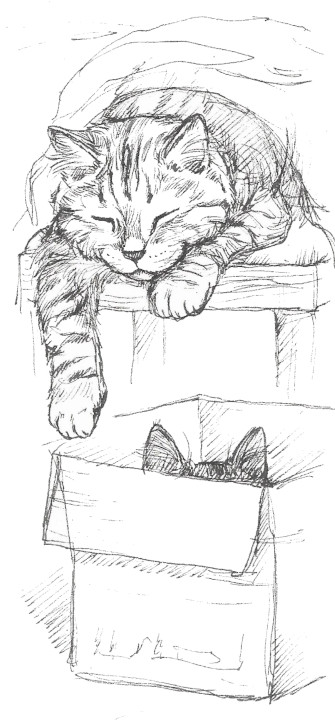
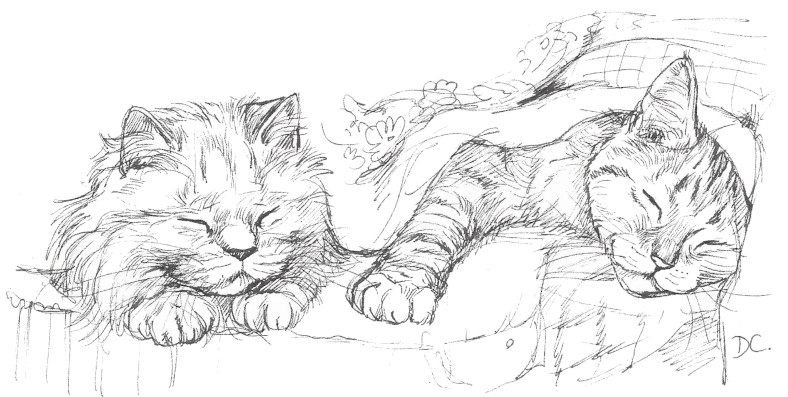
Illustrated by: Debbie Rigler Cook
31
EMILY JANE BRONTE [1818-1848]
First published in 1846, a selection of Emily Bronte's poems attracted little attention. Her haunting saga set in Yorkshire, 'Wuthering Heights', was published a year later under her pseudonym of Ellis Bell. It was only after her death, from tuberculosis - like her other sisters and brothers - that the book became accepted as one of the most important novels of the 19th Century. Her poetry, too, is now considered amongst the most significant of the period. Best known are 'The Night is Darkening Around Me' and 'No Coward Soul is Mine'.
No coward soul is
mine,
No trembler in the
world's storm-troubled sphere:
I see heaven 's
glories shine,
And faith shines
equal, arming me from fear.
Certainly she was 'no coward soul' and it is reported that in the latter stages of her illness, inspite of extreme pain, she refused all drugs and medical attention. She died in December 1848 having achieved no fame in her lifetime, but her powerful writing continues to fascinate readers and critics today.
The following short poem is of a less disturbing and melancholy nature:
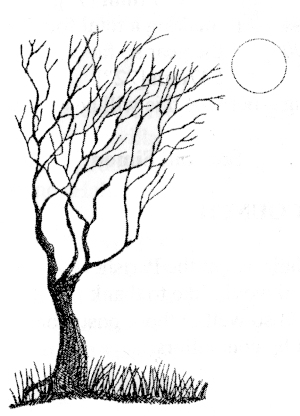
Moonlight, Summer Moonlight
'Tis moonlight,
summer moonlight,
All soft and still
and fair;
The silent time of
midnight
Shines sweetly
everywhere,
But most where trees
are sending
Their breezy boughs
on high,
Or stooping low are
lending
A shelter from the sky.
Illustrations by: Paul Swailes
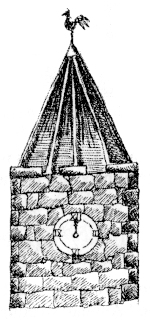
14
NEW SHOES
They're shiny, creaky shoes,
I wish I had my leaky shoes
That my mother threw away.
I liked my old brown leaky shoes
Much better than these creaky shoes,
These shiny, creaky, squeaky shoes
I've got to wear today.
Anon.
27
TIGER
High in the trees birds chatter away.
On the ground there are animals of various types,
Including a big cat with black and orange stripes.
He is a hunter with an appetite for flesh,
He must eat today and it needs to be fresh.
The carnivorous machine doesn't stand tall,
But low on the ground and ready to maul.
A single zebra strays from the herd's protection,
This lonely beast would make a tasty selection.
The hunter's smell tells him lunch is nearing,
His prey stands vulnerable in a clearing.
The hunter moves slowly, prowling and steady,
His lightning fast reflexes are always ready.
His tense body is like a coiled spring,
The element of surprise is everything.
He seizes the moment and charges out,
The jungle animals begin to shout.

His only chance to return to the herd.
The smell of fear sets the hunter's heart pounding,
And his muscular legs make his speed astounding.
With a well timed leap and hardly a sound,
His powerful claws bring the beast to the ground.
Vice like jaws clamp around the throat,
His hairs stand proud on his camouflaged coat.
Lacerating, flesh ripping, blood flowing ever warmer,
Death is waiting just around the corner.
With a victorious roar that could awaken the dead,
His once white stalactites are bloodstained red.
As others look on he guards his kill,
Stuffing himself 'til he's had his fill.
Eager vultures circle high, waiting for their turn,
As the midday sun begins to burn.
Mouth gaping wide, he gives a contented yawn,
Under a shady tree he sleeps until dawn.
James Marangone [13]
This poem has been written by James, our eldest grandson, for a competition for a Poem by children from all the schools in their area for children between 13 and 15 years of age, to be published in a Children's Book of Poems. James's poem was chosen out of all the school to be sent for publishing.
James and Dominic are the sons of Andrew and Christine and they live in Warlingham, Surrey. You will see Andrew's name in the credits of all the Michael Barrymore shows as he is the Editor. He is currently working on the shows 'Kids Say the Funniest Things' due to be broadcast in the summer.
June and Gerry
17
HOME THOUGHTS FROM ABROAD
Oh, to be in England
Now that April's there,
And whoever wakes in England
Sees, some morning, unaware,
That the lowest boughs and the brushwood sheaf
Round the elm-tree bole are in tiny leaf,
While the chaffinch sings on the orchard bough
In England now!
And after April, when May follows,
And the whitethroat builds, and all the swallows!
Hark, where my blossomed pear-tree in the hedge
Leans to the field and scatters on the clover
Blossoms and dewdrops - at the bent spray's edge -
That's the wise thrush; he sings each song twice over,
Lest you should think he never could recapture
The first fine careless rapture!
And though the fields look rough with hoary dew,
All will be gay when noontide wakes anew
The buttercups, the little children's dower
Far brighter than this gaudy melon-flower!
Robert Browning [1812-1889]

Illustrated by: Paul Swailes
8
HERE IS THE FEATHER WARCAST
In the South it will
be a dowdy clay
with some shattered
scours.
Further North
there'll be some hoe and snail
with whales to the
Guest.
In the East the
roaring pain
will give way to some
psalmy bun.
Trevor Millum
18
THE DAY AFTER THE DAY AFTER BOXING DAY
Santa wakes up, eventually,
puts away his big red suit and wellies,
lets Rudolph and the gang out into the meadow
then shaves his head and beard.
He puts on his new cool sunglasses,
baggy blue Bermuda shorts [he's sick of red],
yellow stripy T-shirt that doesn't quite cover his belly
and lets his toes breathe in flip-flops.
Packing a bucket and spade,
fifteen tubes of Factor Twenty suncream
and seventeen romantic novels
he fills his Walkman with the latest sounds,
is glad to use a proper suitcase instead of the old sack
and heads off into the Mediterranean sunrise
enjoying the comforts of a Boeing 747
[although he passes on the free drinks].
Six months later,
relaxed, red and a little more stubbly,
he looks at his watch, adjusts his wide-brimmed sunhat,
mops the sweat from his brow and strokes his chin,
wondering why holidays always seem to go so quickly.
Paul Cookson

Illustrated by: Nigel Mason
14
CHRISTMAS MORNING
Or this were very long ago,
There wouldn't be a winter time
Nor any cold or snow.
I'd run out through the garden gate,
And down along the pasture walk;
And off beside the cattle barns
I'd hear a kind of gentle talk.
I'd move the heavy iron chain
And pull away the wooden pin;
I'd push the door a little bit
And tiptoe very softly in.
The pigeons and the yellow hens
And all the cows would stand away;
Their eyes would open wide to see
A lady in the manger hay.
If this were very long ago
And Bethlehem were here to-day.
I mean the lady would - and she
Would take the woolly blankets off
Her little boy so I could see.
His shut-up eyes would be asleep,
And he would look like our John,
And he would be all crumpled too,
And have a pinkish colour on.
I'd watch his breath go in and out.
His little clothes would all be white.
I'd slip my finger in his hand
To feel how he could hold it tight.
And she would smile and say, 'Take care',
The mother, Mary, would, 'Take care';
And I would kiss his little hand
And touch his hair.
While Mary put the blankets back
The gentle talk would soon begin.
And when I'd tiptoe softly out
I'd meet the wise men going in.
Elizabeth Madox Roberts
[1881-1941]
46
JOURNEY OF THE MAGI
Thomas Stearns Eliot 1888-1965
Just the worst time of the year
For a journey, and such a long journey:
The ways deep and the weather sharp,
The very dead of winter."
And the camels galled, sore-footed, refractory,
Lying down in the melting snow.
There were times we regretted
The summer palaces on slopes, the terraces,
And the silken girls bringing sherbet.
Then the camel men cursing and grumbling
And running away, and wanting their liquor and women,
And the night-fires going out, and the lack of shelters,
And the cities hostile and the towns unfriendly
And the villages dirty and charging high prices:
A hard time we had of it.
At the end we preferred to travel all night,
Sleeping in snatches,
With the voices singing in our ears, saying
That this was all folly.
Wet, below the snow line, smelling of vegetation,
With a running stream and a water-mill beating the darkness,
And three trees on the low sky.
And an old white horse galloped away in the meadow.
Then we came to a tavern with vine-leaves over the lintel,
Six hands at an open door dicing for pieces of silver,
And feet kicking the empty wine-skins.
But there was no information, and so we continued
And arrived at evening, not a moment too soon
Finding the place; it was [you may say] satisfactory.
All this was a long time ago, I remember.
And I would do it again, but set down
This set down
This: were we led all that way for
Birth or Death? There was a Birth, certainly,
We had evidence and no doubt. I had seen birth and death,
But had thought they were different; this Birth was
Hard and bitter agony for us, like Death, our death.
We returned to our places, these Kingdoms,
But no longer at ease here, in the old dispensation,
With an alien people clutching their gods.
I should be glad of another death.
This is the first of five 'Ariel Poems' that Thomas Stearns Eliot wrote after becoming an Anglo-Catholic in 1927. It is spoken by one of the Wise Men. The first five lines are quoted from a Jacobean sermon by Bishop Lancelot Andrewes [1555-1626], a preacher much admired by Eliot.
40
AVON
He died at fourteen
and, over the years, had been
our baby, our companion, our friend.
He gave us his love,
but from cupboard or heart
we'll never know -
For he was only a dog, and didn't speak much.
But his eyes and his ears and his tail
always welcomed our touch.
And we'll miss him -
For Ever.
7
AUTUMN
The following poems, entitled Autumn, were written by children from the Primary School for National Poetry Day in October.
The smell of bonfires drift in the air.
People start to wear warmer clothes.
Leaves turn to colours like yellow and crimson.
You start to see squirrels biting on hard nuts.
Children play with helicopter seeds
and conkers are seen more on strings.
Autumn slowly sinks in.
The weather grows colder.
Children kick leaves home.
Mischa Smith - Year 4
leaves come off the trees.
Smell of bonfires.
People burning leaves.
Contractors stop foraging and start hedge trimming.
Crispy leaves
It rains more.
More puddles.
Adam Friend - Year 4

Illustrated by: Paul Swailes
Family Group Poem
Standing In the Playground
Stream gushing, over waterfalls like steps,
Birdsong comes sweetly from the trees,
Leaves rustle, dancing in the breeze
Dog bark in the distance
Children standing to attention
Teacher's Orders!
Under the sky,
Church, trees, houses, people
spin slowly by.
Scent of wet earth,
paper towels,
Dust.
The smells in the Autumn air.
Family Group is a mixture of children of all age groups
5
THE SERPENT
Theodore Roethke [1908-1963]
There was. There was.
He simply gave up Serpenting.
Because. Because.
He didn't like his Kind of Life;
He couldn't find a proper Wife;
He was a Serpent with a soul;
He got no Pleasure down his Hole.
And so, of course, he had to Sing,
And Sing he did, like Anything!
The Birds, they were Astounded;
And various Measures Propounded
To stop the Serpent's Awful Racket:
They bought a Drum. He wouldn't Whack it.
They sent, - you always send, - to Cuba
[ And got a Most Commodious Tuba;
They got a Horn, they got a Flute,
But Nothing would suit.
He said, 'Look Birds, all this is futile:
I do not like to Bang or Tootle.'
And then he cut loose with a Horrible Note
That practically split the Top of his Throat.
'You see,' he said, with a Serpent's Leer,
'I'm Serious about my Singing Career!'
And the Woods Resounded with many a Shriek
As the Birds flew off to the End of Next Week.


Illustrations by: Paul Swailes
42
MUSHROOMS
Whitely, discreetly,
Very quietly
Our toes, our noses
Take hold on the loam,
Acquire the air.
Nobody sees us,
Stops us, betrays us;
The small grains make room.
Soft fists insist on
Heaving the needles,
The leafy bedding,
Even the paving.
Our hammers, our rams,
Earless and eyeless.
Perfectly voiceless,
Widen the crannies,
Should through holes. We
On the crumbs of shadow,
Bland-mannered, asking
Little or nothing.
So many of us!
So many of us!
We are shelves, we are
Tables, we are meek,
We are edible,
Nudgers and shovers
In spite of ourselves.
Our kind multiplies:
We shall by morning
Inherit the earth.
Our foot's in the door.
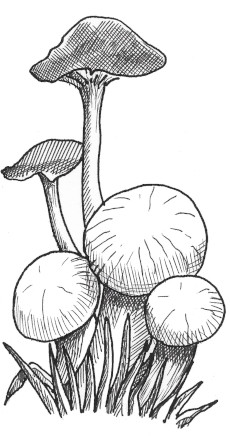
Sylvia Plath [1932-1963]
Born in Boston, U.S.A., Sylvia Plath later moved to England where she married the late Poet Laureate, Ted Hughes in 1956. Following her separation from Hughes in 1962, she sadly committed suicide in London the following year. She published only two volumes of poetry in her lifetime, but three followed subsequently. Her novel, The Bell Jar, written under the pen-name Victoria Lewis, was published in 1963.
Illustrated by: Paul Swailes
30
OUR HOLIDAY
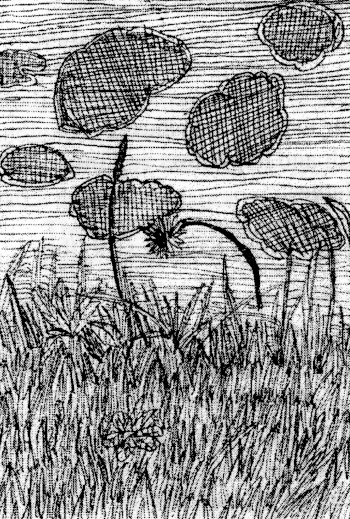
Jamie Ross [Age 10]
We came to Berrynarbor
In August '99.
We stayed at Hillcrest Cottage
And that was very fine.
The journey from London went very well
Until grandad's car, whilst climbing a hill
All of a sudden became quite ill
It lost all of its oil you see!
So we phoned our Graham and down he came
To take us back from whence we came.
He towed us to the car park
At the back of Hillcrest Cottage.
We telephoned the RAC and said
'Please send us a car
So that we can enjoy our holiday,
Without one we can't go far.'
So the car was delivered
And we continued our holiday.
We really have had a wonderful time
And as I said before the cottage was fine,
And hopefully we can return quite soon
But not in nineteen ninety-nine!
Harry Dryden - Ruislip, Middlesex
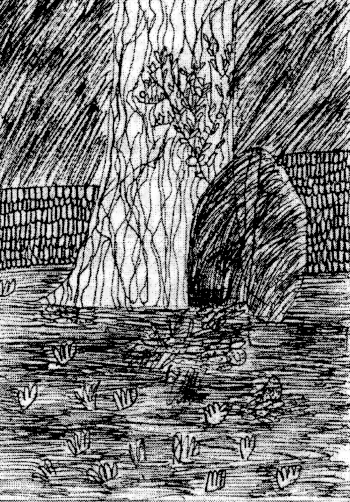
Luke Dunham [Age 10]
13
LEAVE ONLY FOOTPRINTS
Air so clean, gentle horses sit sea of grey.
Chasing the waves on the clean soft sand;
I walk with my dog her leash in my hand;
As she runs and chases the ebbing tide
'Tis only her pawprints the sea will hide.
The whispering sand says "Thank you please stay"
You leave only your footprints when you walk away.
Soon the warm weather will change that serene scene,
The next few months the shores will never be clean.
Cars and coaches will bring tourists and trippers
Heading for our beaches to mark out their pitches.
Bottles, sandwiches, cans, oil, to name but a few,
These items they'll bring on the sand they will strew.
Litter-bins empty - too far to go - after buying their ice-cream
The wrappers they'll throw onto the sand once soft and clean;
Or into the sea hoping never to be seen.
The sun's going down, but the sunset is grey,
The tourists and trippers have gone for today.
My heart is saddened by the troubled tide
I stand and look, dog on leash by my side.
Frothy and littered it struggles to clean
The debris left where the sunworshippers had been.
As I turn around to walk away;
The whispering sands cry out and say -
"Please tell these people when they leave each day
LEAVE ONLY THEIR FOOTPRINTS TO WASH AWAY."

Ann Moseley - Poole
Illustrated by: Peter Rothwell
43
MEASLES IN THE ARK

The measles broke out in the Ark;
Little Japheth, and Shem, and all the young Hams,
Were screaming at once for potatoes and clams.
And 'What shall I do,' said poor Mrs. Noah,
'All alone by myself in this terrible shower?
I know what I'll do: I'll step down in the hold,
And wake up a lioness grim and old,
And tie her close to the children's door,
And give her a ginger cake to roar
At the top of her voice for an hour or more;
And I'll tell the children to cease their din,
Or I'll let that grim old party in.
To stop their squeazles and likewise their measles.'
She practised this with the greatest success:
She was everyone's grandmother, I guess.
Susan Coolidge
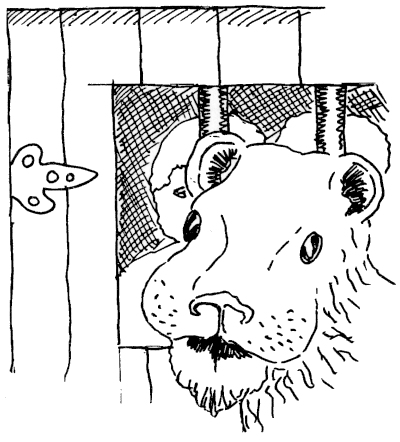
Illustrated by: Paul Swailes
35
Glorious Devon
May envy the likes of we,
For the flow'r of the West, the first, the best,
The pick o' the bunch us be;
Squab pie, junket and cyder brew,
Richest of cream from the cow,
What'd Old England without 'em do?
And where 'ud 'un be to now?
As crumpy as a lump of lead
Be a loaf without good leaven,
And the yeast Mother England do use for her bread
Be Devon,
Be Devon, glorious Devon.
Harold Boulton
30
MOTH
John Mole [1941-]
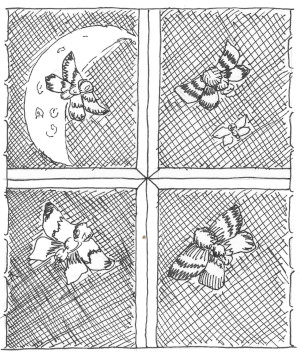
Frail and motionless against the night;
A baffled spectre framed by blackness.
Little moonflake, prisoner of glass.
This is my journey's end, receive me.
Brilliant keeper, rise and let me in.
Then later, when from a drawer perhaps
You take my body, wasted, brittle
As a shred of antique parchment, hold it
Gently up to the light I loved
But which bewildered me, until
I fly away again, a ghostly powder
Blown or shaken from your hand.
Illustration by: Paul Swailes
14
END OF TERM
Bad Report - Good
Manners
This school report is bad.'
I said, 'I did my best I did,
My dad my dad my dad.'
'Why bottom of the class?'
'I stood aside, my dad my dad,
To let the others pass.'
Spike Milligan
11
ADLESTROP
Edward Thomas
[1878-1917]
The name, because one afternoon
Of heat the express-train drew up there
Unwontedly. It was late June.
The steam hissed. Someone cleared his throat.
No one left and no one came
On the bare platform. What I saw
Was Adlestrop - only the name
And meadowsweet, and haycocks dry
No whit less still and lonely fair
Than the high cloudlets in the sky.
And for that minute a blackbird sang
Close by, and round him, mistier,
Farther and farther, all the birds
Of Oxfordshire and Gloustershire.
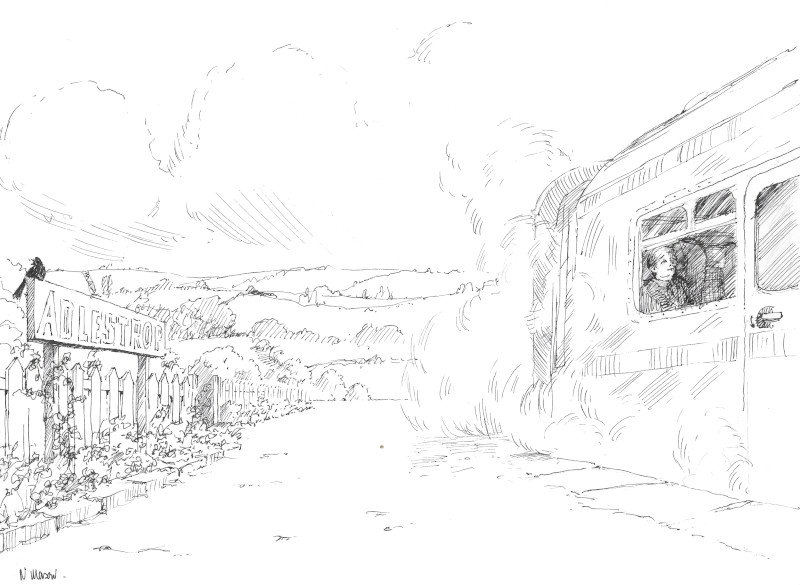
Illustrated by: Nigel Mason
36
HUMPTY DUMPTY
Michael Rosen and
Susanna Steele
[written using only
names from the telephone directory]
Sato Nawol
Huntly Dumke
Hudd Agate Fall
Alder King soss
Isan Dorley Kinsman
Coode Dant Pot
Humphrey Duhig Adda Arr Gaine
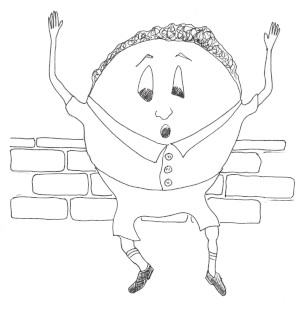
Illustration by: Paul Swailes
30
Heddon's Mouth
The bright gorge, that lies below
Trentishoe and Martinhoe.
Down the vale swift Parracombe
Brawls beneath soft alder gloom,
Toward a sea of sunlit sails,
Flashing far away to Wales.
Lionel Johnson
26
A PERFECT SUMMER'S DAY
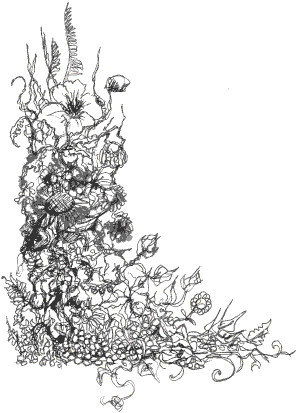
What makes the day sublime?
From dawn to dusk, the magic's there,
There is no special time.
A hazy sunshine greets the day
With bird song clear and true;
Then slowly lifts the morning mist
And shows a sky so blue.
The sun beats down at noon of day,
Reflecting everywhere;
Encompassing the atmosphere
With light beyond compare.
Flowers lift their eager heads
To capture warmth and light;
Children frolic at their play
With laughter sweet and bright.
Her sweet breath gentle now,
Tempering the heat of day
And cooling fevered brow.
The summer evening lingers on,
Reluctantly it fades;
The sky is tinted brightly now
With a galaxy of shades.
From apricot to amber,
From bronze to fiery red,
They streak the far horizon
As the sun goes to her bed.
What makes a perfect summer's day?
What makes the day sublime?
The process is in God's good hands,
From start to end of time.
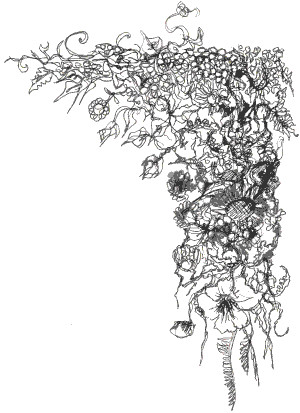
Bettina Brown - Combe Martin
Illustrated by: Paul Swailes
13
LITTLE BROWN BROTHER
The following poem has been sent in by a 'caring' reader. It was told to her by one of her ladies, now around 88 years young, who had learnt it at school.
Oh! Little brown brother,
Are you awake in the dark?
Here we lie cosily
Close to each other,
Hark to the song of the lark.
Little brown brother,
Oh! Little brown brother,
What kind of flower will you be?
I'll be a poppy
All bright like my mother,
Do be a poppy like me.
What! You're a sunflower!
How I shall miss you
When you have grown golden and high
But I will send all the bees
Up to kiss you,
Little brown brother, 'Goodbye'.
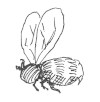
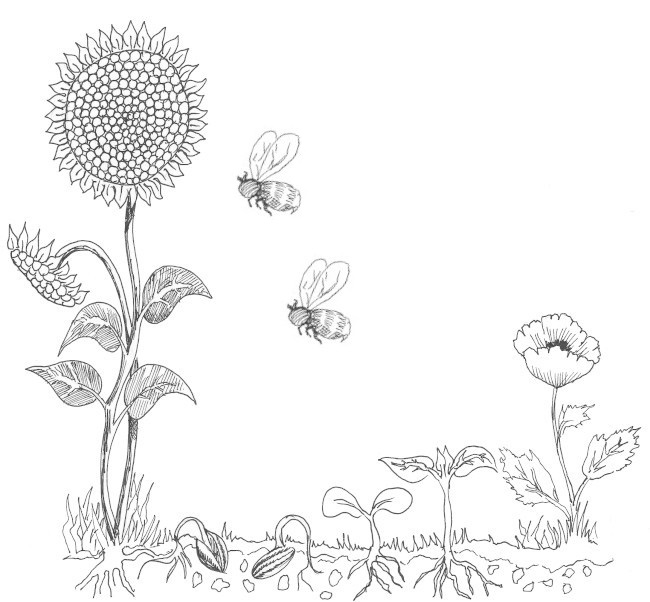
Illustrated by: Paul Swailes
30
CLEARING AT DAWN
The colours of Spring teem on every side.
With leaping fish the blue pond is full;
With singing thrushes the green boughs droop.
The flowers of the field have dabbled their powdered cheeks;
The mountain grasses are bent level at the waist.
By the bamboo stream the last fragment of cloud
Blown by the wind slowly scatters away.
From the Chinese,
by LIPO
[Translated by Arthur
Waley]
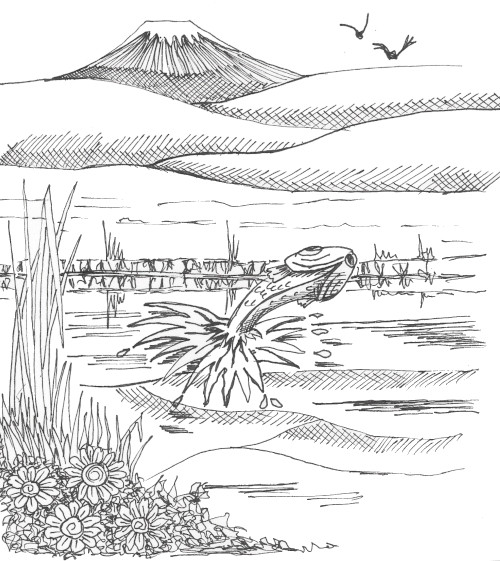
Illustrated by: Paul Swailes
13
FURRY BEAR
A.A. Milne
And a big bear too,
I shouldn't much care
If it froze or snew;
I wouldn't much mind
If it snowed or frizz -
I'd be all fur-lined
With a coat like his!
And brown fur knickers and a big fur cap.
I'd have a fur muffle-ruff to cover my jaws,
And brown fur mitten on my big brown paws.
With a big brown furry-down up on my head
I'd sleep all winter in a big fur bed.


8
BAKED WORDS
Ann Moseley [Billett] - Poole
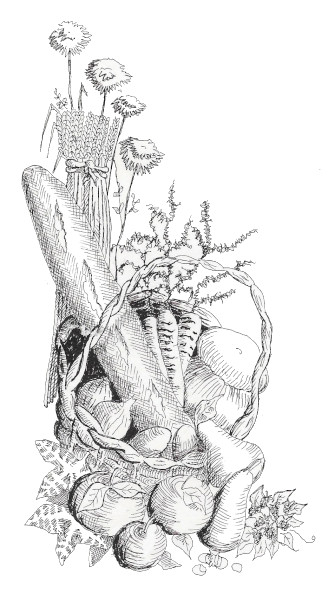
Square, round, cottage, tin,
Crusty, toasted, sliced and fried,
Doorsteps cut with cheese inside.
Newly baked, fresh and hot,
Buttered thick, jam on top.
Bran, wholemeal, granary, wheat,
Sliced, crumbed, savoury, sweet.
Sandwiches all shapes and sizes,
Hot toasties oozing surprises.
Baps, rolls, buns and stick,
Buttered thin, buttered thick.
Crusts off, crusts on,
Curls in hair, not straight and long.
He had it white for his supper.
Fresh or stale, it's a winner,
Morsels with wine, not for a sinner.
All work it for a livelihood
On the poverty line - not so good.
Hospitality in a letter
Saying 'thank you' so much better.
Buttered, what side is it on?
Never know till it's gone.
It is the Staff of Life, we're told
Rich, poor, young and old.
Where to find this precious thing?
Look inside, it's in your bin!
41
AT MIDDLE GATE IN FEBRUARY
Thomas Hardy
As they gather themselves from the fog
Like silver buttons ranged in a row,
And as evenly spaced as if measured, although
They fall at the feeblest jog.
They load the leafless hedge hard by,
And the blades of last year's grass,
While the fallow ploughland turned up nigh
In raw rolls, clammy and clogging lie -
Too clogging for feet to pass.
How dry it was on a far-back day
When straws hung the hedge and around,
When amid the sheaves in amorous play
In curtained bonnets and light array
Bloomed a bevy now underground!

Illustration by: Nigel Mason
26
CHRISTMAS THANK YOU'S
Mick Gowar
Illustrated by: Paul Swailes
Dear Auntie
Oh, what a nice jumper I've always adored powder blue and fancy thinking of orange and pink for the stripes how clever of you!

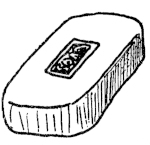
Dear Uncle
The Soap is terrific - so useful and such a kind thought and how did you guess that I'd just used the last of the soap that last Christmas brought.
Dear Gran
Many thanks for the hankies. Now I really can't wait for the 'flu and the daisies embroidered in red round the 'M' for Michael how thoughtful of you!
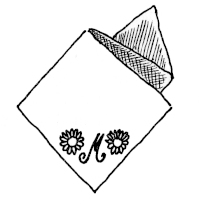
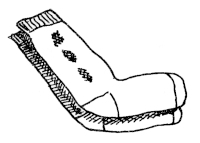
Dear Cousin
What socks! And the same sort you wear so you must be the last word in style and I'm certain you're right that the luminous green will make me stand out a mile.
Dear Sister
I quite understand your concern - it's a risk sending jam in the post But I think I've pulled out all the big bits of glass so it won't taste too sharp spread on toast.
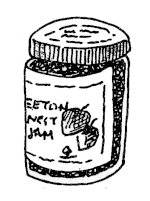
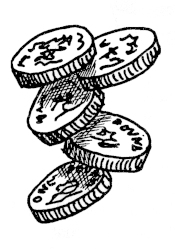
Dear Grandad
Don't fret, I'm delighted. So don 't think your gift will offend. I'm not at all hurt that you gave up this year and just sent me a fiver to spend.
4
WHITE FIELDS
In the winter time we goWalking in the fields of snow;
Where there is no grass at all;
Where the top of every wall,
Every fence and every tree
Is as white as white can be.
Pointing out the way we came -
Every one of them the same -
All across the fields there be
Prints in silver filigree;
And our mothers always know
By the footprints in the snow,
Where it is the children go.
James Stephens
ONE SHEPHERD
And one shepherd, full of himself,Did not go.
He remained in the field,
Feeling the black winter
[As bitter and cold as his thoughts;
While the other shepherds
Were humbled by the warmth,
Like sunlight,
Surrounding the world's child.
Peter Thabit-Jones
SHEEP IN WINTER
The sheep get up and make their many tracksAnd bear a load of snow upon their backs,
And gnaw the frozen turnip to the ground
With sharp quick bite, and then go nosing round
The boy that pecks the turnips all the day
And knocks his hands to keep the cold away
And laps his legs in straw to keep them warm
And hides behind the hedges from the storm.
The sheep, as tame as dogs, go where he goes
And try to shake their fleeces. from the snows,
Then leave their frozen meal and wander round
The stubble stack that stands beside the ground
And lie all night and face the drizzling storm
And shun the hovel where they might be warm.
John Clare

Illustrated by: Nigel Mason
37
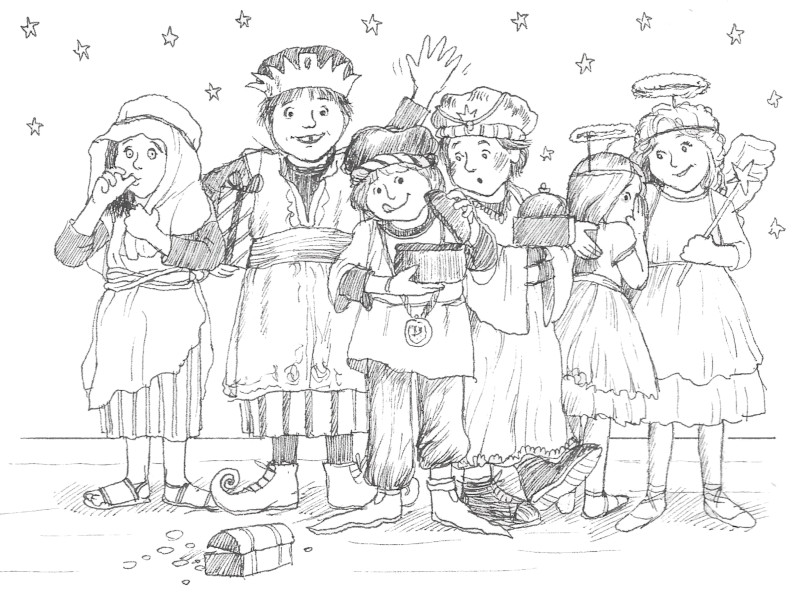
OUR NATIVITY PLAY
Eric Finney
In front of our mums in the hall.
Though it wasn't quite perfect, our teacher Miss May
Said the slip-ups weren't noticed at all.
It's a pity the innkeeper's wife was away
With pains in her head and her tum;
Sally Ann took her part and forgot what to say -
She stood there just sucking her thumb.
Still, it wasn't too bad our Nativity Show:
Our mums seemed to like it a lot
When a King dropped his casket on Joseph's big toe,
And he called him a clumsy great clot!
All the angels were great; in the whitest attire
They came on in a great ghostly group,
But Sandra's right wing fluttered clean off its wire
And her other wing started to droop.
His costume was tight 'cos he's fat,
So he cut a great slit in his mum's stripy towel -
I bet he'll get walloped for that.
All the audience clapped our Nativity play;
I don't know what that kid in the choir meant
When he said that he thought that our teacher Miss May
Ought to think about early retirement.
Well, there were a few slip-ups perhaps on the day,
But they just didn't matter at all
When Mary sang Jesus to sleep in the hay
And we all gathered round in the stall.
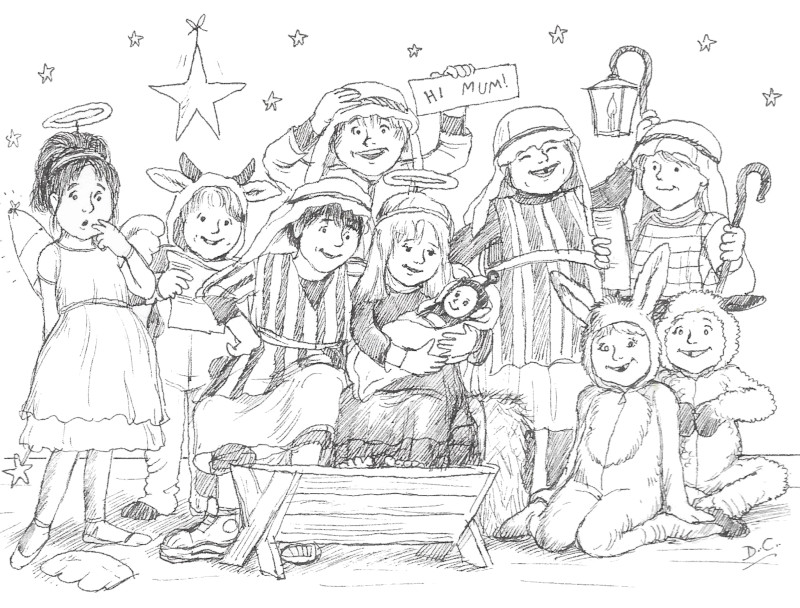
Illustrations by: Debbie Cook
31
KATE'S POETRY
The following poems written by Kate, a 45-year old who suffers from autism, appeared recently in the Daily Telegraph. Margaret Andrews found they 'spoke' to her and she would like to share them with us.
-
I put out my hand
but your hand avoids
my hand.
I cannot get
close
to kiss you.
I open my mouth
to say
I love you,
but your mouth
is closed;
to me.
Silent silence
Between us.
Did it end
when I was not looking?
I got it;
my disability;
not never to walk from it.
it shares my space,
breathes the same air.
I cannot have a day off.
It refuses to conform.
It's better when content;
goes on feelings not priorities;
keeps me up at night;
gives stressful conditions.
I keep in a compayable mode;
it rewards me in coming of its own;
it's excitable, moves faster than thought;
gives strong, unexplained ideas
which do working connections to other connections;
drives me mad and to despair on occasion.
it tests me to its limits.
One of Kate's poems was cited as the concluding summary of her mental state:
I lost the me
It got under everything
That was not poems.
10
TED HUGHES, OBE, OM, 1930-1998
Created Poet Laureate 1984
Though all the beasts
Hang their heads from horizontal backbones
And study the earth
Beneath their feet, Prometheus
Upended man into the vertical-
So to comprehend balance.
Then tipped up his chin
So to widen his outlook on heaven.
From Tales of OvidWhitbread Poetry Award 1997

Illustrated by: Paul Swailes
5
AN AUTUMN MORNING
John Clare
Throws o'er the fields her many-coloured light,
Wood wildly touched, close tanned and stubbles dun,
A motley paradise for earth's delight;
Clouds ripple as the darkness breaks to light,
And clover plots are hid with silver mist,
One shower of cobwebs o'er the surface spread;
And threads of silk in strange disorder twist
Round every leaf and blossom's bottly head;
Hares in the drowning herbage scarcely steal
But on the battered pathway squats abed
And by the cart-rut nips her morning meal.
Look where we may the scene is strange and new,
And every object wears a changing hue.
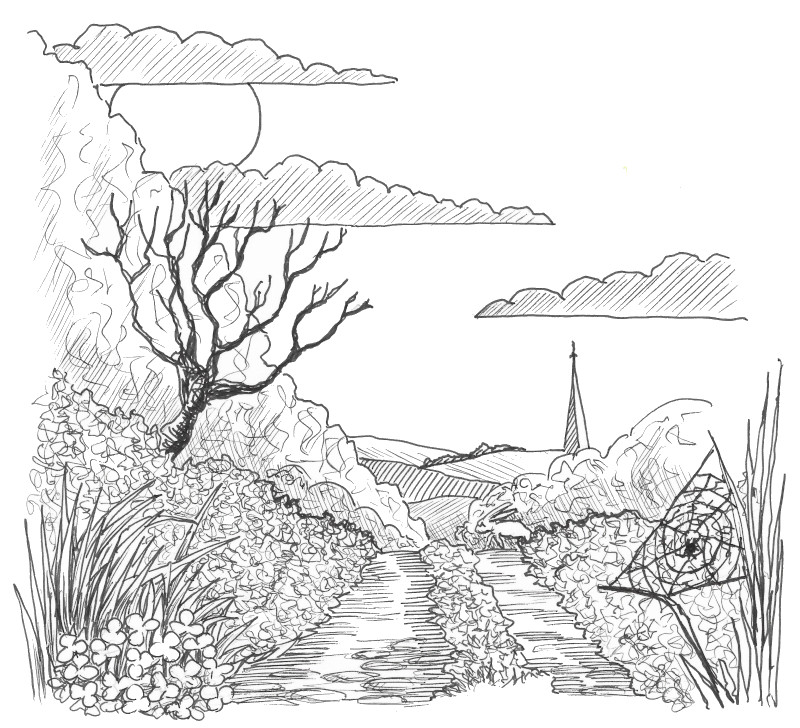
Illustration by: Paul Swailes
25
THOUGHTS IN A GARDEN
Andrew Marvell [1621-1678]
Ripe apples drop about my head;
The luscious clusters of the vine
Upon my mouth do crush their wine;
The nectarine and curious peach
Into my hands themselves do reach;
Stumbling on melons, as I pass,
Ensnared with flowers, I fall on grass.
Meanwhile the mind from pleasure less
Withdraws into its happiness;
The mind, that Ocean where each kind
Does straight its own resemblance find;
Yet it creates, transcending these,
Far other worlds, and other seas;
Annihilating all that's made
To a green thought in a green shade.
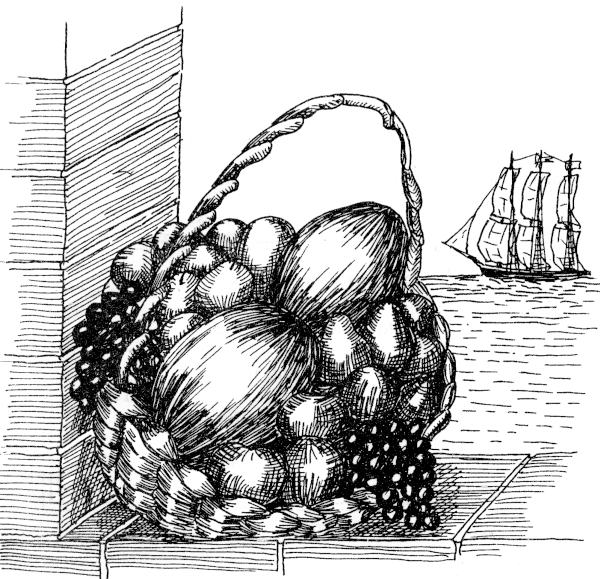
Illustration by: Paul Swailes
14
POEM FOR THE DAY -
22nd AUGUST
One Perfect Rose
All tenderly his messenger he chose;
Deep-hearted, pure, with scented dew still wet-
One perfect rose.
I knew the language of the floweret;
'My fragile leaves', it said, 'his heart enclose'.
Love long has taken for his amulet
One perfect rose.
Why is it no one ever sent me yet
One perfect limousine, do you suppose?
Ah no, it's always just my luck to get
One perfect rose.

Dorothy Parker
[August 22nd 1893 - 7th June 1967]
Dorothy Parker was born in New Jersey. Of her poetic influences, she once remarked: "I was following in the exquisite footsteps of Miss Edna St. Vincent Millay, unhappily in my own horrible sneakers." Renowned for the acerbity with which she commented on the vanity and foolishness of others, she could turn her wit on herself almost as easily.
At her 70th birthday party she remarked: "If I had any decency, I'd be dead. Most of my friends are."
21
THE ICE CART
I watched with envy while a cool
And lucky carter handled ice ...
And I was wandering in a trice
Far from the grey and grimy heat
Of that intolerable street
O'er sapphire berg and emerald floe
Beneath the still cold ruby glow
Of everlasting Polar night,
Bewildered by the queer half-light,
Until I stumbled unawares
Upon a creek where big white bears
Plunged headlong down with flourished heels
And floundered after shining seals
Through shivering seas of blinding blue.
And, as I watched them, ere I knew
I'd stripped and I was swimming too
Among the seal-pack, young and hale,
And thrusting on with threshing tail,
With twist and twirl and sudden leap
Diving and doubling with my kind,
Until, at last, we left behind
Those big white, blundering bulks of death,
And lay, at length, with panting breath
Upon a far untravelled floe,
Beneath a gentle drift of snow -
Snow drifting gently, fine and white,
Out of the endless Polar night,
Falling and falling evermore
Upon that far untravelled shore,
Till I was buried fathoms deep
Beneath that cold, white drifting sleep
Sleep drifting deep,
Deep drifting sleep
The carter cracked a sudden whip:
I clutched my stool with startled grip,
Awakening to the grimy heat
Of that intolerable street.
Wilfred Wilson Gibson

Illustrated by: Nigel Mason
What a pity that our summer, so far, is not one when we have been wishing to feel cooler!
However, Nigel 's illustration of The Ice Cart is yet another fine example of his creative talent. Many readers will be aware that following an accident, which has laid him up for many months, Nigel is unable to continue working as a decorator and is now looking to use his artistic ability in a career move.
If you need anything - brochure, poster, book, letter heading, anything - illustrated [or just a picture for your own satisfaction], please give Nigel a ring on 882021. He would be delighted to hear from you and to help in any way he can.
Thanks, Nigel, for enhancing our Newsletters and we wish you every success in your new quest.
9
THE LISTENERS
Knocking on the moonlit door;
And his horse in the silence champed the grasses
Of the forest's ferny floor:
And a bird flew up out of the turret,
Above the Traveller's head:
And he smote upon the door again a second time;
'Is there anybody there?' he said.
But no one descended to the Traveller;
No head from the leaf-fringed sill
Leaned over and looked into his grey eyes,
Where he stood perplexed and still.
But only a host of phantom listeners
That dwelt in the lone house then
Stood listening in the quiet of the moonlight
To that voice from the world of men:
Stood thronging the faint moonbeams on the dark stair,
That goes down to the empty hall,
Hearkening in an air stirred and shaken
By the lonely Traveller's call.
Their stillness answering his cry,
While his horse moved, cropping the dark turf,
'Neath the starred and leafy sky;
For he suddenly smote on the door, even
Louder, and lifted his head:-
'Tell them I came, and no one answered,
That I kept my word,' he said.
Never the least stir made the listeners,
Though every word he spake
Fell echoing through the shadowiness of the still house
From the one man left awake:
Ay, they heard his foot upon the stirrup,
And the sound of iron on stone,
And how the silence surged softly backward,
When the plunging hoofs were gone.
Walter de la Mare

Illustrated by: Nigel Mason
17
OF JEOFFRY, HIS CAT
For he is the servant of the Living God, duly and daily serving him,
For this is done by wreathing his body seven times round with elegant quickness.
For having done duty and received blessings he begins to consider himself
For first he looks upon his fore-paws to see if they are clean
For secondly he kicks up to clear away there.
For thirdly he works it upon stretch with the fore-paws extended.
For fourthly he sharpens his paws by wood
For fifthly he washes himself.
For sixthly he rolls upon wash.
For seventhly he fleas himself, that he may not be interrupted upon the beat.
For eighthly he rubs against a post.
For ninthly he looks up for his instructions.
For tenthly he goes in quest of food.
For having consider'd God and himself he will consider his neighbour.
For if he meets another cat he will kiss her in kindness.
For when he takes his prey he plays with it to give it a chance.
For when his day's work is done his business more properly begins
For he keeps the Lord's watch in the night against adversary.
For he counteracts the powers of darkness by his electrical skin and glaring eyes.
For he counteracts the Devil, who is death, by brisking about the life.
For he purrs in thankfulness, when God tells him he's a good Cat.
For every house is incomplete without him and a blessing is lacking in the spirit.


Illustrated by: Paul Swailes
Christopher Smart [Extract]
8
"Walkies"
Treading paths where the hills and valleys meet.
Time will tell us to rest,
When our feet have done their best.
Then we both will homeward wend,
To the place we love - my furry friend.
2
LOVELIEST OF TREES, THE CHERRY NOW
A.E. Housman


Is hung with bloom along the bough,
And stands about the woodland ride
Wearing white for Eastertide.
Now, of my threescore years and ten,
Twenty will not come again,
And take from seventy springs a score,
It only leaves me fifty more.
And since to look at things in bloom
Fifty springs are little room,
About the woodlands I will go
To see the cherry hung with snow.

Illustrations by: Helen Armstead and Paul Swailes
22
OF THIS AND THAT
Retirement Wishes to Vi Davies who has given up helping at the Post Office - we shall miss you, Vi, but hope you will be happy in your leisure [?]!
Well done to Jeff Bowden who spent a Work Experience week with Rotapress, Combe Martin, who spoke very highly of his excellent attitude and enthusiasm.
Welcome Home to Elaine Gubb after 'au pairing' in the States. Although her visit was shorter than expected, Elaine enjoyed the experience and made many new friends.
Congratulations to Leanne [Jennings], daughter of Mary and Gordon Hughes, who has been awarded a Post Graduate Diploma in Marketing from the Institute of Marketing. Leanne, who is presently a Senior Manager in the Health Service, and her husband live in mid-Devon.
Get Well Soon to everyone who is feeling below par, and in particular get well wishes to Shaun Cooper, who is just out of hospital following a further operation on his knee and Bill Berry, who is home again after his stay in hospital although not 100%, we hope he will continue to improve. It is good to see Dick Barten around and about again and also Esme Ferris, following the fall in which she hurt her back. Backs seem to be the problem, so it is good to hear that June Annear, who broke hers in a riding accident, continues to make progress and is now nearly able to sit up. Best wishes, June, we all hope the improvement continues. Our thoughts are with Bob and Dorothy Froud and their son, John, and his wife. John is suffering from a spinal injury following a fall and is currently in Kings College Hospital, London. Nigel Mason continues with the crutches and the physiotherapy on his ankle - he was a captive audience to my request to illustrate the poem! Thanks, Nigel. Good wishes go to Betty Goodwin who is still in hospital and Iris Kempson-Jones, also in hospital. Due to her increasing loss of sight, Iris hopes to move shortly to the Susan Day Home - we shall be thinking of her.
Due to circumstances beyond their control, John and Peter, our Fish and Chip Men, are unable to continue their service. They will be missed, as many of us enjoyed taking advantage of an excellent quick and easy meal on Wednesday evenings. John and Peter thank you for your support and send their apologies.
20
GOING DOWN HILL ON A BICYCLE:
A BOY'S SONG
I am poised, and down the hill
Dart, with heedful mind;
The air goes by in a wind.
Swifter and yet more swift,
Till the heart with mighty lift
Makes the lungs laugh, the throat cry:
'O bird, see; see, bird, I fly.
'Is this, is this your joy?
O bird, then I, though a boy,
For a golden moment share
Your feathery life in the air! '
In a world that is full of bliss?
'Tis more than skating, bound
Steel-shod to the level ground.
Speed slackens now, I float
Awhile in my airy boat;
Till, when the wheels scarce crawl,
My feet to the treadles fall.
Alas; that the longest hill
Must end in a vale; but still,
Who climbs with toil, wheresoe'er
Shall find wings waiting there.
Henry Charles Beeching

Illustrated by: Nigel Mason
19
THE LAMB
Dost thou know who made thee?
Gave thee life, and bid thee feed,
By the stream and o'er the mead;
Gave thee clothing of delight,
Softest clothing, woolly, bright;
Gave thee such a tender voice,
Making all the vales rejoice?
Songs of
Innocence
William Blake [1757-1827]
Its fleece was white as snow
And everywhere that Mary went
The lamb was sure to go.
Poems for our
Children [1830]
Mrs. Sarah Josepha Hale [1788-1879]
1
THE WHITE SEAL'S LULLABY

And black are the waters that sparkled so green.
The moon, o'er the combers, looks downward to find us
At rest in the hollows that rustle between.
Where billow meets billow, there soft be thy pillow;
Ah, weary wee flipperling, curl at thy ease!
The storm shall not wake thee, nor sharks overtake thee,
Asleep in the arms of the slow-swinging seas.
Rudyard Kipling
26
AN OLD WOMAN OF THE ROADS
Padraic Colum
To own the hearth and stool and all!
The heaped-up sods upon the fire,
The pile of turf against the wall !

And pendulum swinging up and down,
A dresser filled with shining delph,
Speckled and white and blue and brown!
I could be busy all the day
Clearing and sweeping hearth and floor,
And fixing on their shelf again
My white and blue and speckled store!

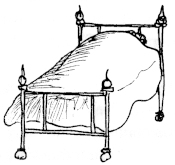
Beside the fire and by myself,
Sure of a bed and loth to leave
The ticking clock and shining delph!
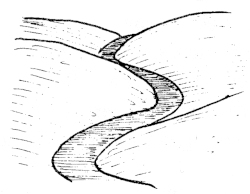
And roads where there's never a house or bush,
And tired I am of bog and road,
And the crying wind and the lonesome hush!
And I am praying to God on high,
And I am praying Him night and day,
For a little house, a house of my own
Out of the winds and the rain's way.
Illustrated by: Paul Swailes
11
KING JOHN'S CHRISTMAS - A.A. Milne
He had his little ways.
And sometimes no one spoke to him
For days and days and days.
And men who came across him,
When walking in the town,
Gave him a supercilious stare,
Or passed with noses in the air
And bad King John stood dumbly there
Blushing beneath his crown.
King John was not a good man,
And no good friends had he.
He stayed in every afternoon .
But no one came to tea
And, round about December,
The cards upon his shelf
Which wished him lots of Christmas cheer,
And fortune in the coming year,
Were never from his near and dear,
But only from himself.
King John was not a good man,
Yet had his hopes and fears.
They'd given him no present now
For years and years and years.
But every year at Christmas,
While minstrels stood about,
Collecting tribute from the young
For all the songs they might have sung,
He stole away upstairs and hung
A hopeful stocking out.
King John was not a good man,
He lived his life aloof;
Alone he thought a message out
While climbing up the roof.
He wrote it down and propped it
Against the chimney stack:
'To All and Sundry - Near and Far
F. Christmas in particular'
And signed it not 'Johannes R.'
But very humbly, 'Jack'.
'I want some crackers,
And I want some candy;
I think a box of chocolates
Would come in handy;
I don't mind oranges,
I do like nuts!
And I should like a pocket-knife
That really cuts.
And, oh! Father Christmas, if you love me at all,
Bring me a big, red india-rubber ball!'
King John was not a good man -
He wrote this message out,
And gat him to his room again,
Descending by the spout.
And all that night he lay there,
A prey to hopes and fears.
'I think that's him a-counting now,
[Anxiety bedewed his brow.]
'He'll bring one present, anyhow -
The first I've had for years.'
'Forget about the crackers,
And forget about the candy;
I'm sure a box of chocolates
would never come in handy;
I don't like oranges,
I don't want nuts,
And I have got a pocket-knife
That almost cuts.
But, oh! Father Christmas, if you love me at all,
Bring me a big red india-rubber ball!'
Next morning when the sun
Rose up to tell a waiting world
That Christmas had begun,
And people seized their stockings,
And opened them with glee,
And crackers, toys and games appeared,
And lips with sticky sweets were smeared,
King John said grimly: 'As I feared,
Nothing again for me!'
'I did want crackers,
And I did want candy;
I know a box of chocolates
Would come in handy,
I do love oranges,
I did want nuts.
I haven't got a pocket-knife -
Not one that cuts.
And, oh! if Father Christmas had loved me at all,
He would have brought a big red india-rubber ball!
King John stood by the window,
And frowned to see below
The happy bands of boys and girls
All playing in the snow.
A while he stood there watching,
And envying them all ...
When through the window big and red
There hurtled by his royal head,
And bounced and fell upon the bed,
An india-rubber ball!
And oh, Father Christmas,
My blessings on you fall
For bringing him
A big red India-rubber Ball!

Illustration by: Paul Swailes
34
PREPARATIONS

Should of his own accord
Friendly himself invite,
And say 'I'll be your guest tomorrow night',
How should we stir ourselves, call and command
All hands to work! Let no man idle stand!
Set me fine Spanish tables in the hall,
See they be fitted all;
Let there be room to eat
And order taken that there want no meat.
See every sconce and candlestick made bright,
That without tapers they may give a light.
Look to the presence: are the carpets spread,
The awning o'er the head,
The cushions on the chairs,
And all the candles lighted on the stairs?
Let each man give attendance in his place.'
Thus, if the King were coming, would we do;
And 'twere good reason too;
For 'tis a duteous thing
To show all honour to an earthly king,
And after all our travail and our cost,
So he be pleased, to think no labour lost
But at the coming of the King of Heaven
All's set at six and seven;
We wallow in our sin.
Christ cannot find a chamber in the inn.
We entertain him always like a stranger,
And as at first still lodge him in the manger.

Anon
[early 16th century]
Illustrated by: Paul Swailes

27
TIME
Vi Kingdon - 1997
And yet it rules our lives,
From birth until that final call,
On time you can rely.
It records our every move,
As each day goes by,
Where to go and what to do,
And even when in bed we lie.
It waits for no one,
Rich or poor it treats the same,
The famous or the infamous,
There's no priority in a name.
So let us not neglect it,
But treasure it each day,
For without TIME we would be lost,
And history never made.

Illustration by: Paul Swailes
12
EYES OF A CHLID

Illustrated by: Helen Armstead
When with my mother and father each Sunday we'd go
Walking under blue skies. Oh! those summers so warm
Down lanes, fields full of new life, wild flowers adorn
Through my child-eyes Life was such fun,
I'd never seen, yet heard, the sound of a gun.
The "Last-War" horrors were never spoken to me
But my child-eyes could not fail to see
As I skipped through the fields of poppies so red
My father walking upright, but with bowed head
Thousands of crosses like soldiers-in-line
Standing erect, white and so fine.
So near to the poppy fields they were connected
White crosses of Brave Men, Poppy Faces reflected.
Those child-eyes looked across fields and red -
Then up at my father still erect with bowed head.
A tear-trickled face, he took my small hand
"One day, my dear daughter, you'll understand,
Thousands of white crosses and poppies is now all you see.
Remember the Brave Souls in this Cemetery."
Ann Moseley [nee Billett]
24
IN LIFE'S GARDEN
Just before she died, an elderly relative of the family sent me this poem. I should like to pass the thoughts on to the readers of the Berrynarbor Newsletter.

Never by the leaves that fall -
Count your days by golden hours,
Don't remember clouds at all
Count your nights by stars, not shadows,
Count your life with smiles, not tears
And with joy, through all your lifetime,
Count your age by FRIENDS not years.
Janet Greenslade - Barton Lane
10
NO WONDER HE WAGS HIS TAIL!
The flowers and the trees,
He then made all the animals,
And all the birds and bees.
And when His work was finished,
Not one was quite the same,
He said "I'll walk this earth of mine
And give each one a name."
And so he travelled land and sea,
And everywhere he went,
Until it's strength was spent.
When all were named upon the earth
And in the sky and sea,
The little creature said, "Dear Lord,
There's not one left for me."
The Father smiled, and softly said,
"I've left you to the end.
I've turned my name back to front,
And called you 'DOG, my friend. "
From Esme and Scamp - Author Unknown
26
A SOMILOKWY
Sue has sold my milk.
Someone else is drinking the liquid,
that goes down as smooth as silk.
Alan thought I was the only
person that needed Gold Top,
but now Sue has found another
I hope he stocks more in his shop.
So today I must drink the white water
from bottles that sport the red caps that I hate
but tomorrow I'll be there quite early
to look for Gold Tops in the crate!
DB
9
TRIPLE VISION
Samuel Palmer'Coming from
Evening Church'
1830
The Tate Gallery,
London
Samuel Palmer [1805-1881] Painter of pastoral landscape and the most important follower of William Blake whom he met in 1824. He was very precocious and exhibited at the Royal Academy from 1819, when he was only 14.
Palmer generally produced small-scale, detailed landscapes with human figures. Intense religious feelings run through all his work and are expressed through a oneness with the natural world which suggests that for him, Eden was never lost.
The Virgin and Child with Saints George,
James the Greater and a Donor
by Samuel Palmer 1805-1881
Tempera, chalk, gold, ink and graphite on gesso on paper
Purchased 1922
REFERENCE N03697
© Tate, London
Licenced under CC-BY-NC-ND 3.0 (Unported)
Charles Causley
- Samuel Palmer's -
'Coming from Evening Church'
The heaven-reflecting, usual moon
Scarred by thin branches, flows between
The simple sky, its light half-gone, The
evening hills of risen green.
Safely below the mountain crest
A little clench of sheep holds fast.
The lean spire hovers like a mast
Over its hulk of leaves and moss
And those who, locked within a dream,
Make between church and cot their way
Beside the secret-springing stream
That turns towards an unknown sea;
And there is neither night nor day,
Sorrow nor pain, eternally
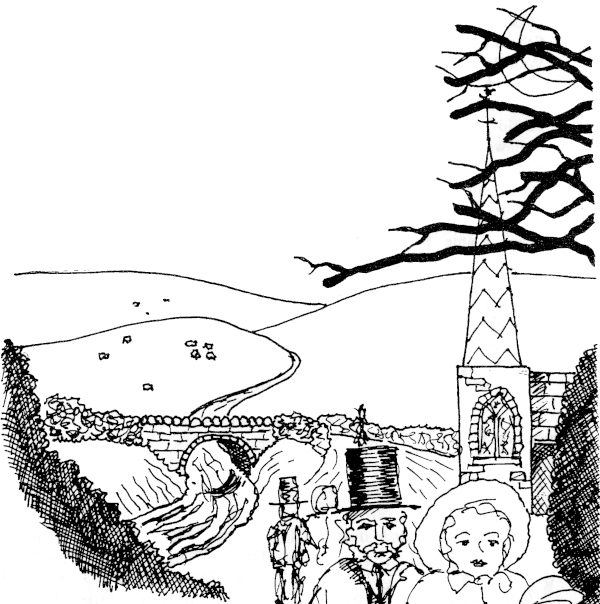
Illustration by: Paul Swailes
5
SPRING EVENING BERRYNARBOR
[A Journeyman Returned]
what do I see at 12.30 a.m. as I sit by the sea ...
The flickering lights from various heights
from 'cross the hill from Summerhill - what delights.
No sound at all - but with straining the ears
the twittering brook in motion appears
it's distant accord telling me I'm still here.
And what's this? Veined silhouette of the trees
in bright lights stand still in the night, Oh,
a car coming down Hagglnton Hill ... Now it's gone -
No more Disturbances Please!
And now, as the clouds pull away
the moon breaks through to display in full splendour
a 'Christmas Postcard' of Berrynarbor from sender -
like a gift from above, like Peace from a dove
received by this temporary lender.
Total tranquillity now, not a single sound has this
Journeyman found; then, a tomcat cries and a
night bird flies - no more painful human shrieks abound.
Such a gracious picture as this giving copious respite
and bliss - so loving and moving it be coming back
to the nurturing sea.
Neon lights, traffic fights, street crime, blacks v. whites
- never a pleasure reality!
So, rising again the moon to proclaim, a victory won not
in vain ... After years, and learning - and plenty of yearning
A Journeyman has finally returned.
Mike Prentice
'Summerhill'
21
CATHEDRAL BUILDERS
With winch and pulley hoisted hewn rock into heaven,
Inhabited sky with hammers, defied gravity,
Deified stone, took up God's house to meet Him,
And came down to their suppers and small beer;
Every night slept, lay with their smelly wives,
Quarrelled and cuffed the children, lied,
Spat, sang, were happy or unhappy,
And every day took to the ladders again;
Impeded the rights of way of another summer's
Swallows, grew greyer, shakier, became less Inclined
To fix a neighbour's roof of a fine evening,
Saw naves sprout arches, clerestories soar,
Cursed the loud fancy glaziers for their luck,
Somehow escaped the plague, got rheumatism,
Decided it was time to give it up,
To leave the spire to others; stood in the crowd
Well back from the vestments at the consecration,
Envied the fat bishop his warm boots,
Cocked up a squint eye and said, "I bloody did that."
John Ormond
From Requiem and Celebration
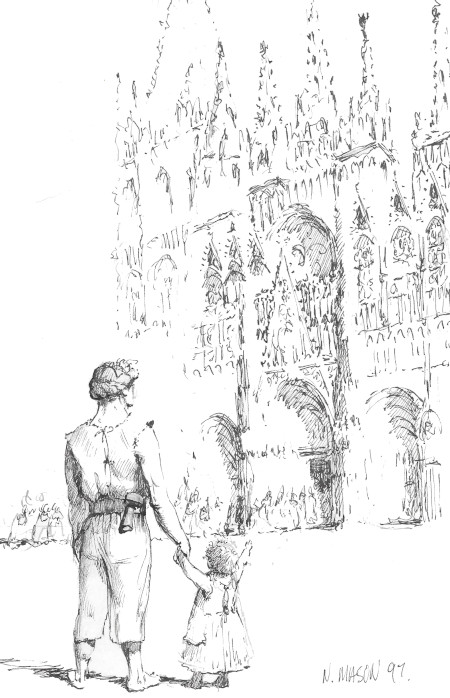
Illustrated by: Nigel Mason
18
OGDEN NASH [1902-1971]
American author whose numerous volumes of humorous verse are characterised by puns and unorthodox rhymes. His work displays remarkable skill and ranges in tone from acid satire to genial nonsense.
The cow is of the bovine ilk;
One end is moo, the other, milk.
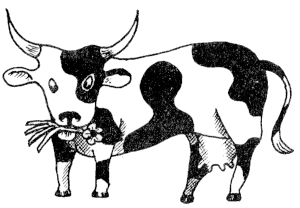
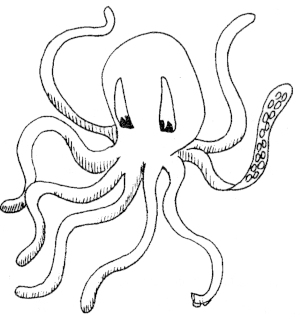
Tell me, O octopus, I begs,
Is those things arms, or is they legs
I marvel at thee, Octopus;
If I were thou, I'd call me Us.
Behold the duck.
It does not cluck.
A cluck it lacks
It quacks.
It is specially fond
Of a puddle or pond.
When it dines or sups,
It bottoms ups.
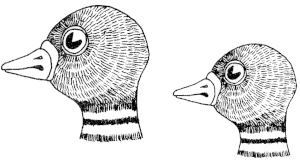
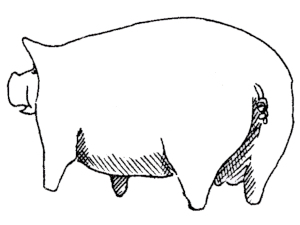
The pig, if I am not mistaken,
Supplies us sausage, ham and bacon.
Let others say his heart is big -
I call it stupid of the pig.
The firefly's flame
Is something for which science has no name.
I can think of nothing eerier
Than flying around with an unidentified glow on a person's posteerier.
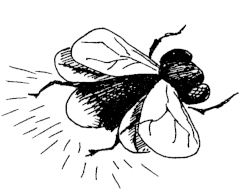
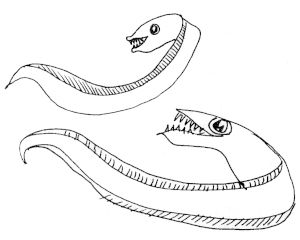
I don't mind eels
Except as meals
And the way they feels.
Some Primal termite knocked on wood
And tasted it, and found it good,
And that is why your cousin May
Fell through the parlour floor today.
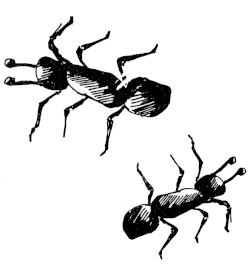
Illustrations by: Paul Swailes
14
OLD FOLKS
I have become a little older and a few changes have come into my life. Frankly, I've become quite a frivolous old girl! I am seeing seven gentlemen every day! Once I have woken and had my cup of tea, Will Power helps me to get out of bed and I go and see either John or Lew. During the morning I enjoy a tipple with those two Irish rogues, Phil O'San and Ben O'Lin, and when they leave Arthur Ritis shows up and stays the rest of the day. He doesn't like to stay in one place very long, so he takes me from joint to joint. After such a busy day, I'm really tired so Algy Pan soothes my aches and pains and then I hop into bed with Ben Gers. What a life!
P.S. The vicar came to call the other day. He said that at my age I should be thinking about the hereafter. I told him, "Oh, I do, all the time. No matter where I am, in the sitting room, upstairs or in the kitchen, I ask myself 'What am I here after?'"

Artwork by: Nigel Mason
I CAN'T REMEMBER
That I'm not among the dead
Though I'm getting more forgetful
And mixed up in the head.
I've got used to my arthritis,
To my dentures I'm resigned,
I can manage my bifocals
But God I miss my mind.
For sometimes I can't remember
When I stand at the foot of the stairs
If I must go up for something
Or have I just come down from there?
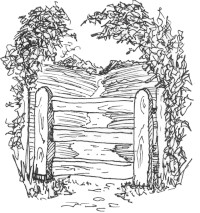
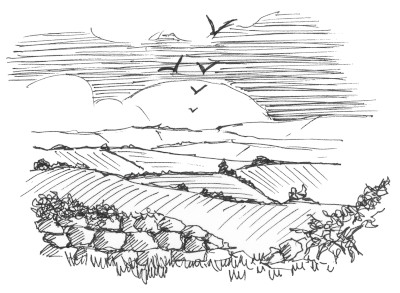
My poor mind is filled with doubt -
Have I just put food away,
Or have I come to take it out?
And there's time when it is dark,
With my nightcap on my head -
I don't know if I'm retiring
Or just getting out of bed?
So, if it's my turn to write to you -
There's no need for getting sore.
I may think that I've written
And don't want to be a bore!
Anon.
WHAT TO DO WHEN I HAVE GONE
knowing one day I will pass away.
Now, dear children, take my advice
When I am gone have the time of your life.
Take my possessions, get rid of them all,
Start stripping the bedroom, paint, ceiling and wall.
Have a new suite, a fireplace too,
Make it cosy for all of you.
It's so nice to be quiet, peaceful too,
A courting room for Tim and Sue.
How I'd like to be a fly on the wall
So I could pop in and see you all.
So take my advice and do as I bid,
It won't take more than a few hundred quid.
Yvonne 'O'
When I am dead, my dearest
Sing no sad songs for me;
Plant thou no roses at my head,
Nor shady cypress tree
Be the green grass above me
With showers and dewdrops wet;
And if thou wilt, remember,
And if thou wilt, forget.
I shall not see the shadows,
I shall not feel the rain;
I shall not hear the nightingale
Sing on, as if in pain;
And dreaming through the twilight
That doth not rise nor set,
Haply I may remember,
And haply may forget.
Christina Georgina Rossetti
[1830-1894]
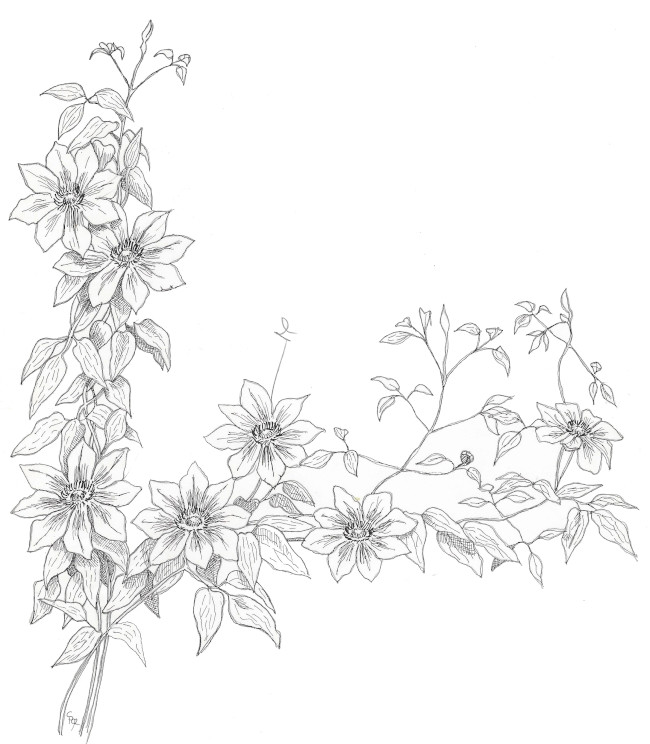
Illustration by: Paul Swailes
Contributions from Joy, Esme, Judith and Others
26
OLD FOLKS
I have become a little older and a few changes have come into my life. Frankly, I've become quite a frivolous old girl! I am seeing seven gentlemen every day! Once I have woken and had my cup of tea, Will Power helps me to get out of bed and I go and see either John or Lew. During the morning I enjoy a tipple with those two Irish rogues, Phil O'San and Ben O'Lin, and when they leave Arthur Ritis shows up and stays the rest of the day. He doesn't like to stay in one place very long, so he takes me from joint to joint. After such a busy day, I'm really tired so Algy Pan soothes my aches and pains and then I hop into bed with Ben Gers. What a life!
P.S. The vicar came to call the other day. He said that at my age I should be thinking about the hereafter. I told him, "Oh, I do, all the time. No matter where I am, in the sitting room, upstairs or in the kitchen, I ask myself 'What am I here after?'"

Artwork by: Nigel Mason
I CAN'T REMEMBER
That I'm not among the dead
Though I'm getting more forgetful
And mixed up in the head.
I've got used to my arthritis,
To my dentures I'm resigned,
I can manage my bifocals
But God I miss my mind.
For sometimes I can't remember
When I stand at the foot of the stairs
If I must go up for something
Or have I just come down from there?


My poor mind is filled with doubt -
Have I just put food away,
Or have I come to take it out?
And there's time when it is dark,
With my nightcap on my head -
I don't know if I'm retiring
Or just getting out of bed?
So, if it's my turn to write to you -
There's no need for getting sore.
I may think that I've written
And don't want to be a bore!
Anon.
WHAT TO DO WHEN I HAVE GONE
knowing one day I will pass away.
Now, dear children, take my advice
When I am gone have the time of your life.
Take my possessions, get rid of them all,
Start stripping the bedroom, paint, ceiling and wall.
Have a new suite, a fireplace too,
Make it cosy for all of you.
It's so nice to be quiet, peaceful too,
A courting room for Tim and Sue.
How I'd like to be a fly on the wall
So I could pop in and see you all.
So take my advice and do as I bid,
It won't take more than a few hundred quid.
Yvonne 'O'
When I am dead, my dearest
Sing no sad songs for me;
Plant thou no roses at my head,
Nor shady cypress tree
Be the green grass above me
With showers and dewdrops wet;
And if thou wilt, remember,
And if thou wilt, forget.
I shall not see the shadows,
I shall not feel the rain;
I shall not hear the nightingale
Sing on, as if in pain;
And dreaming through the twilight
That doth not rise nor set,
Haply I may remember,
And haply may forget.
Christina Georgina Rossetti
[1830-1894]

Illustration by: Paul Swailes
Contributions from Joy, Esme, Judith and Others
26
THIS COUNTRY OF MY BIRTH
This country of my birth
Tiny shoots appearing
Pushing through the earth
This fertile land becomes alive
As winter frosts recede
Trees begin to blossom
Farmers sow their seed
Throughout the land this temperate clime
Pervades each dale and hill
The thirsty earth absorbs the gentle rain
And drinks it's fill
'Tis April and the sun is warm
Interspersed with showers
Soon a wealth of colours bloom
When maytime shows her flowers
It's springtime in this lovely land
The country of my birth
A land of mists and gentle rain
Of flowers profuse there is no death
There's nowhere in this wide wide world
That I would rather be
Than in my English homeland
With my English cup of tea

Bettina Brown
Combe Martin
15
To finish this issue, a short poem by Ogden Nash which I hope will put a smile on the face of those currently 'under the weather'
THE GERM
Though smaller than the pachyderm.
His customary dwelling place
Is deep within the human race.
His childish pride he often pleases
By giving people strange diseases.
Do you, my poppet, feel infirm?
You probably contain a germ.
35
MY WEATHERWISE GRAN
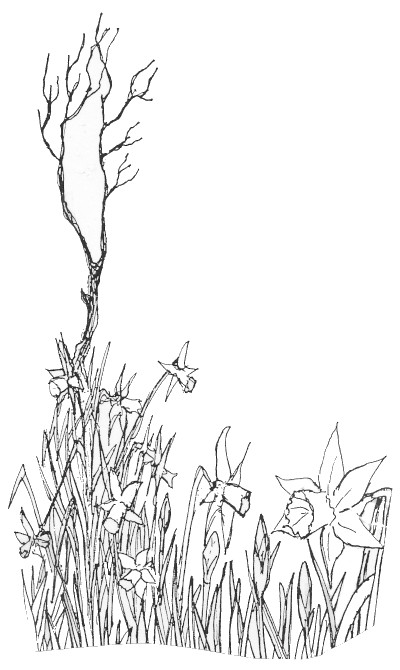
And although I love her dearly,
Unlike me, she really seems
To look at things so queerly.
She always thinks that every day,
Is special, no matter whether
It rains or snows, shines or blows,
In fact any kind of weather.
When outdoor fun is ruined by
A heavy shower provoking,
She'll pat my head and say
"You see the dry earth needs a soaking"
When I think the day too warm
For any kind of pleasure,
She says, "The grain has grown an inch,
I can see without a measure."
Now when I fret about the wind
That has set everything whirring,
She just looks at me and says
"Tut! Tut! The close air needs a stirring."
Even when the drifts are piling high,
And fence posts are scarcely peeping,
How beneath the blanket white,"
Says she, "The little flowers are keeping."
As I grow up I hope like Gran,
I'll understand more clearly,
How nice t'would be if more of us,
Could view LIFE so queerly!
Vi Kingdon
Illustrated by: Paul Swailes
31
THE SONG OF SOLOMON
Chapter II
For, lo, the winter is past, the rain is over and gone;
The flowers appear on the earth; the time of the singing birds is come, and the voice of the turtle is heard in our land;
The Old Testament

Illustration by: Paul Swailes
18
THAT SPECIAL DAY

Hanging decorations, faces full of glee.
Mum is busy baking, Dad gets in the way,
Everyone is eager to greet that Special Day.
Morning comes and sleepy eyes soon brighten when they see
Their presents in their stockings and on the Christmas tree.
And when the day is over and tired heads laid to rest,
Sweet dreams prolong the wonder of the day they love the best.
Illustrations by: Amy
and Rachel
from the Berrynarbor Playgroup
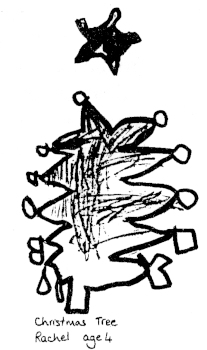
Betty Brown - Combe Martin
35
ALL THE DAYS OF CHRISTMAS
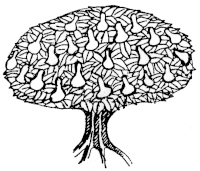
Have from me
To pleasure his Christmas
Wealthily?
The partridge has flown
From our pear tree.
Are the swans and the geese.
Milkmaids and drummers
Would leave him little peace.
I've no gold ring
And no turtle dove.
So what can I bring
To my true love?
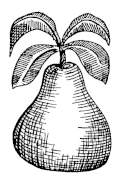
Chosen at the store;
A saw and a chisel
For mending the door;
A pair of red slippers
To slip on his feet;
Three striped neckties;
Something sweet.
I can best afford -
No pipers, piping,
No leaping lord,
But a fine fat hen
For his Christmas board;
[Versed in the role]
To be worn like pinks
In his buttonhole;
And the tree of my heart
With its calling linnet,
My evergreen heart
And the bright bird in it.
Phyllis McGinley
Illustrations by: Paul Swailes
27
CHRISTMAS
John Betjeman
The Tortoise stove is lit again
And lamp-oil light across the night
Has caught the streaks of winter rain
In many a stained-glass window sheen
From Crimson Lake to Hooker's Green.
The holly in the windy hedge
And round the Manor House the yew
Will soon be stripped to deck the ledge,
The altar, font and arch and pew,
So that the villagers can say
'The church looks nice' on Christmas Day.
Provincial public houses blaze
And Corporation tramcars clang,
On lighted tenements I gaze
Where paper decorations hang,
And bunting in the red Town Hall
Says 'Merry Christmas to you all'.
And London shops on Christmas Eve
Are strung with silver bells and flowers
As hurrying clerks the City leave
To pigeon-haunted classic towers,
And marbled clouds go scudding by
The many-steepled London sky,
And oafish louts remember Mum,
And sleepless children's hearts are glad,
And Christmas-morning bells say 'Come!'
Even to shining ones who dwell
Safe in the Dorchester Hotel.
And is it true? And is it true,
This most tremendous tale of all,
Seen in a stained-glass windows hue,
A Baby in an ox's stall?
The Maker of the stars and sea
Become a Child on earth for me?
And is it true? For if it is,
No loving fingers tying strings
Around those tissued fripperies,
The sweet & silly Christmas things,
Bath salts and inexpensive scent
And hideous tie so kindly meant.
No love that in a family dwells,
No carolling in frosty air,
Nor all the steeple-shaking bells
Can with this single Truth compare
That God was Man in Palestine
And lives to-day in Bread and Wine.

Illustrated by: Nigel Mason
18
OUR THANKS TO YOU
Coffee mornings, sales, walks, articles to amuse,
Gardening tips, recipes, crossword puzzles too,
A mine of information, collated just by you.
Delightfully illustrated, from cover and throughout,
Just open it and read "What's on and Roundabout"
Time means nothing as she rushes all around
Collecting news, times of events, to you they will astound.
Fingers fly across the keys, deadline is in sight
Pages numbered - check they're all in line,
Now the folding's underway, never mind the time.
Staple one, two, three and four, hundreds more piled on the floor.
Deadline's getting closer, not a second now to rest.
Nothing is too much trouble to provide this bi-monthly quest.
Nearly eight years our editor, Judy, dedicated to the task
Deserves a heartfelt thank you, as she will never ask.
OUR THANKS TO YOU JUDIE, and sorry for the mess,
producing BERRYNARBOR'S NEWSLETTER
Hotline off the press!
Ann and Marion
16
AUTUMN

Yellow the bracken
Golden the sheaves,
Rosy the apples,
Crimson the leaves;
Mist on the hillside,
Clouds grey and white.
Autumn, good morning!
Summer, good night!
Florence Hoatson
Illustrated by: Paul Swailes
27
1951-1983
The Years Between
Who taught her that the 'bright lights'
Were stars that shine at night.
And the beauty of the countryside, o'er hill and dale,
Was the place to live, if love was to prevail.
When first we wed, the jobs were few,
Dreams were shelved, and Town won through
A flat overlooking railway yard
No beauty there, but times were hard.
The sparkle of those dear brown eyes,
As motor bike he chose to buy,
Better jobs he thought within his grasp,
Travel independence found at last.
Evening classes, new schemes to start,
Typing notes, I learnt how a building gets its heart!
Then, flat became a house, and bike became a car,
Not Devon yet, but Surrey, the nearest for views so far.
Every year we made the trip, once if not twice,
To the Valley of his dreams, renewing family ties.
January 1976 - dawned that wonderful day,
We left Surrey and to Devon, back to stay.
Sadly family gone, but so much to do,
Finding job, growing veg. and flowers of every hue.
Helping Village on committees, and first Horticultural Show,
Life was so happy for this man, his eyes like stars did glow.
He had such dreams for the future, but fate can be so cruel,
So young to die; but sharing those dreams has added fuel
To my staying on, and doing the best I can
To keep a welcome in the Valley, in memory of Derrick - my man!
Yes, Derrick was the Devon lad who won this lassie's heart,
And taught me that the 'bright lights'
Are stars that shine at night.
That the beauty of the countryside is the place to live,
For those years we spent together, my THANKS to God I give
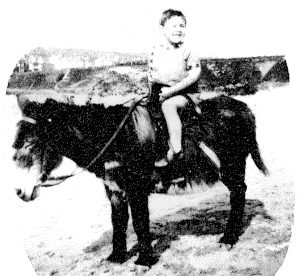
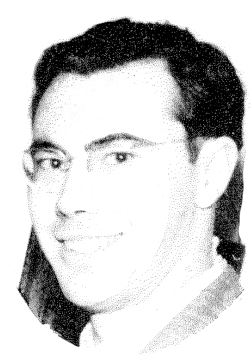
Vi Kingdon
Derrick William Kingdon, [1929-1983]
Educated at Berrynarbor and Combe Martin Schools
19
THE BURNING OF THE
LEAVES
Laurence Binyon
[1869-1943]
They go to the fire; the nostril pricks with smoke
Wandering slowly into a weeping mist.
Brittle and blotched, ragged and rotten sheaves!
A flame seizes the smouldering ruin and bites
On stubborn stalks that crackle as they resist.
The last hollyhock's fallen tower is dust;
All the spices of June are a bitter reek,
All the extravagant riches spent and mean.
All burns! The reddest rose is a ghost;
Sparks whirl up, to expire in the mist: the wild
Fingers of fire are making corruption clean.
Now is the time for stripping the spirit bare,
Time for the burning of days ended and done,
Idle solace of things that have gone before
Rootless hope and fruitless desire are there;
Let them go to the fire, with never a look behind.
The world that was ours is a world that is ours no more.
They will come again, the leaf and the flower, to arise
From squalor of rottenness into the old splendour,
And magical scents to a wondering memory bring;
The same glory, to shine upon different eyes.
Earth cares for her own ruins, naught for ours.
Nothing is certain, only the certain spring.

Illustrated by: Paul Swailes
15
OFF THE GROUND
Walter de la Mare
Three jolly Farmers
Once bet a pound
Each dance the others would
Off the ground.
Out of their coats
They slipped right soon,
And neat and nicesome
Put each his shoon.
One - Two - Three!
And away they go,
Not too fast
And not too slow;
Out from the elm-tree's
Noonday shadow,
Into the sun
And across the meadow.
Past the schoolroom
With knees well bent,
Fingers a-flicking,
They dancing went.
Upsides and over,
And round and round,
They crossed click-clacking
The Parish bound;
By Tupman's meadow
They did their mile,
Tee-to-tum
On a three-barred stile.
Then straight through Whipham
Footing it lightsome
But not too quick,
Up fields to Watchet
And on through Wye,
Till seven fine churches
They'd seen skip by -
Seven fine churches,
And five old mills,
Farms in the valley,
And sheep on the hills;
Old Man's Acre
And Dead Man's Pool
All left behind
As they danced through Wool.
And Wool gone by
Like tops that seem
To spin in sleep
They danced in dream:
Withy - Wellover
Wassop - Wo -
Like an old clock
Their heels did go,
A league and a league
And a league they went,
And not one weary
And not one spent,
And lo! and behold!
Past Willow-cum-Leigh
The great green sea.
Says Farmer Bates:
"I puffs and I blows,
What's under the water
Why no man knows!"
Says Farmer Giles:
"My mind comes weak,
And a good man drowned
Is far to seek."
But Farmer Turvey,
On twirling toes,
Ups with his gaiters,
And in he goes:
Down where the mermaids
Pluck and play
On their twangling harps
In a sea-green day;
Down where the mermaids
Finned and fair,
Sleek with their combs
Their yellow hair ...
Bates and Giles
On the shingle sat,
Gazing at Turvey's
Floating hat.
But never a ripple
Nor bubble told
Where he was supping
Never an echo
Rilled through the sea
Of the feasting and dancing
And minstrelsy.
They called - called - called:
Came no reply:
Nought but the ripples'
Sandy sigh.
Then glum and silent
They sat instead
Vacantly brooding
On home and bed,
Till both together
Stood up and said:
"Us knows not, dreams not
Where you be,
Turvey, unless
In the deep blue sea;
But axcusing silver -
And it comes most willing -
Here's us two paying
Our forty shilling;
For it's sartin sure, Turvey,
Safe and sound
You danced us square, Turvey,
Off the ground! "
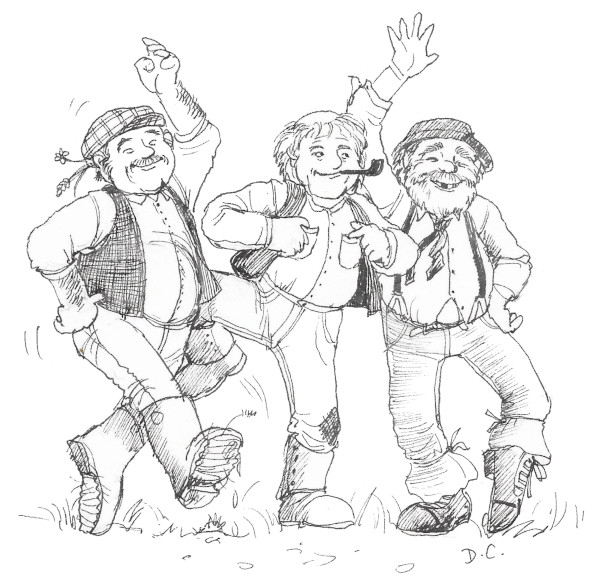
Illustration by: Debbie Cook
29
SONG OF SUMMER DAYS

Chirp of cricket, croak of frogs,
Cry of wild bird, hum of bees,
Dancing leaves and whisp'ring trees;
Legs all bare, and dusty toes,
Ruddy cheeks and freckled nose,
Splash of brook and swish of line,
Where the song that's half so fine?
Sing a song of summer days,
Leafy nooks and shady ways,
Nodding roses, apples red,
Clover like a carpet spread;
Sing a song of running brooks,
Cans of bait and fishing hooks,
Dewy hollows, yellow moons,
Birds a-pipe with merry tunes.
Sing a song of skies of blue,
Eden's garden made anew,
Scarlet hedges, leafy lanes,
Vine-embowered sills and panes;
Stretch of meadows, splash'd with dew,
Silver clouds with sunlight through,
Call of thrush and pipe of wren,
Sing and call it home again.
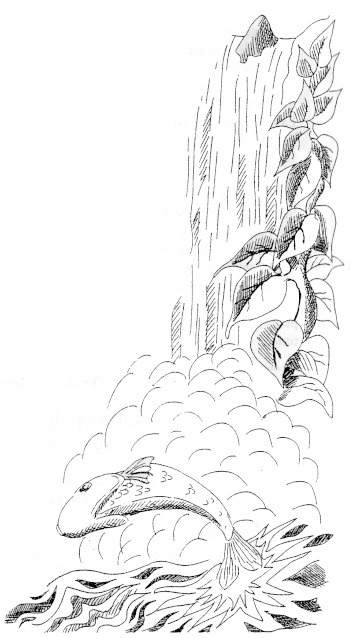
J.W.Foley
Illustrated by: Paul Swailes
12

"Why do you go back?" my friends enquire.
"Is it the penguins, seals or whales?"
It's all these and much more.
"Why do you revisit?" ask my next of kin,
"Because it's the nearest thing to heaven
that I can imagine."
So white - whiter than white.
Ice layer upon layer - forming cities and towers.
Silent - silence - then a tremendous roar
and a cathedral comes crashing and is no more.
So white - whiter than white
With crystal clear colours of blue and green
More precious than any gems I have seen.
Her pristine beauty is all around
From this the birds and animals abound.
To find words to describe my journey to Antarctica
Till now I have not read
And until I do
I shall keep it safely in my head.
For once a thing is known: It can never be unknown
It can only be forgotten.

Kath Arscott
19
SHARE-A-POEM
MOORINGS
The dinghy nods at nothing.
It paws the bright water
And scatters its own shadow
In a false net of light.
A ruined chain lies reptile,
Tied to the ground by grasses.
Two oars, wet with sweet water
Filched from the air, are slanted
From a wrecked lobster creel.
Nose of a dog otter.
It's piped at, screamed at, sworn at
By elegant oyster catcher
On furious red legs.
With a sort of idle swaying
The tide breathes in. Harsh seaweed
Uncrackles to its kissing;
The skin of the water glistens;
Rich fat swims on the brine.
The dinghy paws bright water,
Restless steeplechaser
Longing to clear the hurdles
That ring the Point of Stoer.
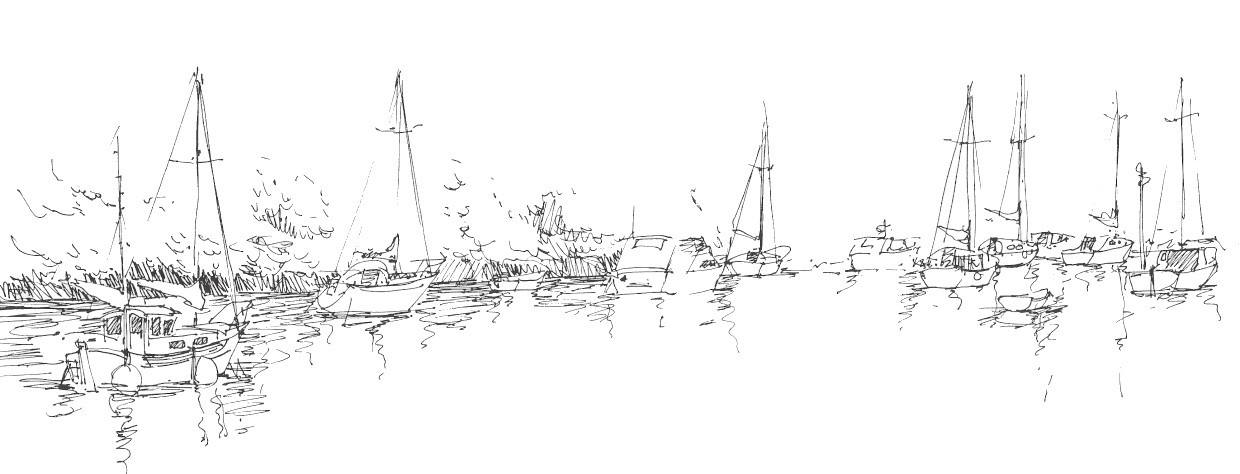
Artwork by: Peter Rothwell
Norman MacCaig
Norman MacCaig was born in 1910 in Edinburgh, where he worked as a schoolmaster. Much of his poetry is distinctly Scottish. At his best he is a highly skilled poet, with the ability to evoke a landscape skilfully and economically, conveying his strong feelings for natural surroundings in excellent verse.
17
FIRST SPRING MORNING
Robert Bridges

O feel the gentle air,
That wanders thro' the boughs to burst
The thick buds everywhere!
The birds are glad to see
The high unclouded sun:
Winter is fled away, they sing,
The gay time is begun.
Adown the meadows green
Let us go dance and play,
And look for violets in the lane,
And ramble far away
To gather primroses,
That in the woodland grow,
And hunt for oxlips, or if yet
The blades of bluebells show.
There the old woodman gruff
Hath half the coppice cut,
And weaves the hurdles all day long
Beside his willow hut.
We'll steal on him, and then
Startle him, all with glee
Singing our song of winter fled
And summer soon to be.
10
WINTER
Christina Rossetti
Only waistcoated robin still chirps in the bush:
Soft sun-loving swallows have mustered in force,
And winged to the spice-teeming southlands their course.

Just a brown ball in moss with a morsel to eat:
Armed hedgehog has huddled him into the hedge,
While frogs scarce miss freezing deep down in the sedge.
But robin sits whistling to us from his perch:
If I were red robin, I'd pipe you a tune,
Would make you despise all the beauties of June.

Munch chestnuts, tell stories, and stir the blaze higher:
We'll comfort pinched robin with crumbs, little man,
Till he'll sing us the very best song that he can.
9
A CHRISTMAS THOUGHT
A tribute to our Saviour though on the cross he died
To prove he was the Son of God, to make us understand
That when we feel despondent He will give a helping hand.
So when we celebrate the day with frivolity and cheer
We must also keep in mind our Saviour always near
Who gave His life to try to make the world a better place
To give faith and hope and sanctity to all the human race.
Bettina Brown
The Robins, Combe Martin
30
A CHRISTMAS CAROL
Christinna
Rossetti

Frosty wind made moan,
Earth stood hard as iron,
Water like a stone;
Snow had fallen, snow on snow,
Snow on snow,
In the bleak mid-winter
Long ago.
Nor earth sustain;
Heaven and earth shall flee away
When He comes to reign:
In the bleak mid-winter
A stable-place sufficed
The Lord God Almighty,
Jesus Christ.

Poor as I am?
If I were a shepherd
I would bring a lamb;
If I were a wise man
I would do my part -
Yet what I can, I give Him,
Give my heart.
Illustrated by: Paul Swailes
22
SHARE-A-POEM
This October, nearly sixty years after his death, Rudyard Kipling was named Britain's favourite poet and his poem 'If' a clear winner to become the country's best-loved verse in the BBC's national poll to mark the second National Poetry Day. Kipling, short storywriter, poet and novelist, was born in Bombay in 1865 and educated at the United Services College at Westward Ho! His children's books include 'The Jungle Book' and 'Just So Stories'. In 1907 he was the first British writer to receive the Nobel Prize for Literature.
IF
Are losing theirs and blaming it on you;
If you can trust yourself when all men doubt you,
But make allowance for their doubting too;
If you can wait and not be tired by waiting,
Or being lied about, don't deal in lies,
Or being hated don't give way to hating,
And yet don't look too good, nor talk too wise;
If you can dream - and not make dreams your master;
If you can think - and not make thoughts your aim;
If you can meet with Triumph and Disaster
And treat those two impostors just the same;
If you can bear to hear the truth you've spoken
Twisted by knaves to make a trap for fools,
Or watch the things you gave your life to broken,
And stoop and build 'em up with worn-out tools;
And risk it in one turn of pitch-and-toss,
And lose, and start again at your beginnings,
And never breathe a word about your loss;
If you can force your heart and nerve and sinew
To serve your turn long after they are gone,
And so hold on when there is nothing in you
Except the Will which says to them: "Hold on!"
If you can talk with crowds and keep your virtue,
Or walk with Kings - nor lose the common touch;
If neither foes nor loving friends can hurt you;
If all men count with you, but none too much;
If you can fill the unforgiving minute
With sixty seconds' worth of distance run;
Yours is the Earth and everything that's in it,
And - which is more - you'll be a Man, my son!
10
ON THE NAMING OF FUNGI
I savour the changes from day to day
And there are none so sudden and strange to see
As the growth of the fungi upon the way,
In clusters, or circles, or solitary state
There are waxy or fleshy or dry scaly ones;
There are slimy or shaggy, translucent or dull,
Parasols, ink caps or sticky glazed buns;
Funnel-shaped goblets or globular lumps;
They are minuscule, fragile and scarce to be seen
Or vast vulgar excrescences smelling of meat,
They are poisonous purple or virulent green,
Orange or chestnut or pinkish or pale...
In pasture or woodland on rotting tree trunk
By roadside, in garden, up hill or down dale
I got out a book and was going to become
An Expert on Fungi - tell one from another
And label each toadstool with family and name
But alas on perusal I was dashed to discover
I couldn't remember how to tell my craterellus
Comucopiodes from my camerophyllus virgineus and
I'm too old to learn!
But I find on my walks that the pleasure's the same;
As someone once said, I think, "What's in a name?"
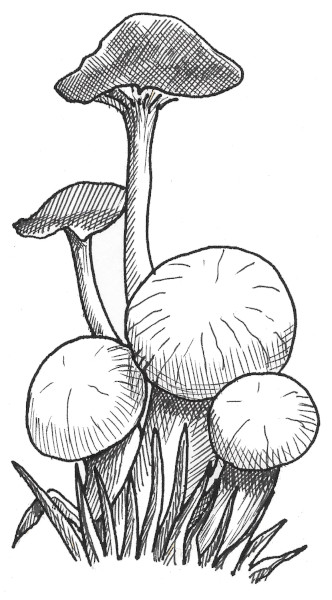
P.C.P. of Lower T.
Illustrated by: Paul Swailes
8
SHARE-A-POEM
West Country Poets
- Ted Hughes
THE STAG
While the traffic jam along the road honked and shouted
Because the farmers were parking wherever they could
And scrambling to the bank-top to stare through the tree-fringe
Which was leafless,
The stag ran through his private forest.
While the rain drummed on the roofs of the parked cars
And the kids inside cried and daubed their chocolate and fought
And mothers and aunts and grandmothers
Were a tangle of undoing sandwiches and screwed-round gossiping heads
Steaming up the windows,
The stag loped through his favourite valley.
While the blue horsemen down in the boggy meadow
Sodden nearly black, on sodden horses,
Spaced as at a military parade,
Moved a few paces to the right and a few to the left and felt rather foolish
Looking at the brown impassable river,
The stag came over the last hill of Exmoor.
While everybody high-kneed it to the bank-top all along the road
Where steady men in oilskins were stationed at binoculars,
And horsemen by the river galloped anxiously this way and that
And the cry of hounds came tumbling invisibly with their echoes
down through the draggle of trees,
Swinging across the wall of dark woodland,
The stag dropped into strange country.
And turned at the river
Hearing the hound-pack smash the undergrowth, hearing the bell-note
Of the voice that carried all the others,
Then while his limbs all cried different directions to his lungs,
which only wanted to rest,
The blue horsemen on the bank opposite
Pulled aside the camouflage of their terrible planet.
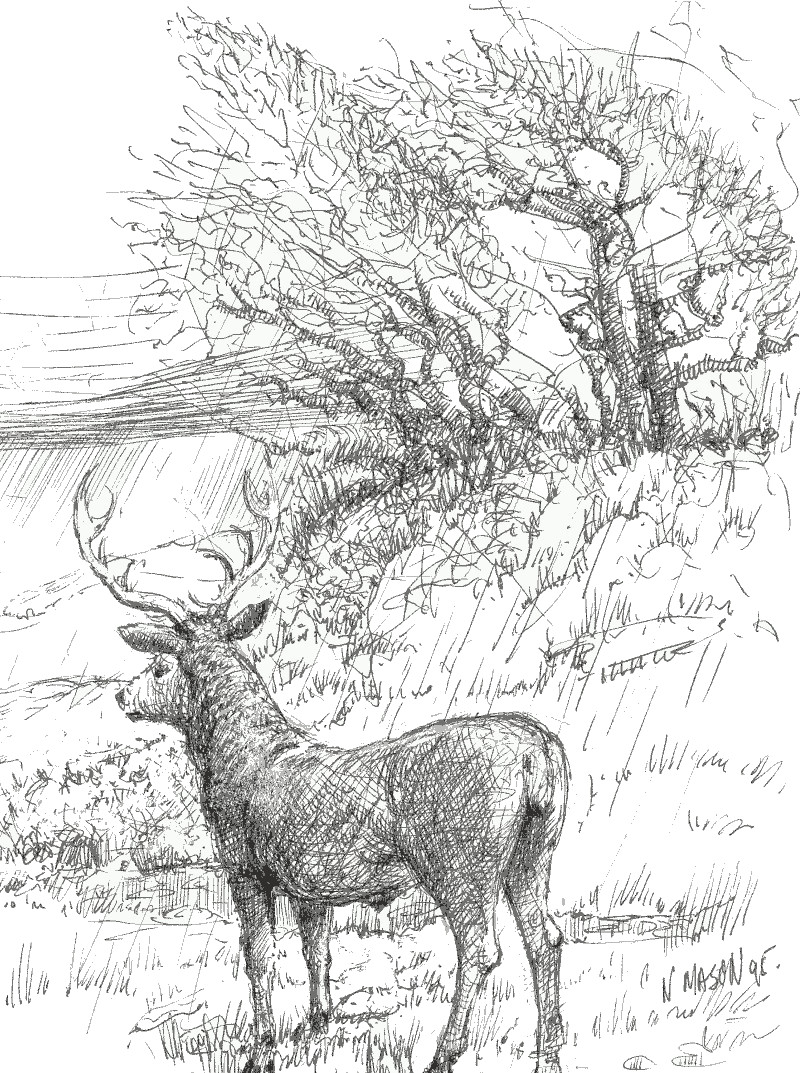
Illustrated by: Nigel Mason
And the stag doubled back weeping and looking for home up a valley and down a valley
While the strange trees struck at him and the brambles lashed him,
And the strange earth came galloping after him carrying the loll-tongued hounds to fling all over him
And his heart became just a club beating his ribs and his own hooves shouted with hounds' voices,
And the crowd on the road got back into their cars
Wet-through and disappointed.
This second Ted Hughes poem, delightfully illustrated by Nigel Mason, concludes the series on West Country Poets. Thoughts for future series include love poetry, birds and beasts. Have YOU any suggestions? Please let me have your ideas, together with a suitable poem.
Ed.
18
STORY OF THE CORN
Where plough and rake had been,
And soon, through brown earth pushing
The young green shoots were seen.
Cleared of weeds by harrow,
And watered by the rain,
Aided by the sunshine,
Appears the ripening grain.
The fields of bearded barley,
The graceful hanging oats,
And ears of wheat packed closely,
The cheerful reaper notes.
He sees the cornfields waving,
Yellow and ripe and strong,
And so, his heart rejoicing,
He sings his harvest song.

Illustrated by: Paul Swailes
8
AUGUST
A happy little song,
And this is what he whispered,
"The harvest won't be long."


A merry little tune.
The windmill answered gaily,
"The harvest's coming soon. "
Through the cornfields steals along,
They are joining with the fairies
Singing harvest's merry song.

Eunice Fallon
31
SHARE-A-POEM
West Country Poets
- Ted Hughes
The last poet in this series of West Country poets is Ted Hughes, not a Devonian by birth but by 'adoption', since he now lives in North Devon, and as well as writing about Devon, he concerns himself with conservation issues in the County.
He was born in Yorkshire in 1930 and educated at Mexborough Grammar School and Pembroke College, Cambridge. In 1956 he married the American poet, Sylvia Plath, and was appointed Poet Laureate in 1984, successor to poets like Ben Jonson, Wordsworth, Tennyson, John Masefield and John Betjeman.
The post of Poet Laureate is technically an officer of the Royal Household, whose duty it is to write odes for royal occasions. The duty is no longer enforced - just as well, perhaps, can you image an ode 'For a Royal Trial Separation'!
Much of his poetry is concerned with animals and his strong sense of the beauty and violence of the natural world. His first collection was the Lark in the Rain [1957], but he also writes topographical poetry about landscape. Many people will be familiar with his writing for children - The Iron Man and Tales of the Early World.
WORK AND PLAY
The swallow of summer, she toils all summer,
A blue-dark knot of glittering voltage,
A whiplash swimmer, a fish of the air.
But the serpent of cars that
crawls through the dust
In shimmering exhaust
Searching to slake
Its fever in ocean
Will play and be idle or else it
will bust
The swallow of summer, the barbed harpoon,
She flings from the furnace, a rainbow of purples,
Dips her glow in the pond and is perfect.
But the serpent of cars that
collapsed on the beach
Disgorges its organs
A scamper of colours
Which roll like tomatoes
Nude as tomatoes
With sand in their creases
To cringe in the sparkle of
rollers and screech.
The swallow of summer, the seamstress of summer,
She scissors the blue into shapes and she sews it,
She draws a long thread and she knots it at corners.
But the holiday people
Are laid out like wounded
Flat as in ovens
Roasting and basting
With faces of torment as space
burns them blue.
Their heads are transistors
Their teeth grit on sand grains
Their lost kids are squalling
While man-eating flies
Jab electric shock needles but what can they do?
They can climb in their cars with raw bodies, raw faces
And start up the serpent
And headache it homeward
A car full of squabbles
And sobbing and stickiness
With sand in their crannies
Inhaling petroleum
That pours from the foxgloves
While the evening swallow
The swallow of summer, cartwheeling through crimson,
Touches the honey-slow river and turning
Returns to the hand stretched from under the eaves -
A boomerang of rejoicing shadow.
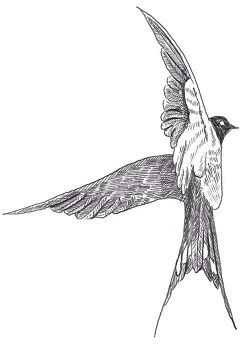

Illustrated by: Paul Swailes
16
SUMMER MOODS

I love at eventide to walk alone
Down narrow lanes oerhung with dewy thorn
Where from the long grass underneath the snail
Jet black creeps out and sprouts his timid horn
I love to muse oer meadows newly mown
Where withering grass perfumes the sultry air
Where bees search round with sad and weary drone
In vain for flowers that bloomed but newly there
While in the juicey corn the hidden quail
Cries 'wet my foot' and hid as thoughts unborn
The fairy like and seldom-seen land rail
Utters 'craik craik' like voices underground
Right glad to meet the evenings dewy veil
And see the light fade into glooms around
John Clare
[1793-1864)
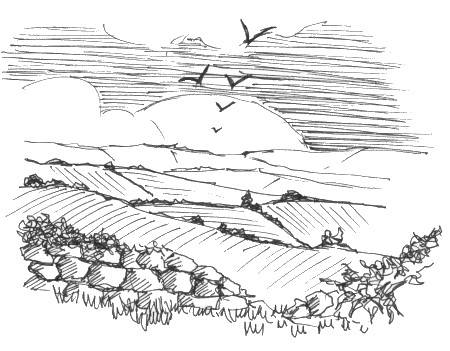
Illustrations by: Paul Swailes
4
SHARE-A-POEM
West Country Poets ... by Birth
PATRICIA BEER
Festival
Red robes go down the street in the sun.
Dance in time now you are medieval,
Men hidden in hobby horses, green men in bushes.
Golden corn-dollies make you women fertile,
Blue-eyed bellringer peal you to a wedding.
Children and schoolteacher, stomp round the maypole.
Do not forget how to unwind the ribbons
The church still stands at the centre of it all.
Vicar, say there will now be a short service.
Four-year-old-boy, exclaim 'A circus?', joyful.
It is years later than you all think. Oh, be careful.

Illustration by: Nigel Mason
23
MAYTIME
Wakens the earth from Winter's sleep
And sends forth flowers in joyful blooms,
It's Maytime.
When squirrels hunt round for hidden stores,
'Neath fluttering blossoms that carpet the floor
And goldfinch peck seeds from dandelion heads,
It's Maytime.
When courting ducks visit the garden pond
With chitter and clapper all day long,
And the cuckoo sings his repetitive song,
It's Maytime.
These things I see from my garden window,
That heralds the Spring and promise of Summer,
And shows me the greatness of God's creation,
In Maytime.
Vida Butler
16
To the Small
Celandine
William Wordsworth
Let them live upon their praises;
Long as there's a sun that sets,
Primroses will have their glory;
Long as there are violets,
They will have a place in story:
There's a flower that shall be mine,
'Tis the little Celandine.
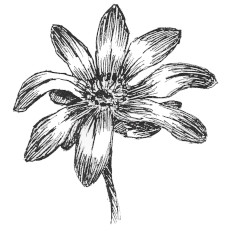
In the time before the thrush
Has a thought about her nest,
Thou wilt come with half a call,
Spreading out they glossy breast
Like a careless Prodigal;
Telling tales about the sun,
When we've little warmth, or none.
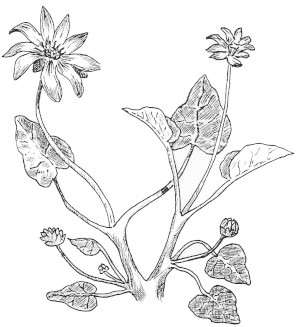
As our 'Local Walker' tells us in the last issue, the lesser [or small] celandine was Wordsworth' s favourite flower, as, with its bright shiny early flower heralding spring, it is to many folk.
12
"IN A BATH TEASHOP"
"Let us not speak, for the love we bear one another -
Let us hold hands and look."
She, such a very ordinary little woman;
He, such a thumping crook;
But both, for a moment, little lower than the angels
In the tea shop's ingle-nook.
John Betjeman
35
THE GLOBE'S ANNUAL SHOW
What a night to remember
The Globe was "all at sea",
We were being entertained once more
By the usual 'twenty three'?
The talented folk we've come to know,
Had given their time to put on this show.
And those who saw it I know very well
All enjoyed it and thought it was swell.
On the village's behalf,
We'd like to thank all who took part,
And thought we'd let you know,
We're eagerly looking forward to next year's Show!
Vi Davies
32
SHARE-A-POEM
West County Poets -
by Birth
PATRICIA BEER, 1919-
Patricia Beer was born shortly after World War I and grew up in Withycombe Raleigh near Exmouth. Her mother, a schoolteacher, and her father, a railway clerk, were fiercely ambitious for their two daughters.
Patricia was educated at Exmouth Grammar School, Exeter University and St. Hilda's College, Oxford. She then worked in Italy for 7 years before returning to lecture in English at Goldsmiths College, London. After her marriage in 1964, she returned to live again in Devon, and to write her poetry.
MIST IN THE OTTER VALLEY

This morning in vivid
Sun, as the gulls flew in,
Their bold shadows advanced
And landed on the stone
Some time before they did.
The mist has come uphill
Now, bringing the river
With it. White, hemlock-cold
Rising. I have never
Seen the valley so full.
It is still day. There might be
Be some life left. Somewhere
Farmers may be ploughing
In a bubble of clear
Air, a pocket of sight.
And though with their valiant
Shadows stripped off them, though
Hidden from what they kill,
The gulls are there somehow.
Not a beak less brilliant
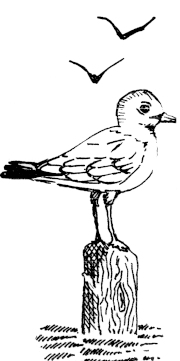
Perhaps the strongest influence on her writing was her religious up-bringing - as a member of the Plymouth Brethren which is reflected in much of her poetry. As a child she was allowed to "read no books unless someone was saved in it". Despite this, she decided when she was only 8 that she was going to be a poet and be famous.
She has published several books of Poetry, a novel - Moon's Ottery, a book of Literary Criticism and an autobiography of her childhood - Mrs. Beer's House.
20
SPRING, THE TRAVELLING MAN
Spring, the Travelling Man, has been here,
Here in the glen;
He must have passed by in the grey of the dawn,
When only the robin and wren
Were awake,
Watching out with their bright little eyes
In the midst of the brake.
The rabbits, maybe, heard him pass,
Stepping light on the grass,
Whistling careless and gay at the break o' the day.
Then the blackthorn to give him delight
Put on raiment of white;
And, all for his sake,
The gorse on the hill, where he rested an hour,
Grew bright with a splendour of flower.
Winifred M. Letts

Illustrated by: Paul Swailes
10
NOW THE WINTER'S GONE
Now that the winter's gone, the earth hath lost
Her snow-white robes; and no more the frost
Candies the grass, or casts an icy cream
Upon the silver lake or crystal stream;
But the warm sun thaws the benumbed earth,
And makes it tender; gives a sacred birth
To the dead swallow; wakes in hollow tree
The drowsy cuckoo and the bumble-bee.
Now do a choir of chirping minstrels bring
In triumph to the world, the youthful Spring:
The valleys, hills and woods, in rich array,
Welcome the coming of the longed for May.
Thomas Carew
9
A CHANGE IN THE YEAR
It is the first mild day of March:
Each minute sweeter than before,
The redbreast sings from the tall larch
That stands before our door.
There is a blessing in the air,
Which seems a sense of joy to yield
To the bare trees, and mountains bare;
And grass in the green field.
William Wordsworth
23
FEBRUARY
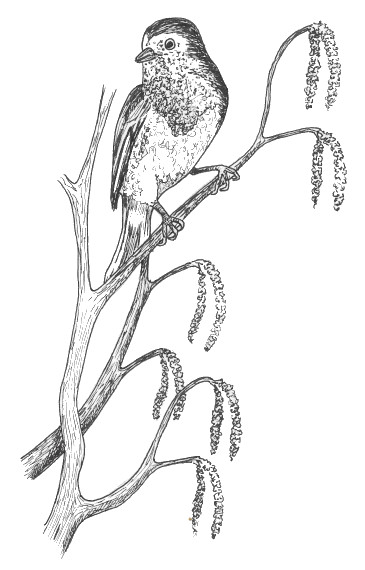
To-day, I saw the catkins blow,
Altho' the hills are white with snow.
White throstles sang "The sun is good";
They waved their banners in the wood.
They come to greet the lurking Spring
As messengers from Winter's King.
And thus they wave while Winter reigns,
While his cold grip still holds the plains.
Oh, tho' the hills are white with snow,
To-day I saw the catkins blow.
Dorothy Una Ratcliffe
22
SHARE-A-POEM
West Country Poets - by Birth
The second poem by Thomas Hardy in the West Country poets series is "The Walk", written in 1913.
You did not walk with me
Of late to the hill-top tree
By the gated ways,
As in earlier days;
You were weak and lame,
So you never came,
And I went alone, and I did not mind,
Not thinking of you as left behind.
Just in the former way;
Surveyed around
The familiar ground
By myself again:
What difference, then?
Only that underlying sense
Of the look of a room on returning thence.
12
THAT'S CHRISTMAS
Tinsel trees are all aglow
Holly wreathes hang on the door
Robin comes to say 'Hello'
It's Christmas!
Children's faces beaming bright
With expectation and delight
For presents hiding out of sight
It's Christmas!
And so at church we kneel and pray
And think of that eventful day
When Jesus in a manger lay
That's Christmas!
Bettina Brown - Combe Martin
32
SHARE-A-POEM
West Country Poets
- By Birth
THOMAS HARDY [1840-1928]
Born in Dorset, the son of a stonemason, Thomas Hardy trained as an architect, a career he abandoned after the success of his fourth novel, Far From the Madding Crowd. He set the majority of his novels in the surrounding counties of his birth, an area he named Wessex. Most of his novels and his poems portray intense human relationships played out in a harshly indifferent world and reveal his love and observation of nature. He experimented with rhythms and verse forms and his Collected Poems [1930] contains over 900 poems. He married twice, first Emma Gifford and after her death, Florence Dugdale, herself a writer of children's books.
The Oxen
Christmas Eve, and twelve of the clock,
'Now they are all on their knees ,
An elder said as we sat in a flock
By the embers in hearthside ease.
We pictured the meek mild creatures where
They dwelt in their strawy pen,
Nor did it occur to one of us there
To doubt they were kneeling then.
In these years! Yet, I feel,
If someone said on Christmas Eve,
'Come; see the oxen kneel,
'In the lonely barton by yonder coomb
Our childhood used to know, '
I should go with him in the gloom,
Hoping it might be so.
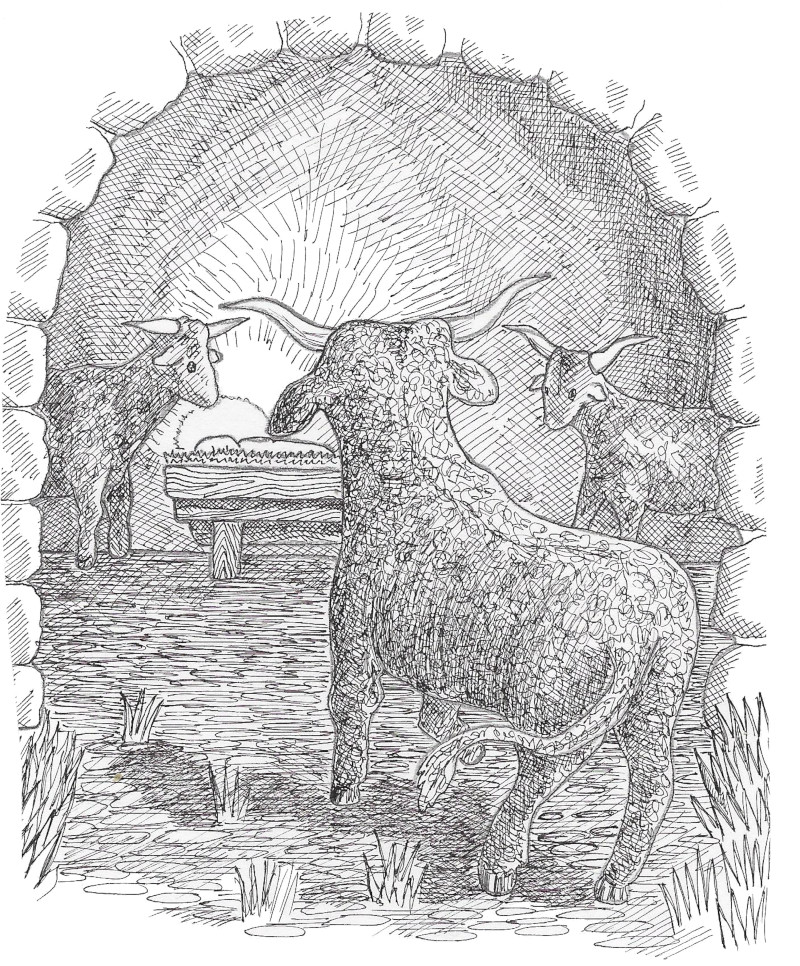
Illustration by: Paul Swailes
29
FALLING LEAVES
From apricot to amber
From bronze to palest gold,
The leaves are falling softly
Their story as of old.
Through the ages seasons change
In England's beauteous land,
Nature wields her paintbrush
With a clear and practised hand.
The tender green of spring,
All have their special magic
All have their songs to sing.
But a walk along the country lanes,
When leaves begin to fall,
The vibrant shades of Autumn
Paint a picture best of all.
Bettina Brown - Combe Martin
13
SHARE-A-POEM
West Country Poets
- by Birth
GREEN MAN IN THE GARDEN
The second poem in our West Country Poets Series

Illustration by: Paul Swailes
Green man in the garden
Staring from the tree,
Why do you look so long and hard
Through the pane at me?
Your eyes are dark as holly,
Of sycamore your horns,
Your bones are made of elder-branch,
Your teeth are made of thorns.
Your hat is made of ivy-leaf,
Of bark your dancing shoes,
And evergreen and green and green
Your jacket and your trews.
Leave your house and leave your land
And throw away the key,
And never look behind, he creaked,
And come and live with me.
I bolted up the window,
I bolted up the door,
I drew the blind that I should find
The green man never more.
But when I softly turned the stair
As I went up to bed,
I saw the green man standing there,
'Sleep well, my friend, ' he said.
8
SHARE-A-POEMWest Country Poets - by Birth1. Charles Causley
Charles Causley was born in Launceston in 1917 and still lives there today. He worked for a builder and an electricity company before joining the Navy during the war. Here, in 1940, he began writing poetry. Returning to civvy street, he trained as a primary school teacher, a profession he followed until his retirement, teaching in his home town.
The Seasons in North Cornwall
Down by the Tamar today,
And careless, like tidemarks, the hedges
Are bursting with almond and may.
Here lie I, waiting for old summer,
A red face and straw-coloured hair has he:
I shall meet him on the road from Marazion
And the Mediterranean Sea.
On the sea-chart of the sky,
The tall shipmasts crack in the forest
And the banners of autumn fly.
My room is a bright glass cabin,
All Cornwall thunders at my door,
And the white ships of winter lie
In the sea-roads of the moor.
20
KATIE
And then He made the dog,
To remind us of His wisdom,
And to walk the paths He trod.
To prove that love and kindness,
Can overcome all things,
He made the canine angel,
But forgot to add the wings.
There's a breed for everyone,
I love them all - and yet
None could ever take the place,
Of my own four-legged pet.
We roamed the fields and woodlands,
In sunshine and in rain,
There's no therapy like a dog,
To soothe away life's pain.
They love you when you scold them,
Then roll those doleful eyes,
Making owners feel ashamed
That they ever did chastise.
I know my loyal friend,
Will watch the Gates of Heaven,
Ever faithful to the end.
Dedicated to little Katie, a truly wonderful companion for 17 years.
Vi Kingdon
14
TO MY MUM AND FAMILY IN THE VALLEY
Across the moors, past the quarries,
Down the narrow winding lanes,
Wild flowers flourish in all their colours,
The Sterridge Valley calling my name.
To my second home I'm going,
To my Mum and Family In the Valley.
Just one more bend and Riversdale awaits,
Mum is standing by the cottage gates.
A happy smile, a loving hug. "We're here"
With my family in the Valley.
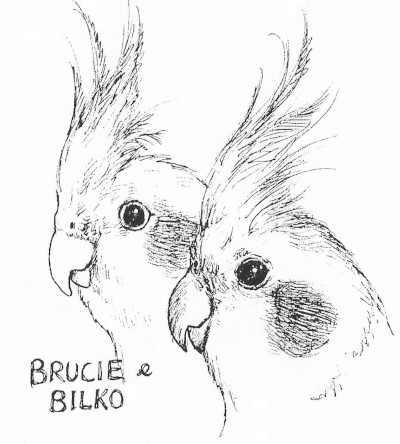
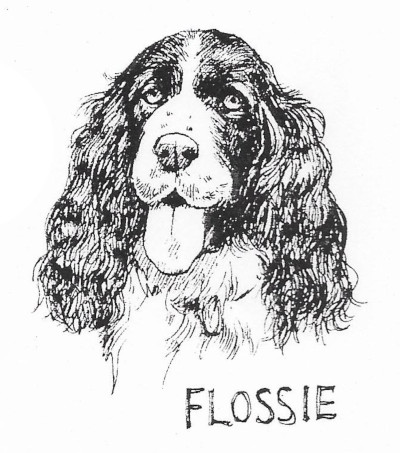
Flossie, Brucie, Bilco - Oh, what a mess
Kettle on, a cup of tea; Pat's arrived,
"Mum, make that three."
"Hello, Rosie, my how you've grown.
Rosie, no, that's Flossie's bone"
With my family in the Valley.
Put dressing-gown and slippers on.
Off downstairs, "Good morning, Mum,"
It's such a glorious day
To spend with my family in the Valley.
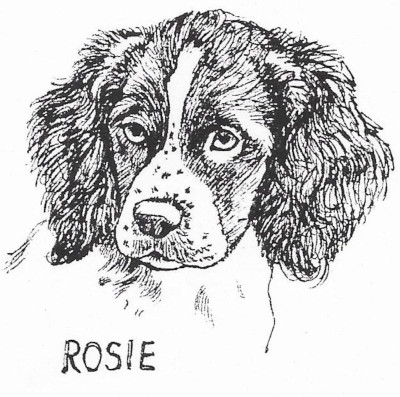
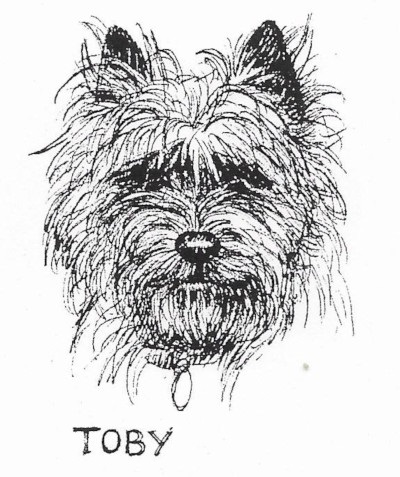
Rosie's by hers, Toby and Sammy are late.
But look, here come Margaret and Ray,
With Toby and Sammy, "A beautiful day. "
"You haven't just got out of your bed?
I've been up for hours, my fuchsias I've fed."
Cheek from my family in the Valley.
Jeans and sweater, look my best.
A lunch-time snack; watch Home and Away,
Where is it going, my first day?
With my family in the Valley.
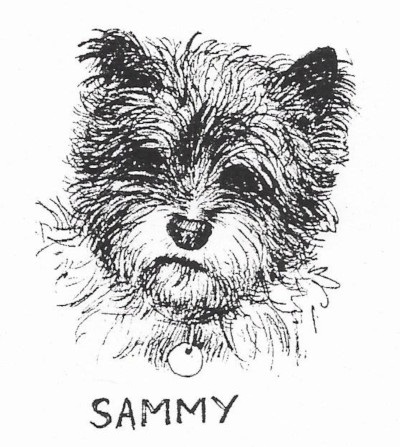
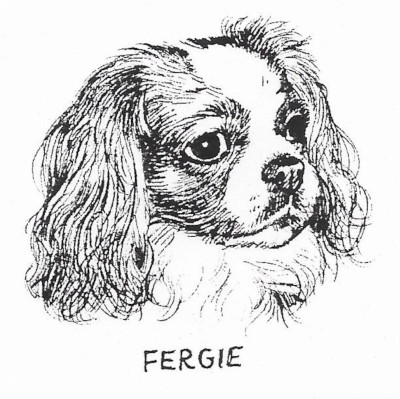
Joan and Toby in their garden, "Hello. "
Past the cottages, so neat and clean,
Colours and blooms in the gardens to be seen.
"Hello", nice day," to all on our way
To the village - second half of my day.
Post Office, friendly chat and a joke or two,
"Hello Fergie, how are you?"
With my family In the Valley.
Past cottages with fragrant roses grown on,
Riversdale we pass on by, a beauty beholden,
It brings tears to my eyes.
We walk up the Valley, so peaceful and serene,
Hydrangeas from Eunice and Bernard's wall do lean.
"Hello, Vi." "It's a lovely day, Kath."
Jill and Rainer in their garden with Amber.
More hugs and laughter and a few cracked ribs ,
"Come in for tea and a gander . "
Tea with my family in the Valley.
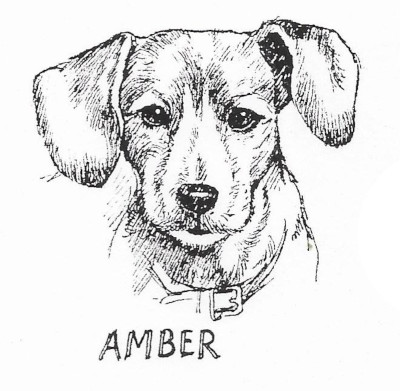
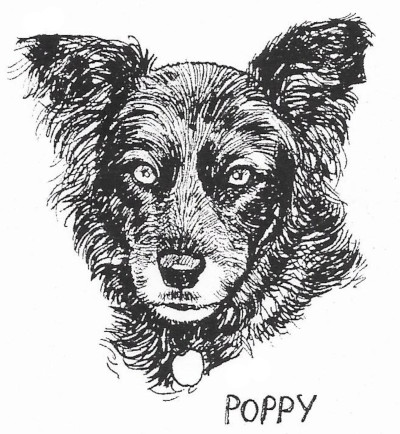
"Good evening, lovely day", more family I know.
A beautiful sunset, it's now getting dark,
Here comes Judie with Poppy,
Floss knows her bark.
Stop for a chat, "Come over tonight."
"Thank you, we'd love to, around about eight."
Riversdale Cottage's lights welcome us home - missed 'Neighbours'.
I'm tired but so happy, all thanks to my Mum,
From my day with my family in the beautiful Sterridge Valley.
Love you, Mum.
Ann
Illustrations by: Debbie Cook
20
SHARE-A-POEM
The Cow Parsley

My job is done, I've shed my seed,
My beauty's waned tho' but a weed.
I now prepare my roots to sleep,
So please dear soul for I don't weep,
For winter's cruel and chilly clime
Gives way to spring a warmer time,
Through frost and snow and winds so high,
I'll rise again towards the sky,
Though folk tread, and treat me harshly,
Thus my lot, a mere cow-parsley.
The House Martin
We ate so well before we left to fly across the sea,
Three thousand strong and each of us determined as can be,
North at first then north west o'er fields and mountains
high,
Non-stop we flew, we fed on wing, but some fell from the
sky.
Onwards, onwards, flap and glide, to stop is certain death
Thro' wind and rain and night so cold I barely take my
breath,
My home is Kent, not too long now with Channel there below,
I'm half my weight, my wings do ache. The lights of Dover
glow.
I cross the cliffs with rising sun and soon detect my
stable,
I circle round, have food and drink and then fly to my
gable,
My nest is there, it looks intact but wait - it holds a
stranger
A sparrow bold, I chase him out, he goes, he wants no
danger.

D. J. Devo
14
Show Time with The Globe
Show time with The Globe again,
Held in our Manor Hall.
The entertainment wag superb,
And a good time had by all.
The room was full to overflowing,
We almost missed a seat,
They'll have to expand the walls a bit
For the Globe's next year treat.
The audience came as Guides and Scouts
And little Brownies - a few,
The supper went down very well -
There were second helpings too!
Our thanks to all who played a part
You really did Berry proud;
No matter who I speak to
Their praises are many and loud.
It seems that Berrynarbor
Has more talent than we know,
So hopefully this time next year
We'll have another darn Good Show!
Vi Davies
24
SHARE-A-POEM
To Daffodils - Robert Herrick
Fair daffodils, we weep to see
You haste away so soon;
As yet the early-rising sun
Has not attained his noon.
Stay, stay
Until the hasting day
Has run
But to evensong;
And, having prayed together, we
Will go with you along.
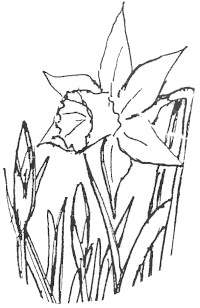
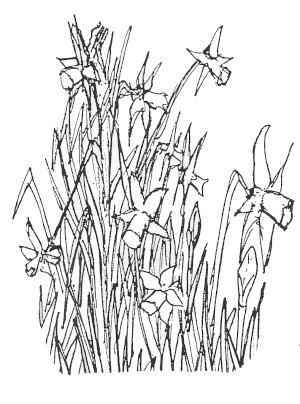
We have as short a spring;
As quick a growth to meet decay,
As you, or anything.
We die
As your hours do, and dry
Away
Like to the summer's rain;
Or as the pearls of morning's dew,
Ne'er to be found again.
7
SHARE-A-POEM
My old cat stretches out his arm
To say, "I and you" .
He thinks the future threatens harm;
I feel it too.
The flexing paw to reassure
Myself and creature asserts, in feline comfiture,
Our frail, shared nature.
Robert Gittings
12
DAFFODILS
I wandered lonely as a cloud
That floats on high o'er vales and hills,
When all at once I saw a crowd,
A host, of golden daffodils;
Beside the lake, beneath the trees,
Fluttering and dancing in the breeze.
Continuous as the stars that shine
And twinkle on the Milky Way,
They stretched in never-ending line
Along the margin of a bay:
Ten thousand saw I at a glance,
Tossing their heads in sprightly dance.
The waves beside them danced, but they
Out-did the sparkling waves in glee:
A poet could not but be gay,
In such a jocund company:
I gazed - and gazed - but little thought
What wealth the show to me had brought:
For oft, when on my couch I lie
In vacant or in pensive mood,
They flash upon that inward eye
Which is the bliss of solitude;
And then my heart with pleasure fills,
And dances with the daffodils.
William Wordsworth

Illustrated by: Paul Swailes
10
DECEMBER
The summer sun has gone.
Peace reigns throughout the village,
Though there's plenty to be done.
Another coffee morning,
The Bazaar is soon to come,
Attend the weekly whist drive
And things to do-at home.
So stir the Christmas puddings
And for this special dish
Another drop of brandy,
And make yourself a wish.
The men are watching football,
The children have their tree,
And the women set out yet again
On another shopping spree.
As we gather round the table
And each one takes their seat,
We think those in other lands
With not enough to eat.
But it's turkey and plum pudding,
Bells and paper chain,
For old Father Christmas
Is here with us again.
C.M.P.
Seaside, Combe Martin
31
SHARE-A-POEM
BALLAD OF THE BREAD MAN

Illustrated by: Paul Swailes
Mary stood in the kitchen.
Baking a loaf of bread.
An Angel flew in through the window.
"We've a job for you, " he said.
"God in his big gold heaven,
Sitting in his big blue chair,
Wanted a mother for his little son,
Suddenly saw you there."
Mary shook and trembled,
"It isn't true what you say."
"Don't say that," said the angel,
"the baby's on its way. "
Joseph was in his workshop
Planing a piece of wood.
"The old man's past it," the neighbours said
"That girl's been up to no good."
"And who was that elegant fellow, "
They said, "in the shiny gear? "
The things they said about Gabriel
Were hardly fit to hear.
Mary never answered,
Mary never replied.
She kept the information,
Like the baby, safe inside.
They went to vote in town.
When Mary found her time had come
The hotels let her down.
The baby was born in an annexe
Next to the local pub.
At midnight, a delegation
Turned up from the Farmer's Club.
They talked about an explosion
That made a hole in the sky,
Said they'd been sent to the Lamb & Flag
To see God come down from on high.
A few days later a bishop
And a five-star general were seen
With the head of an African country
In a bullet-proof limousine.
"We've come," they said, "with tokens
For the little boy to choose. "
Told the tale about war and peace
In the television news.
After them came the soldiers
With rifle and bomb and gun,
Looking for enemies of the state.
The family had packed and gone.
Charles Causley
This poem is one chosen for the Key Stage 4 [G.C.S.E.] Oxford English Programme
18
A PASSER BY
Then one by one the fairy lights shine forth on Christmas trees,
Glancing through a lighted window as I hurry by,
I glimpse a cheerful gathering of children reaching high,
To decorate the Christmas tree, their faces beaming bright -
A lovey tableau standing out in an ethereal light.
The snow is falling softly now - a quietness fills the air,
I pass as a church and see a crib with Jesus lying there.
Fondly Mother Mary and the Three Wise Men look down,
I look more closely and see a tiny, jewelled crown,
A halo bright around His head, a sweet contented smile,
I feel the peace and sanctity and I linger for a while.
The snow is falling thicker now, the bells begin to ring,
'Tis Christmas and I hear the choir and people sing
The carols. and the hymns of praise to worship Him most high,
I join the throng and am no more a simple passer by.
Bettina Brown
Combe Martin
1
SHARE-A-POEM
AUTUMN FIRES
And all up the vale,
From the autumn bonfires
See the smoke trail!
Pleasant summer over
And all the summer flowers,
The red fire blazes,
The grey smoke towers.
Sing a song of seasons!
Something bright in all!
Flowers in the summer,
Fires in the fall!
Robert Louis Stevenson
From a Child's Garden of Verses

Illustration by: Paul Swailes
12
SHARE-A-POEM
EXPLANATION, ON COMING HOME LATE
To of those clear waters drink,
Where the fishes, gold and red,
Ever quickly past us sped,
And the pebbles, red and blue
Which we saw the green weeds through
At the bottom shining lay:
It was their shining made us stay.
From the Collection 'This Way Delight '

Illustrated by: Paul Swailes
10
FRIENDS
And the things which in common we share,
We want to live on, not because of ourselves,
But because of the people who care.
It's in giving and doing for somebody else -
On that all of Life's splendour depends,
And most of the joys of this wonderful world
Are found in the keeping of friends.
6
SHARE-A-POEM
PINE-TREES AND THE SKY: EVENING

Illustration by: Paul Swailes
And smelt the sea, and earth, and the warm clover,
And heard the waves, and the seagull 's mocking cry.
And in them all was only the old cry,
That song they always sing - 'The best is over!
You may remember now, and think, and sigh, O silly lover!'
And I was tired and sick that all was over,
And because I,
For all my thinking, never could recover
One moment of good hours that were over.
And I was sorry and sick, and wished to die.
Then from the sad west turning wearily,
against the white north sky,
Very beautiful, and still, and bending over
Their sharp black heads against a quiet sky.
And there was peace in them; and I
Was happy, and forgot to play the lover,
And laughed, and did no longer wish to die;
Being glad of you, O pine-trees and the sky!
Rupert Brooke
[Written at Lulworth, 1907]
23
SPRING

Illustrated by: Paul Swailes
Bettina Brown
Five Turnings, Combe
Martin
23
Forties Night at The Globe
It was unbelievable the talent they'd found.
Noel Coward was there and Vera Lynn
And Dad's Army making a bit of a din.
Marlene Dietrich was a great hit
And lovely Shirley Temple did 'his' bit.
Flanagan and Allen were also there
Underneath the Arches - a great pair.
The evacuees were throwing a paddy
Didn't like being away from Mommy and Daddy.
The Andrews Sisters showed us their charm
And the Sand Dance Group were an eyeful.
While Pte. Stokes did 'Bless 'em All'
And the Billy Cotton Buds Band were delightful.
There were soldiers, sailors and evacuees
Factory workers in dungarees .
Nurses, wardens and even a Hun
It all added to the fun.
Last but not least - GARY the host
Who really did deserve a toast.
He gave us his best and with all the rest
Made it a night to remember.
For those who couldn't make it
You really missed a treat.
So I'm hoping for your sake
There might be a repeat.
Thanks to all who entertained
And to Lynne and staff for the grub.
We 're all so very thankful
That we've got a lovely pub.
It really was such a delight
There should be one each Friday night!
Vi Davies
22
SHARE-A-POEM
[A Favourite of Mine - Vi Davies)
FRIENDSHIP
The inexpressible comfort of feeling safe with a person,
Having neither to weigh thoughts nor measure words
But pour them all out, just as they are chaff and grain together
Knowing that a faithful hand will take and sift them
Keep what is worth keeping
And then with the breath of kindness blow the rest away.
George Eliot
19
A JOB WELL DONE
A Kindly Tribute
by a Caring Officer
there is no warming fire ahead.
From here to there one cannot see,
around the corner - he is free.
Walk the road with steady pace,
to slowly end your lifetime's race.
You lay at night to gaze at Mars,
be born again beneath the stars.
Walking man with life anew,
no longer here for me, for you.
His troubles now have taken flight,
his eyes have seen a greater sight.
The road runs out, his walking ends,
a final path at last ascends.
We wish you peace so far above,
on your final path, we wish you love.
B.
This little poem was written by a local police officer who was stationed at the time in Combe Martin. He had been searching for a missing man who was suffering from senile dementia. The man had gone missing many times, but the police had always managed to bring him safely home until one night he could not be found and the search went on for six weeks. He was found on the edge of Exmoor in a hedge where he had Iain down to rest, fallen asleep never to wake again.
20
SHARE-A-POEM
The Reverend Eli Jenkins' Sunset Poem
Dear Lord, a little prayer I make,
O please to keep Thy lovely eye
On all poor creatures born to die.
And every evening at sun-down
I ask a blessing on the town,
For whether we last the night or no
I'm sure is always touch-and-go.
We are not wholly bad or good
Who live our lives under Milk Wood,
And Thou, I know, wilt be the first
To see our best side, not our worst.
O let us see another day!
Bless us this night, I pray,
And to the sun we all will bow
And say, good-bye - but just for now!
Dylan Thomas
16
A PRAYER
Found in Chester Cathedral
And also something to digest
Give me a healthy body Lord,
With sense to keep it at its best.
Give me a healthy mind good Lord,
To keep the good and pure in sight,
That seeing sin is not appalled,
But finds a way to put it right.
Give me a mind that is not bored,
That does not whimper, whine or sigh.
Don't let me worry overmuch
About the fussy thing called "I" .
Give me a sense of humour Lord,
Give me the grace to see a joke,
To get some happiness from life,
And pass it on to other folk.
14
A visit from St. Nicholas
"'Twas the night before Christmas, when all through the
house,
Not a creature was stirring, not even a mouse.
The stockings were hung by the chimney with care,
In hope that St. Nicholas soon would be there."
Prof. C.C. Moore
[1779-1863]
10
THE SHEEPDOG

After the very bright light
And the talking bird,
And the singing,
And the sky filled up wi' wings,
And then the silence,
Our lads sez
We'd better go, then.
Stay, Shep. Good dog, stay.
So I stayed wi't' sheep.
After they cum back,
It sounded grand, what they'd seen:
Camels, and kings, and such,
With presents - human sort,
Not the kind you eat -
And a baby. Presents wes for him.
Our lads took him a lamb.
I had to stay behind wi't' sheep.
Pity they didn't tek me along too.
I 'm, good wi' lambs,
And the baby might have liked a dog
After all that myrrh and such.
U.A. Fanthorpe
7
SEPTEMBER HARVEST
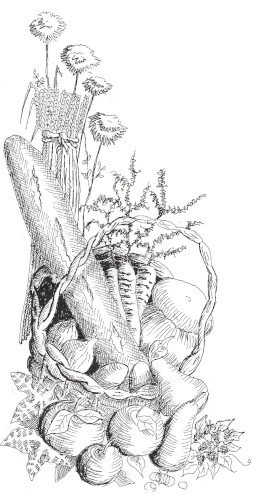
Slowly they pass as all seasons must
Months of summer sun and rain
Now we have another September
And Harvest time again.
The fields of gold and green and brown
Unfold for many a mile
With gentle hills and a shady tree
To rest awhile.
The ripe red fruit in the orchard now
The tree with boughs bent low
From pippin fair to blackberry bush
In the wild hedgerow.
The warm brown earth her increase yields
Of fruit and grain and flower
Now gathered in by willing hands
Each sunlit hour.
Throughout the golden harvest days
By garden wall and cottage door
Michaelmas daisies mauve & purple
Bloom once more,
So here's to the labourer in the field
Through spring, summer and fall
And praises be to the great Creator
Watching over all.
C.M.P.
Combe Martin
Thank you, Miss Parkin, for your delightful seasonal poem,
and
thank you, Paul Swailes, for another charming illustration.
22
SUMMER BALLET
Christina Rainsford
Six dragonflies, green, gold and blue
dart and hover in the sun
above the glassy lake, each one
reflected there, a ballet corps
on gauzy wings, they sweep and soar,
poise on a water-lily pad
then rise and circle high
against the back-drop of the sky.
It is hoped that over the last three years, readers have enjoyed Christina Rainsford's delightful and most apt poems. To quote: "Christina Rainsford is highly skilled with rhyme and meter, sharp and fresh in her observations and clever in her choice of subject and imagery."
This remarkable 94 year old poet lives in Katonah, New York, in the house she and her late husband built 58 years ago. After the death of Kerr Rainsford in 1947, she began writing in earnest, studying poetry under Leonora Speyer at Columbia University. Since that time she has published four books and various single poems, and has been a member of the Poetry Society of America, the Pen and Brush Club and the New York Women Poets. She has 3 children, 7 grandchildren and 2 great-grandchildren.
19
SHARE-A-POEM
From The Deserted Village
Sweet was the sound, when oft, at evening's close,
Up yonder hill the village murmur rose;
There as I passed with careless steps and slow,
The mingling notes came softened from below;
The swain responsive as the milk-maid sung,
The sober herd that lowed to meet their young;
The noisy geese that gabbled o'er the pool,
The playful children just let loose from school;
The watch-dog's voice that bayed the whispering wind,
And the loud laugh that spoke the vacant mind;
These all in sweet confusion sought the shade,
And filled each pause the nightingale had made.
Oliver Goldsmith [1728-1774)

Illustrated by: Debbie Cook
6
JULY WITH THE POETS
The haze of noon wanned silver-grey
The soundless mansion of the sun:
The air made visible in his ray,
Like molten glass from furnace run.
Quivered o'er heat-baked turf and stone
And the flower of the gorse burned on -
Burned softly as gold of a child's fair hair
Along each spiky spray, and shed
Almond-like incense in the air
Whereon our senses fed.
Walter De La Mare
Contributed by: Marion Billett
23
SHARE-A-POEM
I am very grateful to Margaret Doughty of Mortehoe, a member of Ilfracombe U3A, who has sent me two of her favourite poems, one of which is:
Night is on the Downland
Night is on the down land, on the lonely moorland,
On the hills where the wind goes over sheep-bitten turf ,
Where the bent grass beats upon the unplowed poor land
And the pine-woods roar like the surf.
Here the Roman lived on the wind-barren lonely,
Dark now and haunted by the moorland fowl;
None comes here now but the peewit only,
And moth-like death in the owl.
Beauty was here on this beetle-droning downland;
The thought of a Caesar in the purple came
From the palace by the Tiber in the Roman townland
To this wind-swept hill with no name.
Brave as a thought on the frontier of the mind,
In the camp of the wild upon the march of madness,
The bright-eyed Queen of the Blind.
Now where Beauty was are wind-withered gorses,
Moaning like old men in the hill-wind's blast;
The flying sky is dark with running horses,
And the night is full of the past.
John Masefield
12
SIMNEL CAKE
- 1 lb almond paste
- 8 oz plain flour
- Pinch of salt
- 1/2 tsp grated nutmeg
- 1/2 tsp ground cinnamon
- 8 oz currants, cleaned
- 4 oz sultanas, cleaned
- 3 oz chopped mixed peel
- 4 oz glace cherries, quartered
- 6 oz butter
- 6 oz caster sugar
- 3 eggs
- Milk to mix [if required]
- Egg white or apricot glaze
Grease and line a 7" cake tin. Shape 1/3rd of the almond paste into a round slightly smaller than the cake tin. Sift together the flour, salt and spices.
Mix the currants, sultanas, peel and cherries.
Cream the butter and sugar together until pale and fluffy, then beat in the eggs, one at a time. Fold in the flour mixture, adding a little milk, if required, to give a dropping consistency. Fold in the fruit.
Put half the mixture into the prepared tin and place the round of almond paste on top. Cover with the rest of the mixture, spreading it evenly. Bake in a preheated cool oven [150C/300F, Gas 2] for to 2 and 1/2 to 3 hours, until the cake is a rich brown and firm to the touch.
From half the remaining paste, shape eleven small balls. Shape the rest into a round to fit the top of the cake. Brush the top surface with egg white or apricot glaze and place the almond paste round in position. Smooth it slightly with a rolling pin and pinch the edges into scallops with finger and thumb. Score the surface with a knife. Arrange the almost paste balls around the edge and, if like for extra glaze, brush the whole with egg white. Grill until light golden brown, and finish with a ribbon and a bow when cold.
Simnel Cake used to be served only on Mother' s Day, but is now more often associated with Easter Sunday.
17
SHARE-A-POEM
Early Wasp
Along the window ledge, a wasp
still winter-numb, crawls languidly,
not as in summer, when buzzing angrily
he flies about my head, competing
for the juicy peach I am eating.
I view him now with different eyes,
greeting him with pleased surprise
as a first sign of spring,
observing
his gauzy wings outstretched,
his golden body, etched
with black, tiered like a Chinese tower,
his sting with its latent power.
Now he crawls along the sun-warmed board
harmless as a sheathed sword.
Christina Rainsford

Illustrated by: Debbie Cook
10
The Kingfisher
And left thee all her lovely hues;
And, as her mother's name was Tears,
So runs it in thy blood to choose
For haunts the lonely pools, and keep
In company with trees that weep.
Go you and, with such glorious hues,
Live with proud Peacocks in green parks;
On lawns as smooth as shining glass,
Let every feather show its mark;
Get thee on boughs and clap thy wings
Before the windows of proud kings.
Nay, lovely Bird, thou art not vain;
Thou hast no proud ambitious mind;
I also love a quiet place
That's green, away from all mankind;
A lonely pool, and let a tree
Sigh with her bosom over me.
W.H. Davies
21
SHARE-A-POEM
Leisure
We have no time to stand and stare?
No time to stand beneath the boughs
And stare as long as sheep or cows.
No time to see, when woods we pass,
Where squirrels hide their nuts in grass.
No time to see, in broad daylight,
Streams full of stars, like skies at night.
No time to turn at Beauty's glance,
And watch her feet, how they can dance.
No time to wait till her mouth can
Enrich that smile her eyes began.
A poor life this if, full of care,
We have no time to stand and stare.
W.H. Davies
18
SHARE-A-POEM
The Inn
There was a great crowd that night;
In spite of taxes to pay
People had money for spending
The Inn turned many away.
After the long journey
We were glad of rest and food;
The host was a genial fellow
And the local wine was good.
Someone noticed a star,
and strangely bright
And wondered why the shepherds
Were in town so late that night.
Christina Rainsford
3
SHARE -A-POEM
The Island
washed by waves continually,
I lay in the sun on a grassy cliff
smelt the salt and a tangy whiff
of bay and sweet-fern. Sea birds flew
in wheeling arcs in the double blue
of sky and sea, while far below
the tides in rhythmic ebb and flow
sucked at pebbles on the beach.
Lapped by silence, out of reach
of city crowds and stridency
peace companioned me.
Christina Rainsford
24
THE JACKDAW OF RHEIMS
The Jackdaw sat on the Cardinal's chair!
Bishop, and abbot, and
prior were there;
Many a monk,
and many a friar,
Many a knight,
and many a squire,
With a great many more of lesser
degree,-
In sooth a goodly company;
And they served the Lord Primate on
bended knee.
Never, I ween,
Was a prouder
seen,
Read of in books, or dreamt of in
dreams,
Than the Cardinal Lord Archbishop of
Rheims!
In and out
Through the
motley rout,
That little Jackdaw kept hopping
about;
Here and there
Like a dog in a
fair,
Over comfits
and cates,
And dishes and
plates,
Cowl and cope, and rochet and pall,
Mitre and crosier! he hopp'd upon
all!
With saucy air,
He perch'd on
the chair
Where, in state, the great Lord
Cardinal sat
In the great Lord Cardinal's great
red hat;
And he peer'd in
the face
Of his
Lordship's Grace,
With a satisfied look, as if he
would say,
"We two are the greatest folks
here to-day!"
And the
priests, with awe,
As such freaks
they saw,
Said, "The Devil must be in
that little Jackdaw!"
The feast was over, the board
was clear'd,
The flawns and the custards had all
disappear'd,
And six little Singing-boys-dear
little souls!
In nice clean faces, and nice white
stoles,
Came, in order
due,
Two by two,
Marching that grand refectory
through!
A nice little boy held a golden ewer,
Emboss'd and fill'd with water, as
pure
As any that flows between Rheims and
Namur,
Which a nice little boy stood ready
to catch
In a fine golden hand-basin made to
match.
Two nice little boys, rather more
grown,
Carried lavender-water, and eau de
Cologne;
And a nice little boy had a nice
cake of soap,
Worthy of washing the hands of the
Pope.
One little boy
more
A napkin bore,
Of the best white diaper, fringed
with pink,
And a Cardinal's Hat mark'd in
"permanent ink."
The great Lord Cardinal turns at the
sight
Of these nice little boys dress'd
all in white:
From his finger
he draws
His costly
turquoise;
And, not thinking at all about
little Jackdaws,
Deposits it
straight
By the side of
his plate,
While the nice little boys on his
Eminence wait;
Till, when nobody's dreaming of any
such thing,
That little Jackdaw hops off with
the ring!
There's a cry
and a shout,
And a deuce of
a rout,
And nobody seems to know what
they're about,
But the Monks have their pockets all
turn'd inside out.
The Friars are
kneeling,
And hunting,
and feeling
The carpet, the floor, and the
walls, and the ceiling.
The Cardinal
drew
Off each
plum-colour'd shoe,
And left his red stockings exposed
to the view;
He peeps, and
he feels
In the toes and
the heels;
They turn up the dishes,-they turn
up the plates,-
They take up the poker and poke out
the grates,
-They turn up
the rugs,
They examine
the mugs:-
But, no!-no
such thing;-
They can't find
THE RING!
And the Abbott declared that,
"when nobody twigg'd it,
Some rascal or other had popp'd in,
and prigg'd it!"
The Cardinal rose with a
dignified look,
He call'd for his candle, his bell,
and his book!
In holy anger, and
pious grief,
He solemnly cursed
that rascally thief!
From the sole of his foot to the crown of his head;
He cursed him in sleeping, that every night
He should dream of the devil, and wake in a fright;
He cursed him in eating, he cursed him in drinking,
He cursed him in coughing, in sneezing, in winking;
He cursed him in sitting, in standing, in lying;
He cursed him in walking, in riding, in flying,
He cursed him in living, he cursed him in dying!-
Never was heard such a terrible curse!
But what gave rise
To no little surprise,
Nobody seem'd one penny the worse!
The day was gone,
The night came on,
The Monks and the Friars they search'd till dawn;
When the Sacristan saw,
On crumpled claw,
Come limping a poor little lame Jackdaw!
No longer gay,
As on yesterday;
His feathers all seem'd to be turn'd the wrong way;-
His pinions droop'd-he could hardly stand,-
His head was as bald as the palm of your hand;
His eye so dim,
So wasted each limb,
That, heedless of grammar, they all cried, "THAT'S HIM!-
That's the scamp that has done this scandalous thing!
That's the thief that has got my Lord Cardinal's Ring!"
The poor little Jackdaw,
When the Monks he saw,
Feebly gave vent to the ghost of a caw;
And turn'd his bald head, as much as to say,
"Pray, be so good as to walk this way!"
Slower and slower
He limp'd on before,
Till they came to the back of the belfry door,
Where the first thing they saw,
Midst the sticks and the straw,
Was the Ring in the nest of that little Jackdaw!
Then the great Lord Cardinal call'd for his book,
And off that terrible curse he took;
The mute expression
Served in lieu of confession,
And, being thus coupled with full restitution,
The Jackdaw got plenary absolution!
-When those words were heard,
That poor little bird
Was so changed in a moment, 'twas really absurd.
He grew sleek, and fat;
In addition to that,
A fresh crop of feathers came thick as a mat!
His tail waggled more
Even than before;
But no longer it wagg'd with an impudent air,
No longer he perch'd on the Cardinal's chair.
He hopp'd now about
With a gait devout;
At Matins, at Vespers, he never was out;
And, so far from any more pilfering deeds,
He always seem'd telling the Confessor's beads.
If any one lied,-or if any one swore,-
Or slumber'd in pray'r-time and happen'd to snore,
That good Jackdaw
Would give a great "Caw!"
As much as to say, "Don't do so any more!"
While many remark'd, as his manners they saw,
That they "never had known such a pious Jackdaw!"
He long lived the pride
Of that country side,
And at last in the odour of sanctity died;
When, as words were too faint
His merits to paint,
The Conclave determined to make him a Saint;
And on newly-made Saints and Popes, as you know,
It's the custom, at Rome, new names to bestow,
So they canonized him by the name of Jim Crow!
Revd. R. H. Barham [1788-1845]
Richard Harris Barham was an English clergyman. He wrote many comic tales in verse under the name of Thomas Ingoldsby, long famous as the Ingoldsby Legends, unsurpassed for their fun. The poet is not without a serious purpose, however, and in this legend he exposes superstitious practices with an unsparing hand.
15
SUMMER IS ...
Bubbling children ready for sports day.
Walking with the sun burning your back.
Picnics.
Sandwiches in the boiling sun
And children playing merrily.
A relaxing sun bathe in the garden,
Ice cold drinks.
Trying to eat dripping ice-creams.
A barbecue that's fun and exciting.
Swimming in an outside pool on a hot day.
Humming bees collecting honey
Lots of flowers in bloom.
Sarah Lewis [10]
14
SHARE-A-POEM
The Rain is Already With Us
The rain is already with us,shaking the silent air.
The swallows skim dull waters
by the Lombard lakes,
swoop like gulls on the little fish;
there is tang of hay beyond the garden fences.
Another year is burnt,
and no lament, not a cry
raised to win back suddenly one day.
Salvatore Quasimodo
2
SHARE-A-POEM
Excerpts from
Rubaiyat of Omar
Khayyam

Woke - and a thousand scatter'd into Clay:
And this first Summer Month that brings the Rose
Shall take Jamshyd and Kaikobad away.
Look to the Rose that blows about us - "Lo,
Laughing, " she says, "into the World I blow:
At once the silken Tassel of my Purse
Tear, and its Treasure on the Garden throw."
I sometimes think that never blows so red
The Rose as where some buried Caesar bled;
That every Hyacinth the Garden wears
Dropt in its Lap from some once lovely Head.
18
SHARE-A-POEM
SPRING
Thomas Nashe
1567-1601
Spring, the sweet spring, is the year's pleasant king;
Then blooms each thing, then maids dance in a ring,
Cold doth not sting, the pretty birds do sing:
Cuckoo, jug-jug, pu-we, to-witta-woo!
The palm and may make country houses gay,
Lambs frisk and play, the shepherds pipe all day,
And we hear aye birds tune this merry lay:
Cuckoo, jug-jug, pu-we, to-witta-woo!
The fields breathe sweet, the daisies kiss our feet,
Young lovers meet, old wives a-sunning sit;
In every street these tunes our ears do greet:
Cuckoo, jug-jug, pu-we, to-witta-woo! Spring, the sweet spring!
17
For Mothering Sunday:
MOTHER
When I'm ill and very sick
She comforts me in every way
She's got that loving smile which makes my illness go away.
She works too hard she needs a break
She keeps the household tidy and makes my bed every day.
She's just that kind of person, bonny bright and gay.
Look into the future
Forget about the past
Because whatever happens our love will always last.
After this I'll do the same for you
Whenever you're unhappy
I'll know our love is true.
Melanie Lane & Owen Blake
12
ELECTIONS
Oh, what a dreadful chore!
Candidates greet you in the street,
Their leaflets through your door.
They promise this ... they promise that ...
And things that cannot be ...
But they mean well, and this I know
'Cos one of them is me!!!!
Written 'tongue-in-cheek' [!] by your North Devon District Councillor
KAYE WOOD
[832325]
5
SHARE A POEM
SOWING
For sowing; just
As sweet and dry was the ground
As tobacco-dust.
I tasted deep the hour
Between the far
Owl's chuckling first soft cry
And the first star.
A long stretched hour it was;
Nothing undone
Remained: the early seeds
All safely sown.
And now, hark at the rain,
Windless and light,
Half a kiss, half a tear,
Saying good-night. Edward Thomas Dedicated to the new gardening season?!
17
WINTER SEASCAPE
With scarcely time for breaking wave
To cannonade a slatey shelf
And thunder under in a cave
Before the next can fully burst.
The headwind, blowing harder still,
Smooths it to what it was at first -
A slowly rolling water-hill.
Against the breeze the breakers haste,
Against the tide their ridges run
And all the sea's a dappled waste
Criss-crossing underneath the sun.
Far down the beach the ripples drag
Blown backward, rearing from the shore,
And wailing gull and shrieking shag
Alone can pierce the ocean roar.
Unheard, a mongrel hound gives tongue,
Unheard are shouts of little boys:
What chance has any inland lung
Against this multi-water noise?
Here where the cliffs alone prevail
I stand exultant, neutral, free,
And from the cushion of the gale
Behold a huge consoling sea.
This John Betjeman poem is a favourite of one of our readers. Have you a favourite poem? If so [as long as it isn't The Rime of the Ancient Mariner!] , please submit it - perhaps for a new regular feature?
26
NORTH DEVON PYRENEES EXPEDITION
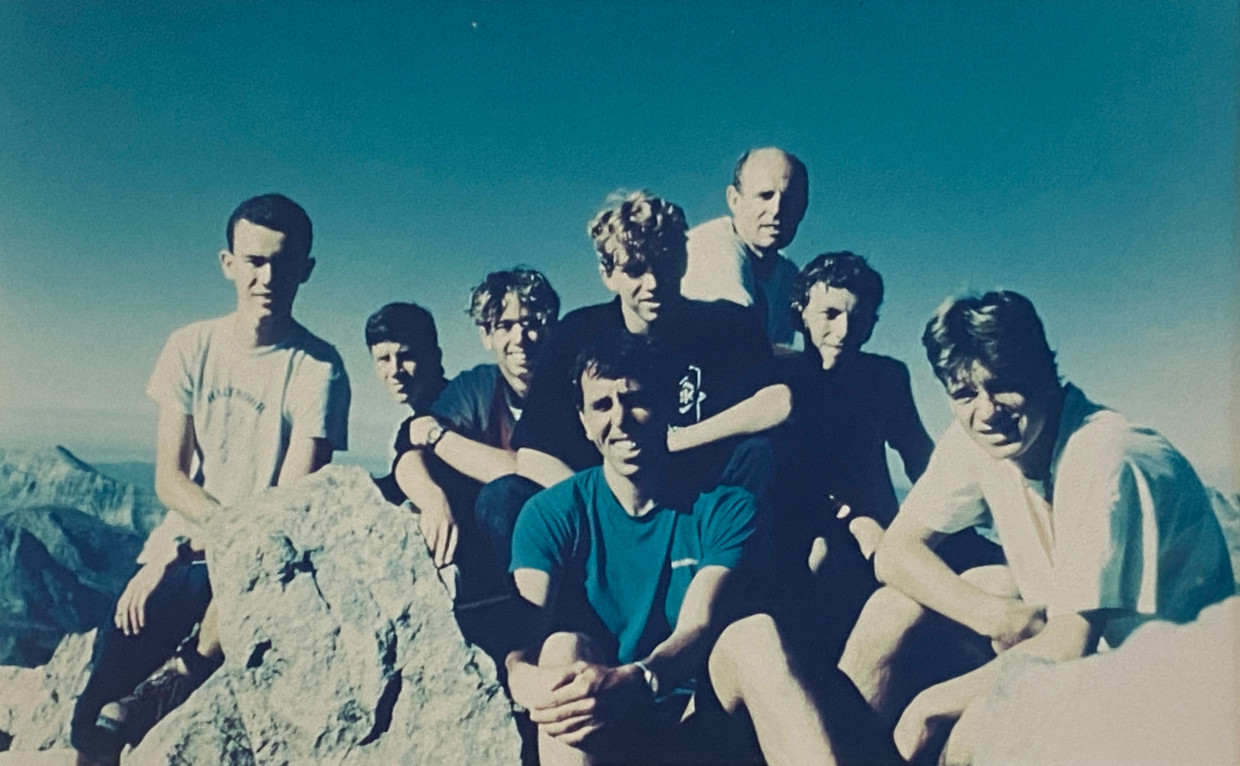
Andrew Neale (3rd from left), Ben Fanner (5th from left) , Eden Davies (2nd from right)
Walking and climbing, rain and shine.
On top of the mountains, oh so high,
Lifting our arms we could reach the sky.
Washing and cooking, that didn't appeal ,
But the comradeship, now that was real.
We'll meet again the friends we made,
To plan a further escapade.
Eden, Andrew and Ben
15
I'M VERY WELL THANK YOU
I'm as healthy as can be.
I have arthritis in both my knees
And, when I talk, talk with a wheeze.
My pulse is weak, and my blood is thin,
But I'm awfully well for the shape I'm in.
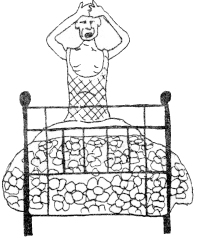

Or wouldn't be able to go out on the street.
Sleep is denied me night after night,
But every morning I find I'm alright.
My memory is failing, my head's in a spin,
But I'm awfully well for the shape I'm in.
The moral of this, as my tale I unfold,
Is that for you and me, who are getting old,
It's better to say "I'm fine" with a grin,
Than to let folks know the shape we are in!
How did I know that my youth is all spent?
Well, my 'get up and go' has got up and went.
But I really don't mind. when I think with a grin,
Of all the grand places my 'got up' has bin.
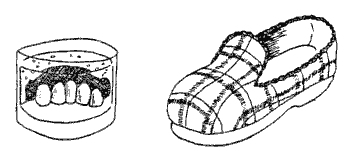
But sometimes I wonder as I get out of bed,
with my ears in a drawer, my teeth in a cup,
My eyes on a table, until I get up.
Ere sleep overtakes me I say to myself,
"Is there anything else I could lay on the shelf?"
When I was young my slippers were red,
I could kick my heels right over my head.
When I got older my slippers were blue.
But still I could dance the whole night through.
Now I'm old my slippers are black.
I walk to the store and puff my way back.
I get up each morning and dust off my wits
And pick up the paper to read the 'Obits'.
If my name is still missing, I know I'm not dead,
And so I have my breakfast and go back to bed!
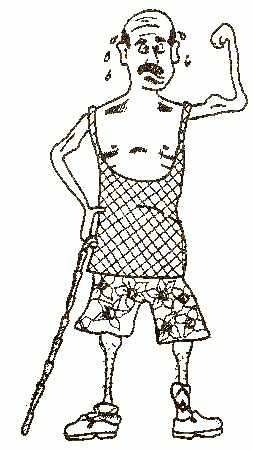
Contributed by Lucy Haynes
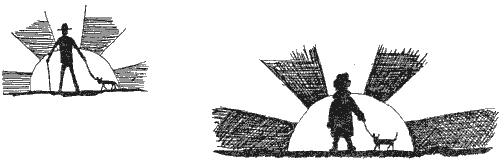
Illustrations by: Paul Swailes
Thank you, Lucy, for "I'm very well thank you", but we were sorry to learn that for a time you were "not very well" and in hospital following a slight heart attack, and that Kenneth, too, has had a short stay in hospital. However, we are glad to know you are both home again and progressing well "for the shape you are in"!
We are delighted, too. to know that Gwen Squire is out of hospital and hope that now she is home again she will make good progress.
14
LOVELY BERRYNARBOR
And at last have found our Shangri-La .
Such peace and quiet is hard to find,
The Lord above has been so kind.
Our garden's flat and oh! so green,
Bordered by a little stream.
The hills rise up, from the green lush ground,
Birds and bees are the only sound.
The little village is a real delight -
Miss Muffet's Tea Rooms on the right.
Down the lane, the Olde Globe Inn,
Tasty food, or a glass of gin.
The old church tower with the clock set high,
Chimes the hour as you pass it by.
The only thing it seems to say, is
"Do not worry, there's another day."
All along the leafy lanes, wild flowers nod and smile,
Then they wave us on again to walk another mile.
We wish the years would roll away, and make us young once more,
We should love to spend a life time here, before the closing door.
It is too late to spread our roots like the old oak tree,
But we know within our hearts, the best is yet to be.
Rosaline Camfield
Greenacre
Sterridge Valley
1